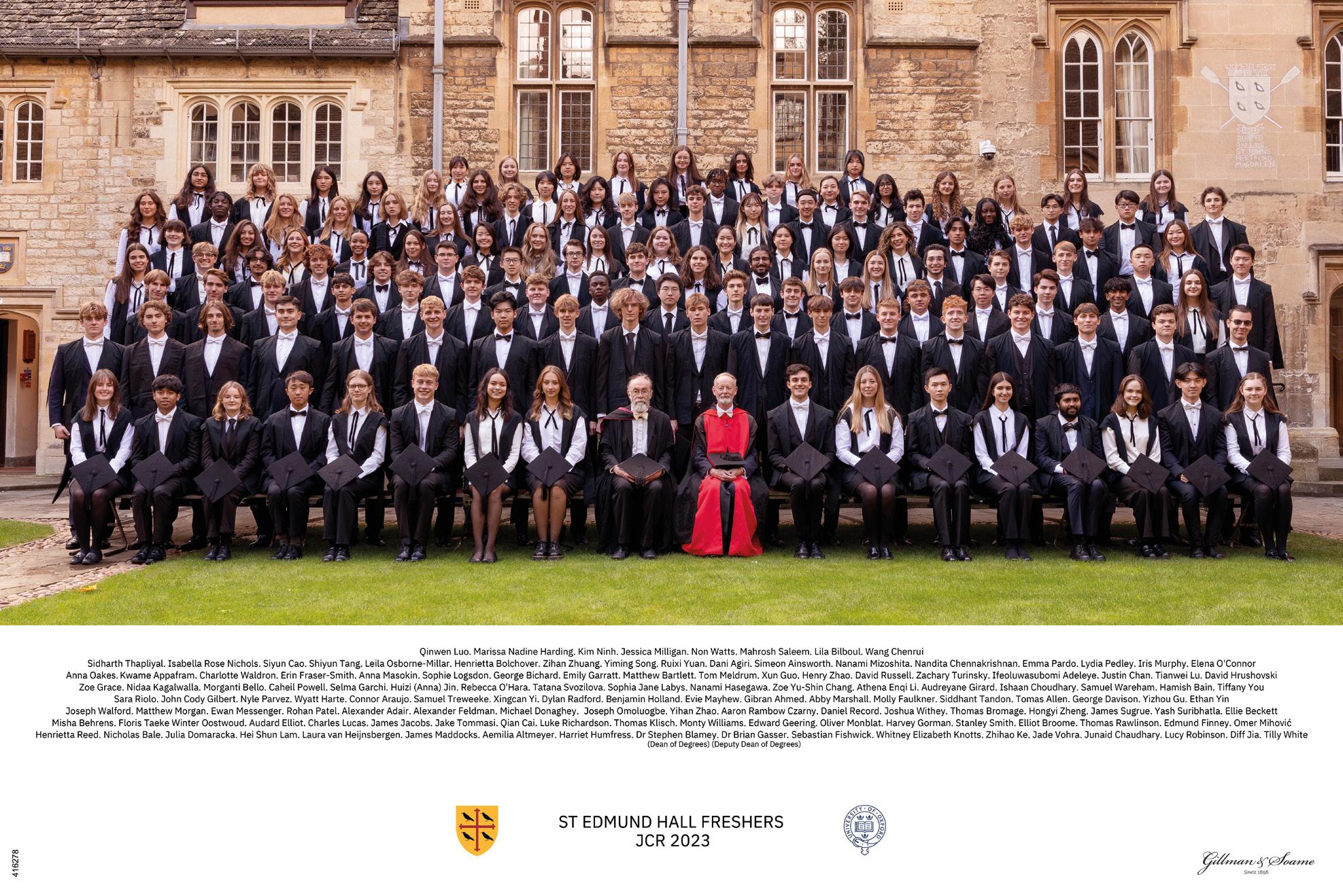




Edmund Hall Magazine
Editor
James Howarth (Librarian & Fellow by Special Election)
With many thanks to all the contributors to this year’s edition: huge thanks to the Hall’s Communications Manager Laura Ellis, and to the marvellous Emma Carter, Heather Barr and Jake Banyard in the Library without whose Herculean labours, keen eyes and wise counsel production of the Magazine would be impossible.
magazine.editor@seh.ox.ac.uk
Front cover: Front Quad in Starlight by Sarah Savić Kallesøe (copies may be purchased at www.oxfordbynight.square.site )
Final Image: Rainbow over the Chapel by Q Sun, www.instagram.com/sehpicturetakers
All the photographs in this Magazine are from Hall records unless otherwise stated.
Rugby Plate Final: Chris Bateman
Multi-sport Team: Bea Munro
Pictures of Vivian Ridler: The Ridler Family
Images of Lucy Mission: NASA
Matriculation Pictures: Photographs by Gillman & Soame St Edmund Hall, Oxford, OX1 4AR 01865 279000 | www.seh.ox.ac.uk aularianconnect@seh.ox.ac.uk @StEdmundHall
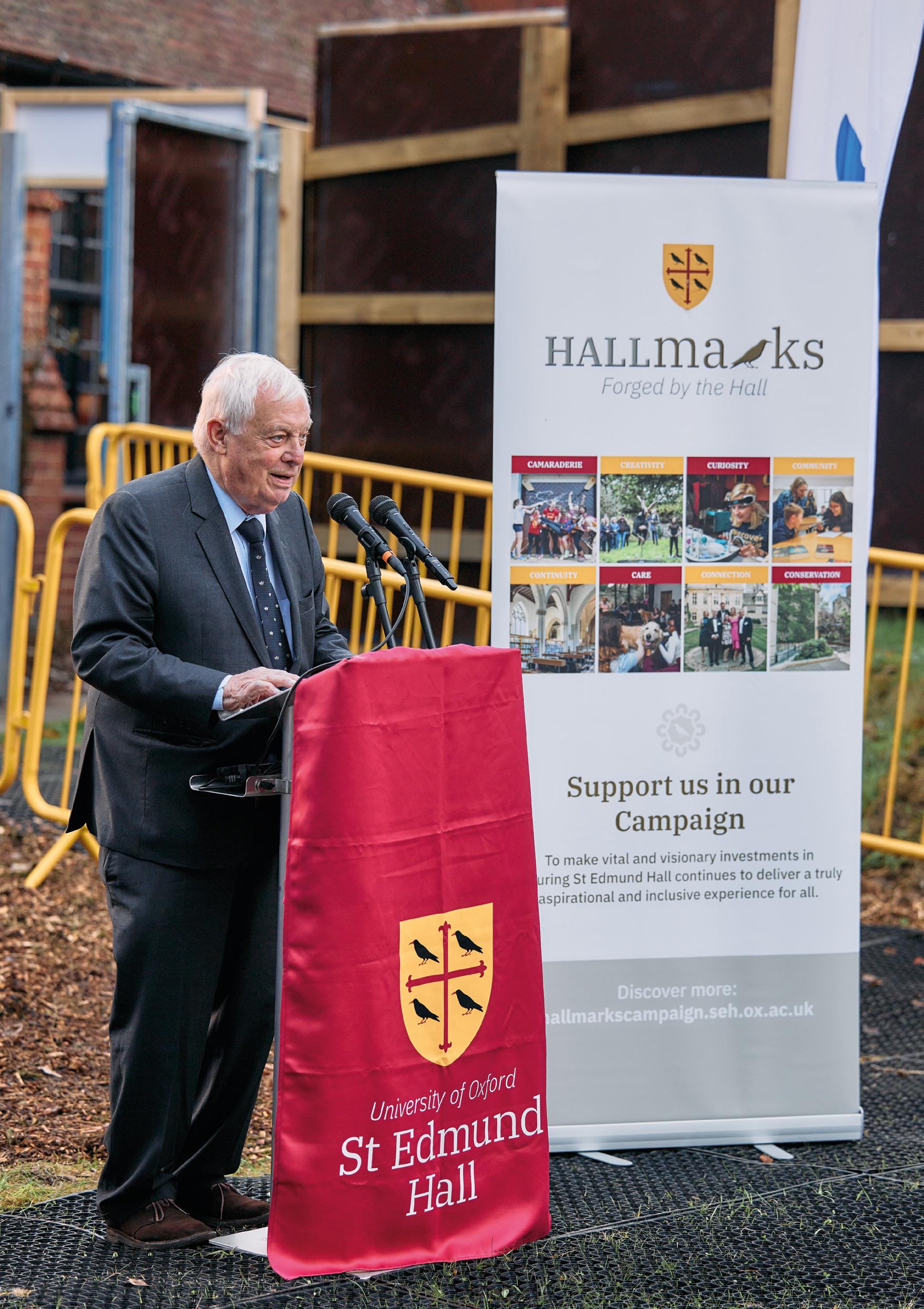
GB denotes member of the Governing Body
The Rt Hon the Lord Patten of Barnes, KG, CH, PC, MA, DCL (Hon DJur Massachusetts, Birmingham, Bath; Hon DCL Newcastle; Hon DLitt Sydney, Exeter, Ulster; DUniv Keele, Stettin; Hon DBA Kingston; Hon DSc S E Europe, Rep of Macedonia), Hon FRCPE Chancellor of the University
Principal
Willis, Katherine Jane, Baroness Willis of Summertown, CBE, MA (BSc S’ton; PhD Camb; Hon DSc Bergen; Hon DSc UEA), FGS
Professor of Biodiversity Fellows
Priestland, David Rutherford, MA, DPhil
Professor of Modern History, Tutor in Modern History, Vice-Principal (from 16.04.23) GB
Kahn, Andrew Steven, MA, DPhil (BA Amherst; MA Harvard), FBA Professor of Russian Literature, Fellow and Tutor in Modern Languages (Russian), Library Fellow and Old Library Fellow GB
Manolopoulos, David Eusthatios, MA (BA, PhD Camb), FRS Professor of Theoretical Chemistry, Tutor in Chemistry GB
Zavatsky, Amy Beth, MA, DPhil (BSc Pennsylvania)
Associate Professor and University Reader in Engineering Science, Tutor in Engineering Science GB
Matthews, Paul McMahan, OBE, MA, DPhil (MD Stanford), FRCPC, FRCP, FMedSci Professor of Neurology, Director of the Rosalind Franklin Institute, Fellow by Special Election
Barclay, Joseph Gurney, MA
Fellow by Special Election
Johnson, Paul Robert Vellacott, MA (MB CHB Edin; MD Leic), FRCS, FRCS Ed, FRCS (Paed Surg), FAAP
Professor of Paediatric Surgery, Fellow by Special Election GB
Tsomocos, Dimitrios P, MA (MA, MPhil, PhD Yale)
Professor of Financial Economics, Fellow by Special Election GB
Johansen-Berg, Heidi, BA, MSc, DPhil, FAMS, FRS
Professor of Cognitive Neuroscience and Wellcome Trust Research Centre Principal Research Fellow, Senior Research Fellow GB
Tseng, Jeffrey, MA (BS CalTech; MA, PhD Johns Hopkins)
Professor of Physics and Tutorial Fellow, Dean, Chapel Overseeing Fellow GB
Wilkins, Robert James, MA, DPhil
Associate Professor of Epithelial Physiology, American Fellow and Tutor in Physiology, Senior Tutor GB
Nabulsi, Karma, MA, DPhil
Senior Research Fellow
Williams, Christopher Wesley Charles, MA, DPhil
Professor of French Literature, Director of TORCH, Tutor in Modern Languages (French)
GB
Riordan, Oliver Maxim, MA (BA, PhD Camb)
Professor of Discrete Mathematics, Tutor in Mathematics, Secretary to Governing Body
GB
Yueh, Linda Yi-Chuang, CBE, MA, DPhil (BA Yale; MPP Harvard; JD NYU)
Research Lecturer in Economics, Fellow by Special Election GB
Yates, Jonathan Robert, MA, DPhil (MSci Camb)
Associate Professor of Materials Modelling and Royal Society Research Fellow, Tutor in Materials Science, Pictures & Chattels Fellow GB
Dupret, David, (MSc, PhD Bordeaux)
Professor of Neuroscience and MRC Investigator, Tutor in Biomedical Sciences GB
Edwards, Claire Margaret, (BSc, PhD Sheff)
Associate Professor of Bone Oncology, Fellow by Special Election
Gaiger, Jason Matthew, (MA St And; MA, PhD Essex)
Professor of Aesthetics and Art Theory, Fellow by Special Election GB
Thompson, Ian Patrick, (BSc, PhD Essex)
Professor of Engineering Science, Fellow by Special Election
Stagg, Charlotte Jane, DPhil (BSc, MB ChB Brist), MRCP
Professor of Human Neurophysiology & Senior Research Fellow, Wellcome Trust/Royal Society Sir Henry Dale Fellow, Fellow by Special Election (until 01.04.24)
McCartney, David Edward, BM BCh, MRCP, MRCGP
Director of Graduate Entry Medicine, Medical Sciences Division, Fellow by Special Election
Willden, Richard Henry James, (MEng, PhD Imp)
Professor of Engineering Science, Tutor in Engineering Science GB (until 03.03.24), Fellow by Special Election (from 15.05.2023)
Wild, Lorraine Sylvia, MA, DPhil
College Lecturer in Geography, Fellow by Special Election
Lozano-Perez, Sergio, DPhil, PGDipLaTHE, (BSc, MSc, PGCE Seville), AMInstP, FRMS
Professor of Materials Science, George Kelley Senior Research Fellow in Materials
Taylor, Jenny Cameron, BA, DPhil
Associate Professor of Translational Genomics, Fellow by Special Election
Nguyen, Luc Le, (BSc Ho Chi Minh City, Vietnam; PhD Rutgers)
Associate Professor of Analysis of Nonlinear Partial Differential Equations, Tutor in Applied Mathematics, Tutor for Admissions GB
Rothwell, Peter Malcolm, MA (MB ChB, MD, PhD Edin), FMedSci
Action Research Professor of Clinical Neurology, Professorial Fellow
Goldberg, Leslie Ann, MA (BA Rice; PhD Edin)
Professor of Computer Science, Senior Research Fellow GB
Pavord, Ian Douglas, (MB BS Lond; DM Nott), FRCP, FMedSci
Professor of Respiratory Medicine, Professorial Fellow GB
Bruce, Sir Peter George, Kt, MA, DPhil, FRS, FRSE
Wolfson Professor of Materials, Professorial Fellow
Karastergiou, Aris, (PhD Bonn)
Associate Professor in Astrophysics, Senior Research Fellow in Astrophysics
Goulart, Paul James, (MSc MIT; PhD Camb)
Associate Professor in Engineering Science, Tutor in Engineering Science GB
Lähnemann, Henrike, MA (MA, PhD Bamberg)
Professor of Medieval German Literature and Linguistics, Professorial Fellow GB
Chankseliani, Maia, (BA, MA Tbilisi State University; MA Warw; EdM Harvard; PhD Camb)
Associate Professor of Comparative & International Education, Fellow by Special Election GB
Zondervan, Krina, DPhil (BA, MSc Leiden; MSc Erasmus), FAMS
Professor of Reproductive & Genomic Epidemiology, Director of Oxford Endometriosis
CaRe Centre, Fellow by Special Election
Al-Mossawi, Hussein, MA, BM BCh, DPhil, MRCP (UK)
Honorary Research Associate Nuffield Department of Orthopaedics, Rheumatology and Musculoskeletal Sciences, College Lecturer in Medical Sciences, Fellow by Special Election
Huang, Wei, (BA Qingdao; MSc Tsinghua; PhD Sheff)
Professor of Biological Engineering, Fellow by Special Election
McAlpine, Erica Levy, (BA Harvard; MPhil Camb; PhD Yale)
Associate Professor of English Language & Literature, A C Cooper Fellow and Tutor in English Language & Literature, Archives Fellow GB
Gill, Michael, DPhil (BSc Bath; MA Warw)
Associate Professor of Organisational Studies, Tutorial Fellow in Management GB
Skokowski, Paul Gregory, MA (PhD Stanford)
Professor of Symbolic Systems and Director, Center for the Explanation of Consciousness, Stanford University, Fellow by Special Election
Bannerman, David MacKenzie, (BSc Brist; PhD Edin), FRS
Professor of Behavioural Neuroscience, William R Miller Fellow and Tutor in Neuroscience and Experimental Psychology GB
Stride, Eleanor Phoebe Jane, OBE, MA (BEng, PhD UCL), FREng, HonFEIT
Professor of Engineering Science, Professorial Fellow
Williams, Mark Andrew, BA, MPhil, DPhil
Associate Professor of Global Medieval Literature, Fellow and Tutor in English Language & Literature, Garden Fellow, Tutor for Undergraduates GB
Bell, Joanna Rachel, BA, BCL, DPhil
Associate Professor in Law, Jeffrey Hackney Fellow and Tutor in Law GB
Lloyd, Alexandra, BA, PGCE, MSt, DPhil, FHEA
College Lecturer in German, Fellow by Special Election, Tutor for Visiting Students
Burnett, Eleanor, (LLB Leeds), FCA
Finance Bursar and Official Fellow GB
MacFaul, Thomas, DPhil (BA Camb)
Lecturer in English, Fellow by Special Election, Deputy Dean of Degrees
Parry, Luke, MSc (PhD Brist)
Tutorial Fellow in Earth Sciences GB
Prentice, Joseph, MPhys (PhD Camb)
Cooksey Early Career Teaching and Research Fellow in Physics
Jansen, Lars Erwin Theodoor Domingos, (MSc Hogeschool West-Brabant; PhD Leiden)
Professor of Molecular Genetics and Wellcome Senior Research Fellow, Biochemistry, William R Miller Fellow and Tutor in Biochemistry GB
Tan, Jack, DPhil (BSc USM)
Senior Postdoctoral Scientist, Alain Townsend Lab at the Weatherall Institute of Molecular Medicine, Fellow by Special Election
Slezkine, Yuri, (MA Mosc; PhD Texas)
Jane K. Sather Professor of History, University of California, Berkley, Senior Research Fellow
Howett, Carly Jacqueline Amy, DPhil (BSc Essex; MSc UCL)
Associate Professor of Space Instrumentation, Tutorial Fellow in Physics GB
Crawford, Thomas Joseph, BA (PhD Camb)
Lecturer in Mathematics, Fellow by Special Election
Guiliano, Zachary, (BA Evangel; MDiv Harvard; PhD Camb)
Career Development and Research Fellow, Chaplain (until 16.12.23)
Sciuto, Ruggero, MPhil, DPhil (BA Pisa)
Leverhulme Trust Early Career Fellow, Junior Research Fellow in Modern Languages
Whitbourn, James, MA (DMus LCM)
Director of Music and Fellow by Special Election † 12.03.24
Thomas, Rhys Llewellyn, (BSc, MSc, PhD S’ton)
Early Career Teaching and Research Fellow in Economics
de Vivo, Filippo Luciano Carlo Guido, (BA, Milan; MA, PhD Camb; DEA Paris)
Professor of Early Modern History, Tutorial Fellow in History GB
Lazar-Gillard, Orlando, DPhil (BA, MPhil Camb)
Early Career Research and Teaching Fellow in Politics
Nichols, Claire Isobel O’Bryen, (MSci, PhD Camb)
Associate Professor of the Geology of Planetary Processes, Tutorial Fellow in Earth Sciences GB
Munday, Callum, BA, DPhil
Fellow by Special Election in Geography
Howarth, James Alexander, MA (MA York; MA Lond)
Librarian and Fellow by Special Election
Vivian, Andrew, (BA Bourne; PGCE Birkbeck; PGDip UCL)
Director of Development and Fellow by Special Election
Kohlhas, Alexandre, (BSc Copenhagen; MPhil, PhD Camb)
Associate Professor of Economics, William R Miller Fellow and Tutorial Fellow in Economics GB
Kuhn, Roman, (BA, MA, PhD FU Berlin)
Non-Stipendiary Junior Research Fellowship
Farrell, Zoe, (BA Warw; MPhil, PhD Camb)
Junior Research Fellowship in History
Hollingsworth, Déidre, BA, MSc (MMus Reading; PhD Camb), FIMA
Senior Research Fellowship in Mathematics
Saunders, Kate Eleanor Anne, BA, BM BCh, DPhil, MRCPsych, FHEA
Senior Research Fellowship in Medicine
Smith, Steve, BSc (PhD Imp)
Senior Research Fellowship in Geography, Equality, Diversity and Inclusion Fellow
Bunk, Severin, (BSc MSc Hanover; PhD Heriot-Watt)
Junior Research Fellow in Mathematics
McMeekin, David, DPhil (BSc Ottawa; MSc École Polytechnique de Lausanne (EPLF))
Junior Research Fellow in Physics
Koutsika, Gina, (MA UCL; MBA Open)
Director of Audiences and Content, Ashmolean Museum of Art and Archaeology, Fellow by Special Election
Dvornichenko, Daryna, (BA, MA, PhD, Odesa I. Mechnikov National University)
Visting Fellow
Blandford-Baker, Mark Rivers, Domestic Bursar, Senior Treasurer of Amalgamated Clubs GB
Morsing, Mette, (MBA, PhD CBS)
Director of the Smith School of Enterprise and the Environment, Professor of Enterprise and the Environment, Professor of Business Sustainability, Fellow by Special Election
Marquardt, Katharina, (MSc Eberhard-Karls University Tübingen; PhD Technical University Berlin)
Associate Professor in Materials and Tutorial Fellow in Materials GB
Moreno-Mateos, David, (BEng Universidad Politécnica de Madrid; PhD CSIC & Universidad de Alcalá)
Associate Professor in Physical Geography and Tutorial Fellow in Geography GB
Marshall, Brooke, (BA, LLB (Hons), Queensland; PGDipLP, ANU; Dr iur, Hamburg)
Sir Richard Gozney Fellow and Tutor in Law GB
Fréry, Nicolas, (École Normale Supérieure; PhD Sorbonne Université)
Junior Research Fellow in Modern Languages
Violaris, Elena, (BA, MA, PhD Camb)
Junior Research Fellow in English
Vardi, Reut, (BSc Hebrew University of Jerusalem; MSc, PhD Ben Gurion University of the Negev)
Junior Research Fellow in Environmental Sustainability
Henderson, John, (BA Newc; MA Camb; PhD Lond)
Visiting Fellow
Andersson, Jenny, (BA, MA, PhD Uppsala)
Visiting Fellow
Zeller, Maya Jewell, (BA Western Washington University; MFA Easter Washington University)
Visiting Fellow
Honorary Fellows
Oxburgh, Ernest Ronald, The Lord Oxburgh, KBE, MA (PhD Princeton; Hon DSc Paris, Leic, Lough, Edin, Birm, Liv, S’ton, Liv J Moores, Lingnan Hong Kong, Newc, Leeds, Wyoming, St And), FRS, FIC, Hon FIMechE, Hon FCGI, Hon FREng; Officier, Ordre des Palmes académiques (France)
Tindle, David, MA, RA, Hon RSBA
Daniel, Sir John Sagar, Kt, OC, MA (DSc Paris; Hon DLitt Deakin Australia, Lincolnshire, Humberside, Athabasca Canada, Indira Gandhi Nat Open University India, McGill Canada; Hon DHumLitt Thomas Edison State Coll USA, Richmond Coll London; Hon DSc Royal Military Coll St Jean Canada, Open Univ, Sri Lanka, Paris VI, Univ of Education Winneba Ghana; Hon DEd CNAA, Sukhothai Thammathirat Open Univ Thailand, Open Univ Malaysia; Hon LLD Univ of Waterloo Canada, Wales, Laurentian Canada, Canada West, Ghana; DUni Aberta Portugal, Anadolu Turkey, Quebec, Derby, New Bulgarian, Open Univ, Hong Kong, Stirling, Montreal; Hon DLitt & DPhil South Africa; Hon LittD State Univ NY), CCMI, Hon FCP; Officier, Ordre des Palmes académiques (France)
Smethurst, Richard Good, MA
Cox, John, MA
Cooksey, Sir David James Scott, Kt, GBE, MA, Hon FMedSci (Hon DSc S’ton, UCL; Hon DBA Kingston) † 28.01.24
Rose, General Sir (Hugh) Michael, KCB, CBE, DSO, QGM, MA; Comdr, Ordre national de la Legion d’honneur (France)
Nazir-Ali, Revd Monsignor Michael James, MLitt (BA Karachi; PGCTh, MLitt Camb; ThD Aust Coll of Theol, NSW; DHLitt Westminster Coll, Penn; DD Lambeth; Hon DLitt Bath, Greenwich; Hon DD Kent & Nashotah)
Roberts, Gareth, MA
Crossley-Holland, Kevin John William, MA (Hon DLitt Ang Rus, Worc), FRSL
Graham, Andrew Winston Mawdsley, MA, Hon DCL
Edwards, Steven Lloyd, OBE, BA
Morris, Sir Derek James, Kt, MA, DPhil (Hon DCL UC Dublin & UEA; Hon DSc Cranfield)
Bowen, David Keith, MA, DPhil (Dip Music; MA Open Univ; PhD RCM), FRS, FIMMM, FlnstP, FREng
Byatt, Sir Ian Charles Rayner, Kt, MA, DPhil (DUniv Brun, Central England; Hon DSc Aston, Birm), FCIWEM, FCIPS, CCMI
Burnton, The Rt Hon Sir Stanley Jeffrey, Kt, PC, MA
Mingos, David Michael Patrick, MA (BSc Manc; DPhil Sus), CChem, FRS, FRSC
Josipovici, Gabriel David, BA, FRSL, FBA
Macdonald, Kenneth Donald John, Lord Macdonald of River Glaven, Kt, BA, KC
Starmer, The Rt Hon Sir Keir Rodney, PC, KCB, MP, BCL, (LLB, Hon LLD Leeds; DU Essex; LLD East Lond; Hon LLD LSE, Reading), KC
Shortridge, Sir Jon Deacon, KCB, MA (MSc Edin; Hon DUniv Glam)
Lee, Stewart Graham, BA
Khurshid, Salman, BCL (BA St Stephen’s College, Delhi)
Banks, Samuel Andrew, MA (BA Florida)
Hawkesworth, Christopher John, DPhil (BA Trin Coll Dublin; Hon DSc Copenhagen), FRS, FRSE
Wainwright, Faith Helen, MBE, BA (Hon DEng Bath), FlStructE, FREng, FICE, FRSA
Hollingworth, The Hon Justice Jane Elizabeth, BCL (BJuris, LLB Univ of Western Australia)
Fletcher, Amelia, CBE, BA, MPhil, DPhil
Ahmed, Samira, BA (MA City, Lond; Hon DLitt Kingston)
Asplin, Sarah Jane, DBE, BCL (MA Camb)
Dhillon, Sundeep, MBE, BM BCh, MA
Gauke, The Rt Hon David Michael, PC, BA
Haworth, Mark Derek, MA
Morris, Mervyn Eustace, OM (Jamaica) (BA London-UCWI)
Gull, Keith, CBE (BSc, PhD, DSc Lond; Hon DSc Kent), FRS, FMedSci, FRSB
Krull, Wilhelm, (PhD Philipps University of Marburg; Hon Dr Ilia State University, Tbilisi)
Venables, Robert, MA (LLM Lond), KC
Sedwill, Mark, the Lord Sedwill, MPhil (BSc St And), GCMG, FRGS
St Edmund Fellows
Laing, Ian Michael, MA
Smith, Sir Martin Gregory, Kt, MA (MBA, AM Econ Stanford), Hon FRAM, FRGS
Cansdale, Michael John, MA
Pocock, Francis John, MA, DPhil
Armitage, Christopher Mead, MA (MA Western Ontario; PhD Duke)
Best, Anthony John, BA
Xie, Heping, (BEng, PhD China University of Mining & Technology; Hon DEng Hong Kong Polytechnic University; Hon DSc Nottingham Ningbo University, China)
Broadley, Philip Arthur John, MA (MSc LSE)
Busby, Ian Christopher, BA
Ruvigny, Rupert Francis James Henry, BA
Hwang, Frank
Chairman of the Oxford Chinese Economy Programme (OXCEP)
Johnson, Peter, BA, BPhil Emeritus Fellows
Hackney, Jeffrey, BCL, MA
Hirsch, Sir Peter Bernhard, Kt, MA, DPhil (MA, PhD Camb), FRS
Segar, Kenneth Henry, MA, DPhil
Child, Mark Sheard, MA (MA, PhD Camb), FRS
Worden, Alastair Blair, MA, DPhil (MA, PhD Camb), FBA
Scargill, David Ian, MA, DPhil, JP
Farthing, Stephen, MA (MA Royal College of Art), RA
Phelps, Christopher Edwin, MA, DPhil † 21.12.23
Dunbabin, John Paul Delacour, MA
Stone, Nicholas James, MA, DPhil
Reed, George Michael, MA, DPhil (BSc, MS, PhD Auburn)
Crampton, Richard John, MA (BA Dub; PhD Lond; Dr Hon Causa Sofia)
Knight, John Beverley, MA (BA Natal; MA Camb) † 17.01.24
Wells, Christopher Jon, MA
Wyatt, Derrick Arthur, MA (LLB, MA Camb; JD Chicago), KC
Borthwick, Alistair George Liam, MA, DSc (BEng, PhD Liv; Hon Dr Budapest University of Technology & Economics), FREng, CEng, FICE, FRSE
Collins, Peter Jack, MA, DPhil
Phillips, David George, MA, DPhil, FAcSS, FRHistS
Slater, Martin Daniel Edward, MA, MPhil
Jenkyns, Hugh Crawford, MA (BSc S’ton; MA Camb; PhD Leic)
Kouvaritakis, Basil, MA (BSc, MSc, PhD Manc)
Roberts, Steven George, MA (BA, PhD Camb)
Newlyn, Lucy Ann, MA, DPhil
Blamey, Stephen Richard, BPhil, MA, DPhil, Dean of Degrees
Martin, Rose Mary Anne, MA, DPhil (BSc Newc)
Ferguson, Stuart, MA, DPhil † 28.04.24
Cronk, Nicholas, MA, DPhil (Hon D.Litt McGill)
Podsiadlowski, Philipp, MA (PhD MIT)
Briggs, Adrian, BCL, MA, KC (Hon)
Davidson, Nicholas Sinclair, MA (MA Camb)
Mountford, Philip, MA, DPhil (BSc CNAA), CChem, FRSC
Whittaker, Robert James, MA (BSc Hull; MSc, PhD Wales)
Lecturers
Alexeeva, Iana, MSc (BA Calgary) Psychology
Amor, Ken, DPhil (BSC R’dg, MSC Leeds) Geography
Anil, Pratinav, DPhil (BA Institut d’études politiques (IEP) de Paris; MSc LSE) History
Ashbourn, Joanna Maria Antonia, MA (MA Camb; PhD Lond SB) Physics
Baines, Jennifer Christine Ann, MA, DPhil Russian
Bitsakaris, George, (MSc ISI, MA, Michigan) Economics
Bogacz, Rafal, (MSc Wroclaw Univ of Technology; PhD Brist) Clinical Medicine
Brain, Susannah, BM BCh (BA, MPhil Camb), MRCP, MRCPysch Clinical Medicine
Carthy, Elliott, (BSC University of the Sunshine Coast; MBBS Imp) Physiology and Pharmacology
Chitnis, Rajendra Anand, (BA Sheff; MA, PhD Lond) Czech
Convey, Alison, BM (PGCertMedEd, UCL) Pre Clinical Medicine
Cosimetti, Antonio, (MB, CHB Brist) Clinical Medicine
Dehtyriov, Daniel, (BEng, MEng Monash) Engineering
Elven, Marie, (DEA Paris) French Language
Falco, Simone, DPhil (BSc, MSc University of Naples Federico II) Engineering
Fanthorpe, Eimear, MPhil (LLB Lond) Law
Fountain, Daniel, (BM Camb) Pre-Clinical Medicine
Fowles, Sam, (MA St Andrews; PhD Lond; BPTC Law) Law
Gundle, Roger, MA, BM BCh, DPhil (MA Camb), FRCS (Eng), FRCS Orth Medicine
Heller, Simon, (BA, MA, MA Lausanne) English
Hewitt, Cal, (MSc Camb) Physics
Jagger, Ben, MEng Materials
Kennedy, Anthony, BA, DPhil Law
Laidlaw, Mike, DPhil (MA Camb) Chemistry
Laird, Karl, BCL (LLB Lond) Law
Langstaff, Holly, (BA, MPhil Camb; PhD Warw) French
Leger, Marie Andrea, (Lic, MRes Stendhal Grenoble) French
Littleton, Suellen Marie, (BSc California; MBA Lond) Management
Lüder, Sven, (BA, MA Berlin) German Lektor
Marshall, Neil, (BSC Birkbeck; BSC York) Earth Sciences
McIntosh, Jonathan, MA (MA, MPhil Lond) Philosophy
Nicholls, Rebecca, DPhil (MSci Camb) Earth Sciences and Materials Science
Nishino, Takafumi, (BA, MSc Kyoto; PhD S’ton) Engineering
Noe, Debrah Pozsony, (BS, PhD Ohio State) Finance
Palin, Richard, MSc, DPhil Earth Sciences
Patterson, Jonathan, (BA, MPhil, PhD Camb) French
Pavord, Sue, (MB ChB Leic), FRCP, FRCPath Clinical Medicine
Peterson, Scot, DPhil (BA Colorado Boulder; MA Chicago; JD UC Berkley) Politics
Pineau, Jon, (BSc, MSc University of Colorado Boulder) Physics
Pitt-Francis, Joe, MA, DPhil (BSc Lond) Computer Science
Potts, George, (BA, MA, PhD UCL) English
Ready, Oliver, BA, DPhil (MA UCL) Russian
Roberts, Paul, MChem, DPhil Chemistry
Romero, Loreto, (BA Seville; PhD Virginia) Spanish
Rossi, Ysaline, (BA, MA Grenoble Alpes) French Lectrice
Shine, Brian, (MB ChB, MD Birm; MSc Lond), MRCPath, FRCPath Medical Sciences
Sytsema, Johanneke, (PhD Free Univ, Amsterdam) Linguistics
Tianning, Tim, (BEng, Nott) Engineering
Vidal Doval, Rosa, BA, DPhil (MA Manc) Spanish
Wilk, James, MA, MSc (PhD Brun), FCybS Philosophy
Winkler, Emily Anne, MSt, DPhil (AB Dartmouth, USA) History
Yang, Bob, (BSc, MBBS Imp) FRCS (Urol) Clinical Medicine
Zarkogiannis, Stergios, (BSc University of the Aegean; MSc S’ton; PhD Athens) Earth Sciences
Chaplain
Guiliano, Zachary, (BA Evangel; MDiv Harvard; PhD Camb) (until 16.12.24)
Ifode-Blease, Mariama, (MA St And; MPhil, PhD Camb; MA Derby)
Librarian
Howarth, James Alexander, MA (MA York; MA Lond)
Archivist
Petre, Robert Douglas, (BA York; MArAd Liv)
Academic Registrar
Njoki, Melody, (BSc Card)
Director of Music
Whitbourn, James, MA (DMus LCM) † 12.03.24
Otero, Carlos Rodríguez, (BA, MA, MPhil Camb)
Dean of Degrees
Gasser, Brian, DPhil (BA Sheff)
Executive Head Chef
White, Samuel
Head Porter
Guildea, Martin
Decanal Staff
Tseng, Jeffrey, MA (BS CalTech; MA, PhD Johns Hopkins) Dean
Arni, Abhimanyu, BA (MA Lond) Junior Dean
Buys, Elinor, BCL (LLB QUT), AMusA Acting Junior Dean
Aggarwal, Aneesh, MSC (BA, MB BChir Camb) Assistant Junior Dean
Cotton, Daniele, (BEng Imp) Assistant Junior Dean
Allen, Sam, (BA, MPhil Camb) Sub-Dean, Tamesis
Samoulis, Zoe, (MSc Imp) Sub-Dean, NSE
Robert Petre, Archivist
Bar
Hayley Goodgame, Bar Manager
Chloe Knight, Scout (Bar)
Bursary
Mark Blandford-Baker, Domestic Bursar
Belinda Huse, Accommodation Manager
Susan McCarthy, Conference Manager
Clare Woolcott, Nurse
Jane Armstrong, Senior Welfare Officer
Beenish Chaudhry, College Counsellor
Sunny Pagani, Bursary Administrator
College Office
Robert Wilkins, Senior Tutor
Melody Njoki, Academic Registrar
Alena Nemeckova, Deputy Academic Registrar
Melanie Brickell, Academic Records Manager
Eleanor West, HR & Academic Assistant (until 22.04.24)
Emily Craven, HR & Academic Assistant (from 15.04.24)
Luke Maw, Outreach and Admissions Manager
Scarlett Short, Admissions Officer
Alice Findlay, Admissions Officer (maternity cover) (until 17.4.24)
Rebecca Smithson, Access & Outreach Coordinator
Communications
Claire Parfitt, Communications Manager (maternity leave from 01.05.24)
Laura Ellis, Communications Manager (maternity cover from 15.04.24)
Andrew Vivian, Director of Development
Thomas Sprent, Deputy Director of Development
Emily Bruce, Alumni Relations and Events Manager
Andrea Diss, College Events Officer
Jemima Hegerty-Ward, Campaign Development Officer (until 08.04.24)
Katariina Kottonen, Development Operations Officer (until 30.08.24)
Lydia Smith, Regular Giving Officer (from 20.05.24)
Stephen Lloyd, Estates Manager
Alex Grant, Deputy Estates Manager
Jose Hernandez Morales, Warden (East Oxford)
Grzegorz Zbylut, Warden (Norham St Edmund)
Lionel Knight, Estates and Compliance Administrator
James Ronaldson, Boatman
Phillip Didcock, Plumber
Thomas Gallagher, Carpenter (until 05.04.22)
Thomas Leach, Carpenter (from 07.05.24)
William Dallimore, General Maintenance Assistant
Vahid Kordbacheh, General Maintenance Assistant
Gerald McGrath, General Maintenance Assistant
Liam Webb, General Maintenance Assistant
Finance
Eleanor Burnett, Finance Bursar
Stephanie Hanks, Accountant
Sophia McMinn, Deputy Accountant
Toby Cherrill, Accounts Assistant (until 05.02.24)
Yuliia Kushnirenko, Accounts Assistant (from 01.02.24)
Sharon Stansfield, Purchase Ledger Assistant
Diogo Mendes Campos, Payroll & Finance Officer
Governance
Radhika Thiagarajan, Governance Officer
Housekeeping
Michelle O’Keefe, Housekeeper
Elaine Kavanagh, Housekeeping Supervisor
Lisa Thomas, Housekeeping Supervisor
Beata Bartnik, Scout
Gil Da Costa, Scout
Dulcia Da Costa Portela, Scout
Francisco Da Sousa Guterres, Scout
Minerva Evio, Scout
Barry Fiddes, General Assistant/Scout
Lena Fiddes, Scout
Dorota Gawronska, Scout
Erica Hanlon, Scout
David Long, General Assistant/Scout
Dorota Maciejowska, General Assistant/ Scout
Pedro Magno, Scout
Aneta Palar, Scout
Sitarani Rai Jabegu, Scout
Dragana Rnic, Scout
Marija Sarac, Scout
Hardeep Singh, Scout
Fiona Smith, Scout
Paul Solesbury, Scout
Pruang Stephenson, Scout
Michele Stroudley, Scout
Bosiljka Tetek, Scout
Lena Thomas, Scout
Human Resources
Mandy Estall, HR Manager
Eleanor West, HR & Academic Assistant (until 22.04.24)
Emily Craven, HR & Academic Assistant (from 15.04.24)
Andrew Breakspear, IT Manager
Ryan Trehearne, IT Officer
Kitchens
Samuel White, Executive Head Chef
Daniel Field, Deputy Head Chef
Donatella Inchingolo, Pastry Chef
Kate Feeley, Second Pastry Chef
Francisco Perez Castro, Sous Chef
Bartlomiej Wieczorkiewicz, Sous Chef
Juan Ramirez, Sous Chef
Andrea Calia, Junior Sous Chef
Peter Malone, Chef De Partie
Gonsalo Pereira, Chef De Partie
Dylan Rampton, Chef De Partie
Barry Wixey, Chef De Partie
Bonifacio Pinto, Prep Chef
Filomeno Da Costa Napoleao, Kitchen Porter
Ventura Da Conceicao, Kitchen Porter
Jaime De Axisi, Kitchen Porter
Floriano Pereira, Kitchen Porter
Rodolfo Fernandes, Kitchen Porter
Library
James Howarth, Librarian
Emma Carter, Deputy Librarian
Heather Barr, Graduate Trainee Library Assistant
Lodge
Martin Guildea, Lodge Manager
Tom Stringer, Deputy Lodge Manager
Mohammad Ali, Lodge Porter (until 30.09.23)
Toyim Atalabi, Lodge Porter
Nick Cosford, Lodge Porter
Anieszka Leiewicz Saine, Lodge Porter
Danish Raza, Lodge Porter (until 22.03.24)
Ketrina Petrova, Weekend Lodge Porter
Maxine Osborne-Jones, Principal’s Executive Assistant
Servery
Molly McCarthy, Head Butler
Craig Hughes, Deputy Head Butler
Michele D’Intino, Catering Supervisor
Jovana Sarac, Catering Supervisor
Aida Amarel, Servery Assistant
Benigno Bonifacio Dos Santos, Servery Assistant
Nigel Buckle, Servery Assistant
Filemon Da Costa Ribeiro, Servery Assistant
Amelio Pinto, Servery Assistant
Chandra Silva Martins, Catering/Hall Assistant

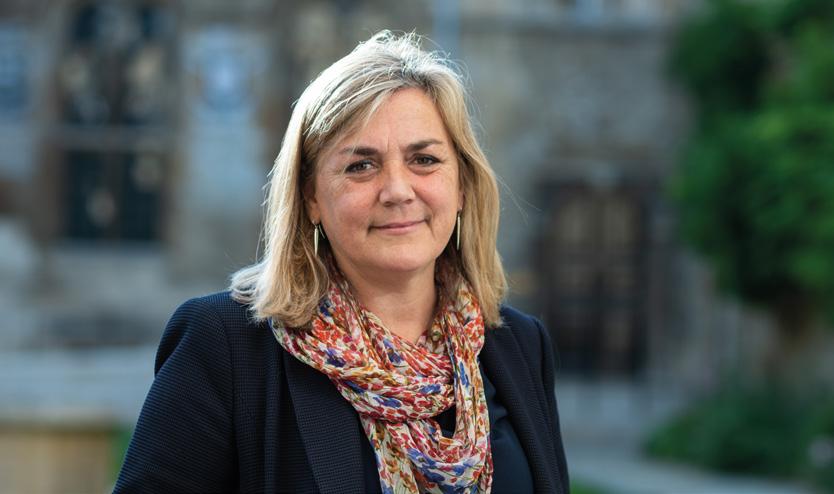
Someone asked me the other day whether, after six years of being Principal, the start of another academic year was beginning to feel like Groundhog Day? My answer was a quick and firm “no” – but it did make me stop and think about what has changed over the past six years, and how this year will be different.
For starters, I have in this time seen a large turnover in students, staff and Fellows – each bringing new perspectives, enthusiasm and good ideas to the collective table. At least two generations of students have completed their degrees, and there have also been significant changes in the staff, often resulting from individuals moving between roles and taking on greater responsibility as they do so. Our Head Butler (Molly McCarthy) and our College Registrar (Melody Njoki) are two cases in point – both now strong leaders of their respective teams, having risen up through various College roles and bringing with them the wisdom they have gained on the way. It is in the Governing Body (GB) Fellowship, however, that I have probably seen the largest change in the past six years. Over 30% of the Fellows on GB have arrived since I did in 2018, resulting from people moving to new positions outside of Oxford, new roles within the University, or retiring. Even in the last two years for example, there have
been six new GB Tutorial Fellows in Law, Geography, Materials Science, Chemistry, Politics and Computer Sciences.
I see this change and turnover in the Hall community, and the fresh perspectives that it brings, as a very good thing. It also brings with it some positive challenges – not least that since developing the ten-year College Strategy in 2019, many of the staff and Fellows, and all of the students, have changed. Over the past year, we have therefore undertaken a light-touch strategy refresh, looking at our original aims and ambitions, but with many of these new members of College chairing and taking an active role in the working groups, so that the strategy now also reflects their opinions and gives them ownership of the aims and objectives. Once again, we looked at five key areas of Hall life: education and research; access, equality and diversity; culture; estates; and finance. We asked: what have we achieved in the past five years, what are we going to continue to do, and where do we need new directions/targets?
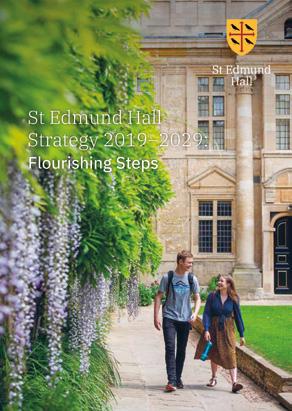
The full details of this strategy refresh Flourishing Steps, which was published in September, can be found at: https://tinyurl.com/ yc278hr4. I have to say that the process of examining what we have achieved since launching the strategy was wholly positive. We have made significant progress against the vast majority of the aims and ambitions we set out in 2019: many are now completed or on their way to being so. A lot of the strategic ambitions therefore remain broadly the same (and on-track), but now with a greater focus
on the specifics of how to deliver on certain elements. These aims include, for example, enhancement of funding for academic research activities and events in the Hall and developing a programme of annual prizes for academic excellence for every subject area (NB: even though we do have a number of such prizes, distribution and size of award are uneven due to historical patterns of philanthropic giving).
Another thing that has greatly changed since 2019 and continues to do so, for the better, is our College estate, in particular the quality and number of student bedrooms. Following their recent refurbishment, rooms in the Besse building are now top of the ballot for choice of rooms, even being chosen in preference to Front Quad rooms. By reassigning administration offices to other spaces in College, in the past five years we have increased the available number of student bedrooms by 10% (from 386 to 424 rooms), with only 4% of these rooms now classified as in need of refurbishment (compared to 32% in 2018). Of course, none of this would have happened without the skills and dedication of our Estates, Finance and Development teams, and on behalf of the entire College community, I would like to record our huge thanks to them.
Looking forwards, there are many new and good challenges. Probably the largest one on the horizon is the completion of the Norham St Edmund project – with the primary aim to provide accommodation for ALL undergraduates for the entirety of their course by 2026. As you will read later in the Magazine, building of this new student accommodation is progressing extremely well, to time, and on budget. Only yesterday, I found myself precariously balanced at the top of some rather alarmingly wobbly scaffolding,
viewing the roof to Park House, which is one of the five buildings we are erecting. The wooden shell of this building is now complete, with partitions for student bedrooms, kitchens and pod bathrooms all in place. Seeing such rapid progress and tangible outlines of the student bedrooms really brought home to me that by the start of the 2026–2027 academic year we will finally achieve our long-stated aim to house all of our undergraduates and firstyear graduates in College accommodation. Put into context, this means that next year’s cohort of Freshers will be the first group that does not have to start searching for houses on the open rental market within four weeks of them arriving in Oxford. This change cannot come soon enough for our students and will be transformational, I believe, in reducing inequalities in day-to-day living costs for Hall students.
So, there is much to be happy and positive about in the Hall, despite the many global issues and challenges we all face outside of the College’s, real and metaphorical, walls. We do, of course, pay close attention to these issues – but, in terms of finding solutions, ensuring excellence in education so that the best academic minds get the skills needed to tackle them, has to remain, and will remain, our top priority.
Delivering this excellence requires that, in addition to teaching and research, all aspects of student health, wellbeing and finance are supported. And this is what we continue to strive to do – day in, day out. There is, therefore, never a dull moment in life at the Hall, and certainly not a Groundhog Day.
Floreat Aula!
Professor Katherine J. Willis CBE, Baroness Willis of Summertown, Principal
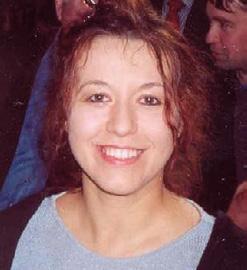
From Jo Ashbourn, College Lecturer in Physics: “In addition to my teaching as a Lecturer in Physics at Teddy Hall, during this past year I have continued as the Director of the St Cross Centre for the History and Philosophy of Physics, which aims to not just focus on chronicling the history of the discipline as a retrospective exercise but to also critically engage with the philosophy and methodologies which inform how current research in physics is undertaken. The HAPP Centre has continued to go from strength to strength and alongside its in-person events in Oxford, it now livestreams its one-day conferences to global audiences of up to 1,000 people. Topics over the past year were ‘Polymaths Across the Eras’, ‘Physics and the Science of Living Things’ and ‘The Philosophy of Cosmology’.”
Details of these events with videos of all the talks plus forthcoming events for 2024–2025 can be seen at: www.stx.ox.ac.uk/the-happ-centre

During the past academic year, Emeritus Fellow Alistair Borthwick resumed international travel. In October 2023, he travelled to Beijing where he spent almost four weeks carrying out collaborative research on water resources engineering at Peking University. While there, he gave an invited lecture on ‘Alluvial Rivers crossing the Gangetic Plains’. He also gave a short talk to a large audience in ‘Celebration of the 80th Anniversary of the Department of Naval Architecture and 20th Anniversary of the School of Naval Architecture, Ocean
& Civil Engineering’ at Shanghai Jiao Tong University (SJTU), followed by an invited lecture on ‘Brief Encounters with Marine Hydrodynamics’.
In January 2024, he returned to SJTU for almost a month, carrying out collaborative research on ocean engineering. While there, he had meetings with several hightech companies, as well as the Goddess of Mercy at Putuoshan Island.
Alistair also visited Ireland, acting as Chair of the Scientific Advisory Committee of the SFI Centre for Marine and Renewable Energy Ireland and as a member of the External Advisory Committee to the President of University College Cork.

Emeritus Fellow Adrian Briggs writes: “The fifth edition of The Conflict of Laws was published in the spring; when the work on the eighth edition of Civil Jurisdiction and Judgments, at the time of writing a work in progress, is completed, the unwanted task of recasting private international law to reflect the stunned aftermath of Brexit will have been accomplished. But whether it will then be time to lay down my pen and catch up on sleep is harder to say, for the new government, whose first minister I admitted, forty years ago, to read for the degree of BCL, has no legal or conventional duty to adopt or adhere to the vagaries of its predecessor. We shall just have to wait and see whether private international law is in line for another bouleversement.
One reflects that in the eighteenth century, those who had helped him on his way up might have looked to the First Lord of the Treasury for a modest sinecure: Receiver of Strays for the Manor of Iffley,
or something like that, perhaps. But as is said, if with a tinge of sadness, the past is a foreign country; they do things differently there. Probably just as well.”

Philip Broadley (1980, PPE), St Edmund Fellow, continues to serve on the boards of Legal & General and AstraZeneca. In May 2024, he became Chair of Lancashire Holdings, a specialist insurer and reinsurer in the London and Bermuda markets.
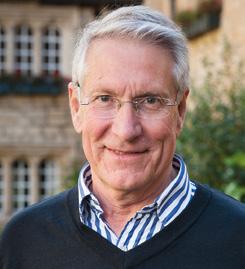
Over the past year, Emeritus Fellow Gordon Clark has worked on a couple of academic papers. One just published in a major journal focuses upon individuals’ risk preferences, the likelihood of saving for retirement, and the demand for different kinds of pensions and related financial instruments. The other paper is also about individuals’ risk preferences, is international in scope, and is about the relationship between risk preferences and country-specific indicators of culture and institutions.
He continues as an employer-nominated trustee on the Oxford Staff Pension Scheme and serves on the recently formed defined contribution (DC) committee. He is responsible for a set of senior executive programmes in the Smith School of Enterprise and the Environment that links climate change, finance, and innovation. He also continues as Chair of the IP Group’s ethics committee and serves on its environmental, social, and governance committee.

Emeritus Fellow Peter Collins writes: “My Research Group still researches, and I have been broadening my
interests by attending such groups as Anglo-Norman seminars. The musical part of my life, beyond my being responsible for looking after music and musicians in College many years ago, now takes a larger role, and though Covent Garden and summer festivals at Garsington, the Grange, Glyndebourne and Longborough occupy me somewhat, supporting the ever more respected Oxford Philharmonic, Wigmore Hall and the marvellous Schubertiade in the Vorarlberg of Austria take pride of place.
I have also furthered an interest in the future of the Europe-wide cultural heritage organisation Europa Nostra of which I have been a member of Council from 1991. To this end, I have sponsored a new annual Europa Nostra Lecture, the first of which was given in Venice at the 60th celebration of the organisation’s founding last November.
Otherwise, I should be glad to hear of alumni who are in need of and would cherish a 15th century thatched cottage near the Ridgeway of White Horse Hill renown; for, after 50 years, I shall be moving my non-Oxford housing to the Chilterns, also in an Area of Outstanding Natural Beauty. This will not prevent my spending much time in Oxford, at College and Institute, and greeting old friends I have taught or known in St Edmund Hall.”
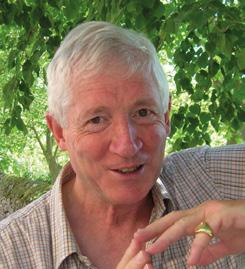
An update on another busy year from Kevin CrossleyHolland, Emeritus Fellow: “The Girl from Aleppo, my cantata with Cecilia McDowall, has attracted growing attention (perhaps augmented by the tragic wars in Ukraine and the Middle East) with memorable London performances at the Royal Academy of Music’s Duke’s Hall, Conway Hall and the Barbican as well as in several European countries and the USA.
This has been a year of poor health and much revision of my Collected Poems and my final novel for children, Kata and Tor (set in 1066), both of which will be published next spring.
During the year, I was elected a Fellow of the Society of Authors. My retellings of the Norse Myths (1980) were adopted by a still growing number of foreign publishers, and I was a consultant for the Story Museum’s exhibition, ‘Here be Dragons’.
I was greatly saddened by the death of David Cooksey, who was Best Man at my first wedding (in 1963), officiated by John Kelly.”
An obituary for Honorary Fellow Sir David Cooksey can be found on pp. 213–217.

Emeritus Fellow John Dunbabin’s recent life has been dominated first by trying and failing to find a lift or staircase chairlift that would enable him to stay in his much-loved cottage in Combe, and then in buying and moving into a sheltered accommodation flat near Folly Bridge, a process due to be completed in mid-July.
All this coincided with the long-delayed publication of The Longest Boundary: How the US–Canadian Border came to be where it is, 1763–1910 (2 vols or e-book, Grosvenor House Publishing, 2024).

Honorary Fellow and Former Principal Professor Keith Gull continued his research with ex-members of his laboratory to understand antigenic variation in the African trypanosome. He integrated this work with related studies at Imperial College London to guide and mentor the members of the research group of a
colleague who sadly died of breast cancer. Keith continued as a trustee of the Leverhulme Trust and also made his annual Ghana visit to chair the Advisory Board of the West African Centre for Cell Biology of Infectious Pathogens at University of Ghana, Accra.
He visited Prague as a member of the International Advisory Panel of Charles University in addition to acting as a member of the small group advising the Provost of Trinity College, Dublin, on promotion of Senior Faculty.
He also intensified his research on feeding behaviour of anadromous salmonids around northern Iceland and near Cape Wrath, Scotland.
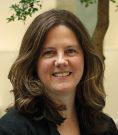
For Senior Research Fellow Déirdre Hollingsworth, Professor of Infectious Disease Epidemiology, Big Data Institute (BDI), University of Oxford, the past year has been varied and eventful.
Her effective and compassionate leadership style was recognised when she received a Kindness & Leadership award (www.kindnessrules.co.uk), recognised as one of 50 Leading Lights in the UK for using kindness to drive change.
In academia, her contributions range from co-chairing a review of the impact of climate change on neglected tropical diseases for the World Health Organization (academic.oup.com/ trstmh/article/118/9/561/7656506), to guest editing a special supplement of the Clinical Infectious Diseases Journal (academic.oup.com/cid/issue/78/ Supplement_2). Plus, presenting at international conferences on the topic areas of neglected tropical diseases and malaria in the USA, Rwanda and Kenya.
This summer, she received a prestigious Simons Foundation Fellowship from the Isaac Newton Institute (www. newton.ac.uk/events/fellowships/ simons-foundation), supporting global collaboration among mathematicians through a month-long programme in Cambridge on modelling for pandemic preparedness.
Additionally, Déirdre was appointed as the new academic co-chair for the Scientific Pandemic Infections Group on Modelling (SPI-M) (www.gov.uk/government/ groups/scientific-pandemic-infectionsgroup-on-modelling), which provides expert advice to the Department of Health and Social Care (DHSC) and the wider UK Government on scientific matters relating to the UK’s response to a pandemic based on infectious disease analysis, modelling, and epidemiology.
Reflecting on the year, she said, “It’s inspiring to see how maths can be a tool to help policy making in infectious diseases and the impact it can have.”

Heidi Johansen-Berg, Professor of Cognitive Neuroscience and Senior Research Fellow, was honoured to be elected a Fellow of the Royal Society in 2024 in recognition of her research on brain plasticity.
Her research group is currently focused on understanding the role of sleep in recovery from brain damage and stroke. In collaboration with engineers, they are designing and testing new wearable technology to boost learning in the sleeping brain.
Heidi is also enjoying leading the ‘Football on the Brain’ partnership project that involves engaging with footballing communities on the brain science behind
football, from the perspective of players, coaches, and fans. She and the team were delighted to showcase the project at the Meeting Minds alumni weekend.
Listen to Professor Johansen-Berg talking about brain injury and rehabilitation in Episode One of the Brain and Mental Health series of the University’s Futuremakers podcast: www.oxford. shorthandstories.com/brain-andmental-health-futuremakers
Learn more about the football project: www.footballonthebrain.uk.

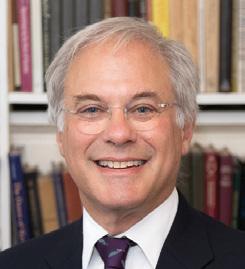
Carcanet will publish two new books by Honorary Fellow Gabriel Josipovici in August this year: a novel, Partita, and a short study of nine crucial months in Kafka’s life, A Winter in Zurau
Andrew Kahn, Professor and Tutorial Fellow of Russian Literature and Modern Languages, is currently finishing a new book he has written with his Columbia University colleague Professor Mark Lipovetsky about modern Russian Poetry.
All the World on a Page – the title is taken from a line in a poem by Boris Pasternak –contains 34 chapter-length essays about 34 lyric poems by 34 writers. There is a long introduction about the tradition, and each chapter also has a translation into English, many of which are new commissions from some of the best literary translators currently working in Russian. The span of the book is from the Silver Age in the 1910s to the present, from Alexander Blok to Maria Stepanova, and other authors include Tsvetaeva, Akhmatova, Nabokov (as a poet, for a
rare change), Brodsky, and Galina Rymbu whose ‘My Vagina’ is one of the sensations of F-Letter, New Feminist Poetry. The book will be published by Princeton University Press in spring 2025. Andrew has never had a book launch or party but is wondering about it this time round!
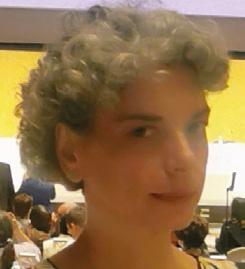
Fellow by Special Election and Ashmolean Director of Audiences & Content, Gina Koutsika, led the organisation of the One World Festival in February 2024. The weekend effectively showcased the many communities and faiths of Oxfordshire, enabling visitors to have a greater appreciation of different people and cultures, representing a broad and inclusive range of voices and celebrating our shared heritage. Around 9,500 visitors came to the Ashmolean, with over one third being first-time visitors. 100% of the visitors asked were very positive about the event. A key highlight was the mesmerising singing of medieval Hebrew, Greek, Latin, and German religious manuscripts as part of the Oxford Interfaith Forum, organised by Professor Henrike Lähnemann, who is a Senior Fellow of the Forum.
Prior to arriving at the Hall, Gina was the Director of the V&A Museum of Childhood and led its transformation to the Young V&A. She articulated a clear and compelling vision, set the target audiences and inspired the teams to dream and deliver something that had never been done before. The Young V&A was awarded the prestigious Art Fund 2024 Museum of the Year award. Created with children from early years to early teens, it is a place for young people to imagine, play and design, and get inspired by almost 2,000 toys, characters, objects and artworks on display from around the world and across

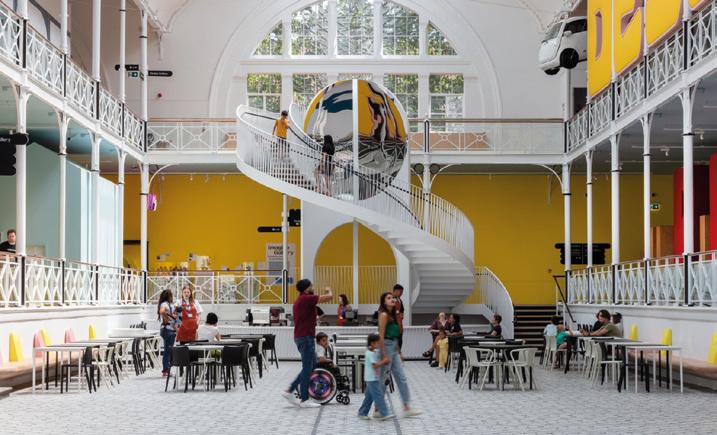
history. It is a museum sparking creativity, now and for the future.
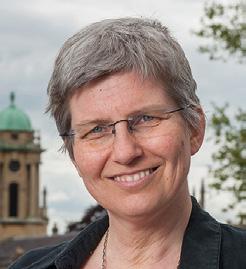
In her own unmistakable words, Henrike Lähnemann, Professor of Medieval German Literature and Linguistic Studies, recounts her year:
“In the last issue, I had asked for catchy titles for the English version of Unerhörte Frauen (medingen.seh.ox.ac.uk/index. php/2023/06/03/unerhorte-frauen), a trade book on medieval nuns which I co-wrote with my academic partner Eva Schlotheuber and which was a surprising success over the last year. Not only have 13,000 copies been printed but it has also been read aloud at mealtimes in all Benedictine houses in Germany – the medieval nuns would have loved it! In the end, we decided against any of the possible puns on ‘unheard-of’ and went with a more descriptive wording for the English edition: The Life of Nuns: Love, Politics, and Religion in Medieval German Convents (– might still be possible to
pun on ‘Life of Brian’!). It was a joy to work with the Cambridge-based young academic publisher Open Book Publishers who not only did a great copy-editing job but also made sure that it became a multimedia enterprise; I am currently recording an audiobook version, and I did an impromptu marketing video-clip among the ruins of Godstow Abbey which also featured on the Teddy Hall blog as ‘The Voices from the Past’ (www.seh.ox.ac.uk/ blog/voices-from-the-past).
I published two smaller volumes this year. The first was a book on Reformation polemics against monasticism in the shape of the broadsheet on the so-called ‘monk-calf.’ This was celebrated with an exhibition, which featured as one of its earliest monstruous creatures, a beakhead carving found in St Peter-inthe-East during the transformation of the church into the Library (blogpost with download link to the publication: historyofthebook.mml.ox.ac.uk/ reformation-pamphlets-from-1523). The second was the exhibition catalogue for ‘Epic! Homer and the Nibelungenlied in Translation’ which traced the invention of national epics by branding the medieval heroic epic of Siegfried and Kriemhilt as the ‘German Iliad’. The exhibition tour has been watched well over 2,000 times now! (historyofthebook.mml.ox.ac.uk/ epic-homer-and-nibelungenlied-intranslation).
This year, we did not run the Medieval Mystery Cycle but it is firmly on the cards for the next academic year: save the date for 26 April 2025, and do not hesitate to contact me if you can offer to act, direct, or steward at the event!”
Read more about the English version of The Life of Nuns: www.openbookpublishers. com/books/10.11647/obp.0397

This academic year, Dr Alexandra Lloyd, Fellow by Special Election in German, continued her public engagement work on the memory of the German resistance. She co-wrote a podcast series alongside members of the award-winning vocal collective SANSARA – Traces of the White Rose – and performed in two live concert-versions of the podcast at St Martin-in-the-Fields, London, and at the Wiltshire Music Centre. In December 2023, she appeared as a guest on National Public Radio’s podcast Throughline, and James Holland and Al Murray’s (1987, History) podcast We Have Ways of Making You Talk. She also took part in a panel on German memory at the We Have Ways Fest alongside Tobias Buck and Katja Hoyer.
Alex was interviewed for a short film on ‘Kafka and Comics’ as part of a University initiative to commemorate the centenary of Franz Kafka’s death, and presented her ongoing research on childhood and memory at the Future of German Screen Studies Conference hosted by the German Screen Studies Network at the University of St Andrews.

In September 2023 Honorary Fellow and Former Principal Mike Mingos and his wife Stacey attended the 19th International Conference on High Frequency Applications held at Cardiff University. Mike presented the opening plenary lecture titled ‘Looking Back on the Development of the Chemical Applications of Microwave Dielectric Heating at the End of the Last Century’. They then had a short holiday in Pembrokeshire where he tried to recall his experiences in June 1950 when he arrived
at Fishguard Harbour on an overnight ferry from Cork after a 30-day journey from Basrah, Iraq, and began the long steam train journey to London, Paddington. These reminiscences are described in the podcast series Spirit of the Hall. Olly Belcher (1999, Geography), who was an undergraduate when he was Principal, enthusiastically organised, hosted and edited the interview which is part of a series which she has put together in her usual persuasive manner.
Although Mike is best known for his theoretical contributions to the WadeMingos and Davies-Green-Mingos Rules, his later work on the applications of microwave heating for accelerating chemical reactions are his most cited scientific papers. Maybe his portrait in the Old Dining Hall should have included a microwave oven in the background?
His postgraduate students, postdoctoral researchers and colleagues have organised a symposium and dinner to celebrate his 80th birthday in September 2024. He marked this anniversary by winning, with his partner, the Kennedy Cup for senior tennis players in his village of Haddenham. He refuses to discuss rumours that it may form the basis of a future episode of Midsomer Murders which is filmed in the Buckinghamshire villages surrounding Thame.
Mike has been invited to present a talk in December 2024 at the Singapore International Chemistry Conference and has replied ‘in sha Allah’ which is the Romanised version of إن شاء الله, Arabic for ‘God willing’.
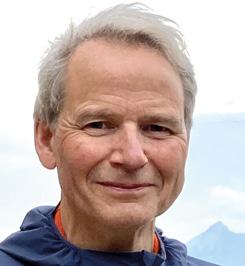
From Emeritus Fellow
Philip Mountford, “In the past 12 months I have worn as many ‘College hats’ as the UK had Prime Ministers in 2022 – but
in a less chaotic manner. At the end of the 2022–2023 year, as colleagues will recall, I retired from my joint appointment as a Tutorial Fellow, only to reappear at the start of 2023–2024 as a Stipendiary Lecturer and subsequently as an Emeritus Fellow. My lecturer role has allowed me to provide continuity of teaching and pastoral care until my replacement arrives at the end of this summer. It also allowed me plenty of time to pursue my interests in photography, football (now the proud(ish) owner of Chelsea FC men’s and women’s team season tickets) and trail hiking (I have recently completed the Pennine Way, Coast to Coast trail and West Highland Way), and to make the most of all my gallery memberships in London and elsewhere. I honestly don’t know how I ever found time to work!”
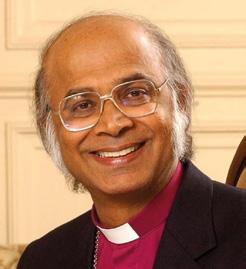
Michael Nazir-Ali reports: “One outstanding event in the last year has been the publication of my book The Mission and Ministry of the Church in England by T&T Clark. So far, this has had a good reception. I have been very grateful to SEH for hosting our ‘All Souls Seminars on Christian Encounter with Sufism’ after we had to move from All Souls itself. In the last year, I have also had the privilege of teaching at the Angelicum in Rome on the nature and meaning of personhood and then on Anglican-Catholic dialogue. It has also been good to continue my lectures at Forman Christian University, Lahore, on different aspects of Muslim-Christian dialogue.
An invitation to join the Board of The Round Table: the Commonwealth Journal of International Affairs has led to writing for it on a number of issues relating to the role of religion in both conflict and peacemaking. My interest in questions of
religion and culture was addressed in the annual lecture at Allen Hall, the Catholic Seminary in London. There was vigorous feedback from the students as there was also to my lecture on Anglican patrimony within the Catholic Church at the Inaugural Benedict XVI Lecture!
I am a founder member of the Oxford Centre for Mission Studies which enables research by scholars from the majority world in matters relevant to their work. Last year, they celebrated their 40th anniversary! A matter for profound thanksgiving. I am very glad to be associated with the work of SOPHOS which is seeking to assist young people in Ethiopia and elsewhere in Africa through vocational guidance and a commitment to moral engagement and national integration.
It was a real honour to attend a meeting of Catholic bishops from Central and Eastern Europe, several of whom had lived costly lives under Communist regimes. There is so much to learn from them. In this connection, it has been good to engage with Foreign, Commonwealth and Development Office Ministers and Civil Servants on the UK’s commitment to promote freedom of religion and belief through its diplomatic missions.
This year has seen some significant developments in Religious Education in schools. We hope that this dialogue will continue with the new Government. I continue to chair a broad-based coalition on education which seeks to maintain dialogue with the DfE, Ofsted, MPs, etc.
An eventful year again and more to come!”
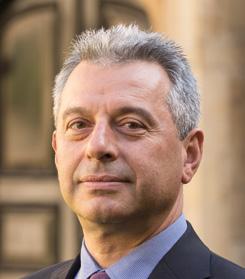
The year for Dimitrios Tsomocos, Professor of Financial Economics and Fellow by Special Election, began with a presentation at the 2023 ASSA Annual Meeting of
the International Banking, Economics, and Finance Association (IBEFA) in New Orleans.
Dimitrios has also spoken at events organised by the National Bank of Slovakia in Bratislava, the Central Bank of Albania in Tirana, and at the Delphi Economic Forum in Delphi. He attended academic conferences at the Center for Latin American Monetary Studies (CEMLA) in Mexico City, at both Charles University and V.S.E. University in Prague, at the University of Cape Town and at the University of Cyprus in Nicosia.
Dimitri’s publications this year include ‘Support for Small Businesses amid COVID-19’, written with C.A.E. Goodhart and Xuan Wangin, Economica, Volume 90, Issue 358; ‘Bank Credit, Inflation, and Default Risks over an Infinite Horizon’, with C.A.E. Goodhart and Xuan Wang in Journal of Financial Stability, Volume 67; ‘Resolution Mechanisms Revisited: Towards a New Era of Restructuring’, with Aneta Hryckiewicz and Natalia Kryg in Journal of Financial Stability, Volume 67; ‘Optimal Bank Regulation In the Presence of Credit and Run-Risk’, with Anil Kashyap and Alexandros P. Vardoulakis in Journal of Political Economy, Volume 132, Number 3; and ‘On Bankruptcy in General Equilibrium with Uncertainty’, with Klaus Ritzberger in Journal of Economic Theory, Volume 218.
Three further articles are forthcoming in 2024: with M. U. Peiris and A. Sokolova ‘Capital Flow Freezes’ in Economic Theory; ‘ A Computable General Equilibrium Model of the Monetary Policy Implications for Financial Stability in South Africa’, with C. Beyers, K. A. Essel-Mensah and R. Seymore in the South African Journal of Economics; and finally ‘Commodity Cycles and Financial Instability in Emerging Economies’, with M.U. Peiris and A. Shirabokov, in Annals of Finance
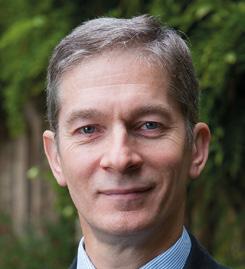
Newly-minted Emeritus Fellow Rob Whittaker reports that a key highlight of the past year was the Geography reunion held in College in September 2023, which provided a great opportunity to catch up with former students and colleagues.
Since retiring from his post at the end of September, Rob has enjoyed teaching a couple of modules for the University of Exeter’s Island Biodiversity and Conservation MSc, which is run through the Jersey International Centre for Advanced Studies. One of these modules took the form of a field course to Tenerife, meaning that Rob got to lead two Tenerife field courses in the first half of 2024; the
other one being for Oxford’s Biodiversity Conservation and Management MSc course.
Rob also participated in the International Biogeography Society’s biennial meeting, held in Prague in January 2024, where he was presented with the Alfred Russel Wallace award for his contributions to biogeography.
In July, Rob gave the opening keynote on ‘Biodiversity and Conservation of Macaronesia’ at the Calpe conference ‘Islands in the sun’ in Gibraltar and had the opportunity to visit Gorham’s Cave World Heritage Site, one of the last known homes of Neanderthals in Europe.
In June 2024, Rob was elected as a member of Academia Europaea.
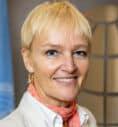
Mette Morsing was sworn in as a Fellow by Special Election at the start of Michaelmas term having been appointed Director of the Smith School of Enterprise and the Environment and Professor of Business Sustainability earlier in the year.
Mette leads a team of scholars committed to achieving net zero and the UN Sustainable Development Goals (SDG) through interdisciplinary, international and impactful teaching and research. She also serves on numerous councils and advisory boards worldwide (USA, Europe, Asia, China, UK).
She previously served at the United Nations in New York, where she led Principles for Management Education, the UN’s largest initiative for the development of responsible management education, working with over 800 universities and
business schools to transform leadership education in line with the UN SDG
Prior to her UN appointment, Professor Morsing held prestigious professorial positions at the Copenhagen Business School, where she was the Founding Director of the Centre for Corporate Sustainability, and the Stockholm School of Economics, where she served as Executive Director of the Mistra Centre for Sustainable Markets (Misum).
Her research has won international awards and recognition, and she is an invited author, researcher and speaker globally. She has published extensively in some of the world’s most highly regarded academic journals on business and sustainability and recently co-edited the textbook Corporate Sustainability: Managing Responsible Business in a Globalised World (Cambridge University Press, 2023).
Mette’s area of research expertise is on organisation theory and corporate sustainability, with a focus on governance, strategy, communication, identity and cross-sector partnerships.
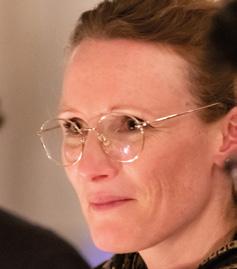
Katharina Marquardt was elected as a new Associate Professor and Tutorial Fellow in Materials on 1 October 2023.
Katharina additionally holds a Visiting Reader position at Imperial College London. Her expertise ranges from experimental geology to nanoscale properties of materials and particularly grain boundaries, their distributions and properties – critical to increasing the performance of materials for the energy transition.
She was a visiting researcher in the Materials Science Department at Carnegie Mellon University, Pittsburgh, USA, and at the National Center for Electron Microscopy (NCEM), Berkeley, USA. In the former institute, she worked on advanced electron backscatter diffraction (EBSD) techniques for grain boundary characterisation to enable comprehensive studies of how these interfaces alter material properties. At NCEM she characterised the transport properties of grain boundaries on the nm scale for advanced laser ceramics and diffusion in Earth materials.
Katharina’s research spans a wide range of challenges related to interfaces such as grain and phase boundaries in crystalline materials, from chemistry and physics to statistics of interface distributions and their adaptation during changing physical conditions.
Katharina’s recent focus has been on addressing fundamental scientific challenges that enable the design of new
materials by tailoring their grain boundary populations and possibly accelerating our transition to a net-zero carbon society. Examples include: the role of interfaces to tailor interface properties, the role of grain boundaries in hard materials and materials for cladding in nuclear fusion reactors, but also interfaces and their role in element partitioning in rocks.
Katharina’s research group works on designing new microstructures to enhance Na-Ion battery durability and performance, and develop new protocols for comprehensive characterization of the distribution of interfaces.

David Moreno Mateos has been elected Associate Professor in Physical Geography and Tutorial Fellow in Geography.
David got his PhD from the Spanish National Research Council (CSIC) and the University of Alcala, both in Spain, with honours in 2008. He then undertook postdoctoral fellowships at the University of California at Berkeley, Stanford University and the Centre National de la Recherché Scientific (CNRS) in France. He has been awarded an Ikerbasque fellowship from the Basque Country government and a Ramon y Cajal fellowship from the Government of Spain to join the Basque Centre for Climate Change – BC3, where he is now a Research Professor (part-time). David has authored more than 50 papers in scientific journals and books, including papers in Nature Communications, Nature, PLoS Biology, and Nature Ecology and Evolution.
David studies patterns and mechanisms that shape the recovery of ecosystems after anthropogenic disturbance over long periods of time (centuries to millennia). He says of his research, “We aim to detect global recovery patterns and mechanisms
that could help us improve current efforts and strategies aiming to restore degraded ecosystems and conserve ‘undisturbed’ ones. We combine observations and experimental research with analytical reviews in ecosystems in all impacted biomes, from the arctic to the tropics.”
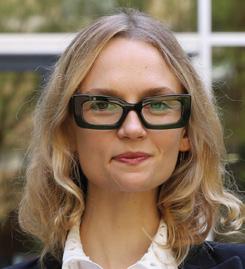
Brooke Marshall is the new Sir Richard Gozney Fellow and Tutor in Law
She teaches Contract and Roman Law for the Hall and Conflict of Laws for the Law Faculty.
Before coming to Oxford in 2023, Brooke taught Law for a number of years as a Senior Lecturer at the University of New South Wales, in Sydney. She previously worked as a Senior Research Fellow at the Max Planck Institute for Comparative and International Private Law in Hamburg where she wrote her doctorate. She holds a Dr iur (summa cum laude) from the University of Hamburg and a BA (French) and LLB (Hons) from The University of Queensland.
Outside academia, Brooke has practised as a litigation lawyer at Allens Linklaters, Brisbane, and worked at the Dutch intergovernmental organisation, the Hague Conference on private international law.
She is a laureate of The Hague Academy of International Law Diploma and of the ICC Institute of World Business Law Prize for excellence and innovation in international commercial law.
Her book Asymmetric Jurisdiction Clauses was published by OUP in 2023. Building on some of the work begun in that book, her current research explores the intersection between private international law and adjacent areas of international law.

Nicolas Fréry joined the Hall as a Junior Research Fellow in Modern Languages in October 2023. He is also the Astra Foundation Research Fellow at the Voltaire Foundation.
After studying at the École normale supérieure and passing the agrégation de lettres modernes, Nicolas completed his PhD at the Sorbonne in 2022. He was a postdoctoral fellow at the University of Strasbourg prior to joining the Voltaire Foundation as the Astra Foundation Research Fellow in Textual Scholarship.
He studies 18th-century French literature, focusing on the relationships between fiction and philosophy, on intertextuality, and on representations of reading. He has published articles about Marivaux, Prévost and Rousseau, and he is currently finalising a monograph on Marivaux’s thought.
Outside his century of specialisation, he has a strong interest in the works of Pascal and in Baudelaire.
Nicolas has also been involved in the publishing of critical editions of several texts: he has worked on the edition of Voltaire’s Anti-Pascal (Oxford, 2020), of his letters to his niece Marie-Louise Denis (Paris, 2023), of Courtilz de Sandras’ Mémoires de B*** (Paris, forthcoming), and he is working with the editorial team of the Voltaire Foundation to produce a new digital edition of Voltaire’s La Henriade and La Pucelle d’Orléans.
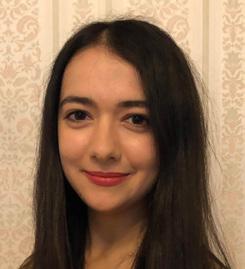
Elena Violaris is a Junior Research Fellow in English at St Edmund Hall and a Leverhulme Early Career Fellow. She joined the Hall on 1 October 2023.
Describing her research, she says “A common theme that unites the strands of my research is an interest in how literature engages with worlds and world-making, whether these worlds are expressed through stories-within-stories or cultures-within-cultures. My next research project is a comparative study of contemporary British postmigrant (i.e., descendants of migrants) literatures from different communities. My previous project investigated the relationship between levels and play in postmodern and contemporary American fiction, exploring narrative levels in metafiction, physical levels in architecture, and digital levels in computer games.
I have published or have forthcoming work on cognitive reasoning mechanisms in James Joyce’s Finnegans Wake; chaos theory and Shakespeare’s King Lear; consumption and play in the confectionery industry; and the semiotics of the yellow smiley face in David Foster Wallace’s Infinite Jest.”

Professor John Henderson joined the Hall as a Visiting Fellow in History in Michaelmas 2023.
John is Emeritus Professor of Italian Renaissance History, Birkbeck, University of London; Emeritus Fellow of Wolfson College, University of Cambridge; and a Fellow of the Royal Historical Society. He is Director of the research project ‘Public Health and Private Health in Pre-Modern Italy’, at the Medici Archive Project in Florence. His research has been supported by the Wellcome Trust while at the Cambridge Department of the History and Philosophy of Science and later at Birkbeck. He has held fellowships at Villa I Tatti, the Harvard Center of Renaissance
Studies, Florence; and the École des hautes études, Paris.
John has long been interested in two major historical themes, which are as relevant today as they were in renaissance and early modern Europe. The first is the way in which society deals with poverty –by examining the poor relief and welfare structures in the past we can discover not just the origins of present systems, but also the enduring attitudes and prejudices towards poorer members of our society. The second is how society has coped historically with epidemics, especially the two major diseases which dominated this period: plague and syphilis. Once again, examining reactions in the past to emergencies caused by both acute and chronic epidemic disease can help us to understand why and how societies of the 20th and 21st centuries reacted to new epidemics, brought into focus most recently by Covid. His approach is inter-disciplinary with as much emphasis placed on written sources as on visual and material culture.
John’s most recent books include: Florence Under Siege: Surviving Plague in an Early Modern City (Yale University Press, 2019; translated: La peste di Firenze. Come la citta’ sopravvisse alla terribile epidemia del 1630-1631, Rome: Newton Compton, 2021); Plague and the City, edited with Lukas Engelmann and Christos Lynteris (Routledge, 2019); and Representing Infirmity: Diseased Bodies in Renaissance Italy, edited with Fredrika Jacobs and Jonathan Nelson (Routledge, 2021). He has recently completed an interdisciplinary study for Cambridge University Press on the Great Pox in the Renaissance. He is co-editor with Jonathan Nelson of the CUP book series Renaissance Elements, and with Peter Howard of the Routledge series The Body and the City.
While at the Hall, John contributed to the teaching of the History Special Subject course ‘Politics, Art and Culture in the Italian Renaissance: Venice & Florence, c. 1475–1525’.

In Hilary term we were joined by Professor Jenny Andersson as a Visiting Fellow. Jenny is an extremely distinguished scholar in intellectual and economic history and is currently Professor of the History of Ideas and Science at Uppsala University, Sweden.
Prior to this she was attached to the French Centre national de la recherche scientifique (CNRS) and to Sciences Po, Paris. She has worked on a number of themes, including the history of futurology in the Cold War era for which she had a European Research Council grant. She is currently writing on the history of neoliberalism in the Nordic states, with a grant from the Swedish Rijksbank.
Her publications include The Future of the World: Futurology, Futurists, and the Struggle for the Post Cold War Imagination (Oxford University Press, 2018); The Library and the Workshop: Social Democracy and Capitalism in the Knowledge Age (Stanford University Press, 2010); and Between Growth and Security: Swedish Social Democracy from a Strong Society to a Third Way (Manchester University Press, 2006).
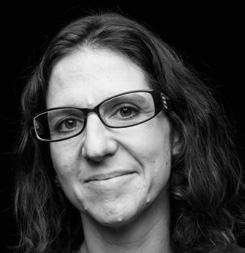
Maya Jewell Zeller joined the Hall as a Visiting Fellow for Trinity 2024.
Maya is the author of out takes/ glove box, chosen by Eduardo Corral as winner of the New American Poetry Prize, as well as the interdisciplinary
collaboration with visual artist Carrie DeBacker, Alchemy for Cells & Other Beasts (Entre Rios Books, 2017); the chapbook Yesterday, the Bees (Floating Bridge Press, 2015); and the poetry collection Rust Fish (Lost Horse Press, 2011). She is co-author, with Kathryn Nuernberger, of Advanced Poetry: A Writer’s Guide and Anthology (Bloomsbury Literary, January 2024) and co-editor, with Sharma Shields, of the multi-genre anthology Evergreen: Grim Tales and Verses from the Gloomy Northwest (Scablands Books, 2021).
Maya’s prose appears in The Rumpus, Diagram, Brevity, Bellingham Review, Booth Journal, and in several anthologies, including the New York Times-bestselling This is the Place: Women Writing About Home (Seal Press, 2017) and the forthcoming Environmental and Nature Writing (Bloomsbury, 2025). Additionally, her essay “Scavenger Panorama” was selected by Vivian Gornick as a Notable in Best American Essays 2023.
Recipient of a Promise Award from the Sustainable Arts Foundation as well as a Residency in the H.J. Andrews Experimental Forest, Maya has presented her work internationally at the University of Oxford and in Madrid at the Unamuno Author Festival. Currently, she is Associate Professor of English for Central Washington University and Affiliate Faculty in Poetry and Nature Writing for Western Colorado’s low-residency MFA. Her works in progress include a memoir-in-essays, ‘Raised by Ferns’ (runner-up in the 2022 AWP Sue Silverman Prize for Creative Nonfiction), a novella-in-vignettes, a novel and two poetry collections.
Maya’s research interests include documentary poetics, ecopoetics (especially necropastoral and pastoralisms), prose poetry and hybrid
forms, experimental literatures, literatures of social class, environmental justice, contemporary poetry, ekphrasis and other collaborative and interdisciplinary communities.
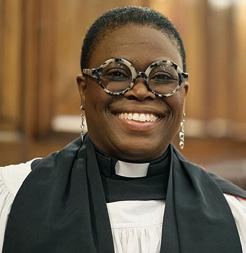
Reverend Dr Mariama
Ifode-Blease is the new College Chaplain and joined the Hall in February 2024.
Mariama is Head of Education at the Salters’ Institute and Company in the City of London and combines this role with being a part-time priest at St James’ Piccadilly. Prior to this, Mariama worked in secondary and tertiary education, and community outreach. She has worked in the public sector for more than 15 years.
She is a modern linguist, having completed her degrees at the University of St Andrews and University of Cambridge. Mariama is a Fellow of the Higher Education Academy, a Fulbright Scholar and a qualified career guidance professional. She completed an MA in Careers Education and Coaching at the University of Derby and her theological training at Ripon College Cuddesdon in Oxford.
Committed to equity and inclusivity, Mariama loves working to empower and enable all to fully flourish and thrive.

Carlos Rodríguez Otero became Director of Music in July 2024.
Carlos was born in Santiago de Compostela and grew up in Bristol, learning the violin and piano. He read Music at Queens’ College, Cambridge, where he was a Choral Scholar, and was later a Tenor Lay Clerk at St John’s College, Cambridge, from 2021 until 2024. During 2018–2021, Carlos was Director of the Fisher House Schola Cantorum and has ample experience directing choral and orchestral projects across the UK. He has an active performing life as a tenor –regularly singing with Tenebrae and other concert and church choirs – and enjoys teaching music to all ages, supervising early European history, harmony and counterpoint for the Faculty of Music at Cambridge. He is also an active composer. Carlos’ general research interest is in medieval and early modern music in England, Spain and Italy, focusing on liturgical music, music and ceremony, performance practice, compositional techniques, early music theory, harmony and counterpoint. He is currently finishing a PhD in sixteenth-century sacred music in Galicia (Spain), supervised by Professor María José de la Torre Molina and Professor Iain Fenlon at the University of Malaga.
SCR obituaries can be in found in Section 9.
I am not quite sure where the last two years have gone, but as the saying has it ‘time flies when you are having fun’. I can certainly say that being a member of Teddy Hall is rewarding, hard work and, since I passed 40 years Bursaring in Oxbridge last autumn, I am delighted it remains stimulating and enjoyable.
Much of that is because we are a great team – whether the staff under my care, or the wider staff and Fellowship, or the whole College. The Hall’s reputation for friendliness is justified, especially in the context of the community, not just its individuals.
With that in mind, I reflect on the fact that in the last year we have had some staff changes as folk retire or develop their careers elsewhere, and we have been fortunate in our recruitment of very good people.
The changed arrangements for gardening, mentioned last year, have proved highly successful under the caring watch of the Garden Fellow, Professor Mark Williams. The Front Quad is now a riot of colour, rolling through the seasons, while great improvements have been made in the other quads, and at Norham St Edmund (NSE).
The Norham Project is going very well – the site is now devoid of the outdated 70s and 80s buildings, and the old Gym; there are very large holes in the ground forming the basements of each of the three new buildings. The groundwork and piling to make the site ready for excavation was considerable. During the course of it, the archaeologists discovered a Roman brooch in what they said was a former agricultural field ditch. The item
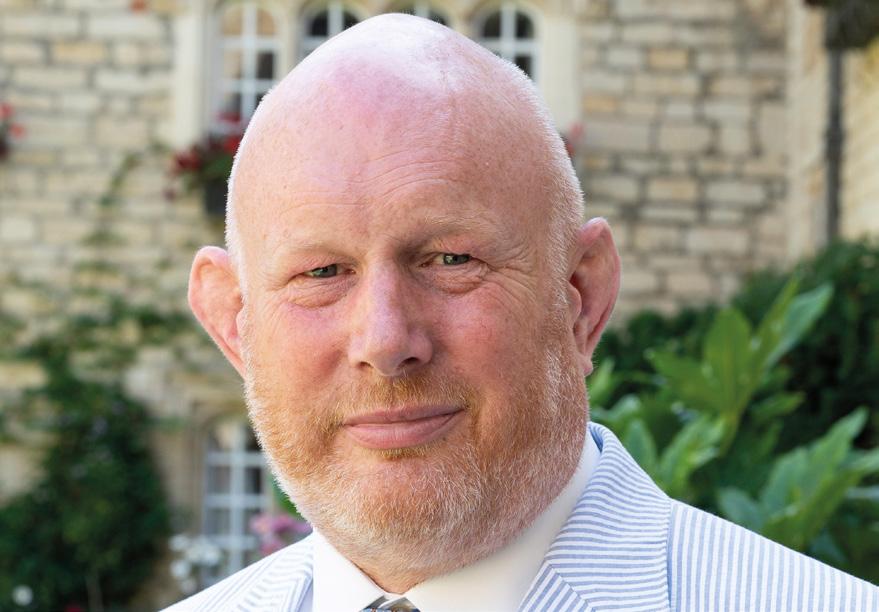
is now in the care of the College, and I hope that in time it may be on display in a suitable housing in the entrance lobby of the Villa building. The Victorian no. 17 is well underway with its restoration and re-ordering.
We still expect completion to be in the Spring of 2026, giving time for furnishing prior to occupation in Michaelmas term.
Elsewhere on the College estate we have been busy with the conversion of 2 Crick Road to create nine further student rooms, and at 8 Circus Street to provide another three. The summer is the season for a variety of unseen and often unexciting but vital works to roofs, power supplies, and upgrades to the latest piece of regulatory legislation (a never-ending task). By the time this in print, I hope the Library will have had mesh protectors fitted to the west window (to prevent the windows being broken by vandals), and a lightning conductor installed. Both of these are slow processes as they require not only local authority consents but also a faculty from the Diocese of Oxford.
A project at an early stage of development, but which I hope might come to fruition in the next year, is the conversion of the old Gardener’s office and equipment store
to a café. The intention is to have baristamade, quality coffee with appropriate equipment, and homemade cakes and biscuits, etc. made by the College Kitchen. The café, which will have indoor and outdoor seating, will be open to all current members of the College, but also to visitors including Aularians. This is ideally situated in the Graveyard and close to the Library; it will provide a great place to obtain high-quality coffee – as many other Colleges have found, such places are at least as popular as the Bar.
The most notable event of the year has been the Teddy Hall Ball, held on 27 April, the Saturday of 1st week of Trinity. Guided, and sometimes directed, by the Bursary, the Finance Bursar and the Ball Fellow, the student committee did a great job. They were well led by Ashmeet Bhaumik (2022, History and Modern Languages) who did a fantastic job on the night, not least when battling with the incessant rain. Fun was had by all.
Our conference, summer school and events business continues to go from strength to strength. Attracted by our welcoming staff, our facilities, great food, and location, the Hall is a popular venue for many. So busy are we that planning works around occupancy is quite a challenge. But this is a vital part of the College’s economy and it is pleasing we are able to bring in not just volume but also quality business. Once the NSE project is completed, we will also be looking to make use of those rooms each summer.
We have said farewell to a number of staff in the last year.
Paul Solesbury retired from the Hall after 25 years of service as a Scout at Queen’s
Lane. We thank Paul for his outstanding contribution to College life, especially his unceasing work keeping the Library spic and span.
Thanks also to Ventura Da Conceicao who has been a Kitchen Porter for the last 18 years and has been a valued and well-respected member of the College community and a great support to the Kitchen brigade.
Other long-serving members of staff who we said goodbye to this year include:
• Abhimanyu Arni – Junior Dean
• Heather Barr – Graduate Trainee Library Assistant
• Elinor Buys – Assistant Junior Dean
• Toby Cherrill – Accounts Assistant
• Barry Fiddes – Scout
• Tom Gallagher – Carpenter
• Benny Pinto – Chef de Partie.
College Chaplain Revd Dr Zachary Guiliano moved to a new post at Oxford Cathedral at the end of 2023, and in February this year we welcomed Revd Dr Mariama Ifode-Blease as our new Chaplain. The new Director of Music Carlos Rodríguez Otero joins us in the summer and will lead the annual Choir tour to Pontigny.
It’s been another busy year for recruitment across the Hall and we are also delighted to welcome the following people:
• Emily Craven – HR & Academic Assistant
• Radhika Thiagarajan – Governance Officer
• Laura Ellis – Communications Manager (maternity cover)
• Yuliia Kushnirenko – Accounts Assistant
• Lydia Smith – Regular Giving Officer
• Rebecca Rainey – Development Operations Officer
• Francisco da Sousa Guterres – Scout
• Pedro Magno – Scout
• Lena Fiddes – Scout
• Zito Araujo – Scout
• Toyin Atalabi – Lodge Porter
• Ketrina Petrova – Lodge Porter
• Sam Akram – Lodge Porter
• Aida Amarel – Catering Assistant
• Andrea Calia – Junior Sous Chef
• Juan Ramirez – Sous Chef
• Jaime De Axis – Kitchen Porter
• Kate Feeley – Second Pastry Chef
• Tom Leach – Carpenter
• William Dallimore – General Maintenance Assistant, East Oxford
The Hall has made good financial progress in the 2023/24 financial year building on the positive results from 2022/23, which returned a small surplus following two difficult years of financial turmoil as a result of the Covid pandemic. This is in no small part due to the efforts of the staff at St Edmund Hall to maximise our income out of term time by ensuring the use of facilities is maximised, with conference and summer school income this year surpassing previous years by a significant margin. Surpluses are vital as they enable us to build reserves for the future, which can be used for our core purpose of academic learning and research, and to also enhance and update our ageing estate which is a continuous draw on resources.
• Sam Allen – Assistant Junior Dean, Tamesis
• Aneesh Aggarwal – Assistant Junior Dean, Queen’s Lane
• Zoe Stamoulis – Assistant Junior Dean, Norham Gardens.
Finally, we have been delighted to welcome a number of new arrivals to the wider College family: in Housekeeping, Aneta Palar had a baby girl named Amelia; Payroll and Finance Officer Diogo Mendes Campos had a baby boy, Vicent.
Bar Manager Hayley Goodgame and her husband Estates Administrator Lionel Knight welcomed their son Rhodes; Communications Manager Claire Parfitt’s new daughter is called Darcey and Deputy Head Butler Craig Hughes’ daughter Wren was born in August.
Mark Blandford Baker, Domestic Bursar and Fellow
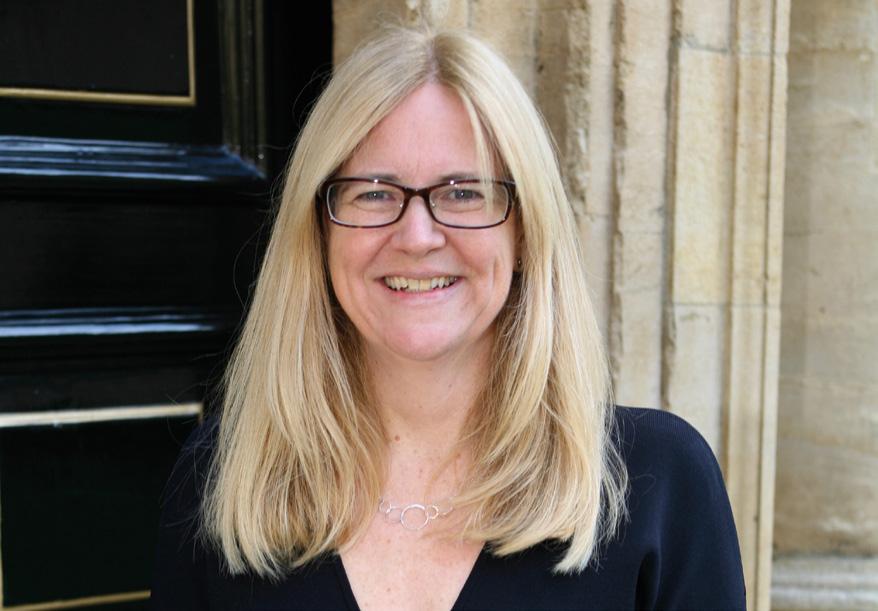
The timing of the Magazine’s publication means that the 2023/24 accounts are still three months away from being completed, but previous sets of accounts can be found on the website.
In addition to the day-to-day financial running of the College, there has also been constant oversight of the Norham Gardens student accommodation project, with the Main Contract being let in December 2023 with SDC Builders Ltd. The project team is working very well together, and we are currently on track for completion in Hilary term 2026. The £40m project is being funded both through philanthropy, College funds and from the proceeds of the Private Placement that was taken out in 2017. Fundraising for the Norham Project continued to be a focal point this year and we remain grateful to those alumni who have been so supportive. It is very pleasing to know that there is only one more academic year to go before all new undergraduates will have the opportunity to live in College accommodation for their entire degree should they wish to do so.
Each year the Hall makes an application to the University’s College Contributions Committee (CCC), which distributes income grants to the less wealthy colleges, financed by wealthier colleges. This year, we made another successful bid, being awarded £188,500. £131,500 is to be used for maintenance projects, including replacing the Kitchen floor and upgrading the wiring through to the College Library. The remaining £57,000 will be used to partially fund the costs of a new Tutorial Fellow in Philosophy over the next three years, with the position due to be appointed in Michaelmas 2024. The College match-funds most of these awards from its general reserves. This award brings our total income from CCC
over the past ten years to £2.8m.
The Hall’s endowment funds were valued at £68.2m at 31 July 2023. The final valuation of the endowment funds at 31 July 2024 is not yet finalised, but initial indications suggest a final valuation of circa £72m after taking into account the transfer to income of £2.5m under the Hall’s agreed 3.5% spend rule. The 2023/24 accounts will be published towards the end of the calendar year, when a more detailed analysis will be shown. The Investment Sub-Committee has, again, been particularly active and I am grateful to the members of the Committee, especially the external members, for their support. The College holds its investment funds with two managers: Rathbone Greenbank and the Oxford Endowment Fund (OEF). Much of the Rathbone Greenbank portfolio was liquidated during the year with the proceeds being invested in cash liquidity funds to be used for the monthly costs associated with the Norham Gardens Project. The Hall’s investment policy can be found on the College website, with the key aim to manage and invest the entire portfolio in holdings that meet agreed environmental, social and governance (ESG) criteria.
Finally, my thanks go to Stephanie Hanks, our College Accountant, and the rest of the Finance Department who continue to perform an exceptional service behind the scenes.
Eleanor Burnett, Finance Bursar and Fellow

It has felt like an extremely busy year in the Library this year. I’m glad to say that the statistics bear this out. On average during term time 167 students a day have been using the Library; in Michaelmas term 2023 average use reached 171 students a day – this is the highest figure since extant records begin in 2008. Our book loans too have seen a significant recovery and are now back above prepandemic lending levels. It is really heartening to see that, alongside the formidable array of electronic resources available, the printed book still plays a major role in students’ studies. This year we have added over 2,893 items to the working collection.

Thanks to the generosity of a small group of Aularian donors we were able to acquire for the Old Library an early 16thcentury Sammelband of five devotional works,
including one attributed to St Edmund of Abingdon:
• Thomas à Kempis, Ortulus rosarum in valle lacrimarum. S Bernardus de cura et modo rei familiaris utilius gubernande. (Cologne, 1513)
• St Edmund of Abingdon [attr.], Speculum religiosorum (Paris, 1509)
• St Thomas Aquinas, Confessionale seu libellus optimus beati Thome de Aquino: de modo confitendi: et de puritate conscientie cuilibet confessori et confiteri volenti perutilis et necessarius (Cologne, 1508)
• Henricus de Hassia, Secreta sacerdotum que in Missa teneri debent multum utilia (Cologne, 1502)
• St John Chrysostom, De Cordis Compunctione Augustinus de Contritione cordis (Basel, 1490)
The Library did not previously hold any work attributed to St Edmund published before the 20th century. Speculum Religiosorum was printed only once, in Paris in 1509 by Jean Petit, a prolific
printer who produced more than 1,000 individual titles. The work is exceptionally rare; only five copies were known to survive prior to our acquisition of a copy.

Of the other works in the compilation, three survive in fewer than ten copies worldwide, none are held in Oxford, only one in Cambridge. This volume is a significant increase in the early-printed holdings of the Old Library, our pre-1500 holdings have increased by a third and our pre-1520 books by 70%.
All five works are beautifully printed, several have woodcut-illustrated title pages or colophons, others have illustrated capitals, have been carefully rubricated in red ink or feature annotations from an early owner.
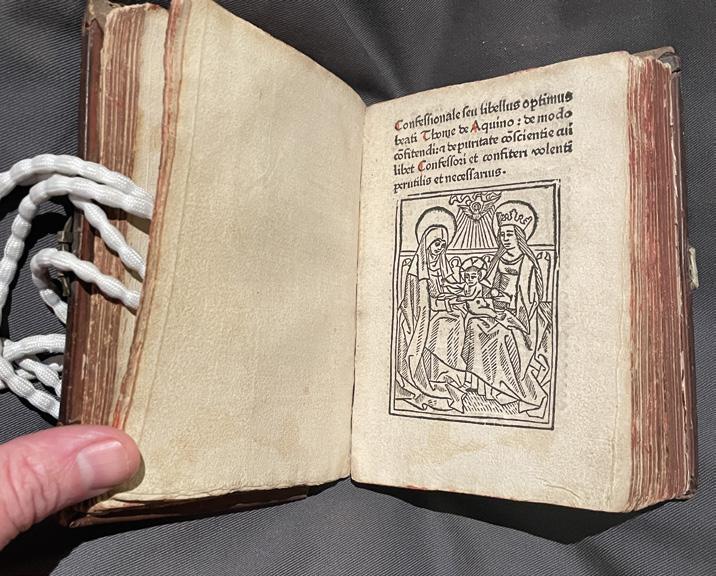
The Librarian is immensely grateful to the donors for their generosity as well as to Andrew Vivian, Director of Development, Finance Bursar Eleanor Burnett and Library Fellow Andrew Kahn for their help and support in organising the acquisition.
In March we were contacted by Tom Merrick (Keble, 1963) who, while clearing a relative’s home, discovered a 1649 Latin edition of Eikōn basilikē with an ownership inscription of James Langton (mat. 1724) dated 1729 while he was still in residence at the Hall. Mr Merrick has generously donated the book to the Old Library.
Eikōn basilikē,a spiritual autobiography purportedly written by Charles I on the eve of his execution, is a major work of Royalist propaganda. This particular edition is only held by the Bodleian, Christ Church, Queen’s and Worcester in Oxford.
Five large exhibitions have been mounted this year in the Old Library. In October, the Graduate Trainee curated a Halloweenthemed exhibition. This proved very popular and was visited by more than 300 people during two public openings on 29 and 31 October.

In November, the Librarian curated an exhibition of items related to St Edmund, including the newly acquired 16th-century Sammelband and the two relics of St Edmund owned by the College, to coincide with the celebration of his feast day on 16 November.
In Hilary term, the Deputy Librarian curated an exhibition as part of the Hall’s celebrations for International Women’s Day. It featured items from the collection with female ownership inscriptions or authors as well as items from the College archive and art collections.
In Trinity term, we organised an exhibition on the Roman Empire to complement the display of a 1st-2nd century AD broach discovered at Norham Gardens. We were already in the process of organising a Roman exhibition when the find provided a very serendipitous centrepiece! Finally, at the end of the academic year we celebrated the arrival of the first Aularian Prime Minister with an exhibition celebrating Aularian MPs, their works and their gifts to the Hall.
We aim to have public openings of the Old Library every term, usually on Bank Holidays or at the start of Oxfordshire half-terms. Please do look out for announcements. If you are visiting Hall and get in touch in advance we would love to open the Old Library for you and any guests to see our amazing treasures.
We have received 295 books in 2023-24 from Aularians, Fellows, current students and others for the Working, Aularian and Fellows Collections and for the Old Library. We received substantial donations of books this year from the estate of Eric Caines (2005, History), Malcolm Trevor
(1953, Modern Languages) and Stephen Leonard (1978, Jurisprudence) and his wife Luxue Yu. Stephen and Luxue also continue to support the purchase of books on Chinese and East Asian Studies, as they have for the last six years. Another notable donation was an inscribed set of academic and literary works by Gabriel Josipovici (1958, English; Honorary Fellow)
Emma Carter has been promoted to Deputy Librarian; this reflects her outstanding work since joining the College in 2022.
We sadly said goodbye to Heather Barr, who has been Early Career Graduate Trainee Library Assistant for the last three years. She has completed her MA in Library and Information Studies at University College London and is going onto a role at the NSPCC Library. Heather is a passionate, innovative and extremely hardworking librarian and will be much missed by students and staff.
I am very proud of our trainee post which, uniquely in the University, involves not only not only participation in the Bodleian’s long-running Graduate Trainee scheme but also support from College for a parttime Library Masters qualification.
Jake Banyard, a recent graduate in History and French from the University of Reading has been appointed the new Early Career Graduate Trainee and will start at the beginning of September. He is currently working for Dorset Public Libraries.
Professor Andrew Kahn has served his first year as Library Fellow and we are immensely grateful for his support, wise counsel and unceasing advocacy for the Library.
Over the year the Library was the beneficiary of many gifts for the Aularian Collection, which are listed below:
ALEXANDER, J.H., (1959, English) ed. Dickens, Charles
The Oxford Edition of Charles Dickens: The uncommercial traveller OUP, 2024
The Oxford Edition of Charles Dickens: The life and adventures of Nicholas Nickleby volumes 1 -2 OUP, 2024
BRATBY, Richard (1991, History)
Classical Music: An illustrated history NQ Publishers, 2021
Refiner’s Fire: The academy of ancient music and the historical performance revolution
Elliott & Thompson, 2023
Cooksey family in memory of COOKSEY, Sir David (1959, Metallurgy, Honorary Fellow)
Nothing Ventured, Nothing Gained: Turning Good Science into Good Business Whitefox, 2024
BRIGGS, Adrian (Emeritus Fellow) Conflict of Laws, 5th edition OUP, 2024
CROSSLEY-HOLLAND, Kevin (1959, English, Honorary Fellow) illustrations by Riddell Chris King Alfred and the Ice Coffin Walker Studio, 2024
DIEPPE, Tim (1989, Mathematics) with Pelota, Beth
Questions to ask your Muslim friends: A closer look at Islamic Beliefs and Texts Wilberforce Publications, 2022
Edwards, Jonathon with an introduction by Dieppe, Tim
Original Sin Ezra Press, 2023
DUNBABIN, John (Emeritus Fellow)
The Longest Boundary: How the USCanadian Border’s Line Came to be Where it is, 1763-1910 2 vols Grovesnor House, 2024
GILLEY, Bruce
China’s Democratic Future: How it Will Happen and Where it Will Lead
Columbia University Press, 2004
The Right to Rule: How States Win and Lose Legitimacy
Columbia University Press, 2009
The Nature of Asian Politics
Columbia University Press, 2014
The Last Imperialist: Sir Alan Burns’ Epic Defense of the British Empire Regnery Gateway, 2021
In Defense of German Colonialism: And how its Critics Empowered Nazis, Communists and the Enemies of the West Regnery Gateway, 2022
GORDON, Keith (1988, Mathematics) Taxpayer Safeguards: Rights and protections for individuals
Claritax, 2024
Residence: The Definition in Practice Claritax, 2024
HILL, Jeffrey (1962, History)
The Western: a personal history Orchard, 2023
HOPPER, Helen (1987, PPE) and Harcup, Joy
The Art and Psychology of Board
Relationships: The Secret Life of Boards Routledge, 2024
JONES, David (1969)
‘Regulation and Inspection of Social Work: Costly Distraction or Stimulus to Improve?’ in
Bamford, Terry and Bilton, Keith (eds)
Social Work: Past, Present and Future Policy, 2020
JOSIPOVICI, Gabriel (1958, English, Honorary Fellow)
Words, Victor Gollancz, 1971
Mobius the Stripper: stories and short plays
Victor Gollancz, 1974
The Air we Breathe Harvester Press, 1981
Heart’s Wings and Other Stories
Carcanet, 1988
A Life London Magazine editions, 2001
Hamlet on Fold
Yale University Press, 2016
100 Days
Little Island Press, 2021
LÄHNEMANN, Henrike (Professor of Medieval German Literature and Linguistics, Professorial Fellow) and Schlotheuber, Eva
The Life of Nuns: Love, Politics, and Religion in Medieval German Convents Open Book, 2024
Luther, Martin
Giesler, Florian, Lähnemann, Henrike and Powell, Timothy (eds)
‘Mönchkalb’ and ‘Ursache und Antwort’: Two Anti-Monastic Pamphlets from 1523
Taylorian, 2023
MANNERS, Ian (1961, Geography)
European Cartographers and the Ottoman World 1500-1705: Maps from the collection of OJ Sporanos
Oriental Museum of the University of Chicago, 2007
O’CONNELL, Peter (1987, Mathematics)
New Hymns, Old Tunes
Peter O’Connell, 2024
PHILLIPS, David (Emeritus Fellow)
A British Education Control Officer in Occupied Germany 1945-1949: The Letters of Edward Aitken-Davies
Routledge, 2024
POSTLES, Dave Fogg (1967, History)
Characteristics of the clergy: the Anglican experience in the late-Victorian transition in Leicestershire
Dave Fogg Postles, 2024
Ridler, Colin, son of RIDLER, Vivian (Emeritus Fellow) [Donor]
Ridler, Vivian
Diary of a Master Printer Perpetua Press, 2022
TYTLER, Graeme (1954, Modern Languages)
‘An Appraisal of Catherine and Heathcliff’s Love Relationship’ in Bronte Studies Vol 47/3
Routledge, 2022
WATHEY, Andrew (1976, Music) and Bent, Margaret eds
Fauvel Studies: allegory, chronicle, music and image in Paris, Bibliothèque Nationale de France, MS Français 146 OUP, 1998
WILLER, Robert (1963, Jurisprudence)
Western Labour Systems and the Emergence of Free Labour
New Generation Publishing, 2023
There were also many gifts of texts for the Undergraduate Library from Fellows, alumni, student members and others. This year particular mention must be made of the donations received from: David Aukin (1961, Jurisprudence), Elinor Buys (Junior Dean), Eric Caines
Over the last two years the College has initiated the slow process of refreshing and transforming the gardens on the main Queen’s Lane site. The intention is to build on the replanting of the Forum Garden – now a Jurassic Park of treeferns and huge-leaved tetrapanax – to bring out the beauty and variety of the Hall’s architectural spaces.
We began with Front Quad in October 2023. It is a difficult space to plant and has been the source of some headscratching: one side is in permanent cold shade, the other in near-permanent hot sun. The borders on the south side are narrow, making it difficult to achieve the leafy fullness that characterises the planting in other college front quads at which I look with horticultural envy, Worcester and Corpus Christi being good examples.
We started with the most fundamental dimension of any garden: the quality of the soil. The Front Quad beds have been enriched with a tonne of organic manure, though as it was dug in, we found the soil health was even poorer than we had feared — little more than parched and stony dust in places.
(2005, History), Stephen Leonard (1978, Jurisprudence), and Malcolm Trevor (1953, Modern Langages).
Gifts were also received from: Kristiana Dahl, Elizabeth Daigle, Gregory Durston and Ellie Ryan amongst many others.
Thanks to everyone who has remembered the Library. We are grateful for the continued support we receive in this way.
James Howarth, Librarian and Fellow by Special Election

Many perennials in the borders were tired or at the end of their lives. These were dug out. They have been replaced by waves of mass planting: a thousand orange and burgundy tulips in April, then trailing blue cerinthe, drifts of allium ‘purple sensation’ and opium poppies, followed in high summer by scarlet and umber dahlias, red hemerocallis, and burnt-orange tithonia.
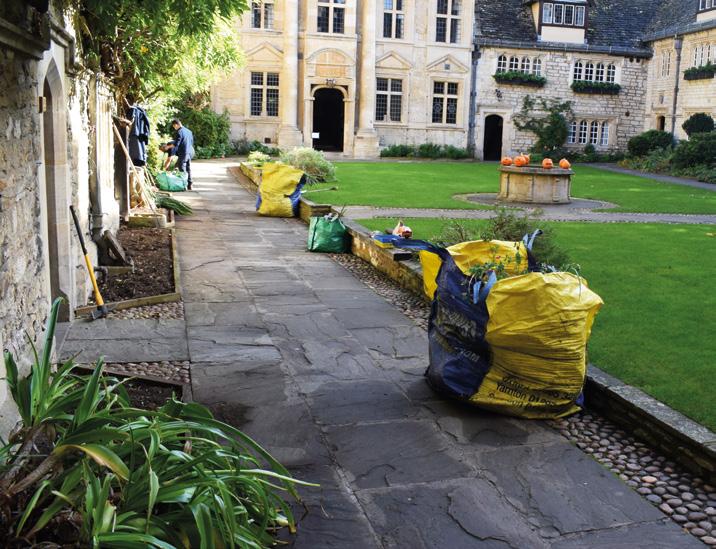

Not everything has gone quite to plan, as is the way with gardens. A batch of opium poppy seed – meant to provide stands of deep purple-black single flowers in June – turned out to be contaminated: we got flowers like a parade of frilly pink and purple Ascot hats instead, which irked me every time I looked at them. And later in the summer one ricinus plant grew to a monstrous, jungly size – while identical specimens a few feet away did not.
Next year we will be turning to the Graveyard and to the Broadbent Garden behind St Peter-in-the-East. The Broadbent was redesigned some 25 years ago thanks to a generous donation, but the time has come for it to be sensitively reworked. The box circle

has been replaced with gravel and a large olive tree, to give the garden a new focal point that will be able to stand up to the kind of heat we experienced in summer 2022. Gradually too the borders will be emptied and restocked, keeping those things which are in good health, but replacing plants which no longer flourish on the site. We hope too to cut back the lime trees, leaning over the wall from New College next door, which not only shade the borders in the Broadbent but also cover the plants with sticky aphid residue in July. There are plans afoot to make the Graveyard in front of the Library more attractive to wildlife by turning it into a more natural meadow. It seems to be working, as a fox was found wandering in broad daylight in Front Quad in September: it made a dash for the Graveyard!
It has been very heartening to talk to students, alumni and other visitors who have been enjoying the gardens over the last year. I hope the changes that are underway will continue to enhance the beauty of the Hall.
Mark Williams, Garden Fellow and Fellow and Tutor in English Language & Literature

The Chapel, at the heart of the Hall’s vibrant community, continues to offer a space of encounter, welcome, and quiet contemplation. We meet the Divine in word and music, and ourselves, as we take time to step out of routine, to celebrate, commemorate, or simply be.
This past year has been marked by change, which has shaped the life of the Chapel and its mission. The College community said goodbye to the Revd Dr Zachary Guiliano, former Chaplain and Career Development Research Fellow in Early Medieval History. Our thanks for his care of, and service to, the College community. We mourned the loss of Dr James Whitbourn, our Director of Music. A small service was held in May, at which present and former members of the Choir were in attendance. A College memorial service followed on Saturday 1 June, which was attended by members of the Hall and University community, as well as Dr Whitbourn’s family. Our gratitude to James remains undiluted by time. His legacy lives on in his extraordinary oeuvre and, above all, in the Choir and the musicians he worked with throughout his career.
The year ebbed and flowed around these significant events, with the new Chaplain arriving in Hilary term. Our thanks to Professor Jeff Tseng Chapel Fellow and all who helped oversee the transitions this year, and ensured continuity. The Organ Scholars, Alyssa Chan (2021, Engineering) and Michelle Ng (2021, Mathematics), also held the Choir beautifully throughout the year.
In the weekly Evensong on Sunday evenings, the Chapel welcomed current students, alumni, parents, and visitors from around Oxford and beyond. The

support of alumnus Sam Cherry (2020, PPL) and current Chapel Clerk Jack Gillespie (2022, Geography) ensured the smooth running of the services. The welcome to Chapel remains genuine and heartfelt. It was a delight to see so many families at the Parents’ Evensong in Hilary term – two services were held to accommodate everyone who wished to attend. Our thanks to our colleagues in the Development and Alumni Relations Office for their work in ensuring a lovely evening was had by all. The St Edmund Consort, under the guidance of Professor Henrike Lähnemann, continued to bring mystery and quiet reverence through Compline in the Crypt twice each term.
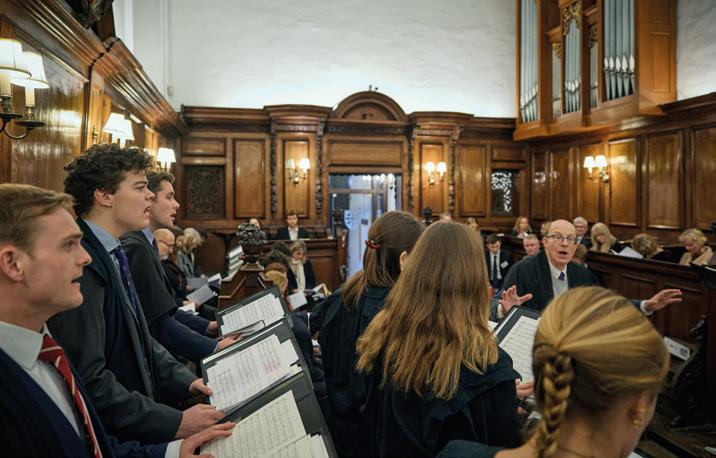
The Chapel held a service to commemorate the life of Professor Christopher Phelps, former Tutor in Mathematics and Dean in Trinity term. It was lovely to welcome his family back
to Teddy Hall for this celebration of life. There was also the opportunity to hold the termly Roman Catholic Mass, which welcomed students from the Hall and other colleges to the Chapel. As term ended, the summer allowed for two special occasions: the wedding of our DPhil students, Joel Balkaran (2020, DPhil Engineering) and Isabelle Lemay (2020 DPhil International Development), and the baptism of the granddaughter of Aularian Simon Freethy (1983, Engineering). Both were joyful days, filled with laughter and the delight of family and friends reuniting.
Our new Director of Music, Carlos Rodríguez Otero, begins in the summer. He, along with the Choir, will return to Pontigny, France, for their annual visit to the Abbey Church, the resting place of St Edmund. There, the Choir will give a concert and benefit from the generous hospitality of the locals and the staff at the Mission de France, their accommodation for the duration of the trip. Our sincere thanks to Les Amis de Pontigny,
Fr Guillaume, Justin Stead (1971, Botany) and friend of the Hall Paddy Carpenter for their generous support.
The Chaplain, working one day a week, has much to do, and so much for which to give thanks. The Chapel offers those of all faiths and none the room to find the quiet necessary to make sense of the busyness of life. As such, Chapel is a collective enterprise, and one into which so many pour their gifts, talents, and hard work. Our sincere thanks to all who support the life and work of the Chapel, in thought, prayer, word, or deed. In all its services, whether they are happy or more sombre occasions, the Chapel receives the sadness, joy, concern, uncertainty and anxiety of all those who walk through its doors, and hope is what the Chapel gives in return.
Obituaries for Christopher Phelps and James Whitbourn can be found on pp. 224–232.
The Revd Dr Mariama Ifode-Blease, Chaplain
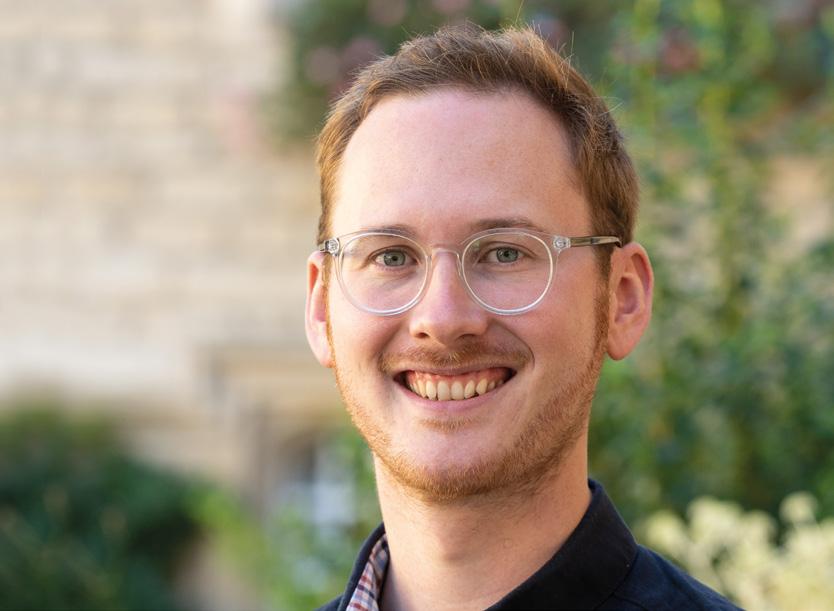
As we conclude another busy academic year, it is a pleasure to reflect on the outreach work carried out at St Edmund
Hall. The 2023-24 year has been marked by significant growth and engagement, delivering a record number of outreach sessions to more students across a greater range of schools than ever before. All told, we ran 123 sessions, worked with 79 schools and reached over 5,200 students. This work takes place primarily with schools and colleges in our link regions of Derbyshire, Leicestershire and Rutland. We saw applications to St Edmund Hall from these regions increase by over 250% in the 2023 admissions round, which suggests our outreach work is having a tangible impact on engaged students’ likelihood of applying to the College.
A total of 55 school visits to St Edmund Hall took place throughout the academic year, which saw over a thousand students come through the doors. These visits provided students with the opportunity to experience student life at Oxford and receive guidance on the application process. We also visited 40 schools in the farther reaches of our link areas, where a day trip to Oxford is less practical. This saw us engage with over 1,800 students in-school, making Oxford more accessible to talented students from a wider range of locations.
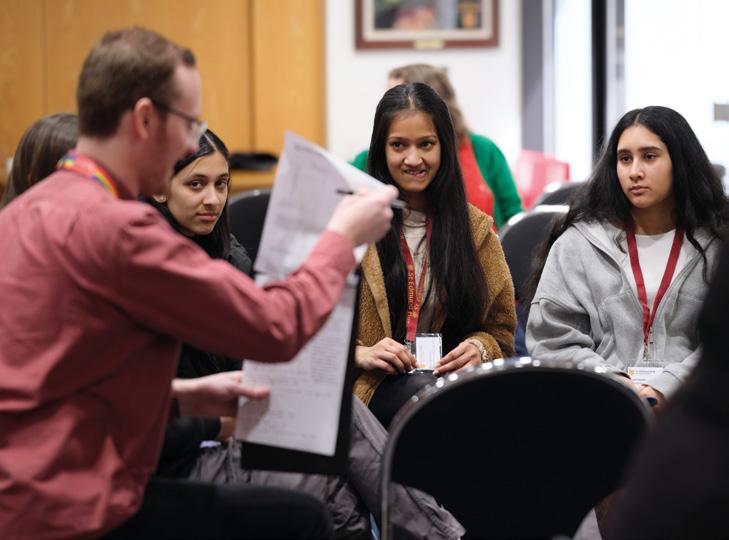
In its second year, the Unlock Oxford programme has continued to thrive, working with 25 targeted schools across our link regions. The Urban stream was particularly successful, with four residentials hosted for disadvantaged students across 12 schools in Derby and Leicester. A total of 182 students participated, with over half of attendees living in areas of socioeconomic deprivation and two thirds identifying as Black, Asian or another ethnic minority group. Encouragingly, 77% of attendees indicated that they were likely to apply to Oxford in the future, underscoring the programme’s positive impact.
The Big Think Competition reached new heights this year with 243 entries – a remarkable 187% increase from 2023. The competition expanded to include 15
of the College’s 18 subjects, whose tutors set thought-provoking questions such as ‘do our genes define who we are?’ and ‘is Shakespeare better than Taylor Swift?’. Submissions from students, which took the form of a five-minute video, used imaginative and engaging approaches, with 17 receiving prizes and a further 10 given special commendation. We were delighted to host a Prizewinners’ Day in June, where tutors and students came together to discuss the fascinating ideas presented in the competition. Our sincere thanks go to the tutors who contributed their time and expertise to make this event a resounding success.
Our outreach roadshow in September 2023 was another highlight of the year. Accompanied by four enthusiastic student ambassadors, we visited nine schools in Derbyshire and Leicestershire, delivering 30 sessions to 654 students across Years 10 to 13. These sessions provided invaluable insights into university life thanks to our student ambassadors and encouraged students to consider Oxford as a viable option for their future studies.
February 2024 marked the inaugural Offer-Holders’ Day, a new initiative aimed at fostering a stronger connection between offer-holders and St Edmund Hall. Over 70 students attended along with their guests to hear from key College figures, take a tour of the College and

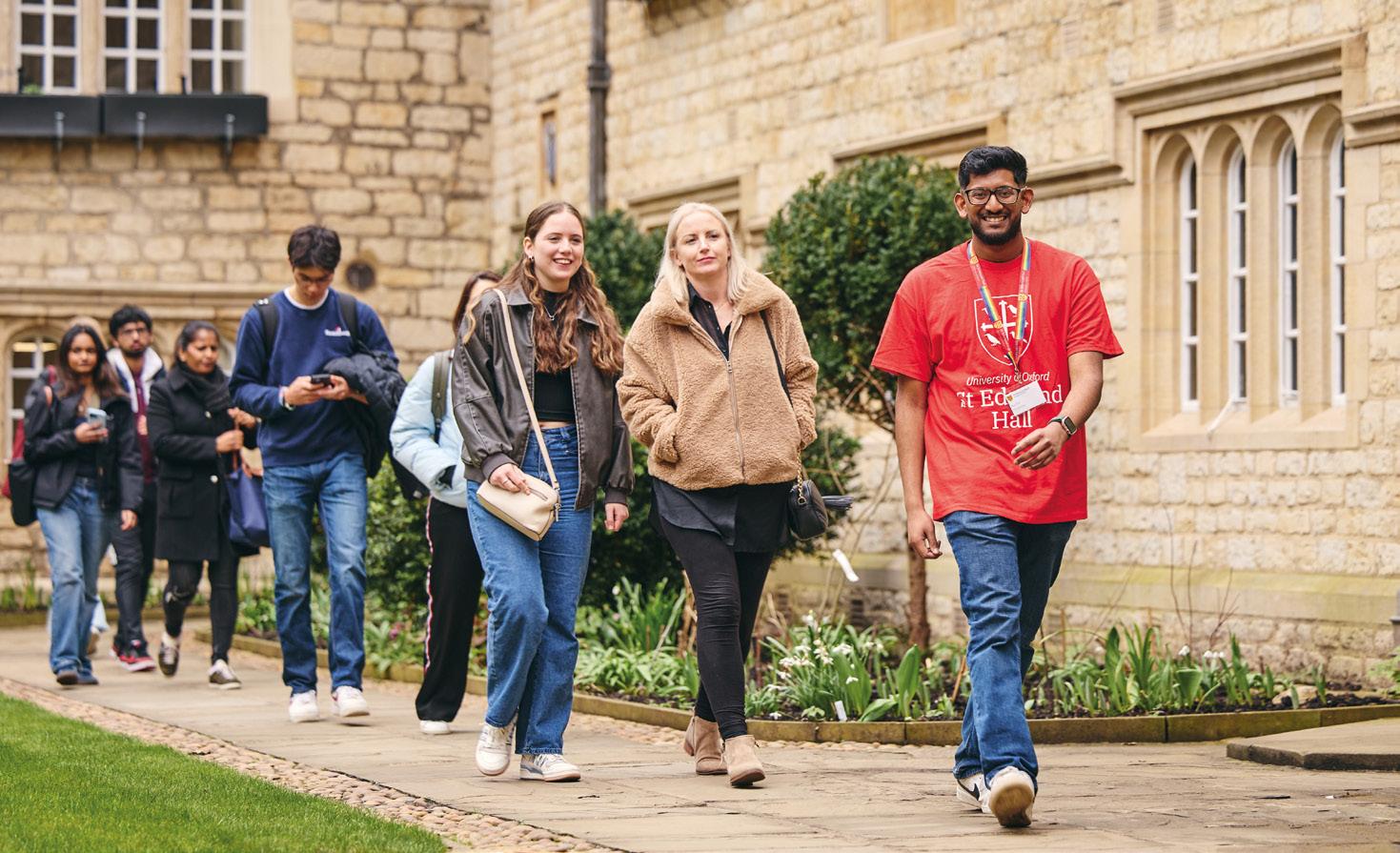
city, and enjoy lunch in the Wolfson Hall. Feedback was overwhelmingly positive, with 98% of attendees rating the day as good or excellent, and 81% expressing that they were more likely to accept their offer to study at St Edmund Hall as a result of the day.
As we look ahead to the next academic
year, we are filled with anticipation and optimism. We are excited to continue building on this year’s successes, with plans to further expand our programmes and deepen our engagement with schools and students in our link regions.
Luke Maw, Outreach and Admissions Manager

This year we welcomed 53 Visiting Students to the Hall. Around half studied alongside our matriculated undergraduates for the whole academic year, while the others spent one or two terms with us. The Visiting Students come with a range of prior educational experiences and I have been very impressed by their willingness and ability to navigate Oxford’s idiosyncratic structures and make their mark here.
In November, we held a lunch in the Old Dining Hall for Visiting Students, tutors, and colleagues in the College Office. This was a great opportunity to celebrate the
conclusion of a busy and exciting first term, and to bid farewell to ten of our students who were returning to continue their studies at their home institutions. In Hilary term, we held an afternoon tea event for the students, and in Trinity we came together for farewell drinks. Our Visiting Students were asked to give feedback on ‘Something you learned’, ‘Something you loved’, and ‘Something you’d change’. The students were clearly enjoying their time at the Hall, with praise for the welcoming community, the opportunity to learn at a fast pace and to make new friends, and, of course, the extraordinarily high quality of the food. Unfortunately, there was nothing we could do about the grey skies…
Students are supported throughout their time at the Hall by their tutors, as well as by colleagues in the College Office and Admissions Office who do so much work ‘behind the scenes’ to prepare for the students to come, to support them while they’re here, and to produce their final transcripts at the end of the year. The programme could not run without them. I would like to thank in particular Alice

The Visiting Student Junior Advisers, Kenta Sayama (2020, DPhil Geography and the Environment) and James Altunkaya (2022, DPhil Population Health), have again done superb work supporting the students throughout the year. From welcome events during Freshers’ Week to informal drop-in sessions across the academic year, their support has been invaluable.
I look forward to welcoming the new cohort of Visiting Students in October.
Dr Alexandra Lloyd, Tutor for Visiting Students and Fellow by Special Election in German
This year has been another exciting and successful year for the JCR. Active and spirited as ever, we’ve found new ways to get involved both across the University and here in the JCR, with students doing their bit to keep it a fun and welcoming place for all. Though the year has inevitably had its difficulties, we’ve faced every new challenge and experience with unbreakable enthusiasm and spirit. Freshers’ Week was, as always, packed with excitement and activity, helping our new faces settle seamlessly into the business of College. Big thank you to the
Entz Presidents for putting together a fantastic Freshers’ Week for all –whether it was our first one or our final!

A rainy Michaelmas term culminated in the annual Oxmas festivities, as the Front Quad was transformed in its twinkling festive splendour, to the delight of all of Oxford’s camera rolls. The atmosphere of the JCR Oxmas dinner was electric, and
we ended the night with a speech from our JCR President Brodie Weymouth (2021, Geography) – a perfect opportunity to thank him and his Committee for everything they’d done to make the JCR such a friendly and fun place to be. And of course, it wouldn’t be a JCR Oxmas dinner without the belting of a longtime Hall classic, WonderHall, which would certainly have done Oasis proud!
Our return in January was marked by the same old Hilary weather, but a new JCR Committee full of new ideas. Term raced by, with second years marking the halfway point of our degrees (at least for most of us!) at Halfway Hall. We got to vote our peers for various student superlatives ahead of time (some perhaps more flattering than others!), and then hand them out in our very own awards ceremony. It was definitely a highlight and a timely reminder to make the most of every quickly passing moment here, and none of it could’ve happened without the hard work of our excellent newly elected Entz Presidents.
Hilary also saw the return of two big formals that celebrate the Hall’s diversity, something we’re really proud of. Our International Women’s Day and EDI formals were both levelled up this year with the help of our amazing JCR Women*’s and BAME reps. A colour theme and photo ops at the Women’s Formal left the Wolfson decked in purple for the evening, and the EDI Formal even saw students share songs from their culture to be played throughout the night –definitely a surreal experience to hear your childhood favourites soundtracking an Oxford formal! We really hope these events will continue to improve and become traditions enjoyed by students for many years to come. Of course, formals wouldn’t be possible without all of the
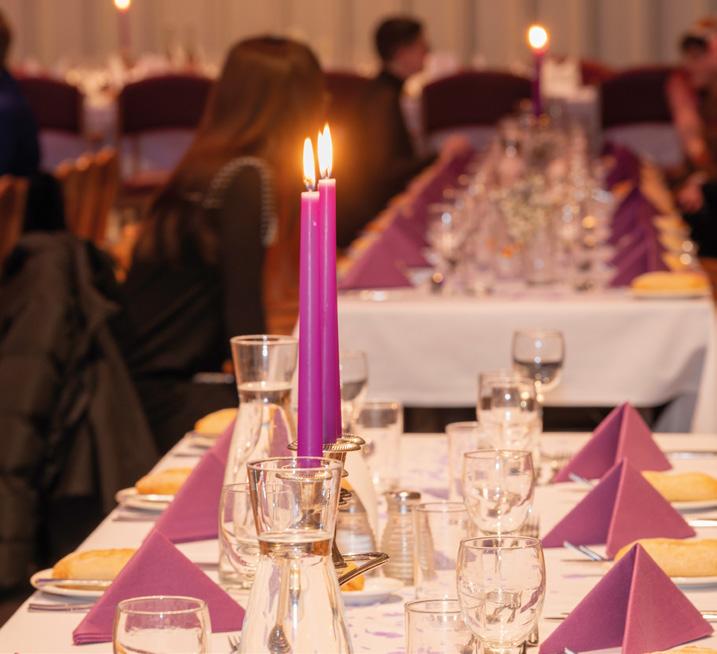
effort from the servery staff, both behind the scenes and front of house, so we’re extremely grateful for all that they do.
We were very lucky to kick off Trinity in style, with the biennial Teddy Hall Ball. For one night only, the College grounds were transformed into a secret garden, with live bands, a photobooth, dancing, and more food than we knew what to do with! The weather didn’t seem to know it was the start of the summer term, but despite dripping dresses and sopping shoes, it was nothing short of brilliant. Huge thanks to Ball President Ashmeet Bhaumik (2022, History and Modern Languages) and the rest of the Ball Committee for putting together such an unforgettable event.
Thankfully, the sun began to appear as term went on, and students emerged from the Library to head to Uni Parks for our annual JCR Sports Day or down to the river to support the Boat Club in Summer VIIIs. Despite some less-than-ideal weather conditions leading to less-than-ideal amounts of rowing, the club managed a fantastic campaign in the competition, and with members of the JCR in all of the three men’s and three women’s crews, rowing remains a mainstay in the JCR.
Beyond rowing, sports in general have long been a staple of JCR life, and this year was no exception. We added even more sports to our roster in our unending mission to compete in every Cuppers
tournament possible, both on land – with old favourites like rugby, hockey, women’s and mixed netball, cricket, basketball –as well as in the water – with swimming, water polo, Octopush (underwater hockey), and aquathlon, to name a few.
A particular highlight was Men’s football team in the Cuppers final, which was an absolute explosion of Hall spirit. There were banners, trumpets, drums and handpainted signs marching through Oxford in a massive parade – and even two former JCR Presidents dressed as bears waving flags!

Success in football boots didn’t stop with the men, though. The women’s team made it to the plate final for the first time ever, and due to some cracking goals and a nail-biting penalty shoot-out, we secured a sensational victory in what will hopefully be the beginning of great things for Teddy Women’s football.
Other aspects of social life at the Hall have also been thriving – our artistic side has seen ‘Sip & Paint’, art exhibitions in the atmospheric Crypt, as well as a new scheme displaying undergraduate art in the College staffroom window on the High Street to keep passersby entertained.
‘Banners in the Bar’ is now also a staple before a big sports fixture, where the JCR is equipped with cardboard and paint (maroon and gold, of course) to make some extremely creative signs. Similarly, the year is no longer complete without a Ceilidh (just one way in which the JCR continues to raise money for charity), or an Open Mic Night, where twice in one year the bar has become the hottest new
venue for showcasing the JCR’s incredible hidden musical talent. From bops, to welfare walks, to movie nights and the all-time Hall favourite JCRT (JCR Tea), an immense thank you to officers across the JCR Committee for doing the crucial job of keeping our spare time occupied with variety, wellbeing, and, without fail, fun.
Excitingly, the JCR has undergone something of a physical makeover this year. After the painting of the mural last year, it only felt right that the rest of the room match up to it, so we got a brand new floor – we’re very grateful to Stephen Lloyd and the Estates team for all their work on that! It also seemed our sofas were a little too well-loved, so we ordered a whole new set of furniture to reorganise and rejuvenate the room.

As our space is reinspired, I don’t doubt that the JCR will do the same. Soon, we welcome a whole new set of Freshers into the fold as our Finalists fly the nest for different adventures, but the one thing that remains the same is our indomitable Hall Spirit, and it’s been an absolute privilege to do my part to help it thrive. The JCR wouldn’t be the place it is without the hard work of everyone in it, as well as the contributions of too many staff members to mention in this small space, all of whom help us along our way. As sad as it is to bid farewell to the year gone by and everything we achieved in it, there’s really nothing like knowing we get to do it (H)all over again next October. Let’s do it –ready, Teddy, go!
Fizza Zaidi (2022, English)

As the Middle Common Room (MCR), our mission is to provide unwavering support to our postgraduate members in all aspects of their College experience –be it social, welfare, sports, or academic pursuits. This year, our 59th year as a community, has been defined by both challenges and achievements.
The ongoing renovations at Norham Gardens, traditionally the heart of the St Edmund Hall graduate community, have significantly impacted our year. With our members dispersed across various accommodations – Essex Street, Wellington Square, Norham Gardens, Crick Road, and Castle Mill – we faced the unique challenge of maintaining the strong and vibrant community spirit that has always been a hallmark of Teddy Hall. Despite these obstacles, the tireless efforts of my fellow Committee Members, combined with the resilient and goodhearted nature of our members, ensured that we upheld the spirit that distinguishes Teddy Hall within the University.
This year also marked the first time we could fully enjoy our newly refurbished Common Room at the Queen’s Lane site, thanks to the dedication of former
President Antonin Charret (2020, DPhil Education) and Vice-President Natalie Shteiman (2021, MPhil Global and Area Studies). The new Common Room and study space have been instrumental in providing a social hub for our community. Following the renovations of the Queen’s Lane Common Room, we utilised leftover funds to refurbish and relaunch the College punt, much to the delight of our members. The remaining funds, totalling nearly £20,000, will be allocated to enhance the MCR Fund.
Established ten years ago to support students in academic endeavours beyond the scope of their degrees, this fund will now be strengthened over the next 15 years, effectively doubling its capacity. We anticipate offering approximately £4,000 annually to help students pursue personal projects that enrich their Oxford experience.
In Trinity term, the MCR passed a motion to update the guest membership conditions, allowing Visiting Students supervised by an MCR member to enjoy membership, thereby ensuring their time in Oxford mirrors that of full-time students. Additionally, we introduced a provision to admit as guest members those students who, due to social or safety concerns, prefer to leave the Graduate Common Room of their original College without transferring Colleges entirely. This initiative aligns with St Edmund Hall’s reputation as a welcoming College, offering a safe haven to those who may feel unwelcome elsewhere. This year also saw a stronger integration of fourthyear undergraduates within the MCR community, reinforcing our commitment to inclusivity and the holistic experience of our members.
The lives of many of our students have been significantly impacted by the ongoing conflicts in Ukraine and Gaza. The MCR community has responded admirably, fostering an environment of civil discourse and mutual support. Throughout these challenging times, our priority has remained clear: to ensure the wellbeing of all students, offering a space where everyone feels supported and heard. The resilience and empathy demonstrated by our members during these times of global uncertainty have been a testament to the strength of our community.
This year also marks five years since the initiation of the College’s ten-year strategic plan. Alongside representatives from the College and JCR, we participated in a series of strategy refresh meetings to assess progress in key areas such as finances, equality, diversity, and inclusion (EDI), estates, teaching, and culture. We are pleased to report that the College is on track to meet the objectives set five years ago, with significant progress anticipated in the coming years. The collaborative spirit in these discussions has further
solidified the shared vision we have for the future of our College.
Finally, on a note of national significance, following this year’s general election, Aularian and former MCR member Sir Keir Starmer (1985, BCL, Honorary Fellow) was invited by His Majesty the King to form a government, becoming the first Aularian to serve as Prime Minister. This milestone is not only a source of pride for our community but also a reminder of the profound impact our members can have beyond the walls of Oxford.
The upcoming academic year will undoubtedly bring both familiar and new challenges. However, I am confident that the new Committee, led by my dear friend Siddhant Dhingra (2021, DPhil Organic Chemistry), along with the entire student body, will rise to the occasion. Together, they will continue to overcome obstacles and give us many more reasons to be proud of belonging to this incredible community.
Giovanni
Rolandino (2021, DPhil Surgical Sciences)
Mark Blandford-Baker, Domestic Bursar writes as Senior Treasurer of the Amalgamated Clubs:
2023–24 has been a year of thriving sporting activity at the Hall. As the late John Arlott liked to say when commentating on cricket, it has been a year of “fluctuating fortune”. On the upside we won the Plate final in Women’s Football and Men’s Rugby, while winning the Cricket Cuppers, Croquet, Multisports and Powerlifting Cuppers, as well as the Mixed Netball league. 23 Blues and Half-Blues have been awarded to Teddy Hall students this year (11 to women, 12
to men), across 12 sports. I write this as the Paris Olympic Games are in full swing and one is reminded, almost hourly, of the narrow margins between winning and defeat, gold and silver. But it also reminds us, at collegiate-level sport, that taking part is more important than winning. Pierre de Coubertin, the founder of the modern Games (in 1896) championed that truism. It is one that I care about and we aim to encourage as many students as possible to take up sport, perhaps to try out one they had not experienced before Oxford. Rowing is a good example of where opportunity can be limited before
arriving at the Hall – yet it remains the largest sport in the College by participant numbers. The diversity of sports such as powerlifting, netball, and the newlyformed social running club is also a key strength to widening participation.
On the societies front, two new groups have been formed this year: Knit and Natter, and the Sign Language Society. By the nature of their non-competitive nature, I will leave the various society reports to speak for themselves – but here again participation is key to a good student experience and I am pleased we have a
good range to offer.
Over the Long Vacation I am reviewing the methodology and parameters of the financial process we have for claiming help with club and society costs, aiming to make it more streamlined, coherent and accessible. This is something that has come out of Flourishing Steps, our College-wide 2019–2029 Strategy Refresh. Another element of that, in the ‘Culture’ section, is seeking to increase collaborative events across between the sections of the student body.
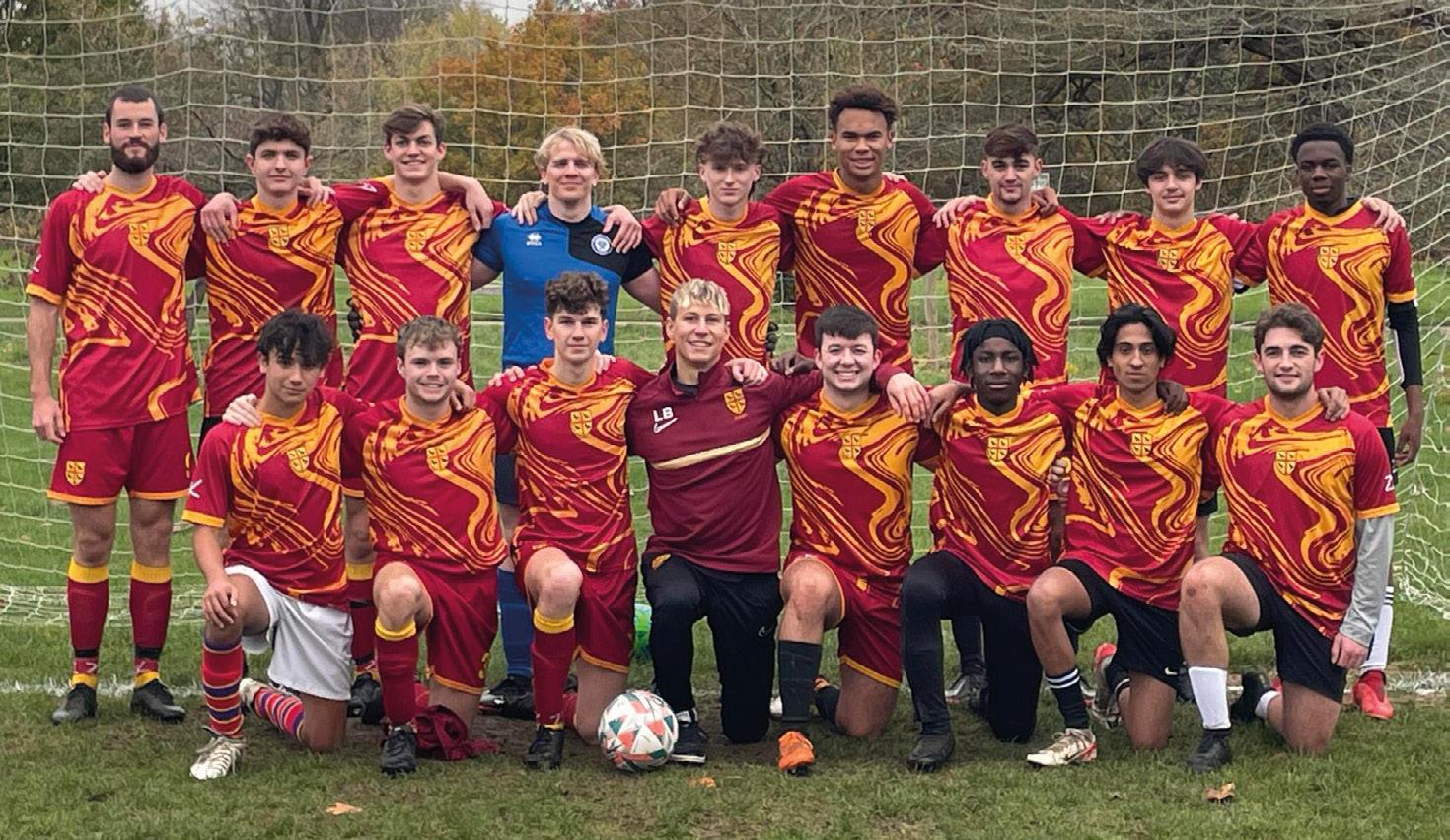
The First XI 2023–24 season has been one of resounding success – we came close to an invincible season were it not for heartbreak in the Cuppers final. The season began with a large, if not slightly overwhelming, influx of talented Freshers such as Xandy Feldman (2022, Medicine),
Joseph Omuluogbe (2022, Economics and Management), Alex Adair (2022, English), and Kwame Appafram (2022, Economics and Management), amongst many others.
What a cup run it was. Starting off at Uni Parks and ending at Iffley Road. After an initial first-round bye, our campaign kicked off against LMH where the game finished
with a well-deserved 5-1 win, despite the scores being level after 90 minutes. To follow, the quarter-finals saw a 4-3 win over St Anne’s, a game that was a bit too close for comfort in the end, despite Teddy Hall having been 4-0 up at halftime. We arrived into the semi-finals with hope, and with pride we moved forwards: we were away against Christ Church in a tight and well-battled game. Undeterred by conceding an early goal, the fruits of a dominant second half presented themselves with a header at the back post for super-sub Joseph Omuluogbe to grab the winning goal and the game finished 2-1.
The Cuppers final was at Iffley Road, against our old rivals, Keble. A secure defensive showing and a corner routine straight from the training ground resulted with us being 1-0 up after 45 minutes. Tragically, following a deflected shot from range and a worldie of a free kick, Keble managed to turn the game on its head late on, with the game ending 2-1 to them.
With the Final being only our second loss all season, we managed to secure promotion into the Premier Division –where we will be able to seek revenge against Keble next year!
Our League campaign was a smooth journey, commencing with a tight 3-3 draw against St Peter’s College. A game of particular note was our 12-1 thrashing of St Anne’s. Our defence and attack were in harmony, having conceded the lowest amount of goals in the league, and tallying 44 goals in 12 matches. Of the goals, plenty were bagged by our talisman Angus William (2022, MPhil Development Studies), who will be sorely missed next year having finished his degree. Next season will see us battling tougher opponents and fighting with ever-more hunger for that elusive Cuppers trophy.
Beyond the football, the club provides a strong sense of community. A special mention goes to Chairman Alex Whitmarsh (2020, Engineering) and Social Secretary Euan Simmonds (2022, Engineering) for their selfless dedication to the operations and social events of the club, including endless entertainment on social media and even a matchday programme for our Cuppers final! It has personally been a testing season, having only played one game due to injury, yet it has been a joy to manage and be a part of this club. Thank you to Co-Captain Tom Champion (2022, Earth Sciences), Social Secretary Euan Simmonds, 2nd

XI Captain Sam White (2022, PPE) and 3rd XI Captain Toby Onona (2020, Material Sciences) for working as an excellent team.
It is with pleasure and anticipation that the club passes the baton of Captaincy to Xandy Feldman and Vice-Captaincy to Joseph Omuluogbe (H)all the love, Lenny Bailleux (2022, Geography)
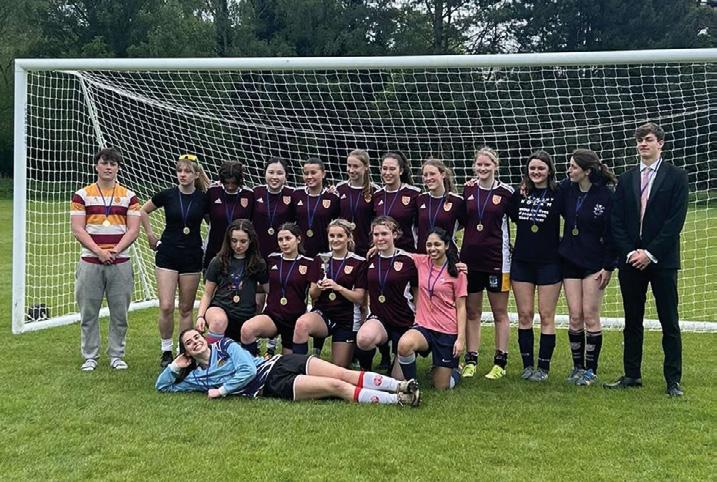
This year, Women’s Football has really taken off at the Hall, with Captains Assia Storey (2022, Geography) and Mara Wuelfing (2022, Biomedical Sciences) leading the team to a victory in the Plate final!
The team had the whole of Teddy supporting them for the Plate run, with a huge turnout at the final which saw them secure a win when the game went to penalties after the score remained 2-2 at full time.
Assia Storey (2022, Geography)
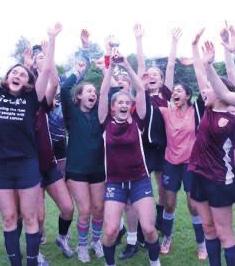
This season has been a huge and very successful return for the Basketball Club! After a couple of years without a team, the Hall was back and raring to dominate the college competitions. The season had a rocky start, with limited training facilities and difficult match times making it tricky to consistently get a side out. A limited League campaign across Michaelmas and Hilary terms saw us struggle to fourth place in the South East Division of the League, despite each game being close and hard fought. Stalwarts Joseph Omoluogbe (2023, Economics and Management) and Harvey Gorman (2023, Chemistry) represented the Hall week in and week out, establishing themselves on the starting roster as key players in our success.
However, our luck changed for the start of Cuppers in Trinity with the signing of Visiting Student Connor Arujo, and the return of our dominant Blues player George Prior (2021, Physics) to our ranks. With brand new kit and a point to prove, Teddy arrived at Cuppers with the trophy in mind. Our first-round game against St John’s averted an early exit from Cuppers after a pivotal performance from Connor kept us afloat, winning from eight points down at the half. From here, the presence of George facilitated one of the most dominant Cuppers runs the Hall had seen. Victories by 12 points against favourites Wolfson and then a whopping 44-point win against Hertford saw us enter the semi-finals with great confidence. Unfortunately, an extremely strong Christ Church team, which lacked players from Christ Church but had no shortage of OUBbC players, caused us to fall at the penultimate hurdle. Sadly, this put a sour end on an otherwise thrilling campaign
which saw the club return stronger than ever and has signalled a bright future for our young side.
Ollie Monblat (2023, PPE)
Cricket
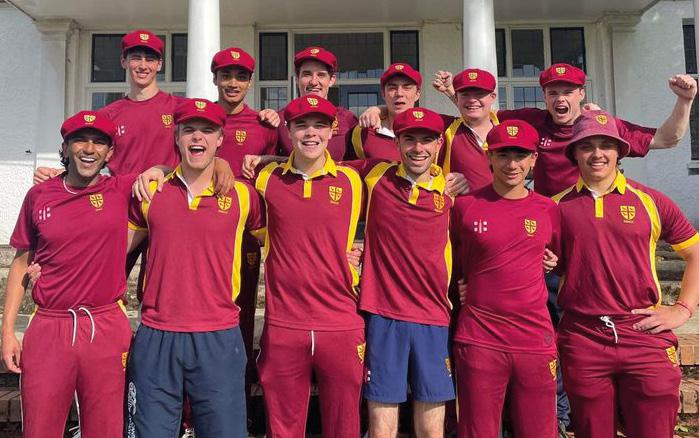
Captain: Will Murphy
SEHCC’s 2024 season was a resounding success. With a new cohort of keen Freshers, participation was at an all-time high. We fielded two teams with not only experienced players but individuals who had never previously played and wanted to get involved. This certainly translated to on-field success as SEHCC went on to achieve glory, winning Cuppers in a hardfought campaign.
The first round of Cuppers saw our 1st team face Jesus College in a nailbiting, down-to-the-wire game. After an impressive bowling display, bowling Jesus all out for 107, we were full of confidence going into bat. Yet, the loss of three early wickets put us under considerable pressure. Nevertheless, a calm and collected batting partnership between Musa Ali (2020, Arabic with Hebrew) and Xandy Feldman (2023, Medicine) saw us over the line. The first round saw Teddy’s first interaction with Magdalen College, when the Hilarians, under the charismatic captainship of Harry Mehta (2020, Chemistry), put up an interesting fight, losing significantly but in very good spirit. The second round against Christ Church
proved tricky due to weather conditions. Following some uncompromising negotiations, it came down to a bowl-off where Musa Ali and Yash Suribhatla (2023, Medicine) dispatched their Christ Church counterparts to see us into the quarter-finals.
The quarter- and semi-finals, against Hertford and Kellogg/Linacre respectively, highlighted the continual progress of the team as both were won comfortably with fantastic all-round performances from the entire team. Teddy’s bowling excellence was on particular display, epitomised by Kunal Barman (2021, PPE) taking four wickets in the quarters and Hamish Bain (2023, Earth Sciences) taking a fifer in the semi-final.
On Friday of 8th Week, the final took place against a very strong Magdalen side that had already seen off our Hilarians in the first round. We won the toss and elected to send in Magdalen to bat. An excellent fielding performance restricted Magdalen to 132 in a first innings affected by heavy rain. Despite the loss of talismanic bat Robert Hardwick (2020, Medicine) for a duck to an excellent piece of Magdalen fielding, SEHCC chased the Magdalen total with plenty of balls to spare, winning by seven wickets. Special mention to Musa Ali for a handy half century, solidifying his unbelievable season for Teddy Hall, and last year’s captain Kunal Barman and Fresher Ollie Monblat (2023, PPE) for solid batting performances.
On behalf of the club, I would like to thank all those who have contributed to this season, with special thanks going to all supporters. Hopefully we will continue to build on this season next year under new captain Yash Suribhatla as we seek to retain the Cuppers trophy.
Will Murphy (2022, History)
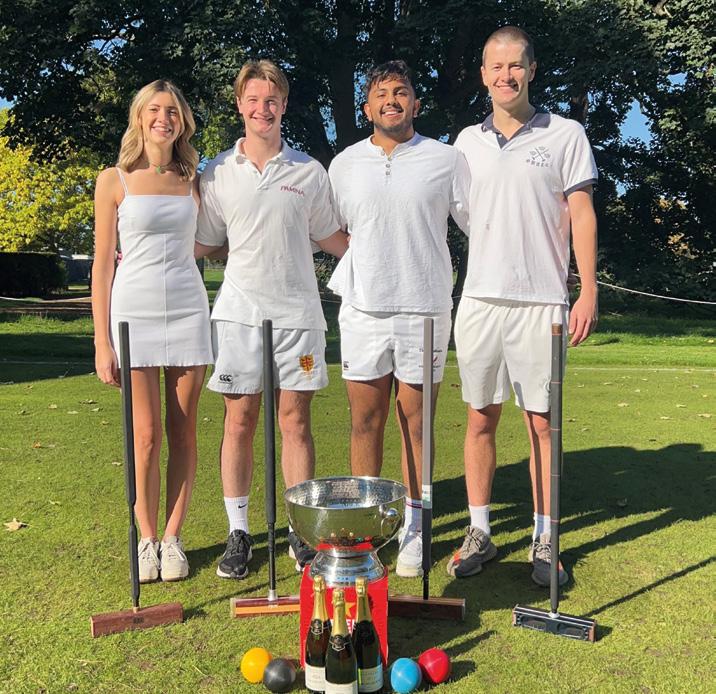
Captain: Jasper Singh
SEHACC’s croquet campaign this year was one of determination and redemption after last year’s early exit. From the start of the croquet season, the team committed to bi-weekly training at the University Parks, coached by world-renowned Australian International, Charles F. Sharpe (2023, DPhil Astrophysics). The squad drilled tirelessly on roquet, croquet, and continuation shots, complemented by Low-Intensity-Interval-Training (LIIT) for fitness. Post-training bonding sessions kept morale high as the team prepared for their Cuppers challenge.
OUACC saw the squad’s potential early, granting them a bye in the first round of Cuppers. Teddy Hall then cruised through the early rounds, defeating Keble, Oriel, and Christ Church decisively. However, the journey was not without difficulties. Edward Blackman (2023, Geography) tore his ACL after a hard-fought cannon shot against Oriel, leaving him sidelined for two weeks. Luckily, the team’s depth shone through, with Angus Williams (2022, MSc Development Studies) and Ronald Cvek (2023, CDT SABS) stepping up to fill the gaps.
The final match pitted SEHACC against a stacked Brasenose x All Souls superteam, all seasoned OUACC Blues players, led by the 2023 Blues Captain. Adding to the pressure, the weather shifted just before the final, making the court a fast 14 ‘Plummers’ (i.e.the time taken for a ball to cross to cover the full length of the court, named after Oxford croquet legend Ian Plummer). Fortunately, Alison Sharpe, former Women’s World Number one, offered the Hall side some much-needed tactical coaching before the match.
In the first game, Edward Blackman and Jasper Singh (2021, DPhil Materials) faced Brasenose’s A side. For the first twothirds of the match, Jasper led the scoring with three hoops, whilst peeling Edward through another, leaving Brasenose scoreless. But when the weather shifted, the Brasenose veterans took advantage, executing a flawless four-ball break to level the scores. A series of unfortunate shots followed, with Edward’s ball being used in a devastating three-ball break, pushing Brasenose ahead 14-4. Jasper mounted a brave last-minute comeback, scoring two more hoops, but the match ended 14-6, requiring a large nine-point victory from the Hall’s second pairing.
The pressure fell on Charles Sharpe and Daisy Bressington (2022, DPhil History) to overturn the deficit. They faced a daunting task, but their composure and skill shone through as they dominated their game, playing with their opponents’ croquet balls and winning 26-2. Final score: 32-16, SEHACC triumphant, Floreat Aula!
Special thanks to the supporters, the groundsmen, Ian Plummer for his coaching, and Daisy for carrying her croquet partner across the finish line! Victory for the Hall.
Jasper Singh (2021, DPhil Materials Science)
Multisport
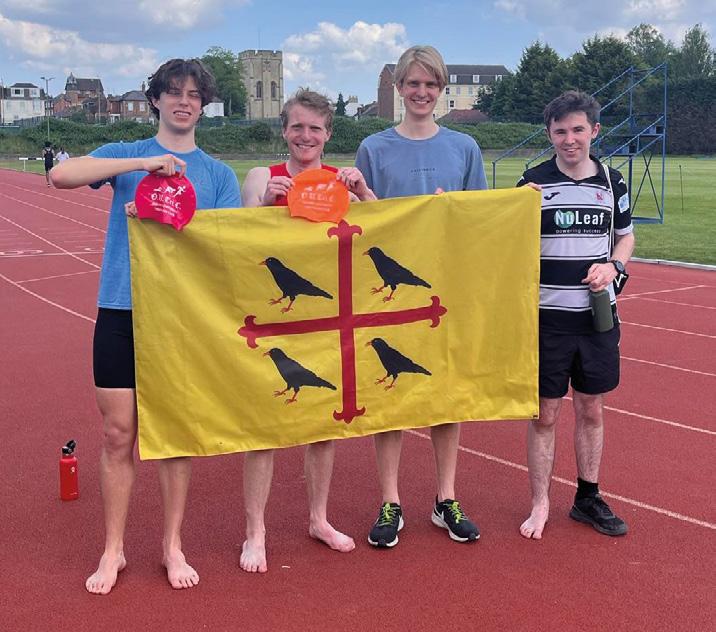
After narrowly coming second last year, the Hall returned to Multisport Cuppers with renewed resolve. The event, which consists of an aquathlon with a 200-metre swim followed by a three-mile run, was tackled by a small but determined team consisting of both seasoned triathletes and total novices.
We arrived early at the Rosenblatt pool and ritually filled our shoes with talcum powder to intimidate opponents, then set off, eager to prove we were not only swift swimmers and rapid runners but also supreme shoelace-tiers.
Throughout the race, Hall Spirit was much in evidence, with competitors encouraging each other at every opportunity. After collapsing on Bannister’s track following intense sprint finishes and an agonising wait whilst marshals calculated results, it was our team who claimed victory. With a combined time of 44:36, the trio –consisting of myself, dedicated triathlete Luke Nijkamp (2022, Engineering) and swimming expert Tobias Lloyd (2022, Chemistry) – beat all other teams by over five minutes. A special mention must go to multisport newcomer Dan Costello (2021, History and Politics), who triumphantly
reached the finish line despite dislocating a toe during the race in a true triumph of Hall Spirit over adversity.
Having clamed our first piece of silverware in this relatively new and fast-growing Cuppers, Teddy’s triathletes look forward to next year’s title defence, now armed with a prize stash provided by Oxford University Triathlon Club (OUTriC).
Jack Gillespie (2022, Geography)

The Netball Team has had another great year, with success in the League and Cuppers! Following our promotion last year, the team played in weekly matches in the Mixed Division 1 League throughout Michaelmas and Hilary terms. The team thrived in the League, resulting in several 20 goal score lines and placing top of the division. It was great to see a variety of people from the Hall coming to play for the team, especially Freshers getting involved, and people attending weekly training at Magdalen College School. Everyone’s motivation and participation has been incredible to see.
Trinity term was time for Cuppers, and our mixed team put in another amazing performance, mirroring our previous success and hard work in the League. As a result, we dominated our group and won
all our matches, earning a place in the semi-finals. The semi-final was a wellfought game, but we unfortunately could not beat the St Anne’s side, who ended up winning overall. However, getting this far was a huge achievement in itself, and demonstrates how the team keeps going from strength to strength, as this was the furthest we have progressed in several years – hopefully next year reaching the final and even winning will be possible.
A huge thank you goes out to the Finalists and players leaving this year, who have contributed significantly to the team over a number of years. They will all be missed greatly, both in the team and around College. Hopefully the team’s success will continue into next year, with the addition of new Freshers and the Captaincy of Lydia Pedley (2023, Biochemistry). Lydia is a talented, committed player and lovely person who we all thoroughly enjoyed playing with, so I’m sure she will do an amazing job at leading and further improving the team.
Kate Hartigan (2022, Experimental Psychology)

attack. From the first whistle, we knew it would be an intense challenge, facing high calibre competition from Wolfson College and Christ Church in the round robin. In our first match against Wolfson we held firm, intercepting plays and preventing their aggressive offense from breaking through. Our defence paid off, and after a hard-fought battle the match ended in a draw with Wolfson, who went on to concede three goals to Christ Church, sending Teddy Hall into the final.
The final match had us facing Christ Church, captained by the Varsity-winning Blues player, Zelda Hollings. As expected, they proved a formidable opponent. Our cool heads and strong efforts meant we managed to hold them scoreless in the first chukka, though we couldn’t break through their defensive structure to capitalise on our position. Ultimately, their experience prevailed in the second chukka and their well-coordinated attacking play secured them a 2-0 win.
It was a well-played tournament from the whole Teddy Polo team. Genevieve Steele (PGDip in Strategy and Innovation) was tactful with strategic passes and followthrough plays. Melissa Guckenberger (2023, MSc Biodiversity, Conservation and Management) was fast around the full field, demonstrating dexterity against our tough opponents. Allan Marega (PGDip in Strategy and Innovation) delivered strong ride-offs and long shots that kept us holding our own. The team was well supported by a talented guest player, Sasha Hills of St Cross College, who was composed and communicative throughout.
The Teddy Polo team played with intensity and tenacity during the 2024 Summer Cuppers Polo tournament, showing resilience in defence and determination in
The hard-fought chukkas saw Teddy take second place in the 2024 Summer Cuppers tournament. Well done, team!
Allan Marega (PGDip in Strategy and Innovation)
The Teddy Hall Pool team struggled in the League this year, however it did make it to the quarter-finals of the Pool Cuppers. There was a much stronger showing however on the individual front. Kuo Liu (2021, Experimental Psychology) was the University Snooker Champion, with a dominant 4-1 victory in the final against Ying Di of Somerville, building on his success in winning the George Perry Snooker Cup at the start of the year. He also went on to become Doubles Pool Champion with Chenjing Bu of Christ Church and Mixed Doubles Pool Champion with Yiran Zhao of Pembroke. Pool Captain Daniel Costello (2021, History & Politics) became the University English Billiards Champion and won the University Snooker League.
Daniel, Kuo and William Metcalfe (2020, Materials Science) earned 15 caps between them this year playing for the University team.
Daniel Costello (2021, History & Politics)

Good readers of the Magazine, I am writing this team report to inspire hope and predict a great future for sport at the Hall. I am proud to announce that Teddy
Hall regained the title of champion in Powerlifting Cuppers and named itself the strongest College in Oxford. After a year’s hiatus, the cup returns to the College Bar. The event, held during the middle of Trinity term on a Sunday, should by any reasonable expectation have had no takers, with exams imminent for many. And yet, the size of the Teddy Hall squad reached double digits, the second-highest turnout from any College (beaten only by St John’s). Of praiseworthy note was the presence of the several Visiting Students, who, channelling their Hall Spirit, made up a significant proportion of the team. The competition rankings and the weight lifted were as equally dominated by Teddy Hall as the turnout. Of special mention was Brittany Perrera’s (2020, Engineering) deadlift: she achieved the highest GL (weight lifted to body weight ratio) deadlift of any non-Varsity Squad female. Abdu Sahibousidq (Visiting Student) brought his experience from over the pond at Harvard to accumulate an impressive total and managed the rest of the Visiting Student squad with remarkable leadership, keeping a close eye on rookie Connor Araujo (Visiting Student). Fresher Lucy Robinson (2023, Biomedical Sciences) impressed with a mighty deadlift, displaying to the Hall that strength could still be achieved between back-to-back Summer Eights training sessions. The rest of the squad all put in incredible efforts, and to mention every feat would fill the rest of the pages of this Magazine. The team truly has never had more grit and determination than this year, and each and every member genuinely put their heart into the competition.
It is with great sadness that I must pass on my Captaincy. Four Cuppers competitions later, and I couldn’t be prouder of the effort that every single
member has put in each year we have entered. If there was ever a sport that encapsulated Hall Spirit – showing up, taking part, giving everything you have got, no matter how much experience – then it is Powerlifting Cuppers. Alex Burson (2022, Geography) has been named Captain of the Powerlifting Squad for next year and I wish him all the best in continuing the legacy of the SEH Bears.
Aula sit fortis
Brodie Weymouth (2021, Geography)

Captain: Daniel Cryer
Often considered to be the highlight of all the sporting fixtures, Rounders Cuppers provides 11 of the Hall’s most finely-tuned athletes with an opportunity to prove themselves on a stage of the highest level. This year’s tournament, which took place in University Parks, saw nine College teams competing for the coveted trophy. Upon arriving at the pitches, it was clear that the Teddy Hall cohort significantly outnumbered any other college team. I would like to have claimed that this turnout was down to the ‘love of the game’, but I imagine ‘Pimm’s in the park’, which had been kindly organised by our Welfare Reps prior to the start of the tournament, may have had some part to play.
The brackets were soon drawn, leading
to our first match against Keble College. Among the starting lineup were Poppy Buckley (2021, Biomedical Sciences) as bowler, Ollie Monblat (2023, PPE) at back-stop, and Tom Rawlinson (2023, Earth Sciences) holding the second base position. We started the match by fielding – often considered by analysts as the more advantageous opening move. After just a few balls, the outfield trio of Euan Simmonds (2022, Engineering), Alex Burson (2022, Geography) and Assia Storey (2022, Geography) started to dispatch Keble’s batsmen and women. Any balls that had managed to make it through this trio were sent straight back to Kate Hartigan (2022, Experimental Psychology), playing at fourth base, who made quick work of the remaining runners.
Batting allowed Teddy to further extend their lead. Performances from the likes of Michael Donaghey (2023, Economics and Management) were reminiscent of US sports legend Bo Jackson in his prime. This ultimately led to a dominant win, and some even more dominant celebrations.
The semi-finals saw us facing a welldrilled Trinity side, who posed more of a challenge than Keble. Big catches from Kwame Appafram (2023, PPE) and Will Murphy (2022, History) whittled down the opposition, but skilled Trinity batters were still able to find pockets in the outfield and had soon racked up close to 20 rounders.
The Teddy Hall batters had a cagey start, struggling to recreate the firstround performance – even Brodie Weymouth’s (2021, Geography) shaven legs were unable to provide the marginal aerodynamic gains the team so desperately needed.
A last-minute momentum swing caused by batter Stephanie Goreli (2022, Jurisprudence) had the other side rattled.
But alas, this was too little too late –Trinity’s convincing performance had sent us home early.
In spite of this result, I am confident that the future of this esteemed club is in safe
hands, and I would like to thank my two Co-Captains Brodie Weymouth and Nyle Parvez (2023, Experimental Psychology) for their help this year.
Daniel Cryer (2022, Engineering)

President: Toby Whitehead
Vice-President: Verity Black
Women’s Captain: Alex Wood
Men’s Captains: Lorenzo Usai, Cyril Schroeder
Vice-Captains: Frances Hand, Thomas Early
Captain of Coxes: James O’Neill
Secretary: Q Sun
Treasurer: Marcus Bugge
Water Safety Adviser: Fizza Zaidi
IT & Communications: Jack Gillespie
Social Secretaries: Hazel Wake, Tiger Li
The SEHBC year began, as always, with recruitment of our new intake of rowers, whilst our returning squad looked to hit the ground running with training. Plans were swiftly halted by the repeated flooding of the Isis. Beginning in second week, this continued all the way through Michaelmas and Hilary terms, saw
Boathouse Island flooded twice and Torpids cancelled. However, this crisis did not stop SEHBC!
The club took to the ergs and, in particular, the rowing tank at the Iffley Road Sports Centre, to teach our novice rowers and continue the development of our senior rowers. We benefited throughout from our new weights gym, which was installed in the summer of 2023.
Our coxes were also kept busy with a number of coxing workshops run by our Captain of Coxes, James O’Neill (2002, PPE). The club worked particularly hard on integration of coxes this year, with many new coxes being previously experienced rowers. We successfully competed in New College Indoor Regatta, the novice ‘Ergatta’ in Michaelmas term and the ‘Tugof-War-pids’ hosted by Pembroke College in Hilary term.
Away from Oxford, the Senior Women put in a fantastic performance at Quintin Head in London in January, despite the limited
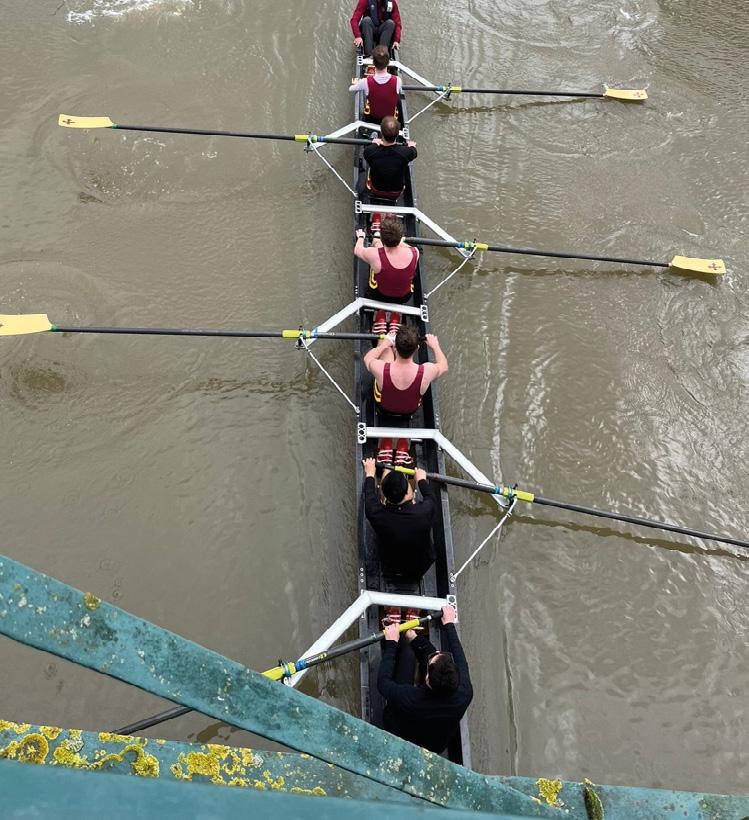
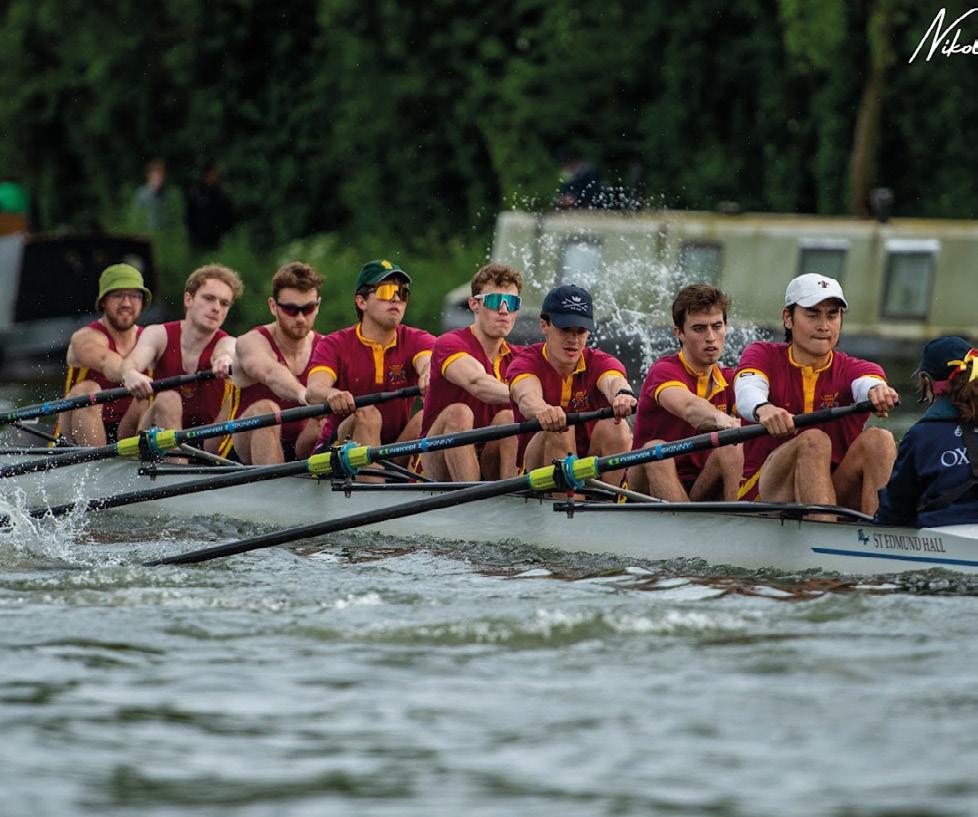
water training time that the conditions had allowed us. Meanwhile, our Boatman Jim Ronaldson was completing the incredible feat of rowing the Atlantic with Ian Davies, setting a world record for oldest men’s pair to row across any ocean! Our OUBC triallists were successfully competing in Trial Eights in December, with six SEHBC athletes competing across the squads. This culminated in four SEHBC members competing in Boat Race Week. Adam Pattenden (2020, Engineering) and Erika Dutton (2020, Medicine) were both selected to row in the Lightweight Boat Races. Verity Black (2020, Medicine) coxed the victorious Women’s Spare Four, with Toby Whitehead (2017, Biochemistry) rowing in the Men’s Lightweight Spare Pair.
The end of Hilary term brought a longanticipated return to rowing on the water for the first time since October! 25 of our members travelled to Cambridge for an incredibly successful training camp hosted by our sister College, Fitzwilliam. For many of our rowers, this was their first time on the water, and the development in rowing technique and crew rowing
across the camp was phenomenal, with eight sessions organised over 72 hours.
In Nottingham, Hazel Wake (2019, Biochemistry) won the Championship Lightweight Single at the British University Championships in SEHBC colours. Five other SEHBC athletes also competed as part of OUBC, with some in their first race as part of this year’s development squad.
As Summer Eights approached, our crews were finally able to return to the Isis, with three men’s and three women’s crews able to train and qualify for bumps racing.
The M3, made up primarily of Finalists with exams around racing, were very successful with bumps on three out of four days, with one day of controversy preventing them from getting blades.
The W3, made up entirely of new rowers, did incredibly well with a bump on day one, before getting bumped on days two and three to go -1 overall. The W2 were perhaps the highlight of the week, going +3 across the week with ease. They are now very close to securing an automatic spot for bumps (avoiding the time trial to qualify) with one or two more years of bumping! The M2 started with some
strong crews around them, they were resilient in the face of pressure, but alas ended up going -3 for the week.
The M1 began the week being bumped by Magdalen and University, but finished -2 overall with two incredibly strong rowovers on days three and four, almost catching Balliol along Boathouse island on the final day and providing the crowd with something to cheer! The W1 started the week second on the river, their highest position since attaining headship in 2009. Bumps by University, Wadham and Pembroke to go -3 overall should take nothing away from the strength of this crew, who demonstrated incredible speed in a closely contested rowover on day two. They remain within reach of the coveted headship of Summer Eights. SEHBC once again hosted a highly successful charity BBQ on the Saturday of Summer Eights in aid of Bone Cancer Research Trust, in memory of SEHBC rower Matt Greenwood (2013, Engineering).
Thanks are due to many people for the successes of SEHBC this year: the Captains Alex Wood (2021, Medicine), Lorenzo Usai (2022, Engineering) and Cyril Schroeder (DPhil Computational Discovery) as well as the whole SEHBC Committee, without whom the Club would simply be unable to function. Thanks also to Claire Nichols, our Senior Member and Tutorial Fellow in Earth Sciences, and Domestic Bursar Mark Blandford-Baker, who have been fantastic with their advice and assistance to the club across the year. Finally, many thanks to the Friends of SEHBC, whose donations provide the high standard of coaching and equipment which ensures the club remains one of the best College Boat Clubs in Oxford. SEHBC will continue to go from strength to strength in future years.
Toby Whitehead (2017, Biochemistry)
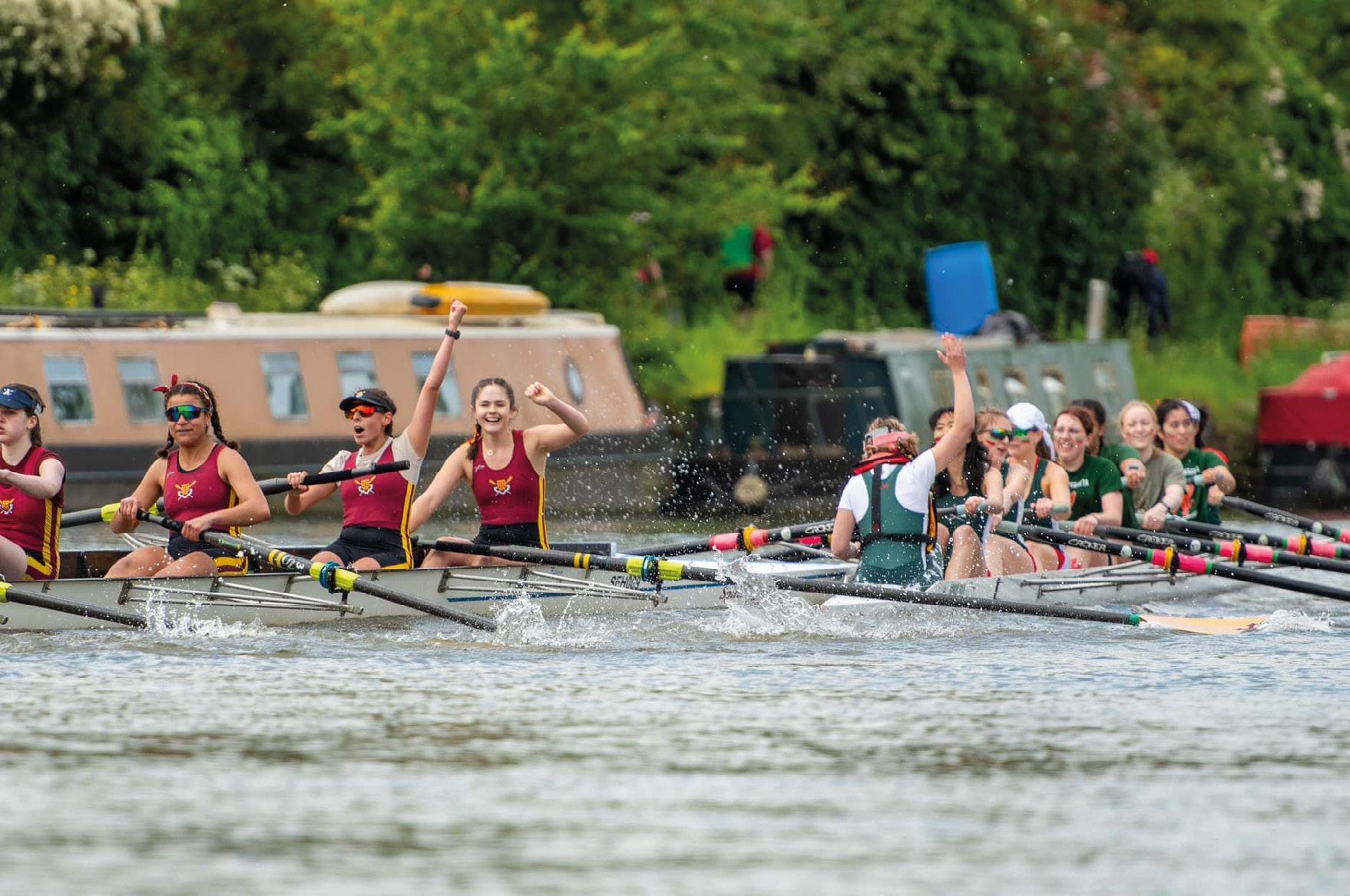

Captain: Alex Burson
SEHRFC enjoyed another trophyladen year in the season 2023–2024. Unfortunately, the big prize eluded us this year preventing the team from going backto-back in Cuppers. After a comfortable first round 34-10 win over Christ Church, an injury-plagued team fought bravely in a narrow loss to rivals St Peter’s in the quarter-finals. Putting this disappointment behind us, the team bounced back for a 42-7 win over a combined LMH/St Hugh’s team in the Plate final, setting up another trip to Iffley Road. Despite the disappointment of being knocked out of Cuppers, a rematch of last year’s Final against a combined St Anne’s/St John’s side saw the same winners. Emerging 28-21 victors, SEHRFC always looked in control in a perfect day for Rugby. What started as a tight arm wrestle broke away into a confident win with a couple of consolation tries from the opponents.
In the League, we put together an unbeaten season in the first division, adding another trophy to the cabinet. Highlights of this included a 62-12 drubbing of K*ble College, and, despite
multiple injuries both before and during the game, a dominant 26-3 win over New College. This resulted in an excellent record with just one loss over all competitions, unfortunately in the biggest game.
Beyond trophy successes, the club has thrived in numbers with the incoming Freshers providing momentum enough to field a strong Hilarians side in the Sevens tournament. Despite a difficult pool, it was the highest scoring effort the Club’s second-string side have produced in recent years and proves the enthusiasm and positive foundations that were laid despite the First XI Cupper’s exit.

Off the pitch, rugby drinks and events have proved a continued success. The social aspects of the Club continue to thrive with highlights being a crewdate with Keble Netball, parties post Plate win and a short excursion to the sunny shores of Malta.
I would like to offer a special thanks to the Committee, and all those who contributed or supported, both on and off the pitch, to the Rugby Club this year. We all look forward eagerly to welcoming next year’s Committee, led by the Captain Tommy Brommage (2023, Engineering).
Other sports played in College this year include hockey.
Writer’s Workshop
The Creative Writing Workshops have blossomed this year at Teddy Hall! Though sad to see the talents of some wonderful regulars fly the nest upon graduation, we have been blessed with a new generation of fantastic writers, each with highly individual styles that we have watched expand and develop over the last year.
In fact, the group flourished so much that Keble somehow caught wind all the way over in north Oxford and decided to get in on the action for a week in Michaelmas. We have been glad to welcome back some of their members since then. We’ve also had regular visitors from Merton and Wadham in particular, and try to welcome in creatives from as many Colleges and subjects as possible. We love to hear input from anyone who will join us. We’re hoping that the enquiries we get every now and then on Oxfess will bring in more writers from further afield (we tried to reach out to Emma Watson, but to no avail!).

When the weather permitted in Trinity term, we held the workshops in the Graveyard, unleashing our inner Romantics as the sun cast its last light upon the Library, joined occasionally by Hertford’s Simpkin the cat (who, though somewhat disinterested by our artistic endeavours, nonetheless made for a welcome addition).
Most of the time, our sessions are based on whatever people want to bring for discussion – prose, verse, drafts, fragments and scraps, diary entries, play scripts, etc., and on any theme – but we have been experimenting with setting prompts on occasion. Valentine’s Day brought an obvious theme, for example, and one week we chose to bring poems inspired by the gravestones on the College grounds. Going forward, we’re hoping to diversify the format of the sessions, experimenting with live writing, and encouraging as many forms and genres of writing as possible.
We hope to see as many people turning up as possible next year as and when they can, whether with writing to present or just to hear what others are producing and join in the discussion. It will, of course, not be quite the same without the ever-exuberant Jess Taal (2022, English and Modern
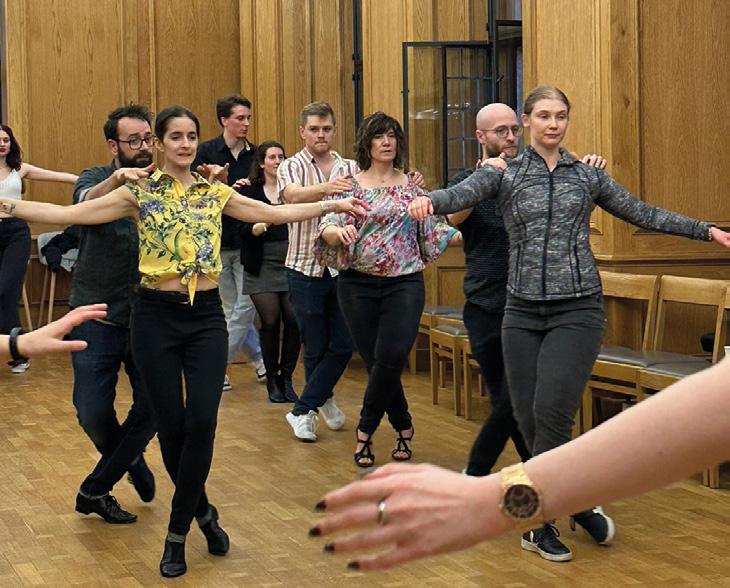
Antonin Charret
Over the past year, the presence of Latin dances at Teddy Hall has grown greatly thanks to the continuation of beloved salsa classes and the introduction of bachata classes. The classes have been organised in partnership with the student body at Lincoln College, offering students the chance to create links with other colleges and the wider University. These sessions have not only provided a fun and engaging way for students to stay active but have also fostered a sense of community and cultural appreciation within the Hall. Their success has been evident with a really good turnout. Over 60 students participated, many of whom have gone on to be active members of the salsa and bachata communities in Oxford. Many who started off in salsa classes at Teddy Hall can now be found on the University’s salsa performance teams, or attending international salsa congresses. This initiative has not only enriched the extracurricular offerings at Teddy Hall
Languages) but we can’t wait to welcome her back with open arms upon return from her year abroad.
James Sambrook (2022, English) & Jess Taal (2022, English and Modern Languages)

but has also made a significant impact on students’ wellbeing and sense of integration in Oxford and beyond!
A few years ago, the idea to start salsa classes at Teddy Hall was born out of a desire to diversify the College’s extracurricular activities and offer students a unique opportunity to learn a new skill. Salsa, with its rich cultural history and vibrant energy, seemed like the perfect fit. The classes were designed to be accessible to all students, regardless of their prior dance experience. This inclusivity was a key factor in attracting a wide range of participants: undergraduates and postgraduates alike, from complete beginners to those with some dance background. We have been blessed with fantastic instructors over the last few years, whose enthusiasm and expertise played a crucial role in the success of the classes.
From the very first class, it was clear that the salsa sessions would be more than
just a weekly dance practice. They quickly became a social hub where students could unwind, socialise, and build friendships. The atmosphere in the classes was always lively and welcoming, with students encouraging each other and growing as better dancers over time. As the weeks progressed, more advanced techniques and combinations were introduced, allowing students to challenge themselves and improve their skills. The instructor made sure to create a supportive environment where students felt comfortable making mistakes and learning from them. To keep the momentum going, several themed salsa nights were organised throughout the year. These evenings were a huge success, often attracting even those who were not regular

“Yoga is the journey of the self, through the self, to the self.” – The Bhagavad Gita
We had a lovely year of yoga at Teddy Hall. Enjoying moving and stretching in various locations around the Hall, from the Old Dining Hall before Christmas to the Doctorow Hall where we spent most of our time.
As the yoga teacher in residence at the Hall, it was my mission this year to give students some space and time to take a pause and connect to themselves in a
participants in the classes. The highlight was a joint event at Lincoln College with their MCR, where students had the chance to dance the evening away.
The salsa classes at Teddy Hall have had a lasting impact on the College community. They have provided students with a creative outlet, a way to stay physically active, and to take care of their mental health through a fun activity. The success of the classes has inspired plans to expand the programme in the coming year. An introduction to salsa will be offered during Freshers Week to all those who wish to attend, followed by a Latin dance night, where students will have the chance to display their newly-learned skills.
deeper sense. Our classes ranged from gentle yin and reflective sessions, to more dynamic and active vinyasa sessions. It was wonderful to see so many regulars attend each class and watch as they became more comfortable and connected to their practice.
Living in such a fast-paced and forwardmoving environment as Oxford, I think it is even more important that we take the time to slow things down and reconnect to our sense of self, which can often be overlooked. Yoga is a vessel that can allow us to do this, whilst also letting us reap additional benefits like promoting bone health, increasing our balance and flexibility, reducing inflammation, and supporting heart health.
I am looking forward to the next year of yoga at the Hall and hope to bring forward new ideas and flows that have been inspired by students at the Hall.
Jasmine Laing (2023, DPhil Experimental Psychology)

As part of the Hall’s ongoing commitment to being one of the greenest and most environmentally sustainable colleges in Oxford, we completed a biodiversity audit during the summer, enabling us to compare data with the baseline audit undertaken in 2021.
Highlights from the audit include an overall increase in bird species and earthworms at the sites monitored, with earthworms playing an important role in maintaining soil quality and fertility, and facilitating carbon storage by incorporating organic material into soils.
The full report together with our sustainability dashboard, which tracks the Hall’s energy and commodity consumption, and waste, can be found on our Sustainability page: www.seh.ox.ac. uk/discover/sustainability.


The Conversations in Environmental Sustainability (CES) seminar series was established last year with the remit of bringing together leading thinkers and decision-makers from academia, business, government and NGOs to examine a specific topic related to environmental sustainability.
For our third event, in Hilary term, we welcomed Bayo Owolabi (Principal and energy specialist at Boston Consulting Group), Anousheh Ansari (CEO of the XPrize Foundation), Deirdre Cooper (Head of Sustainable Equity at Ninety One), and Khalid Abdelgadir (Founder of Baridi) for a fascinating discussion on the topic: ‘No one left behind: Environmental challenges and solutions for developing countries’.
The series returns in Michaelmas with the first seminar focusing on ‘Lab-grown, real, or plant/fungi-based meat – which is best for the environment?’
Find out more about the series and upcoming CES events at www.seh.ox.ac. uk/discover/ces.
Laura Ellis, Communications Manager

Perhaps the most significant event in the life of the Hall this academic year has been the start of work on our ambitious new Passivhaus student accommodation and communal facilities with landscaped and biodiverse gardens at Norham St Edmund (NSE), our postgraduate accommodation site.
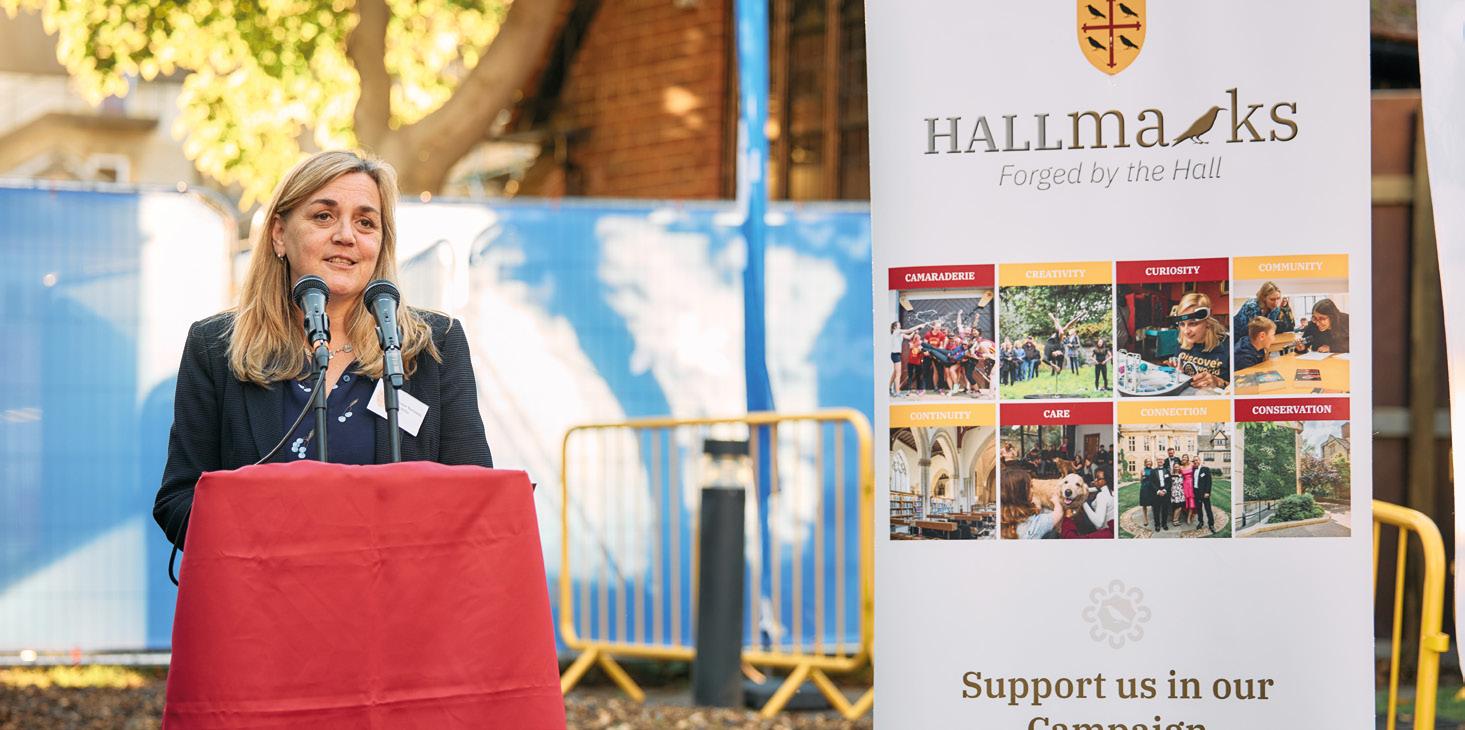
On Tuesday 24 October, the Hall celebrated the groundbreaking ceremony for the building work.
Hall alumni, staff and students, SDC Construction, Wright & Wright Architects and other members of the project gathered to hear speeches by the Rt Hon the Lord Patten of Barnes KG, CH, Visitor of the Hall and Chancellor of Oxford University, and Principal Professor Baroness Willis who spoke about the importance of the development:
“This once-in-a-generation development for the Hall of 127 study bedrooms and communal facilities embodies care for
two precious things – our students and our planet. It will enable the Hall to meet its goal of accommodating all of its undergraduates, inspire a creative and inclusive College culture and lead the way in environmentally sustainable design.”
This was followed by the formal groundbreaking of the soil and a drinks reception on site.
The Hall is excited to begin this project as it brings together several strategic aims including improving access, moving towards achieving net zero in energy use, encouraging biodiversity, and catalysing a creative and inclusive College culture.
Work on the site quickly got underway following the ceremony. In December and January parts of the existing site were demolished to make way for the new buildings including the extension of 17 Norham Gardens and the old Gym.
Watch a timelapse video of the extension on 17 Norham Gardens being demolished to make way for the Villa, the largest new building at NSE:
https://www.youtube.com/ watch?v=icFY9IfKRCc (December)
www.youtube.com/watch?v=zw1E7_QOec (January)

On Friday 19 April, we proudly installed 36 metres of hoarding messaging about our new development around the site in North Oxford.
The Hall also released a new video, in which you can hear more about this transformational project for the Hall from our students, alumni, the award-winning Architects Wright & Wright and the Principal.
Watch the video on the College YouTube channel: www.youtube.com/ watch?v=vWBHOOSLdiI.



Currently, St Edmund Hall cannot accommodate all its undergraduate students for the duration of their course, leaving them to find their own private accommodation in their second year in one of the most expensive UK cities. Therefore, this new project is an urgent priority for the Hall as it will save students approximately £2,000 in housing costs, improving access to higher education by attracting those from lower income backgrounds.
The residential development will be a pioneering model of sustainability, with new construction designed to rigorous Passivhaus standards (the industry goldstandard for energy efficiency), and the Victorian villa (number 17) refurbished to Part L Building Regulations compliance. Energy for the 4,600m² development will be obtained from air source heat pumps and bi-solar green roofs, reducing the College’s costs and boosting sustainability. The landscape and ecology strategy is designed to improve and enhance biodiversity, with an 88% net gain over the site. This new accommodation will welcome students in the autumn of 2026.
The College is constructing three new buildings – Villa, Park House and West House – and remodelling the 1874 Victorian Villa at number 17 Norham Gardens. The development will house undergraduates and postgraduates in separate buildings within the site, nurturing social interaction and wellbeing between both communities. There will be:
• 127 student bedrooms; 120 ensuite, five accessible and one ambulant disabled
• Five landscaped gardens
• Ecology pond and green roofs
• Undergraduate common room
• Postgraduate common room
• Reception area to provide artwork exhibition space
• Stunning views of Oxford University Parks
Together with College investment and alumni philanthropy, the Hall is creating the next generation of sustainable buildings and community at St Edmund Hall.
Teddy Hall is seeking support for NSE as we rely on Aularian generosity to ensure our historic and inspiring College remains fit for purpose in the future.
Alumni and friends can find out how they can donate to the buildings, bedrooms and gardens at NSE at the Campaign website: www.hallmarkscampaign.seh.ox.ac.uk/ norham-st-edmund.
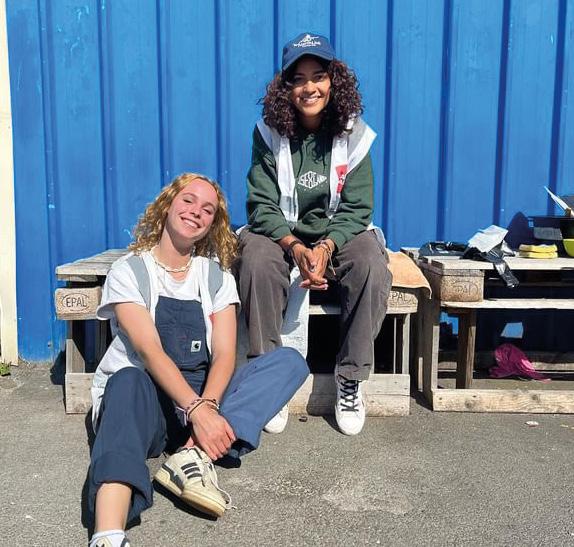
Starting in February 2023, Emily Twinn (2020, English and Modern Languages) spent three months volunteering with the organisation Care4Calais, a British nonprofit organisation based in Northern France that conducts distribution
and outreach for displaced refugee communities. Emily returned to France at the end of September, when she happened to meet Anandita Abraham (2022, PPE), who was volunteering for a month.
Students across all year groups at Teddy Hall have volunteered in Calais. A day volunteering involves a morning in the warehouse assembling emergency food packages, checking tents and so on. In the afternoon, volunteers engage with asylum seekers in Calais and Dunkirk to provide social and practical services ranging from fixing a bike to a game of Connect4 over tea. Such provisions are a much needed, if temporary, break from a daily life of police evictions, violence and unpredictability.
Read more about Care4Calais: www.care4calais.org.
At the start of the academic year St Edmund Hall was excited to announce the release of a new video – ‘Tour of Teddy Hall’ – for any prospective students looking to apply to the College. With a rich history dating back to the 13th century, Teddy Hall continues to shape academic excellence and support a vibrant student community.
In this video, follow undergraduates Ellis Hall (2021, Medicine) and Verity Black (2020, Medicine) around the College for a first-hand glimpse into what makes Teddy Hall a brilliant place to live and study. The tour takes you from the entrance on Queen’s Lane, just off Oxford’s High Street, through to our historic Front Quad, the College Bar, our Library in a twelfth-century church, Dining Hall, Junior

Common Room, accommodation and Gardens.
Watch the video on the Hall’s YouTube Channel: www.youtu.be/zv4BBlo6iCI.
Prospective students can find out more about the Hall at seh.ac/whyteddy.
Alternatively, you can follow the Outreach Team’s Twitter account @sehaccess and find out more about applying at seh.ac/apply
The Choir of St Edmund Hall, under Director of Music Dr James Whitbourn, performed to a large and rapturous audience in Pontigny Abbey, France, on Friday 8 September.
The concert included works by Taverner, Purcell, Byrd, Eric Whitacre, James MacMillan and the world premiere of
Lucy Walker’s anthem ‘We shall walk’. The concert was part of an ongoing relationship between the College and the Abbey, where the remains of St Edmund of Abingdon, the Hall’s namesake, have rested in a stunning golden casket above the High Altar since his death in 1240.
Photo credit: Luc Feillée


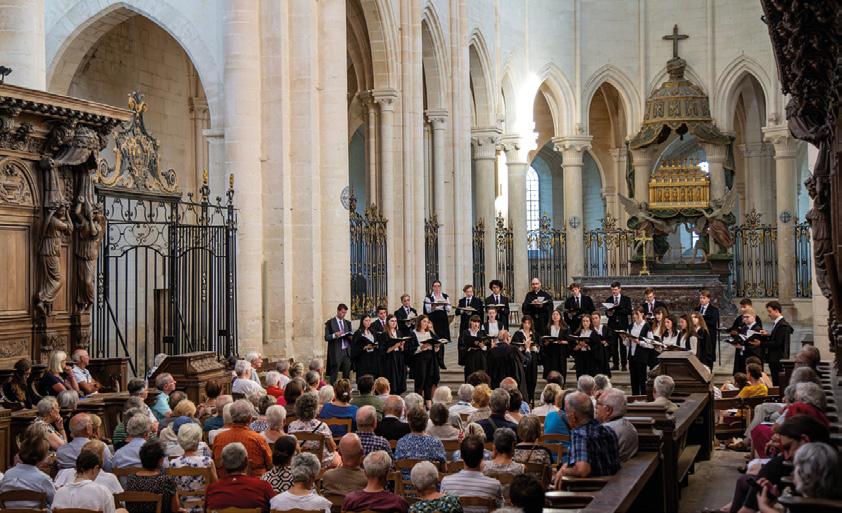
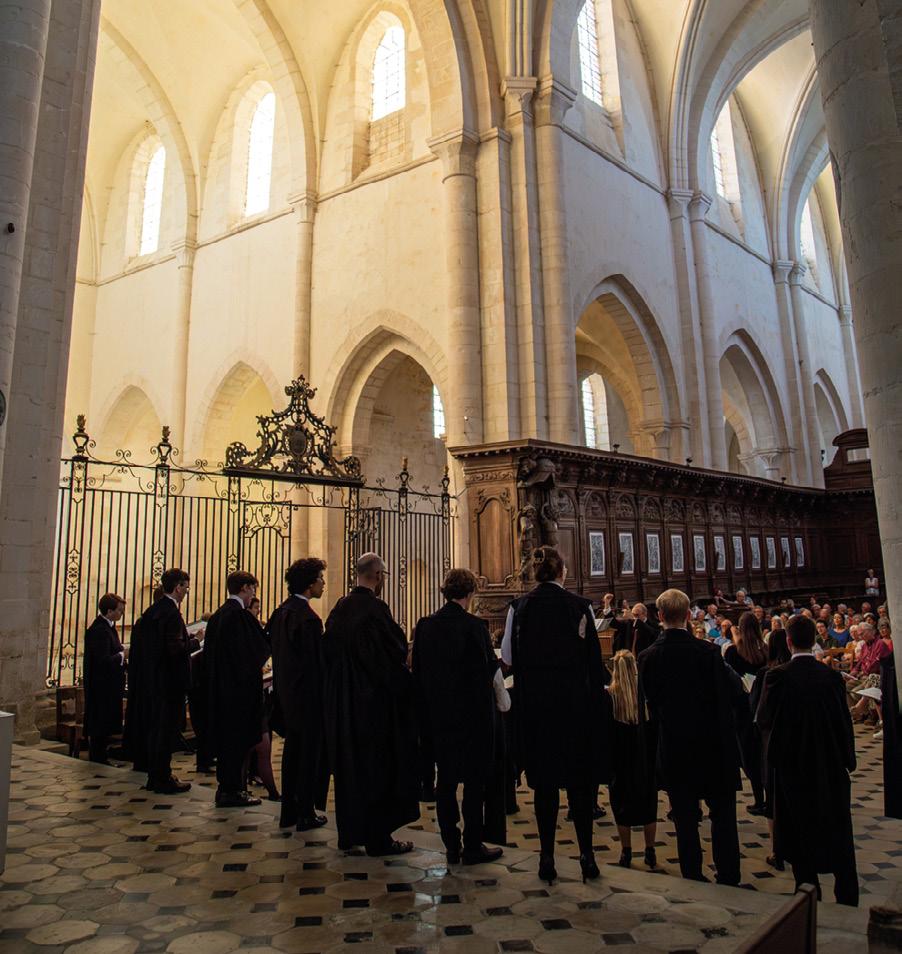
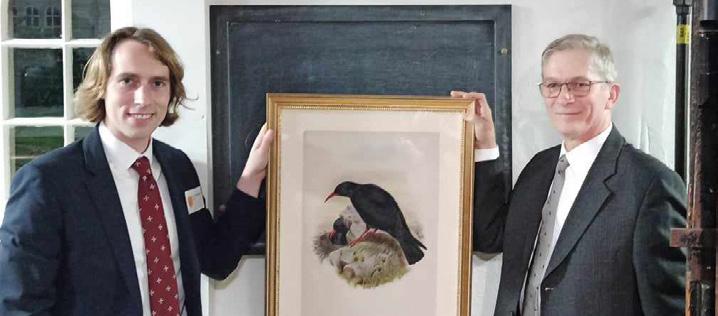
The retirement of Professor Robert Whittaker on Saturday 30 September saw an opportunity for Geography alumni of all generations to get together for a reunion and to celebrate Professor Whittaker’s time at the Hall.
Professor Whittaker has been a Tutorial Fellow at the Hall since 1990. In his final term, he acted as Pro-Principal of St Edmund Hall while the Principal was on sabbatical, prior to which he was VicePrincipal from January 2019. Emeritus Fellow Dr Ian Scargill (1954), Fellow from 1962 until 2000, attended as guest of honour at the event.
Alumni enjoyed four talks in the early afternoon. The first was from alumna Olly Belcher (1999), who spoke about the journey to founding her charity Shivia,
and its important work. Secondly, Dr Callum Munday (2011), Fellow by Special Election in Geography, spoke about his research on East Africa’s climate. Thirdly, new Hall Tutorial Fellow in Geography, Dr David Moreno-Mateos, Professor Whittaker’s successor, presented on his work estimating how long it takes for ecosystems to recover their less resilient attributes. And finally, the Principal gave a short tribute to Professor Whittaker at the end of the afternoon’s talks.
Throughout the afternoon, Aularians also explored a maps exhibition in the Old Library hosted by Librarian James Howarth.
After the talks, drinks on the Front Quad were enjoyed by all, followed by a threecourse dinner in the Wolfson Hall, which saw three after-dinner speeches, from Director of Development Andrew Vivian, Eden Cottee-Jones (2007), and finally Professor Whittaker himself. The Buttery Bar was then open for all to enjoy.
The event was a wonderful evening appreciated by all.
Just before the start of Michaelmas term, the JCR Arts Reps, Bliss Ashley, Ella Soni and Eve Aspland (all 2022, Fine Art) painted a mural of the Front Quad in the JCR Common Room to replace the red wall. It looks amazing and brightens up the JCR. Thank you very much to them for their hard work and to Poppy Buckley (2021, Biomedical Sciences, JCR VicePresident) for organising this.
Brodie Weymouth (2021, Geography, JCR President 2022–2023)
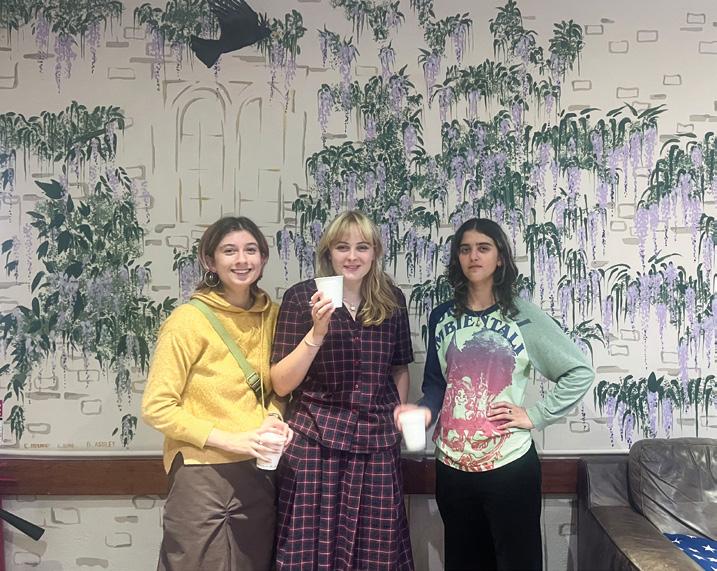
We were delighted to hear that President Macron received from King Charles III a complete edition of Voltaire’s writings as edited by Hall Emeritus Fellow and Director of the Voltaire Foundation, Oxford, Professor Nicholas Cronk on Wednesday 20 September during the King’s state visit to France.
Started in 1968, the complete works, comprising 205 volumes, were only completed in April 2022 and include Letters on the English, a series of essays by the French Enlightenment writer and philosopher, based on his experiences living in Britain between 1726 and 1729.
Read more in an article from the Independent newspaper: www.independent.co.uk/news/uk/ charles-emmanuel-macron-frenchparis-paris-orly-airport-b2415187.html

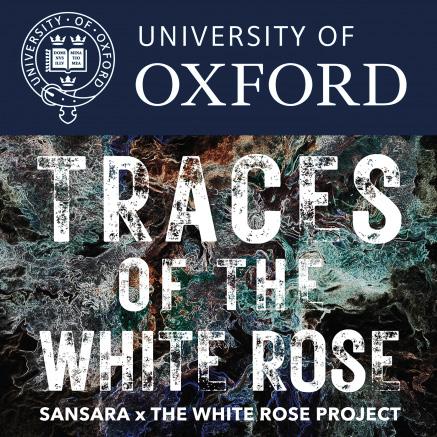
Dr Alexandra Lloyd (Fellow by Special Election in German and Tutor for Visiting Students)
features on a new podcast series produced by the award-winning vocal collective SANSARA and the White Rose Project.
“Munich, 1942. War rages across Europe. After nearly a decade of Nazi rule, Hitler is at the height of his power. Any form of opposition is unimaginably dangerous. To stand up and speak out would take incredible strength and courage. The White Rose took that risk. Five students and a professor stood up to Nazism and paid
with their lives. Hosts Tom Herring and Dr Alexandra Lloyd trace the story of the White Rose resisters in their own words, with excerpts from the group’s letters, diaries and resistance pamphlets translated by students at the University of Oxford, alongside powerful and moving choral music by English and German composers from SANSARA’s acclaimed album ‘Traces’.”
The series was made with support from the University of Oxford’s Public Engagement with Research Seed Fund, TORCH, the Higher Education and Innovation Fund, and the Genesis Foundation Kickstart Fund.
Listen on Spotify, Apple Music, Apple Podcasts, and on the University of Oxford’s podcast site: www.podcasts.ox.ac.uk/ series/traces-white-rose.
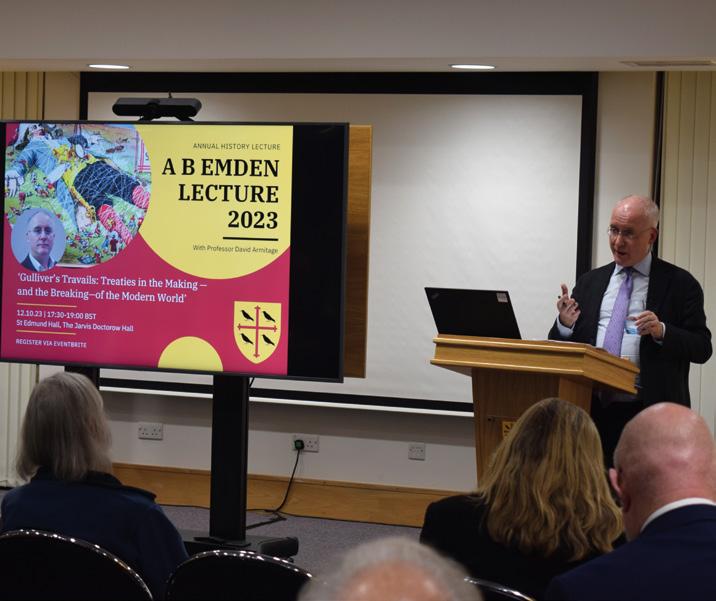
On 12 October, Professor David Armitage, Lloyd C. Blankfein Professor of History, Harvard University, visited the Hall to deliver the 2023 Emden Lecture. This annual History lecture is given in memory of the distinguished historian A.B. Emden, who was Principal of the Hall from 1929-1951.
In his lecture, Professor Armitage explored the role of treaties in world history: how their making and their breaking have contributed to the making, and breaking, of the modern world. Professor Armitage started by highlighting that in traditional western historiography, treaties have been closely aligned with documentary history. It has long been accepted that treaties as physical documents are central to the activity of history writing; the history of nations and their relations can be understood from these written records. However, as as he noted, this textual history is only one part of the history of treaties. Every treaty is more than a document. It is made up of the events which lead to its need being identified, the ceremonies which accompany its creation and ratification, and the action (or inaction) it mandates. Moreover, treaties have for centuries encompassed far more than written documents. Treaties have
involved ceremonies, the exchange of gifts or goods, music, and paintings (such as ‘The Somerset House Conference’, 1604).
With these examples, Professor Armitage argued for a history of treaties which is multidisciplinary. A treaty, he reminded the audience, indicates cross-cultural exchange, and cross-cultural exchange requires cross-discipline discussion. Treaties therefore must be understood beyond contexts such as documentary history, state-building history, or peacemaking history, and placed within the history of art, law, and ritual.
Perhaps, then, it is unsurprising that historians have so far neglected to explore a fully contextual, global history of treaties. As Professor Armstrong described, there is a temptation to approach treaties like plumbing, paying little attention until something breaks. But treaties are an integral, and inescapable, part of modern life. It is estimated that around 1,000 new treaties are created every year, and their scope is startlingly expansive. Treaties cover everything from the sovereignty of nations, to human rights, to our treatment of the environment, to the exploration of outer space.

The experience of being caught up in an ever-growing set of rules and agreements has long been compellingly associated with an image from literature. Shipwrecked on the island of Lilliputia, Jonathan Swift’s eponymous hero Gulliver (Gulliver’s Travels, 1726) is bound by the Lilliputians. The Lilliputians are tiny in comparison to Gulliver, and the cords with which they bind him are correspondingly small. But together, the many small cords tie him down: the powerful Gulliver is now no longer free to move. This image has often been used to signify a powerful state entangled in treaties. Indeed, such imagery may not have been far from Swift’s own mind the novel: he had worked extensively and closely on the 1713 treaty known as the Peace of Utrecht.
Alongside anxiety about being unable to escape treaties, the image of Gulliver tied to the beach also speaks to anxiety about their potentially secretive nature. Gulliver is bound while he is unconscious: what, the image asks us, might be binding us while we remain unaware? Professor Armitage noted that this is an anxiety which has always accompanied treaties: from early modern preoccupations with shadowy princes and duplicitous diplomats, to Woodrow Wilson in 1918 making the first of his 14 points that “diplomacy shall proceed always frankly and in the public view”. But we do not have to be in the dark about treaties. In fact, there appears to be a current preoccupation with their making and
breaking. Professor Armitage highlighted, for example, the Trump administration’s withdrawal from significant international treaties between 2016 and 2020, and discussions regarding an as-yetunrealised global pandemic preparedness treaty. Even when treaties are attacked or undermined, he argued, their significance is brought to the fore. We are therefore reminded of their role in governing our lives and our modern world.
For Professor Armitage, looking to history can help to elucidate this role. Such a history must look beyond treaties as documents. By looking in this way we can understand treaties within a pattern, as part of a multidisciplinary history. In so doing, we can better understand the making and breaking of treaties and how and why they entangle us.
David Armitage, MA, PhD, LittD, CorrFRSE, FRHistS, FAHA, MAE, is the Lloyd C. Blankfein Professor of History, Chair of the Committee on Degrees in Social Studies and former Chair of the Department of History at Harvard University, where he teaches intellectual history and international history. He is the author or editor of 18 books, most recently Civil Wars: A History in Ideas (2017).
Heather Barr, Graduate Trainee Library Assistant
The lecture is available to watch on St Edmund Hall’s YouTube Channel: www.youtu.be/UM4fbQlyWzU.
As part of a joint event with Queen’s College during the Oxford International Song Festival 2023, visitors were able to stand in the extraordinary medieval Crypt of the Library at St Edmund Hall and hear music from the 15th-century illuminated Medingen manuscripts held by the Bodleian Library, with facsimiles on display. Henrike Lähnemann, Fellow and Professor of Medieval German Literature and Linguistics, kicked off the Teddy Hall leg of proceedings in the Crypt, followed by a performance in the Chapel by the Choir of St Edmund Hall directed by interim Director of Music Helen Smee. Participants then went on to Queen’s
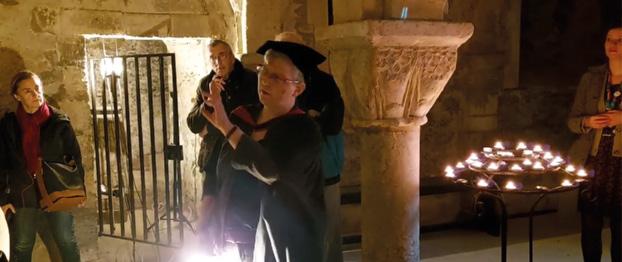
College to hear, see and explore the stunning Goostly psalmes and spirituall songes by William Coverdale (1488–1568), a treasure of the College, in the Chapel. The event was an unmissable step back in time highlighting musical manuscripts as artworks.
Watch the event: www.youtube.com/ watch?v=RPLCyzPB2fc.
Our Outreach and Admissions Manager Luke Maw and Access and Outreach Coordinator Rebecca Smithson led our week-long St Edmund Hall Roadshow visiting schools across the College’s link regions in October.
Travelling from Glossop to Leicester, the Outreach team were able to reach 654 students across 12 schools. Accompanying them were four Student Ambassadors: Rathi Ramakrishnan (2022, Geography), Rachel Chia (2022, History), Alex Berresford (2022, Engineering Science) and Finn Galway (2022, Medicine) who delivered interactive workshops to Key stage 5 students covering the Oxford application process. Luke and Rebecca delivered talks to Key stage 4 and 5 students demystifying Oxford and providing information, advice and guidance on how to make a competitive application in future.
“It’s a real highlight of the Outreach calendar”, said Luke. “The Student Ambassadors are able to bring a little bit
of Oxford to these schools in the further reaches of our link regions where a day trip to Oxford is less practical. They are also able to impart valuable subject-specific application guidance to KS5 students looking to apply to Oxford.”
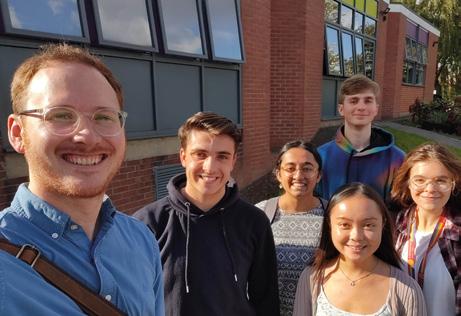
One of the ambassadors, Rathi, reflected on the roadshow: “the opportunities and exposure we get at Oxford is something I’ve always been grateful for, and the roadshow was a great chance to in some way, give back. The fact that we were enabling so many students to gain the confidence to apply, particularly those who do not get the best support with these applications was thoroughly rewarding and enjoyable! The journey we undertook to meet such enthusiastic and ambitious students from across the country and to represent St Edmund Hall over that week was unforgettable!”


At the start of November, Professor Carly Howett, Tutorial Fellow in Physics and the lead on the operation of the instrument Ralph on NASA’s New Horizons spacecraft, also known as ‘Lucy’, shared an exciting update about the mission:
“On Wednesday 1 November NASA’s Lucy had its first asteroid flyby!
Since we last checked in with the launch a couple years ago, the Lucy mission has done an orbit around Earth, checked out instruments looking at the Earth and the Moon during an Earth Gravity Assist, and is preparing for its flyby encounters of the Trojan Asteroids starting in 2027 that lead and trail Jupiter in its orbit. Lucy will gather information that will tell us more about the ingredients that made up planets across the solar system and the remnants from that process.
We had a surprise this year when the programme discovered a new asteroid (Dinkinesh) that is on the Lucy orbit! It was a bit of a scramble, but we took advantage of the opportunity to test out the Lucy asteroid flyby encounter processes and systems several years ahead of the first planned asteroid encounter! The team rose to the challenge and are now ready for this fortuitous event!”
While observations leading up to the encounter had hinted that there was something interesting going on in this system, the team was surprised to discover that not only did Dinkinesh have a satellite, but that the satellite was a contact-binary, the first contact-binary satellite ever observed. On 27 November 2023, the International Astronomical Union approved the name ‘Selam’ or ሰላም, which means peace in the Ethiopian language Amharic, for Dinkinesh’s moon.
“Dinkinesh is the Ethiopian name for the fossil nicknamed Lucy,”, said Raphael Marshall of the Observatoire de la Côte d’Azur in Nice, France, who originally identified Dinkinesh as a potential target of the Lucy mission. “It seemed appropriate to name its satellite in honour of another fossil that is sometimes called Lucy’s baby.” The fossil Selam, discovered by Zeresenay Alemseged in 2000 in Dikika, Ethiopia, belonged to a three-year-old girl of the same species as Lucy; though the baby actually lived more than 100,000 years before Lucy.
More on the Lucy mission: www.lucy.swri.edu/ www.whereislucy.space/ https://science.nasa.gov/mission/lucy/

On 2 November, the Hall was delighted to welcome Jacqui Gitau, activist and co-Founder of AFiUK (African Families in the UK). Jacqui joined Dr Steve Smith (Senior Research Fellow and Equality, Diversity and Inclusion Fellow) for an ‘In Conversation’ Lecture to conclude a series of events celebrating Black History Month 2023.
For Jacqui, founding AFiUK was about finding a solution to the challenges she observed in both her own life and in those of other families who had migrated from the Global South. Jacqui and her family relocated from Kenya in 2001, when her daughter was 17 months old. Jacqui described the need to adjust – almost overnight – to a set of cultural, healthcare, childcare, and educational expectations and services which were very different from those in which she had been raised. Moreover, she was separated from her own support networks and newly trying to reinvent her life, from working for an aviation company in Kenya, to staying at home with her child in England. Then, when working in early years education, Jacqui found herself time and again confronted with the significant
gap in the support provided to migrant families. Many of the migrant families with whom she worked felt uninformed and overwhelmed by the complexities of the UK system. In particular, she identified tension and confusion around state-involvement in family life, such as mandatory healthcare appointments for young children. This sparked the conception of AFiUK, an organisation dedicated to providing essential information and resources to families from African and other ethnic minority backgrounds.
AFiUK “bridges the gap” between migrant families and the UK’s healthcare and education systems. The organisation is a “one-stop place” for migrant families, providing information, advocacy, early intervention support and community activities. AFiUK is built on a model of community support. They provide training to previous service users and interested professionals to develop Community Ambassadors and Parent Advocates who help and advocate for other families. Jacqui emphasised the importance of empowering migrant parents, ensuring they have a voice and a sense of agency. To do so, these parents must be provided with the right information, as well as confidence and support.
Jacqui highlighted that there are many ways in which members of the Hall can support AFiUK: from providing guidance to young people thinking about university applications, to volunteering at afterschool homework clubs, to running workshops with families to foster a sense of collaboration between the University and the communities with whom it shares a city.
Migration presents a unique set of challenges for families. Jacqui emphasised that the primary issue often revolves around the dislocation from their home countries, as families struggle to navigate systems which are foreign and isolating. AFiUK is a powerful testament to Jacqui’s passion for finding solutions to these challenges, to support migrant parents and children and foster a community of support in their new homes.
The Hall’s ‘In Conversation’ series brings together experts in their field on topics of equality, diversity and inclusion.
The video is available to watch on St Edmund Hall’s YouTube Channel: www.youtube.com/ watch?v=7aKZzQfTnjw
Learn more about the work of AFiUK at their website: www.afiuk.org.
Heather Barr, Graduate Trainee Library Assistant
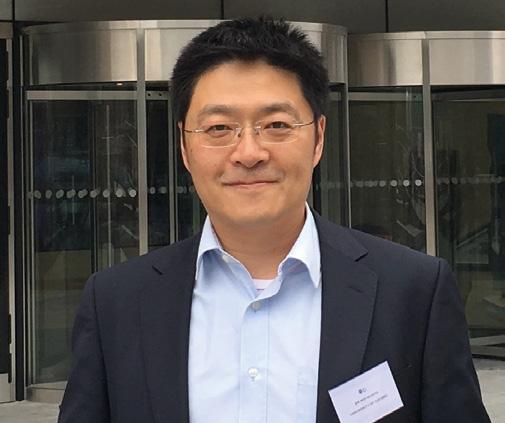
Professor Wei Huang, Fellow by Special Election in Synthetic Biology, and his research group have developed an innovative blood test designed to
Matthews
identify chronic fatigue syndrome which may also be applicable to long Covid and Lyme disease, boasting 91% accuracy.
Read more in an article in Advanced Science News: www.advancedsciencenews.com/firstever-diagnostic-test-for-chronic-fatiguesyndrome-sparks-hope

Professor Paul Matthews, Fellow by Special Election, has been named as the next Director of the Rosalind Franklin Institute (RFI), based at the Rutherford Appleton Laboratory on the Harwell Science and Innovation Campus near Oxford. The RFI is a national research institute dedicated to developing new technologies to tackle important health challenges. Although still only a few years old, the RFI is already a national leader in next-generation chemistries and innovative, multi-scale imaging for the life sciences.
Asked about the appointment, Paul explained, “I am excited to be able to lead the RFI in its next stage of development and look forward to strengthening its relationship and value to the University of Oxford and other partner universities.”
Paul assumed his new role in April 2024. He stepped down from his positions as a Head of Department at Imperial College London and Director of the UK Dementia Research Institute (DRI) Centre at Imperial but remains a Professor and Group Leader in the UK DRI, continuing to maintain his laboratory at Imperial.
Read more about the Rosalind Frankin Institute: www.rfi.ac.uk.
From weeks 1 to 8 of Michaelmas term, Hall students Minnie Leaver (2021, Fine Art) and Sarah Savić Kallesøe (2022, DPhil Population Health) were photography interns tasked with capturing aspects of Hall life from dining, studying and extra-curricular activities, which were then shared weekly on the Hall’s social media channels.
The result has been a rich variety of College and Oxford life which we hope will give prospective students an insight into what it is really like to live and study in
Oxford. Moreover, we know these photos have delighted our alumni as they have brought back many memories. Thanks to our interns for volunteering to do this and to everyone who has followed, liked and shared these photos online.
To view all the images from this term, head to our Instagram, Facebook or Twitter channels:
www.instagram.com/stedmundhall www.facebook.com/StEdmundHall https://twitter.com/stedmundhall


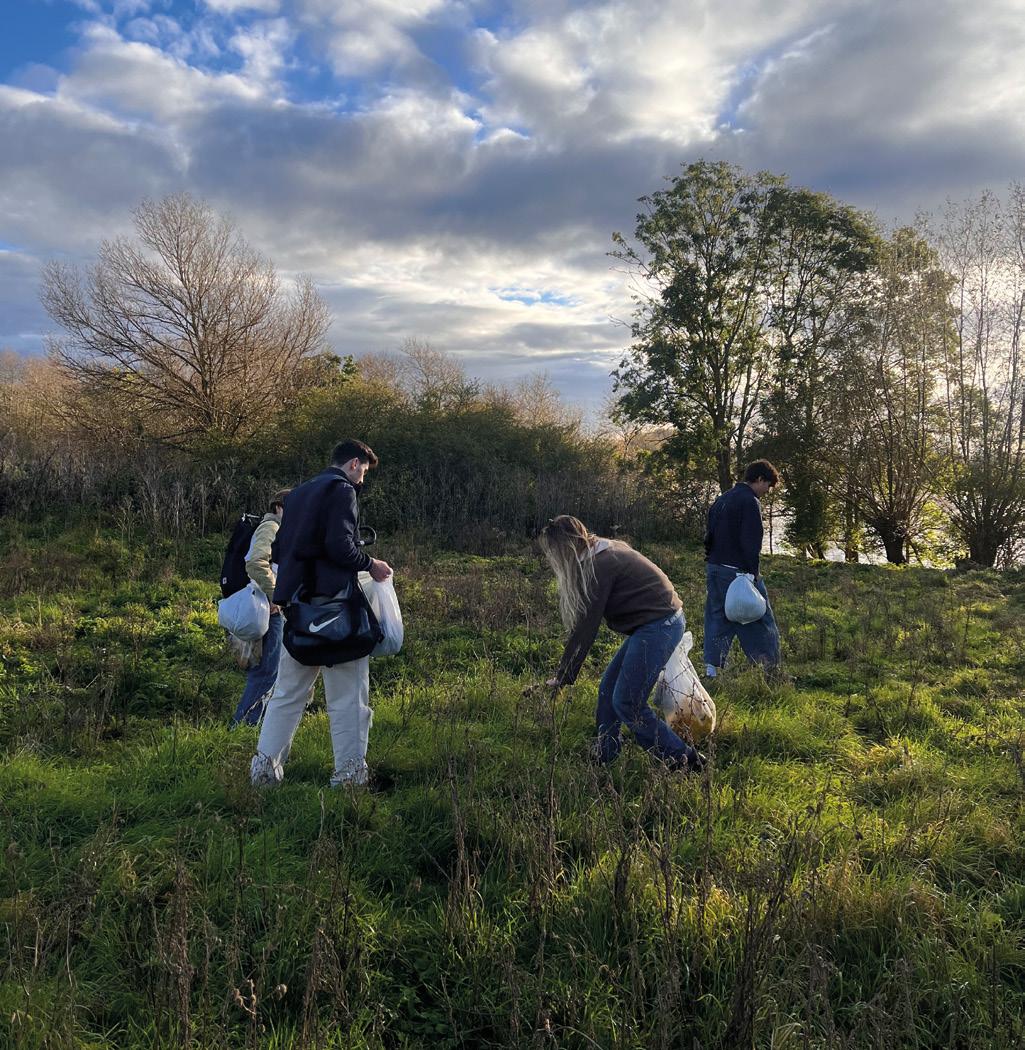

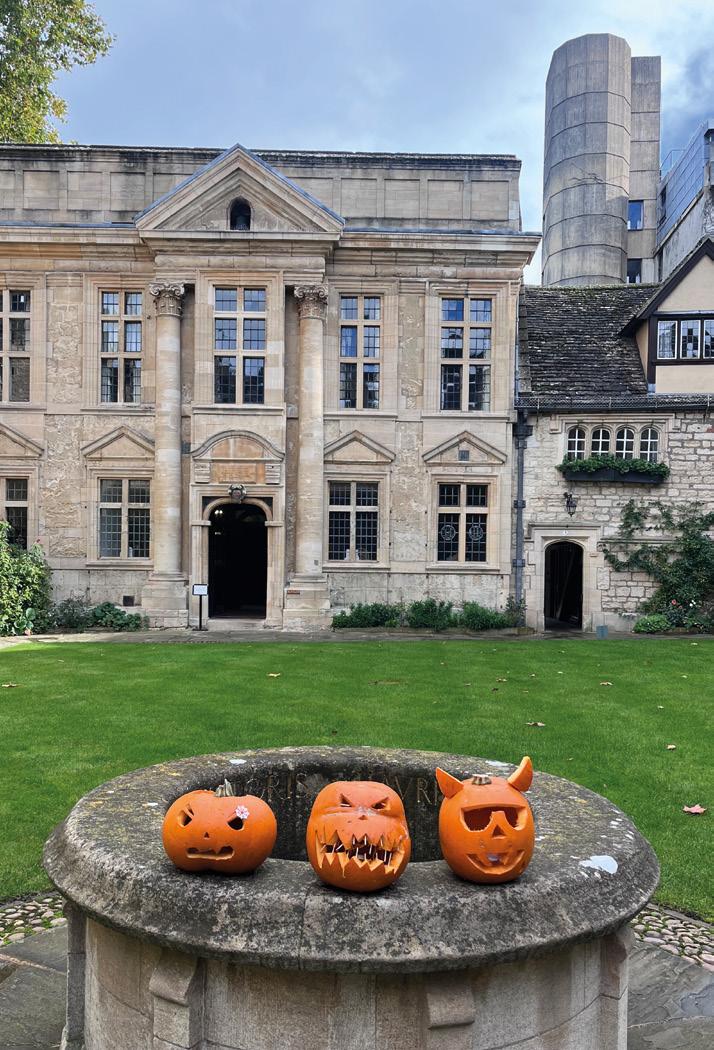





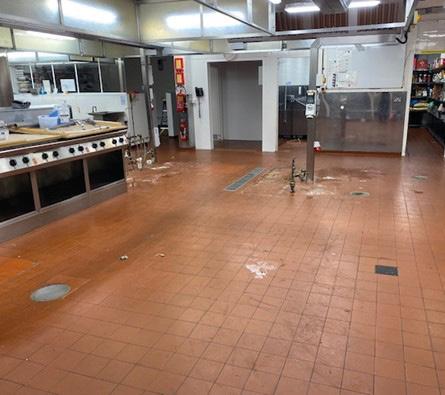
Over the Christmas break, the Estates team project-managed the replacement of the College’s 1970’s Kitchen and Servery floor, bringing it into line with modern standards and providing a fresh new look for our student community.
The existing red quarry tiles were installed when the kitchen was built and opened in 1971. Back then, these tiles were the ‘go to’ choice for commercial kitchens, but over time they can crack and the pointing between the tiles wears away.
Our Executive Head Chef Sam White and Estates Manager Steve Lloyd worked together to find a product that would be hard-wearing, comfortable underfoot, safe to use and food-hygiene compliant.

The project started with the removal of the majority of the Kitchen equipment. Grills, bratt pans, mixers, fridges, freezers, prep tables, dishwashers – a long list. Our contractor then spent five days on site laying the new resin floor. Finally, on day six, the equipment was reinstalled, ready for the College to reopen on 2 January.
The change from red quarry tiles to a blue resin floor may have gone unnoticed to many, but this represents a big change for the Kitchen and Servery teams and ensures the floor remains safe and compliant for years to come.
Thanks to Sam, Head Butler Molly McCarthy and their teams for their preparation work and help throughout the project.
From December 2023 to February 2024, St Edmund Hall’s College Boatman Jim Ronaldson took part in the Talisker Whisky Atlantic Challenge, a worldrenowned event that brands itself as the toughest row to complete.
After setting out from San Sebastian in La Gomera, Jim and his rowing partner Ian Davies successfully completed their 3,000-mile row across the Atlantic Ocean, arriving in Nelson’s Dockyard, Antigua, on Sunday 18 February at 3:06am, having been at sea for a total of 66 days, 17 hours and 39 minutes.
“I chose to row the Atlantic with Ian to show that no matter what age you are, if you have the will and mental strength you can do whatever you want,” said Jim.
Jim and Ian broke the record for the oldest combined pair with 132 years between them. Our Boatman also managed to savour some great sunsets, on his way to celebrating their arrival at Antigua.
Jim has always loved sport and adventure and has been rowing for 50 years. He has worked as a boatman/coach for the last 40 years and cycles around 120 miles per week in addition to rowing in head races. He has recently been shocked by the news


of a rise in mental health crises caused by the pandemic, especially in children and teenagers. He wanted to do what he can to help by raising money for mental health consultants and resources as well as raising awareness.
Together Jim and Ian raised over £25k for PAPYRUS UK, which supports the prevention of young suicide; and Myeloma UK, which helps fund research, treatment and care for people living with myeloma.
A huge thanks to everyone at Teddy Hall who supported them both on their epic journey. They have both shown Hall Spirit and raised an incredible amount for charity.
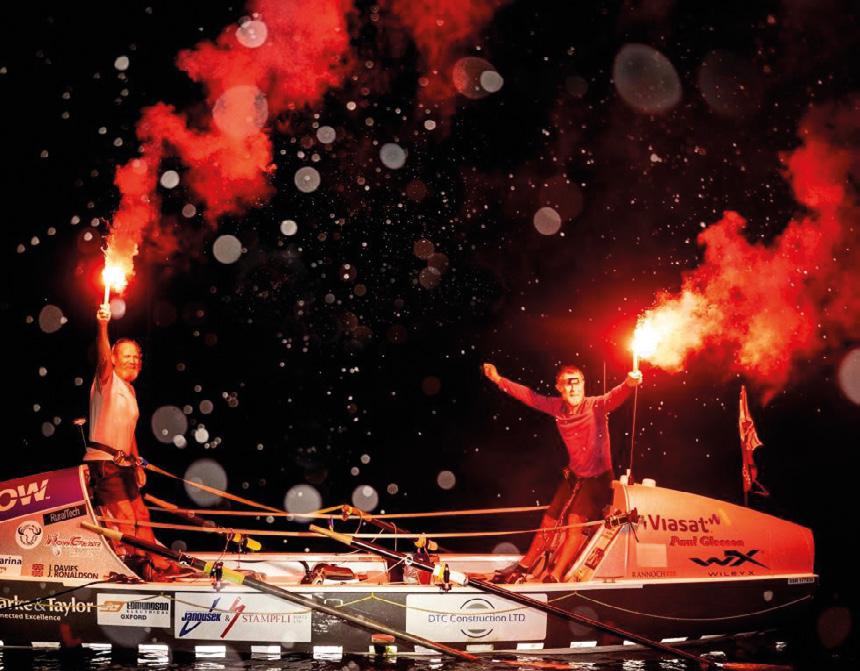
The Kalahari Desert in Southern Africa is warming at over twice the global rate, with climate projections indicating a gradual drying of the Kalahari, leading to more intense droughts. These trends present a profound threat to communities who have lived there for millennia and to the unique desert ecosystems. Over Christmas and New Year, a team led by Callum Munday, Fellow by Special Election in Geography, from the University of Oxford and the University of Cape Town travelled to the Kalahari to retrieve some of the first detailed atmospheric observations from inside the Kalahari Desert in a bid to understand these troublesome climate trends. Callum reports:
We were especially interested in a lowpressure system known as the Kalahari heat low, which is driven by intense surface heating and is linked with drought. Kitty Attwood, a DPhil student studying the heat low, explains, “with increasing temperatures, climate models show the Kalahari heat low is getting stronger and stronger, contributing to reduced rainfall across southern Africa. To trust the models, we needed go and check what the heat low looks like in the real world.”
It certainly felt hot. In the in 43-degree heat, a week before Christmas, we installed several strategically placed automatic weather stations and a LIDAR system in the Kalahari Desert. Through Christmas and New Year, we carried out a strict schedule of four-hourly weather balloon releases to measure the characteristics of the heat low, and to tune into the rhythm of the Kalahari atmosphere. Doing fieldwork in the extreme heat was a new challenge for

most of us. Charlie Knight, a DPhil student, remembers “It was quite sweaty in the day. I ended up having to construct an aircon unit for the LIDAR system from pallets, a desk fan, and some towels. It was the first time I’d done that.”
With the main setup working well, we embarked on an intensive observation period to measure an especially strong heat low event. This involved a research aircraft, which we flew over the desert to measure the size and shape of the heat low. Four undergraduates from the School of Geography were particularly excited by this and took charge of analysing data in real time to direct the flight tracks.
With the data back in Oxford, the next phase is to compare it with high-resolution climate model simulations from the UK Met Office. We are hoping that the observations provide new insights into the operation of the Southern African climate, and how it might respond to future warming.
The research was funded by the Gilchrist Fieldwork Award via the Royal Geographic
Society (RGS) and the John Fell Fund. Participating Geography undergraduates were funded by awards from the RGS and Keble Association. The project would not have been possible without support from collaborators at the Department of Oceanography at the University of Cape Town. The team is also deeply grateful to S. J. Koortzen and the team at Kgalagadi Lodge; Quentin Hurt for flying us in circles around the desert, the Cullinan family

at Cullinan Guest Farm; the owners and staff at Kalahari Info Centre & Tented Accommodation, Rietfontein; and Jaco, Andy and the team at Walker-Midas in Upington. Special thanks also to Dave Thomas for letting us borrow his car.
For more information visit the campaign website: www.kapex2024.com
Callum Munday, Fellow by Special Election in Geography
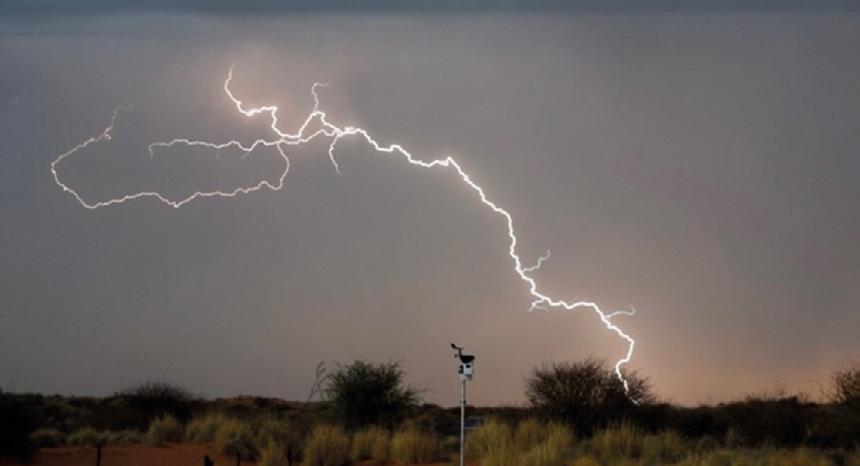
In late February, during the preconstruction archaeological survey at the College’s Norham St Edmund site in North Oxford, Pre-Construct Archaeology (PCA) discovered an ancient brooch. It was unearthed by Emma Cowdell, one of PCA’s field archaeologists, in an agricultural drainage ditch.
The brooch is Roman, dating roughly from the 1st to 2nd centuries AD (40–c.200 AD). The ‘bow’ shape of the brooch is modelled on earlier Iron Age brooches found in East Anglia and popularised across England by the Romans. Similar items have been found across the Cherwell Valley and Vale of the White Horse in Oxfordshire. The surviving delicate pin and spring of the brooch is uncommon for this type. The brooch was made of copper alloy, used as both a decorative and functional item to hold items of clothing together while worn.
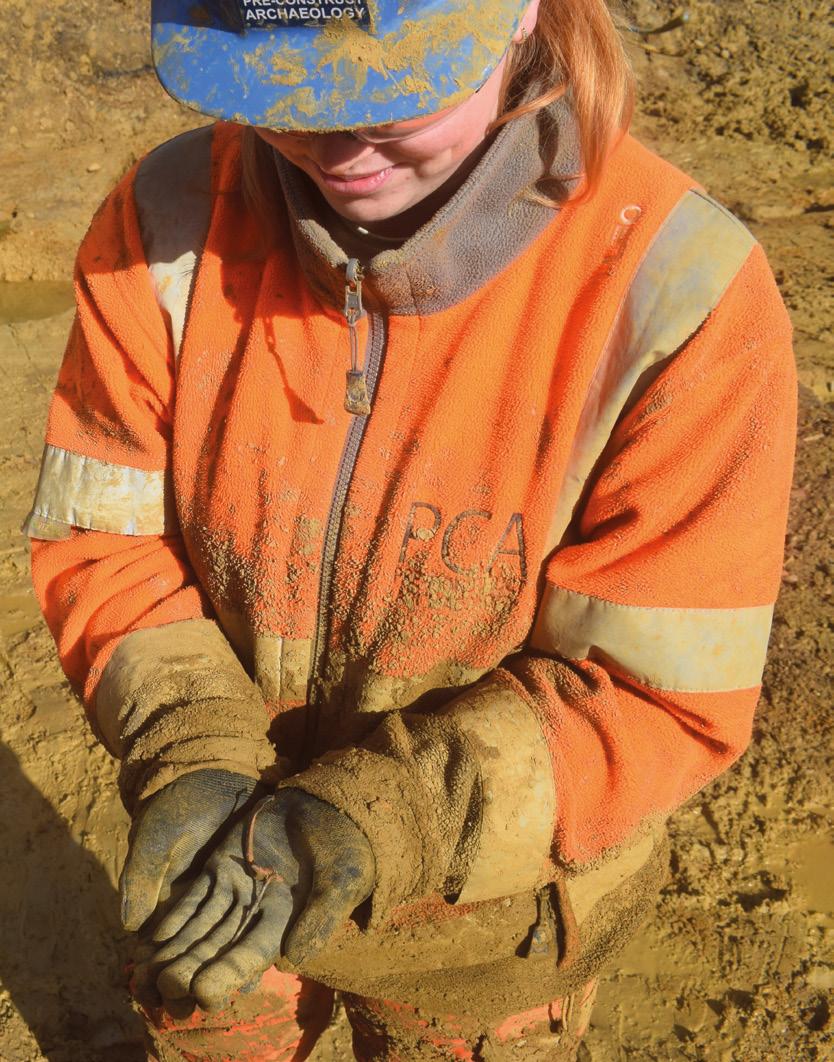
Only the catch of the brooch is missing. It is tempting to speculate that this had broken, causing the brooch to open and then be casually lost, resulting in its near complete state of survival.
After analysis by PCA archaeologists, the brooch was returned to the Hall in May and put on display in the Old Library. It was accompanied by an exhibition “The Grandeur that was Rome” featuring volumes from the Hall’s historic collections. It is hoped the brooch will go on permanent display in the Lodge of NSE when the building is completed.


Now in its second year, the Unlock Oxford programme saw 182 students from schools in Leicester and Derby visit the College over four residentials in March.
After many months of planning and orchestration, the Outreach team were delighted to welcome students from 12 inner-city schools in Leicester and Derby as part of the urban stream of Unlock Oxford. The programme works with students targeted individually based on their measures of disadvantage and academic ability, affording them the opportunity to immerse themselves in university life through an overnight stay at the College. In 9th Week of
Hilary term, two residentials took place for Leicester students in Year 12 and Year 10 respectively, with a further two residentials during the Easter vacation for Derby students.
The Year 12 residentials provided a comprehensive overview of studying at Oxford, including tutorial-style discussions and demonstration interview questions. Students enjoyed a tour of Oxford and had the opportunity to meet a number of Hall tutors who kindly gave up their time to attend a Q&A panel. An application masterclass aimed to equip attendees with all the relevant information on the Oxford application process so that they could make as competitive an application as possible in future.
The residentials for Year 10 students focused more on a general introduction to university, with sessions on student finance and A-level choices, as well as an opportunity to see the city and visit a University department for a hands-on session. The Oxplore team within the central University were kind enough to come along to deliver an engaging and
thought-provoking session which saw the students tackling broad questions like “can you choose to be healthy?” and “can we live without laws?”
“I wanted to pass on our gratitude for the incredible attention to detail and the welcome you gave us all. It was a truly wonderful experience and our students have grown so much in their confidence and self-belief as a result.” – Year 10 teacher from Derby.
A team of Student Ambassadors were on-hand throughout the residentials, allowing attendees to engage with and learn from current Oxford students. The ambassadors’ input was instrumental in the success of the programme, alongside the valuable contribution of the Bursary, Kitchen, Servery, Lodge and Housekeeping teams. Qualitative feedback has been extremely positive, and quantitative
analysis of feedback demonstrates statistically significant positive impacts on students’ understanding of university, their ability to make informed A-level and degree course choices, as well as Year 12 students’ understanding of all aspects of the application process.
Given that applications to the College from students in Derbyshire and Leicestershire increased threefold in the last admissions round, it appears that programmes like Unlock Oxford are having a tangible impact across the board.
Read the Residential Impact Summary: www.seh.ox.ac.uk/wp-content/uploads/ Unlock-Urban-Impact-Infographic-2024. pdf
Read the Outreach Impact Report: www.seh.ox.ac.uk/wp-content/uploads/ Outreach-Impact-Report-2023-web.pdf
On Monday 23 October, the Principal and Trustees of the Philip Geddes Memorial Trust met with former winners of the Geddes, Clive Taylor and Ronnie Payne prizes and selected guests in the Churchill Room at the House of Commons to remember the 40th anniversary year of the death of Philip Geddes (1977, English) who died in the Harrods IRA bombing in 1983. The former Prime Minister Theresa May, a friend of Philip, spoke movingly about her memories of him, his talent for journalism and his curiosity.
Read more about the event: dailydrone.co.uk/frame-geddes.html
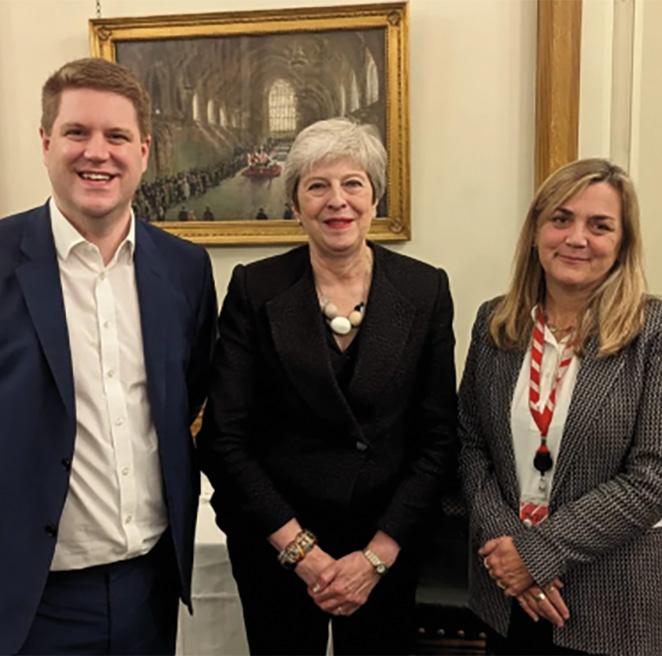
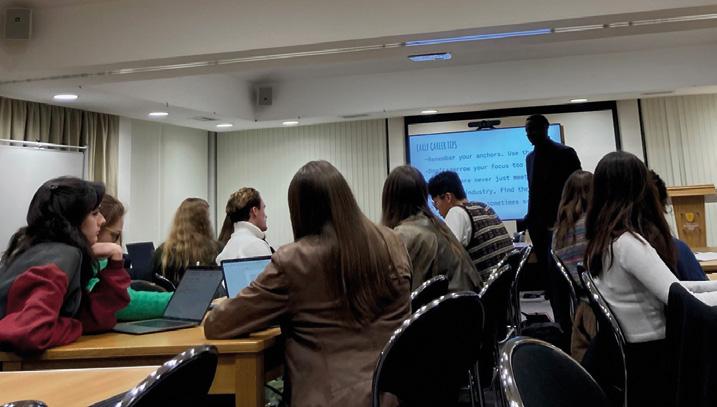
The Geddes Masterclass 2024 was held on Friday 20 January at St Edmund Hall. Students heard from Sky News’ Shingi Mararike on ‘Getting In and Getting On in Journalism’ and The Spectator’s Associate Editor Emma Byrne on ‘Getting the News First and Right’. The evening was hosted by the Chairman of the Geddes Trustees, John Ryley, and St Edmund Hall’s Geddes Fellow, Professor Wes Williams.
Geddes Student Journalism Prizes 2024
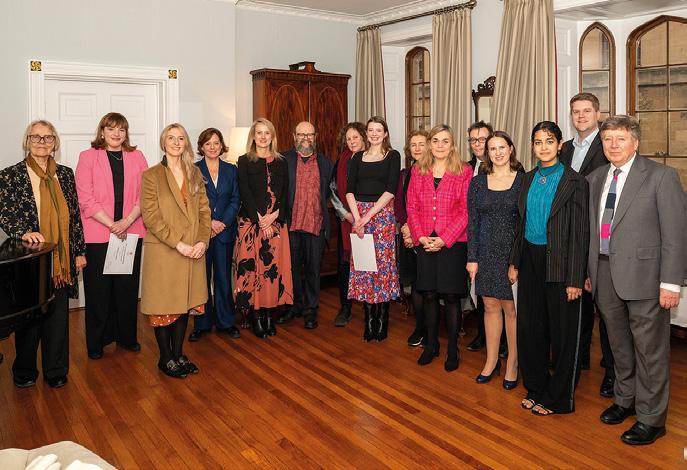
Philip Geddes Memorial Prize –Maggie Wilcox
Maggie Wilcox is a final-year History and English student at St Hugh’s College.
With significant experience as a reporter and editor at Cherwell, Maggie has both led the paper’s News Division as Deputy Editor-in-Chief and served as Director of Business. From talking to LTN protestors and student activists, to bringing the experiences of sexual harassment
survivors to light, she has worked to uncover new stories and enhance understanding of well-known issues and events. Having been a runner-up for the Best Journalist in the South East in this year’s SPA Journalism Awards, she is now the 2024 Philip Geddes Prize winner.
Her project is a variant on the all-American road trip. It involves interviewing people in Minnesota, Wisconsin and Michigan, the so-called ‘flyover states’ during the weeks before and after the Republican National Convention in Milwaukee in July 2024.
In talking to residents, politicians and local leaders, Maggie hopes to address some of the many questions people have about this part of America, and to provide readers with a more detailed depiction of what motivates Republican and Independent voters in these key states in 2024.
The results of her investigation will be pitched in different media and across various platforms, to American and UK political magazines, digital publications, and associated podcasts.
Maggie hopes to pursue a career as a journalist, developing still further her obvious strengths in investigative reporting.
Ronnie Payne Prize – Anandita Abraham Anandita Abraham (2022, PPE) is a student at St Edmund Hall.
Anandita has a good deal of experience in journalism, both within and beyond Oxford. Fiction Director for The Oxford Review of Books, and Features Writer and Lead Fiction Editor for The Isis Magazine, she has also written for Cherwell, The Malaysian Insight, Defiant Magazine, and the Youth Foreign Policy Magazine
She hopes to pursue a career in international journalism and has applied to a number of internships here in the UK;
she will be using the prize money to fund this work over the course of the summer vacation.
Clive Taylor Prize – Eleanor Luxton
Eleanor Luxton is a final-year Geography student at Mansfield College.
Eleanor has a strong track record as a journalist, having worked as an intern at ITV Anglia, Newsquest Media Norwich, and The Mirror. She has served as Digital Product Manager, at PODTech’s REACH local magazine, and as Section Editor for News and Sport, The Oxford Student, while developing the role of Editor of Mansfield College’s Virtual Quad – the weekly College newsletter for students and staff.
Eleanor has a distinct strength in sports journalism, particularly women’s sports, and for her Prize project she will conduct a wide range of interviews to explore issues around the design, production, and cost of women’s football kit in the UK – using this as a starting point to open up a bigger discussion about equality, status, and physical and mental health in football.
Special Commendation –Rose Henderson
Rose Henderson, final-year PPE student, Worcester College.
Rose has a wide range of experience in journalism, from the News Associates Editorial Leadership Course to The Oxford Student, where, having served as News and Comment Editor, Head of News, and Editor-in-Chief, she now fulfils the role of Managing Advisor and News Editor. Her project involves exploring the two very different routes up Ben Nevis as a way of opening up a debate about the status of hill-walking in the UK and its relation to larger questions about both conservation and the commodification of nature.
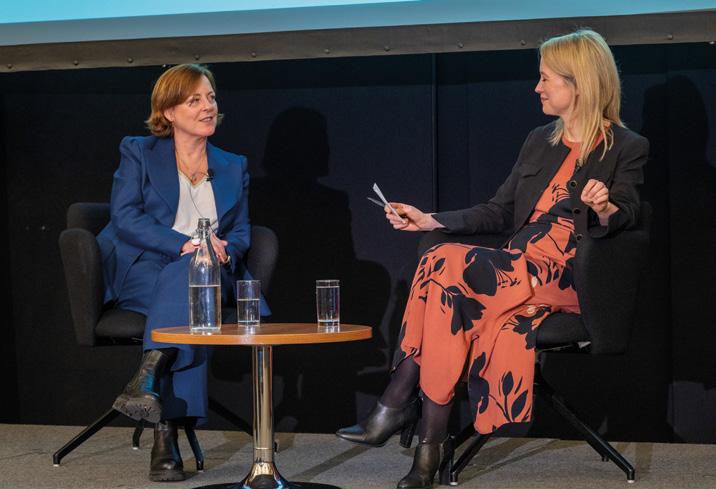
This year’s Philip Geddes Memorial Lecture was given by media regulator Ofcom’s CEO Dame Melanie Dawes in conversation with Aularian and Sky News journalist Sophy Ridge (2003, English) on Thursday 29 February. Dame Melanie Dawes joined Ofcom as an Executive Board Member and Chief Executive on 2 March 2020.
Prior to joining Ofcom, Melanie Dawes was Permanent Secretary at the Ministry of Housing, Communities and Local Government (2015–2020). She has held senior roles across the Civil Service, working in partnership across the public and private sectors. She became the Civil Service Diversity and Inclusion Champion in 2019.
Spanning the wide remit of Ofcom’s regulatory responsibilities, Dame Melanie and Sophy’s conversation offered a fascinating perspective on the changing landscape of communications.
In the context of the upcoming 2024 General Election, Sophy steered the conversation toward the increased polarisation of British politics, asking how Dame Melanie viewed Ofcom’s role in policing, or not policing, political debate. Whilst clear to affirm that Ofcom does not regulate politics itself, Dame Melanie
argued that social media has “sped up” the debate and has encouraged people to hold a narrow set of views, isolated in a rabbit hole of their own opinions and unchallenged by other beliefs. This, in her view, can lead to an unwillingness or inability to engage in civilised debate, instead making aggression and nastiness the likelier outcome, particularly toward women. Nonetheless, Dame Melanie argued for the importance of freedom of expression in a functioning democracy and that the right to free speech, even quite offensive speech, must be protected.
Moving to broadcast media, Sophy raised questions about recent programmes on GB News, asking whether Ofcom had been too soft on the channel and whether offensive comments made on air crossed the line of acceptability. Dame Melanie, although unable to comment on live investigations, pointed out that Ofcom had not been soft on GB News and that they had opened several investigations into the broadcaster. Ofcom’s mission is to ensure that programmes meet the standard of due impartiality: that a range of views are represented and that audience expectations of balance are met. This test of due impartiality is contextual and, for example, programmes featuring politicians must work harder to meet the standards of impartiality enforced by Ofcom.
Dame Melanie highlighted her belief in the importance of new and emerging broadcasters which bring to the fore a diversity and plurality of opinion. Adding to this, Sophy questioned whether the current dominant broadcasters were truly representative of the public’s opinions. A challenge, Dame Melanie said, was for broadcast media to represent views from all across the country, yet largely she believes it is successful – 75% of the public get their news from TV broadcasts and ~70% rate the main broadcasters
as trustworthy. These ratings, she said, put TV broadcasts ahead of print media and even further ahead of social media. Yet, the BBC for example is failing to reach people categorised in Social Grade D and E (semi-skilled and unskilled manual occupations; unemployed and lowest grade occupations) because, Dame Melanie argued, they do not feel represented by or feel a connection to the BBC’s broadcasts.
Indicative of the wide jurisdiction of Ofcom, conversation turned to social media, specifically its usage by children. Sophy talked of Esther Ghey, mother of Brianna Ghey, and her comments that the Online Safety Act 2023 does not go far enough and that children under the age of 16 should not have access to smartphones. Dame Melanie recognised the difficulty that many parents face when navigating their children’s relationship to technology and social media, herself included. The Online Safety Act, she said, aimed to place the onus on social media companies to make their platforms safe and compliant with their own terms of service. Platforms that allow children from the age of 13 must now enforce that minimum age, and those under 18s who do use platforms like Snapchat, TikTok, and Instagram must be protected from being contacted by adults and viewing unsuitable content. While separate conversations around reducing children’s access to smartphones are had, she said, in the meantime the Online Safety Act and its enforcement is an opportunity for positive change.
Asked by Sophy if regulation had kept up with the internet, Dame Melanie answered that it had not and that recent legislation in the UK and elsewhere was the first of its kind. Looking to the future, the prospect of generative AI and its risks, she argued that we must be proactive and keep up with
change. Technology neutral laws – laws that aren’t prescriptive and applicable only to certain technologies – are, in her view, key to ensuring that the law is broad enough to combat many criminal uses of technology. However, new threats to areas such as defence systems will require cooperation on an international and global scale.
On a lighter note, Sophy ended the formal interview with quick fire questions, revealing Dame Melanie’s love of Strictly Come Dancing and an Anthony Horowitz
crime thriller to unwind with.
Dame Melanie took questions from our in-person audience, who between them totalled around 150 attendees. Prior to the lecture the 2024 Geddes Prize winners received their awards at a tea with Dame Melanie and Sophy Ridge at St Edmund Hall.
Watch the Lecture: www.youtube.com/ watch?v=q5u_YXv9GOw
Jake Banyard, Early Career Graduate Trainee Library Assistant

From the Easter Vacation, Teddy Hall began using local suppliers through the
OxFarmtoFork short food supply chain initiative set up by Good Food Oxfordshire to increase the amount of locally produced food we serve at the College.
Short food supply chains have multiple
advantages including supporting the local economy and community, enabling producers to keep a larger slice of the profit, and reducing packaging and food miles.
Watch out for weekly updates on the @sehkitchen Instagram account where we’ll let you know when we’re using OxFarmtoFork food.
Read more about OXFarmtoFork at the Good Food Oxfordshire website: www. goodfoodoxford.org/ox-farm-to-fork
Monday 27 May saw the return of the World Poohsticks Championship, held at Sandford lock, with Bradley Mee (2021, DPhil Engineering Science) claiming the title!
Poohsticks involves players dropping sticks on the upstream side of a bridge over running water, and the stick that first appears on the other side of the bridge wins. The annual competition has been held on the Thames since 1984. This
year around 100 participants took part in groups of six, with the winner of each group proceeding to the next round, until the final race.
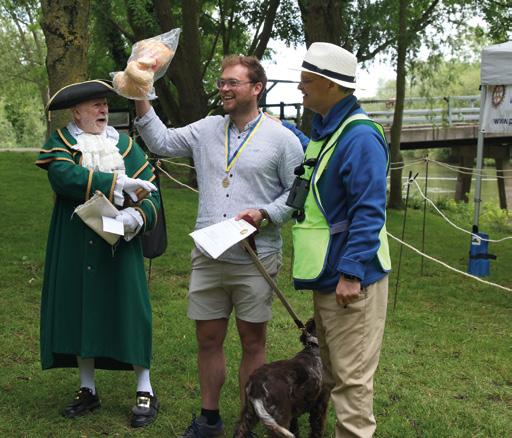
Find out more about the competition: www.poohsticks.uk
On Wednesday 5 June, the Crypt of St Peter-in-the-East opened its doors for the annual First-Year Art Exhibition.
All six fine artists – Matt Bartlett, Ben Holland, Harriet Humfress, Tom Meldrum, Monty Williams and Cecelia Yuan – installed and curated select work from their recently submitted Prelims portfolios, spanning painting, drawing, sculpture and film. The space provided a dynamic and unique location to exhibit work, as well as some specific limits because of its history and religious nature which required a resourceful and cooperative installation.
The exhibition has become a tradition in recent years and gives an opportunity for the first-year artists at St Edmund Hall to celebrate the culmination of their first year. It also provides an exciting and dynamic space to install and curate works as an intimate group, and a way of celebrating Hall culture and our unique spaces.
This year’s show received great support from students and staff, who gathered in the space with drinks and music to continue this stimulating Hall tradition.
Matt Bartlett (2023, Fine Art)
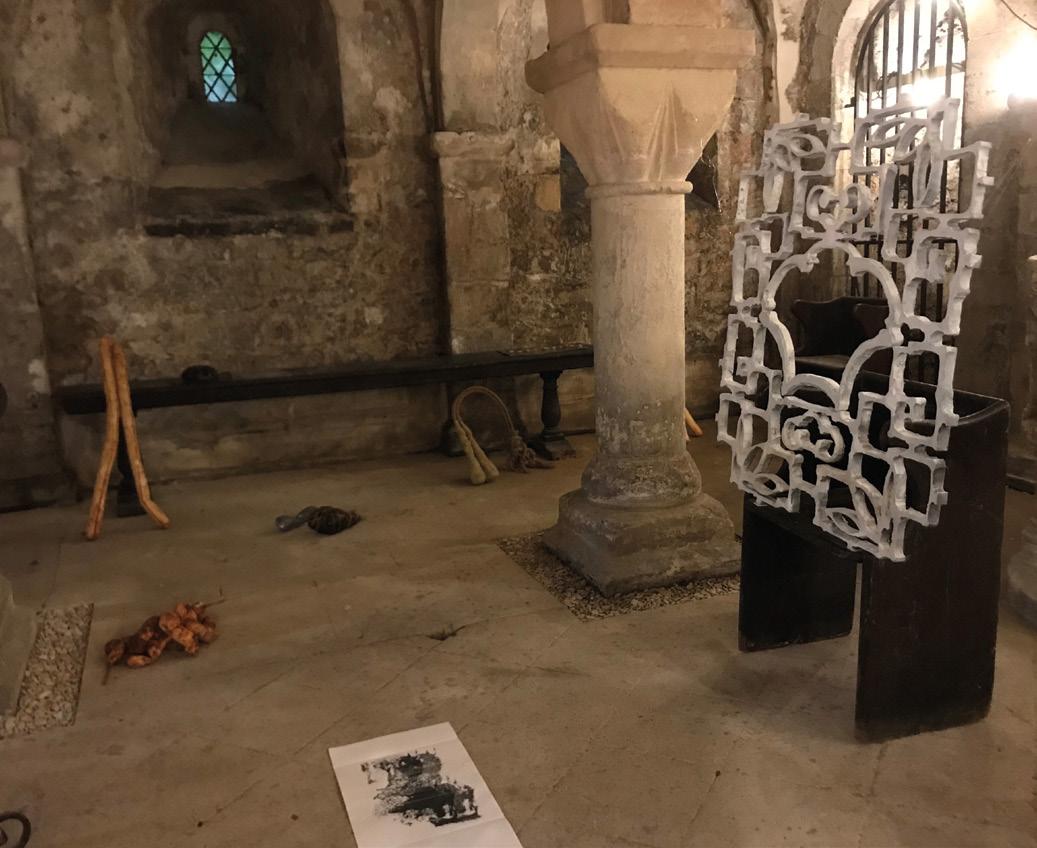


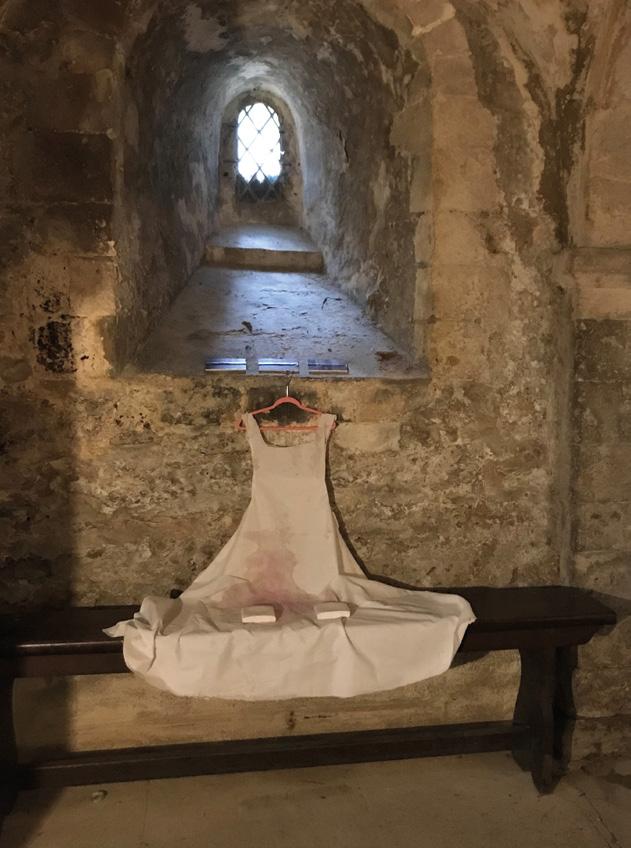

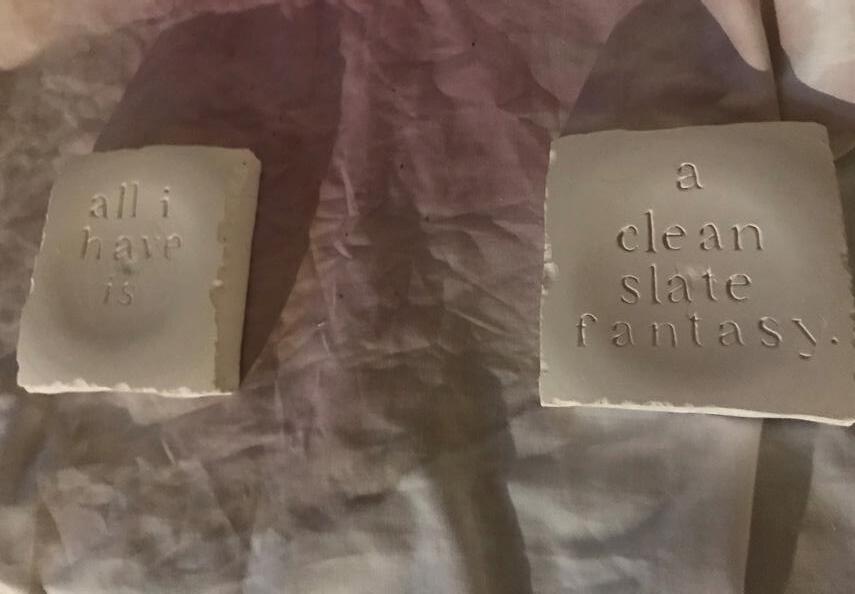
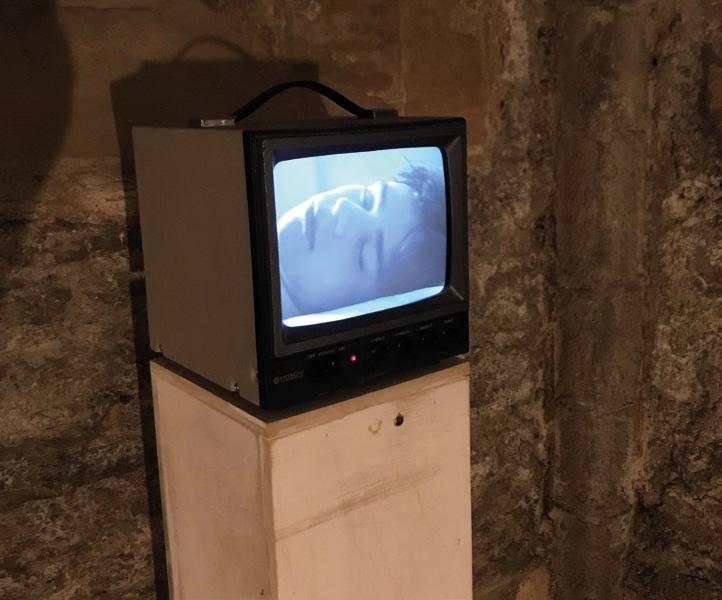

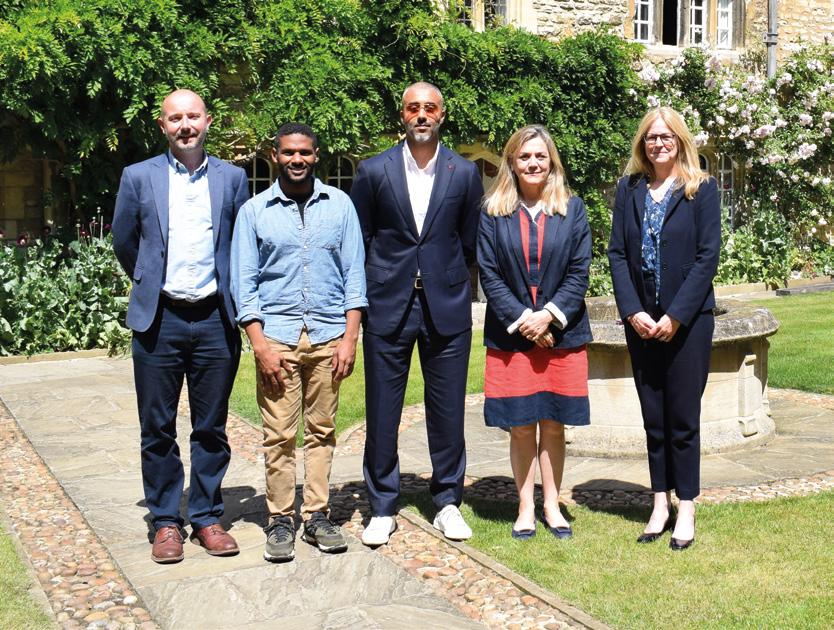
A generous donation from Mr Shuaib Chaudhary has enabled the creation of a new scholarship endowed in perpetuity at St Edmund Hall.
The scholarship is available to Masters students from one of the Islamic Development Bank countries demonstrating exceptional academic merit; eligible courses for the scholarship are Islamic Studies or courses in the subjects of Business, Economics, Finance, Law and Politics, with applicants having received an offer to study at the University.
The College is incredibly grateful to Shuaib Chaudhary for his support of the scholarship. Shuaib is a member of the Vice-Chancellor’s Circle, a fund manager and non-practising lawyer. Although not an alumnus of the University of Oxford he was motivated to establish the scholarship to support students from the Islamic world to study at Oxford and make a positive social impact in their communities. He said:
“I am delighted to be announcing this partnership with St Edmund Hall at the University of Oxford in order to provide students from Islamic countries an opportunity to study at arguably the world’s best university. I sincerely hope this
leads to a positive societal and economic contribution to candidates’ respective home countries but also to the UK should they wish to remain.
It is one of my goals that there is greater ethnic minority representation across all institutions in the UK. I would like to dedicate this scholarship to my late grandfather, Mr Adalat Chaudhary, cofounder of the Bestway Group, who always impressed upon me the importance of education and giving back to society. He believed in me when no one else did and was instrumental in my success. Without him I would simply not be where I am today and it was a privilege and honour to have been his grandson.”
The inaugural scholarship was awarded in 2023–24 and supported Khalid Abdelgadir, studying for an MBA at the Saïd Business School. Khalid is a Sudanese entrepreneur working in agribusiness. He holds a bachelor’s degree in Mechanical Engineering from the University of Khartoum. Khalid is very keen on tackling the food-loss problem by making solutions that bridge the gaps within the food value chain. In 2020, he co-founded a start-up that gives farmers access to cold storage services using solar energy. After finishing his studies, Khalid aspires to continue building innovative solutions that enhance food security and achieve social stability for African smallholder farmers. Khalid commented:
“I’d like to thank Shuaib for supporting my studies. The scholarship provided me with the opportunity to enjoy a life-changing experience while in Oxford, giving me the chance to realise substantial personal growth. The community at St Edmund Hall is like family with a diverse student body and plenty of events.
In the future, I aspire to become an impact investor, reframing the entrepreneurship landscape and working to develop and implement innovative frameworks that support the underserved communities in emerging economies. After graduation, I would like to focus on unlocking the
underlying potential of the youth in Africa. Studying an MBA will be the first step I take towards making that dream a reality.”
The next Shuaib Chaudhary scholar will commence their studies at the Hall in October 2024.

Following the General Election of 4 July 2024, St Edmund Hall proudly extended its congratulations to the Rt Hon Sir Keir Starmer (1985, BCL) on
becoming the Prime Minister of the United Kingdom. Sir Keir is the first Aularian to have held the office.
The Principal said: “On behalf of the entire College community, I would like to offer sincere congratulations to Sir Keir Starmer on becoming Prime Minister of the United Kingdom. We are deeply proud of all he has achieved as a distinguished alumnus of the Hall and he will, I am sure, lead the country judiciously during these challenging times.”
Sir Keir – an Honorary Fellow of St Edmund Hall – matriculated in 1985 to read for a Bachelor of Civil Law (BCL). He was called to the Bar in 1987 and appointed Queen’s Counsel in 2002. From 2003 to 2008, he was the human rights advisor to the Policing Board in Northern Ireland before serving as Director of Public Prosecutions and Head of the Crown Prosecution Service from 2008 to 2013.
Sir Keir has been the MP for Holborn and St Pancras since 2015 and was elected as Leader of the Labour Party on 4 April 2020.
Sir Keir Starmer on his time at Oxford: “When I arrived at St Edmund Hall, I had a first-class degree from Leeds University behind me. But I was still not clear what path I should take next. My time at St Edmund Hall – an intense year studying for the BCL – confirmed me in my choice of pursuing a career as a human rights advocate, both here in the UK and abroad. From then on, I did not look back!”
Other Aularians were returned to Parliament at the Election: Rt Hon Mel Stride (1981, PPE), a member of the Conservative party, retained his seat in Central Devon, as did Labour Aularian Rt Hon Nick Thomas-Symonds (1998, PPE), MP for Torfaen. Nick was subsequently appointed as Paymaster General and Minister for the Constitution and European Union Relations in the Cabinet Office.

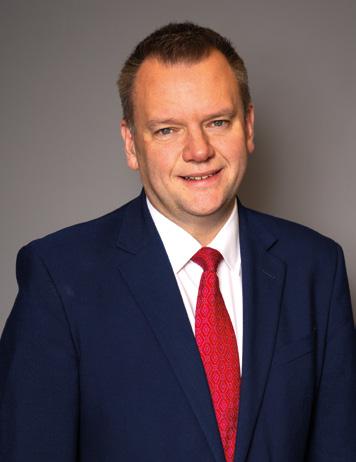
Rt Hon John Spellar (1966, PPE), having served in the Commons for 32 years, stood down as MP for Warley at the dissolution of Parliament. He was appointed to a Life Peerage for the Labour Party in the Dissolution Honours List.
Sir Keir’s success, and that of all our Aularian MPs, was celebrated with an exhibition in the Old Library featuring books and other items donated or written by members of St Edmund Hall from the 17th to the 21st centuries.

On Thursday 22 February 2024, St Edmund Hall’s Centre for the Creative Brain (CCB) and the Wellcome Centre for Integrative Neuroimaging (WIN) hosted their highly anticipated and sold-out event ‘Neuro-Fashion Show’.
Kicking off the event was a captivating neuroscience-themed musical performance by the talented Oxford WINstruments. Next, the models took the spotlight, strutting down the catwalk adorned with an array of neuroscientific tools, such as electroencephalography caps, sleep bands, and a transcranial magnetic stimulation machine! Serving as the evening’s emcee, Michael Sanders, Lead Research Radiographer
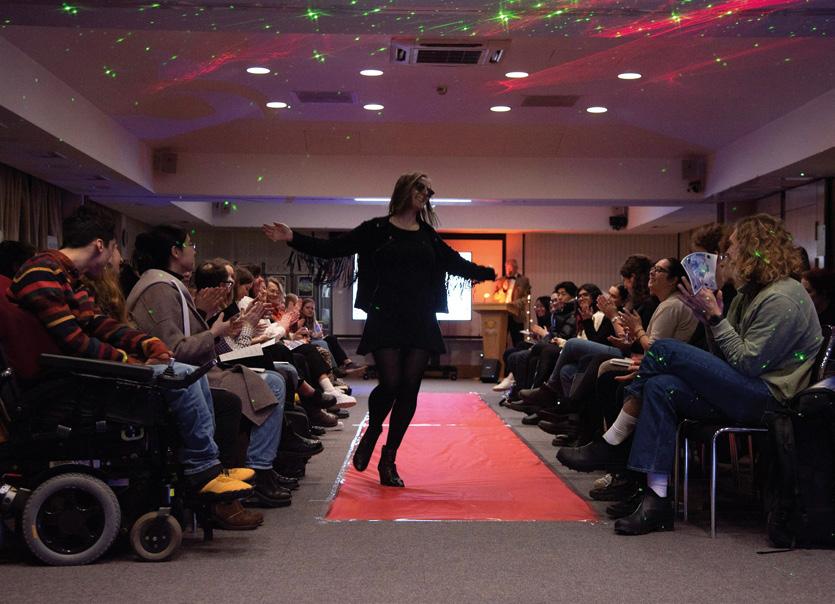
at the Nuffield Department of Clinical Neurosciences (NDCN), shared insightful commentary on the software showcased on the red carpet. Finally, the audience were invited to try out the tools and to engage in discussions with Oxford neuroscientists who use these instruments in their daily research.
With many thanks to St Edmund Hall, Charlotte Stagg (Fellow by Special Election and Professor of Human Neurophysiology), Michael Sanders, all of WIN, the CCB Committee, as well as the dedicated models, musicians, and photographers who collectively made this public engagement event a resounding success.
The CCB’s second event of the year was also a sell-out. It took a supernatural turn and focused on the ‘Neuroscience of Paranormal Perception and Altered Consciousness.’ Charlotte Stagg was joined by a panel made up of Professor Christopher French (Head of the Anomalistic Psychology Research Unit in the Psychology Department at Goldsmiths, University of London), David Luke (Associate Professor of Psychology at the University of Greenwich) and Dr Christopher Timmerman (Centre for
Psychedelic Research at Imperial College London). The audience enjoyed ghostly tales, as well as talks on alien abductions, psychedelics and consciousness. It was an evening of entertainment and scientific exploration!
The Centre for the Creative Brain is generously endorsed by St Edmund Hall
It’s always a joy to meet with Aularians and other friends of the Hall from all over the world – this year has seen a bumper crop of events!
From 5–10 September, the Principal and colleagues from the Development and Alumni Relations Office had the pleasure of meeting alumni and guests in San Francisco, Los Angeles and Laguna Beach. The visit provided the opportunity for Teddy Hall alumni to reconnect with one another at events, hear the latest news from the Hall and to learn about progress with the HALLmarks campaign and particularly the NSE development.
Alumnae Christine Kelleher (1987, Agricultural Economics), Catherine Ysrael Gomez (1986, English) and friend of the Hall, Kylie Schuyler, kindly hosted cocktails and dinner at Emerald Bay for Aularians and guests to raise awareness and funds for NSE. Alumnus Ethan Lipsig (1967, Philosophy) generously hosted a

and the WIN, University of Oxford. The Centre is led by Professor Charlotte Stagg and the student-led Centre for the Creative Brain Committee.
More about the Centre for the Creative Brain: www.seh.ox.ac.uk/discover/ research/centre-for-the-creativebrain-2
drinks and canapés event at his beautiful home and gardens in Pasadena on the following day. Both occasions were great events, and we hope that alumni on the west coast will continue to keep in touch with one another and the Hall over the year ahead!
Members of the Hall including the Senior Tutor Professor Robert Wilkins and the Director or Development Andrew Vivian visited New York in December to meet more North American Aularians: Betsy and Peter Newell (1961, Jurisprudence) generously hosted a drinks reception at their apartment on the Upper East Side on Thursday 7 December with around 30 Aularians in attendance to hear updates from the Hall.
Friday 8 December then saw the 38th Annual New York Dinner at the Links Club, kindly hosted by Justus O’Brien (1979, PPE). There, alumni heard from Bob Gaffey (1975, Jurisprudence), who leads

the HALLmarks North America Committee, giving an update on its achievements and future objectives.
Finally, on Saturday 9 December, Bob Gaffey kindly hosted a working breakfast at the Penn Club for those on the HALLmarks North American Committee, to discuss how best to go forward with the group’s fundraising objectives and more. In April, the Principal and Director of Development travelled to Asia to meet with alumni in Hong Kong and Singapore. In Hong Kong, José-Antonio Maurellet (1996, Jurisprudence) kindly hosted a drinks and canapés reception at his Chambers, and in Singapore, Luke Jones (1989, Experimental Psychology) kindly hosted an event at the 1880 Club.
Both events and several meetings over the course of the week provided an opportunity for alumni to meet the Principal, connect with one another as Aularians and engage with the Hall, whilst hearing about the latest developments and opportunities to support the HALLmarks campaign.
The Development and Alumni Relations Office hope that this visit will be a catalyst
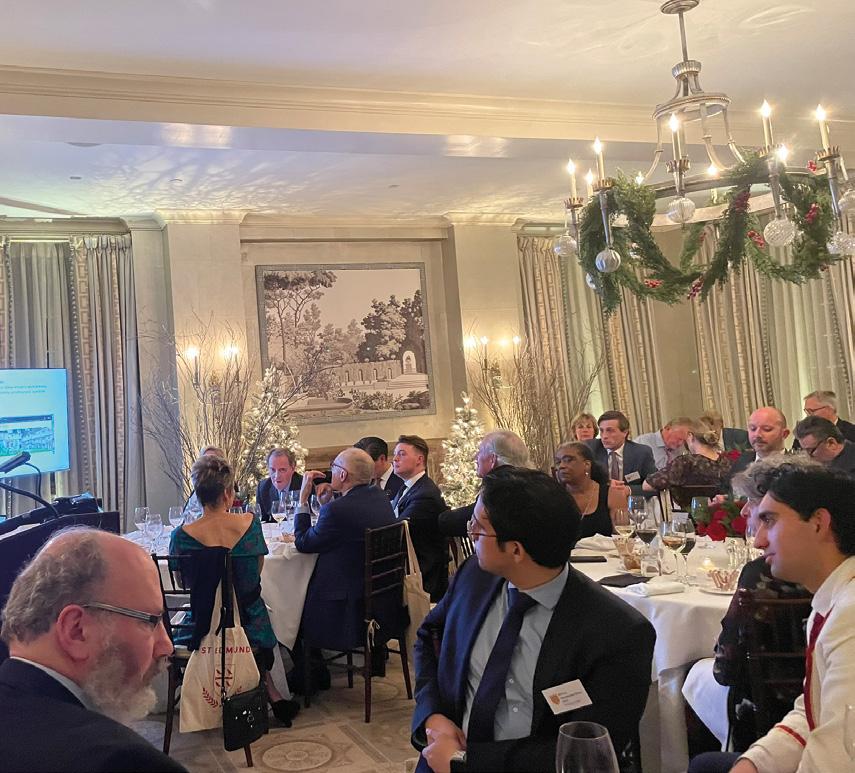
for an annual dinner for Aularians in Asia, to mirror the well-established annual dinner for US alumni that takes place each December in New York.
Finally, the Principal and Director of Development attended the inauguration of the St Edmund Hall Room at a new building at HEC Montréal Business School in June. The visit followed a lunch with the Director, Federico Pasin, and colleagues from HEC Montréal as well as St Edmund Hall alumni based in the Montréal and Ottawa regions. The event was generously hosted by Teddy Hall alumnus Jean Chagnon (1971, BPhil Management Studies), his wife Silvie Chagnon, and son Antoine Chagnon.
Jean has supported the HEC Montréal–Oxford partnership since 2018 and has generously contributed towards academic research and scholarships at the Hall, the Saïd Business School and HEC Montréal. The partnership aims to encourage faculty at the two universities to share their knowledge and experience, facilitate exchanges between the student communities, and increase the number and reach of research collaborations.
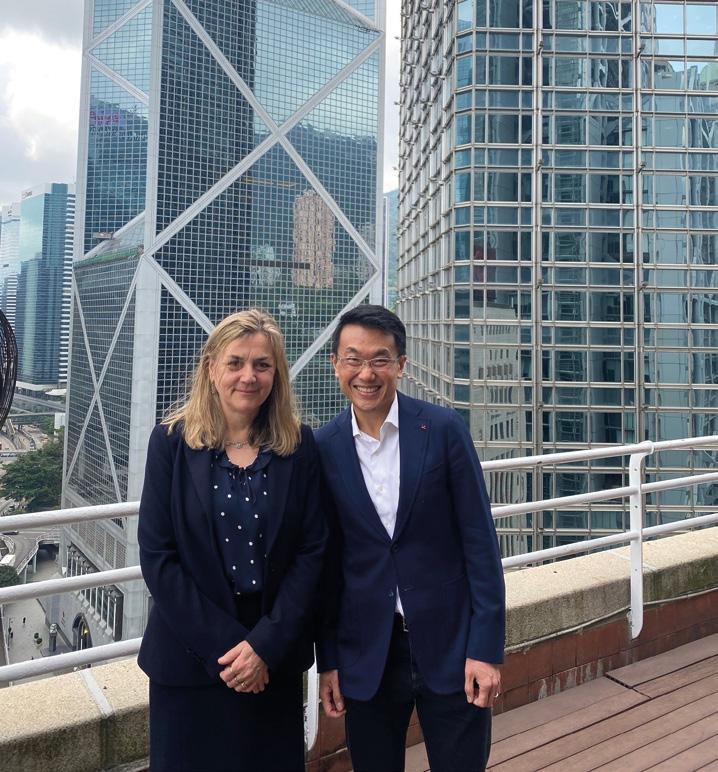
A reciprocal arrangement is planned to create an HEC Montréal cluster of rooms at NSE once completed in 2026, to mirror the Salle d’études St Edmund Hall at HEC Montréal to further strengthen the partnership between the two institutions.
Well done in particular to the Principal and to the Director of Development for their efforts and fortitude on the road and to all our international alumni who organised events on behalf on the Hall!
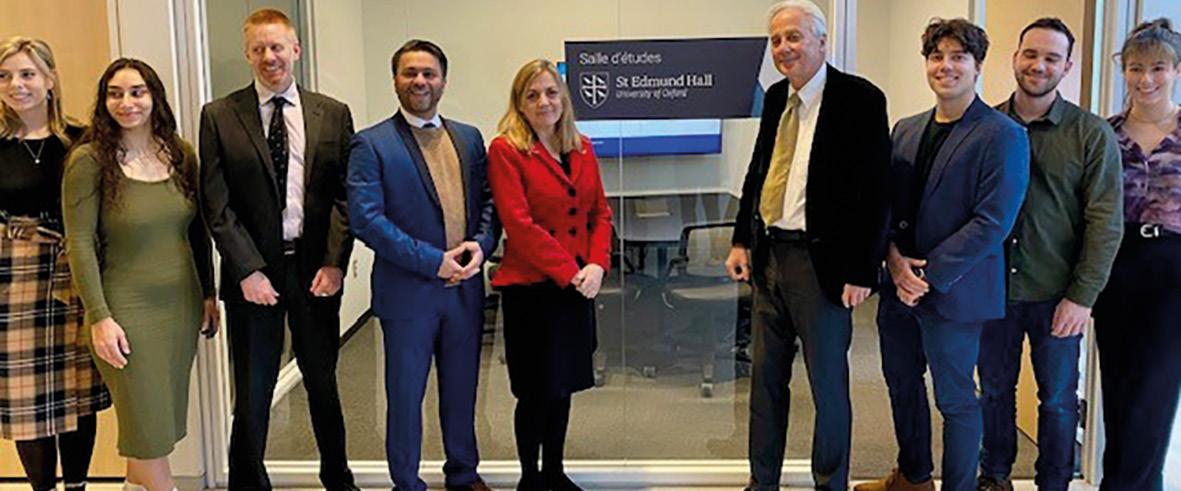
The Hall’s 10-year strategic plan discusses establishing a “… College culture that is creative and inclusive...”. One aspect of this which has been enthusiastically embraced by our students is the increasing number of ‘Themed’ Formal Halls – feasts which celebrate the rich diversity of our College family.
In 2023–2024, this has included Formals for cultural occasions such
as US Thanksgiving, religious festivals including Diwali, and commemorations like International Women’s Day. Needless to say, the events include sumptuous food from the dedicated team in the kitchen but also diversions such as lion dancing for Lunar New Year and bagpipes on Burns Night. The programme culminated in a special Formal in May in honour of the diversity of our student body on the theme of ‘Celebrating Strength’.

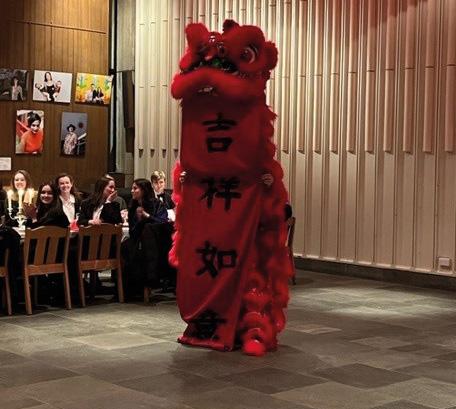
As ever there have been many admirable achievements of SCR members, current students and worldwide alumni during 2023–24. These are chronicled in Sections 2, 4 and 9 of this Magazine. Here, special mention is made of some of these awards and prizes, and of other successes deserving to be placed on record.
Three alumni were recognised in the 2024 New Year Honours List: Lukas May (2008, PPE), Ian Hewitt (1966, Jurisprudence) and Rear Admiral Andrew Betton (1987, Earth Sciences).
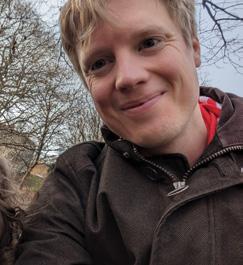
Lukas received an OBE for services to International Trade. He worked as a senior trade negotiator in the run-up to and after Brexit, leading the UK’s FTA negotiations with Japan, and then the UK’s accession to CPTPP, a regional trading bloc.
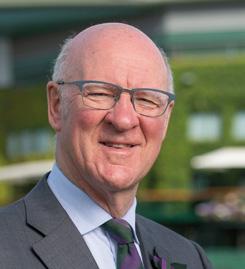
Ian received an MBE for services to tennis and charity. Ian shared with the Hall: “I am very pleased and privileged to receive this honour, recognising the great work of the team at the All England Club and their contribution to society including through the Wimbledon Foundation. I remember my years at Teddy Hall with great affection and am forever grateful for the experiences, confidence and friendships that I gained during that special time which formed an important platform for my life.”

Andrew became a CB (Companion of the Order of the Bath) in the 2024 New Year’s Military Honours list.
by
St Edmund Hall congratulates three of its academic researchers for being awarded Professorships at the University of Oxford in the most recent Recognition of Distinction exercise 2023.
Professor Jenny Taylor has been conferred the title Professor of Translational Genomics, Professor Aris Karastergiou became Professor of Astrophysics and Professor Claire Edwards was awarded the title of Professor of Bone Oncology. We asked them for comment on this prestigious achievement:

“I am delighted to have the title of Professor of Translational Genomics conferred on me. When I returned to the University from the biotech sector in 2002 to lead a translational genomics programme, the term ‘translational research’ had only just been coined. Since then, my focus has been not just on genomics research, but also on ensuring that the results of this research are translated into the clinic, delivering new genetics tests and technologies for patients with rare diseases and cancers. I am very grateful for the many collaborations that I have had with colleagues, particularly those in the Wellcome Centre for Human Genetics, the Nuffield Department of Medicine, the Oxford University Hospitals Foundation Trust and, of course, St Edmund Hall, where this journey started as an undergraduate.”
– Professor Jenny Taylor.
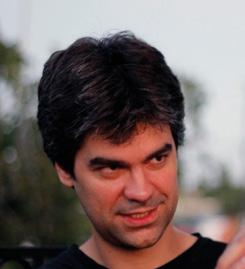
“It is welcome news, as this is a step I feel I had to take in my professional life here in Oxford. In Oxford, it seems no two academics share the same path and experiences, and I have been lucky over the past years to enjoy the support of numerous talented people, from my students and group members, to mentors in the department and College. One way or another, this environment is providing me with opportunities to achieve the objectives of my work. I appreciate being given the message that these objectives have some value to the academic community.”
– Professor Aris Karastergiou.

“I’m honoured to have been awarded the title of Professor of Bone Oncology. I’m very grateful to everyone who has supported and encouraged me throughout my academic career, both within the University of Oxford and beyond. This reflects the hard work and commitment of all the members of my research team, past and present, who work tirelessly to combat tumour growth within bone.”
– Professor Claire Edwards.
Emeritus Fellow Recognised by Peking University
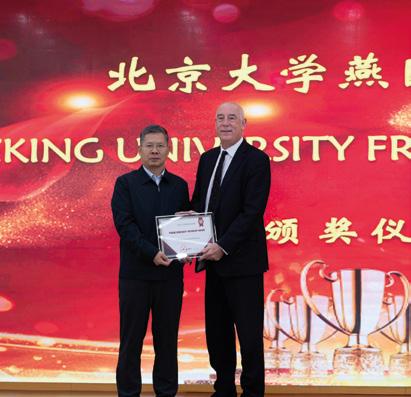
Congratulations to Emeritus Fellow Professor Alistair Borthwick who on 19 October was presented with the second Yanyuan
Friendship Award by Peking University at a ceremony in the College of Environmental Sciences and Engineering.
Alistair has been collaborating with Professor Jinren Ni and colleagues at Peking University for more than 25 years on issues related to environmental fluid mechanics. The award recognised Alistair’s outstanding contributions to talent cultivation and academic development of Peking University.
Biochemists Recognised in Teaching Excellence Awards
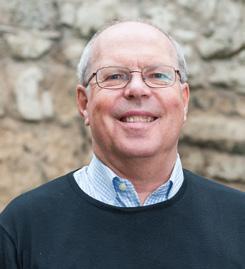
Professor Stuart Ferguson, Emeritus Fellow, won the Lifetime Achievement Award in the Medical Sciences Division’s Teaching Excellence Awards. This is in recognition of his outstanding and exceptional contribution to Biochemistry teaching and scholarship at Oxford and for 37 years of providing the highest quality teaching and making substantial contributions to teaching innovation and the spread of good teaching practice.
Sadly, Stuart Ferguson passed away on 25 April 2024. His obituary and fond tributes from colleagues and students can be found on pp. 217–219.

Professor Lars Jansen (William R Miller Tutorial Fellow) was also awarded the Excellent Teacher Award.
Read more about the awards: www.medsci.ox.ac.uk/for-staff/ resources/educational-strategy-old/ teaching-excellence-awards/previousawards/2023-teaching-excellenceawards
Senior Research Fellow Named in 2023 Kindness & Leadership: 50 Leading Lights List

Congratulations to Professor Déirdre Hollingsworth, Senior Research Fellow, who was been recognised in the 2023 Kindness & Leadership: 50 Leading Lights list, announced in November.
Déirdre is Professor of Infectious Disease Epidemiology at the Big Data Institute. She works on the development of mathematical, statistical, and computational models that inform disease dynamics and their translation to global health policy. She has made significant contributions to the study of neglected tropical diseases (NTD), Covid-19, malaria, and HIV/AIDS. She founded and leads the Bill and Melinda Gates Foundationfunded NTD modelling consortium, and was a member of SPI-M-O, part of the UK government’s science advisory structure for the Covid pandemic.
Her nomination for the award read: “Déirdre’s leadership style is inspiring and empowering. She recognises the potential in each team member and encourages an environment where everyone feels valued for their unique contributions. She displays humility, consistently highlighting the value others bring to the collective work. Déirdre personifies kindness and effective leadership. She creates an atmosphere of inclusion and belonging within our team.”
Watch a video of Déirdre talking about her award: www.kindnessrules.co.uk/ourcandidate/2023/#myvideo11.
Hall Fellow and Oxford Chemical Engineers Win Top Prize at 2023 IChemE Global Awards

In the prestigious IChemE Global Awards 2023 held on 30 November 2023 in Birmingham, the collaborative project ‘Rapid test for Covid-19’ by the University of Oxford and Oxsed Limited clinched the top prize –‘Outstanding Achievement in Chemical and Process Engineering Award’. The team also secured two additional trophies in the categories of ‘Innovative Product Award’ and ‘Business Start-up Award’.
Led by Professors Zhanfeng Cui and Wei Huang, Fellow by Special Election in Synthetic Biology, the Oxford team developed a rapid Covid test during the pandemic. Subsequently, the test has been successfully commercialised through the spinout company Oxsed Limited. This joint initiative involved the Department of Engineering Science at the University and the Oxford Suzhou Centre for Advanced Research (OSCAR).
Expressing delight at receiving the awards, Professor Zhanfeng Cui, the Donald Pollock Professor of Chemical Engineering, stated, “It is an outstanding recognition for Oxford Chemical Engineering by our professional community.” Professor Wei Huang added, “This is a testament to the dedication of our DPhil students and postdocs at the University of Oxford and in OSCAR, who contributed to the project during the challenging time.” Danny Yeung, Founder and CEO of Prenetics, the company that acquired Oxsed, commented, “Oxsed set multiple records and is a compelling example of the powerful combination of top scientists and great entrepreneurs.”
Robert Whittaker Recipient of the Alfred Russel Wallace Award 2023

Professor Robert Whittaker, Emeritus Fellow at St Edmund Hall and Emeritus Professor of Biogeography, has been announced as the 2023 recipient of the International Biogeography Society’s biennial award for a lifetime of outstanding contributions by an eminent scholar in Biogeography. The award is named after Alfred Russel Wallace, a key founding figure in the field of biogeography. Professor Whittaker received the award at the Biennial meeting of the International Biogeography Society, which was held in Prague in January 2024. Rob comments: “I am thrilled to receive this award from the International Biogeography Society. It reflects greatly on the many brilliant graduate students and other talented colleagues with whom I have worked over the years.”
The Alfred Russel Wallace Award was established in 2004. The previous recipients are Petr Pyšek, Rosemary Gillespie, Margaret Davis, Daniel Simberloff, James H. Brown, Robert E. Ricklefs, John C. Avise, Jared M. Diamond, and Jack (John) C. Briggs.
Read more about the Award: www. biogeography.org/recognition-awards.
During the year two Hall academics were elected to fellowships of learned societies: Professor Heidi Johansen-Berg has been elected as a Fellow of the Royal Society, and Professor Krina Zondervan has been elected as a Fellow of the Academy of Medical Sciences.
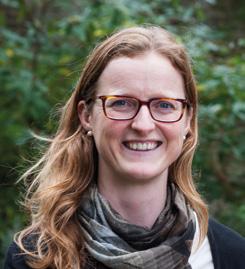
Heidi Johansen-Berg is Professor of Cognitive Neuroscience, Director of the Wellcome Centre for Integrative Neuroimaging and a Senior Research Fellow at the Hall. She is one of the 90 exceptional researchers from across the world who have this year been elected to the Fellowship of the Royal Society, a self-governing Fellowship made up of the most eminent scientists, engineers and technologists from the UK and the Commonwealth.
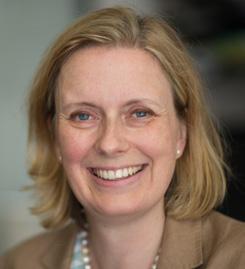
Krina Zondervan is Professor of Reproductive and Genomic Epidemiology, Head of the Nuffield Department of Women’s and Reproductive Health, and Fellow by Special Election in Obstetrics and Gynaecology. This year, the Academy of Medical Sciences has elected 58 exceptional biomedical and health scientists to its prestigious Fellowship in recognition of their outstanding contributions to the advancement of biomedical and health science, cuttingedge research discoveries, and translating developments into benefits for patients and wider society.
Krina comments: “I’m hugely honoured to receive this Fellowship, which really celebrates the fantastic contributions of so many team members to our research in women’s health over the years.”
Read more about Heidi’s research: www.win.ox.ac.uk/people/heidijohansen-berg.
Read more about Krina’s research: www. wrh.ox.ac.uk/team/krina-zondervan.

This year, the ViceChancellor’s Award for Research Engagement went to the REACH programme, a project based in the School of Geography and Environment and funded by the Foreign, Commonwealth and Development Office. Dr Callum Munday, Fellow by Special Election in Geography, was part of this team whose overall research aim was to improve water security for 10 million people in East Africa and Bangladesh.
As part of the programme, Callum led two climate field observational programmes in Kenya in 2021 and 2024, together with the University of Nairobi and Kenya Meteorological Department. The aim of the field projects was to improve understanding of societally damaging floods and droughts, which regularly affect East Africa. One of the latest projects also involved former Hall undergraduate Geographer Abi Jones (2018), who is now a PhD student at the University of Bristol. The projects have built an observational database of climate processes which can be used to test and to improve weather forecast and climate models. The hope is that by improving these models we can better understand how climate change will influence weather extremes in East Africa.
The Vice-Chancellor’s Awards recognise achievement and celebrate success across the collegiate University, from academics and researchers to professional, technical and support staff. In 2024, there were
250 award entries, with 1,500 individuals included in the nominations, from all parts of the University and colleges.
Many congratulations to Callum and the REACH team!
More information about the collaborations and photos from the project can be found at www.riftjet.com and www.reachwater.uk.
Amitav Ghosh Wins Laureate Erasmus Prize 2024
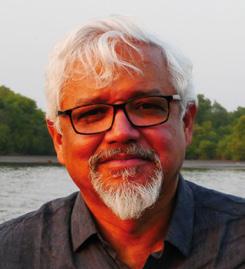
Congratulations to Honorary Fellow
Dr Amitav Ghosh (1978, DPhil Anthropology) who has won the Laureate Erasmus Prize 2024 for
“his passionate contribution to the theme ‘imagining the unthinkable’, in which an unprecedented global crisis – climate change – takes shape through the written word.”
Read more on the Erasmus Prize website: www.erasmusprijs.org/en/laureates/ amitav-ghosh.
Hall Lecturer Appointed President of the British Society for Haematology
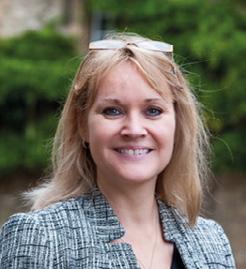
Dr Sue Pavord, Associate Senior Lecturer in Clinical Medicine, has recently been appointed President of the British Society for Haematology (BSH).
The BSH is a charitable organisation with 3,000 members; the Society supports its members to provide excellence in healthcare for individuals with haematological disease, through knowledge sharing, advocacy and workforce development.
Sue comments: “I look forward to working with the executive team and volunteers
to progress the Society in all these areas, as well as building our infrastructure, and addressing health inequalities, EDI and sustainability.”
Read more at the BSH website: www.bs-h.org.uk/about-us/news/welcome-tonew-president-dr-sue-pavord

We are happy to share the news that Professor David Dupret, Tutorial Fellow in Neuroscience, has been elected to membership of the Academia Europaea.
The Academia Europaea is the PanEuropean Academy of Sciences, Humanities and Letters, founded in 1988 as an initiative of the Royal Society to coordinate European interests in national research agencies. Its members are drawn from across the whole European continent. Members are leading experts from the physical sciences and technology, biological sciences and medicine, mathematics, the letters and humanities, social and cognitive sciences, economics and law.
Read more about the Academia Europaea: www.ae-info.org/ae
Professor Karma Nabulsi Receives 2024 BRISMES Service Award

Congratulations to Professor Karma Nabulsi, Senior Research Fellow in Politics, who is this year’s recipient of the BRISMES Service Award.
The British Society for Middle Eastern Studies (BRISMES) was founded in 1973 to provide a forum for educators
and researchers in the field. The award was announced at the Society’s annual conference held at Lancaster University in July 2024; it is the largest and most prestigious annual UK gathering of scholars and practitioners focusing on the region.
The award was made in recognition of the immense impact Karma’s research has had on the field – especially in relation to 18th- and 19th-century political thought, the laws of war, and the contemporary history and politics of Palestinian refugees – and her direction of a bilingual digital teaching and research resource, currently hosted at Oxford’s Department of International Development. The BRISMES Council also recognised Karma’s commitment to doctoral supervision and teaching as well as her leadership and ongoing efforts to defend academic freedom and freedom of expression in relation to teaching and research on the Middle East.

A huge well done to Cat White (2016, MSt Women’s Studies) for her short film Fifty-Four Days which has been nominated for and won numerous awards at film festivals across the world this year.
Triumphs included wins for Best Short Film, Best Actress and the Jury Award for Best Short Film at the Diversity in Cannes showcase, held during the Cannes Film Festival; and Best Actress and Best Narrative Short Film at the 17th International I Will Tell Film Festival.
In Fifty-Four Days, after tragedy strikes, a spirited young woman turns to wild

swimming in search of answers. By swimming each day at dawn and forming an unlikely friendship, she learns to accept her grief and the grief of those around her. The film was written, codirected and stars Cat, Celia Imrie, Josh Williams, Juliet Cowan and Delroy Brown co-star.
Cat, who was recently named on the Forbes 30 Under 30 list, is a writer, actor, filmmaker and gender advisor for the United Nations who uses her work to champion the experiences and voices of Black women and girls.
Watch a trailer for Fifty-Four Days: www.imdb.com/video/ vi2115158553/?ref_=ext_shr_lnk.
Aularian David N Jones Awarded Honorary Doctorate from University of London

Congratulations to Aularian David N Jones (1969, PPE) who received an Honorary Doctorate from the University of London on Wednesday 22 November. The Chancellor of the University, HRH The Princess Royal, awarded David in recognition of his national and international social work activities.
David said: “I am sincerely grateful to the University of London for this unexpected honour. My life and social work have been guided by a commitment to social justice, social service and respect for all, actively informed by my Oxford PPE education. Social work involves tough decisions which must be informed by high quality education and training, guided by robust research, which is recognised in this award.”
David is a social worker, recognised in the profession worldwide as an effective spokesperson and advocate. He specialised in child protection before appointments to national and international roles.
These have included General Secretary, British Association of Social Workers (1985–1994); professional roles in government departments, Audit Commission and Ofsted; President, International Federation of Social Workers (2006–2010); founding Board member of the Commonwealth Organisation for Social Work (1994–present) and Governor, Northamptonshire Healthcare Trust.
He has served on many committees (including URC, CFAB) and steered consultations on the Commonwealth Charter for Young Carers.
Among many publications, he edited the first UK multi-professional textbook on child protection (1982).
Read more about David’s work and how the relevance of his PPE degree prepared him for the future in his article ‘Perspectives on Shaping a Career’ in the 2009 edition of The Aularian: www.seh.ox.ac.uk/wp-content/ uploads/The-Aularian-NewsletterSpring-2009-18_DavidJones.pdf

On Sunday 21 April, Aularian David Picksley (1953, French and Russian) was the oldest participant in the London Marathon for the second year in a row,
finishing the course in seven hours and 57 minutes despite an unplanned interruption.
David shares: “The marathon walk was successfully finished after an unplanned break, when I tumbled as I was crossing a road hump. Picked up by four kind runners and patched up by a St John’s Ambulance first aid team, and with no bone or muscle problem, I was able to carry on at nearly the same good pace. On The Mall, I was taken to the medical centre for a thorough check and tidy up.”
Congratulations, David – you inspire us all!
Warm congratulations also go to the following students who were recognised this year for their participation at University level:
Alexander Adair (2023, English) Hockey, Blue
Samuel Allen (2023, DPhil Geography) Lacrosse, Half Blue
Oliver Bater (2023, MSc Economics for Development) Triathlon, Half Blue
Sophie Brown (2021, Geography) Lacrosse, Blue & Athletics, Half Blue
Daniel Cryer (2022, Engineering) Hockey, Blue
George Davison (2023, Chemistry) Hockey, Blue
Seth Dockery (2021, Geography) Rugby, Blue
Kit Gallagher (2021, Sustainable Approaches to Biomedical Science: Responsible and Reproducible Research (CDT)) Water Polo, Blue
Honor Gibbs (2022, PPE) Lacrosse, Blue
Jacob Greenspon (2023, DPhil Economics) Ice Hockey, Half Blue
Robert Hardwick (2019, Medicine) Cricket, Half Blue
Matthew Lizotte (2023, MBA) Water Polo, Blue
Nanami Mizoshita (2023, Philosophy) Kendo, Half Blue
Matthew Morgan (2023, Geography) Tae Kwon-Do, Blue
Carla Nel (2023, DPhil Clinical Medicine) Competition Dance, Half Blue
Adam Pattendon (2020, Engineering) Lightweight Rowing (Men’s), Half Blue
Emilija Platukyte (2023, MSc Education) Tennis, Blue
George Prior (2021, Physics) Basketball, Half Blue
Hannah Riches (2020, Medicine) Rugby, Blue
Angelica Rossi-Hawkins (2023, DPhil History) Volleyball, Blue
Lucas Rollinson (2022, Economics and Management) Volleyball, Half Blue
Sophie Shams (2022, DPhil Earth Sciences) Rugby, Blue
Charlie Sharpe (2023, DPhil Astrophysics)
Croquet, Half Blue
Hector Skipworth (2020, Earth Sciences)
Rugby, Blue
Anastasia Storey (2022, Geography) Football, Blue
Jack Sun (2021, PPE) Water Polo, Blue
Edouard Tessier-Blais Ice Hockey, Half Blue
Jake Tommasi (History, 2023) Karate, Blue
Archie Watt Fencing, Blue
The Hall’s Amalgamated Clubs gives awards to Hall members for obtaining the distinction of a Blue (£200) or Half Blue (£100). Thanks to the continuing generosity of Richard Luddington (1978, Modern History), the Luddington Prize was awarded to Katie Wellstead (2020, Materials Science) for having achieved both a First in Finals and a Blue during her undergraduate career.
Simonian Prizes for Excellence in Leadership
Thanks to the continuing generosity of Aularian Professor Simon J Simonian (1962, Animal Physiology) and his family, the Simonian Prizes for Excellence in Leadership went to:
Alyssa Chan (2021, Engineering)
Frances Hand (2021, DPhil Law)
Masterclass Fund Awards
The aim of these awards of up to £1,000 is to facilitate further development and achievement for individual students. This year nine awards were given to the following students to help them to pursue advanced training in the extracurricular activities – creative or sporting – in which they excelled:
Alyssa Chan (2021, Engineering) – Organ
Daniele Cotton (2021, DPhil Molecular
and Cellular Medicine) – Taekwondo
Aaron Rambow Czarny (2023, Mathematics) – Cello
Stephanie Hartop (2023, MFA) – Guitar lessons
Sarah Savić Kallesøe (2022, DPhil Population Health) – Astrophotography
Mehmet Kilic (2022, Biochemistry) –Piano
Zeng Ming Loh (2022, Physics) – Specialty Coffee
Duncan Lyster (2023, DPhil Atmospheric, Oceanic and Planetary Physics) – Salsa Dancing
Noah Mihan (2023, MSc Sustainability, Enterprise and the Environment) – Piano
Oliver Monblat (2023, PPE)- Hockey Goalkeeping
Matilda Piovella (2021, English) – Singing
Sophie Shams (2023, DPhil Earth Sciences) – Rugby
Jasper Singh (2021, DPhil Materials) –Rugby
Leah Tavasi (2023, Environmental Research (NERC DTP)) – Scuba Diving
Katja Worth (2022, DPhil Oncology) –Cheerleading
The Hall remains extremely grateful for the sponsorship which supports this successful Masterclass Fund Awards scheme.
Keith Gull Fund
Eve Aspland (2022, Fine Art), Poppy Buckley (2021, Biomeidal Sciences),
Sherry Da (2023, MSc Water Science, Policy and Management),
Meranie Kairu (2024, Jurisprudence),
Katherine Kirkpatrick (2020, Modern Languages),
Zhongdui Long (2022, Materials Science), Maria Nozdrina (2021, Medicine)
Aaron Rambow Czarny (2023, Mathematics),
Jessica Taal (2022, English and Modern Languages),
And Edward Taylor (2021, DPhil, Oncology) have all received an award from the Keith Gull Fund. The fund is used at the discretion of the Principal to provide direct support to current Hall students who wish to undertake special projects such as charitable work, choral and drama tours, travel for unusual academic opportunities and to assist others. Keith Gull initiated this fund during his tenure as Principal (2009–2018) at the Hall, reflecting his commitment to both ‘Hall Spirit’ and supporting student ambition. Read Keith Gull Fund recipient Sherry Da’s report on attending the United Nations Environment Assembly (UNEA6) on pp. 170–172.

Congratulations to Phillip Chigiya (2023, MSc International Health & Tropical Medicine) for his appointment to the Partnership for Maternal, Neonatal, and Child Health (PMNCH) Executive. Philip said, “I am honoured to take on the role of Vice Chair for InterGovernmental Organizations, deputising for Madam Joy Phumaphi, the former Health Minister for Botswana.”
PMNCH stands as the largest, most diverse, and impactful advocacy platform globally for women, children, and adolescents. It has been instrumental in setting crucial priorities in this vital field for several years. Based in Geneva and hosted by the WHO, Phillip will join the team which governs operations and ensures the realisation of its mission, overseeing the standing committees.
Read more about PMNCH: www.pmnch.who.int.
Gasparek Winner of the Emerging Alumni Leader Award 2024
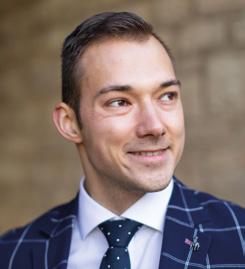
Congratulations to Hall student Miroslav Gasparek (2019, DPhil Engineering Science) for being recognised with the Emerging Alumni Leader Award 2024 by Imperial College London. This was given for his innovative business Sensible Biotechnologies which works on developing mRNA technology that aims to tackle diseases in a scalable and costeffective way.
Read more about Miroslav’s work: www.imperial.ac.uk/stories/alumniawards-2024-miroslav.
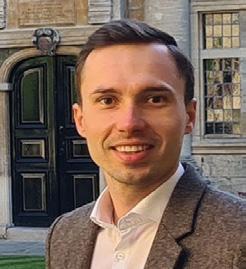
We congratulate Lukas Lehner (2019, DPhil Social Policy) for being awarded the Economic and Social Research Council (ESRC) Outstanding Early Career Impact Prize for his doctoral research work with the Austrian Public Employment Service to design and implement a pilot of a universal job guarantee scheme.
Launched in 2020, the scheme brought more than 100 people in the town of Marienthal, who had been unemployed for a year or more, back into work by guaranteeing a job that paid at least the minimum wage. Importantly, there was an emphasis on meaningful employment where participants were helped to find suitable private sector work or supported to create a job based on their skills and knowledge of their community’s needs.
“I am beyond excited to receive the ESRC Prize for outstanding early-career impact at the Royal Society for my doctoral research. The work would not have been possible without many collaborators who I would like to thank. I am also grateful to St Edmund Hall for having provided a home that supports this research.”
An evaluation of the programme revealed multiple benefits. It showed the programme helped eliminate long-term unemployment in the area and helped participants feel happier, more financially secure and more involved in their community.
Find out more about the scheme on the UK Research and Innovation website: www.ukri.org/who-we-are/how-we-aredoing/research-outcomes-and-impact/ esrc/helping-long-term-unemployedpeople-back-into-work
Or on Lukas’ research page, complete with a fantastic, informative video: www.lukaslehner.github.io.

Well done to Sumali Bajaj (2020, Environmental Research) for being recognised for their excellence in innovative teaching practice in the Mathematics Physics and Life Sciences
(MPLS) Division Teaching Awards.
Sumali contributed to key changes in the teaching material for the Advanced Computation modules for third-year undergraduates which significantly increased student satisfaction. Sumali is also full of ideas about how to empower disadvantaged students, for example by holding workshops and offering mentoring.
The divisional Teaching Awards scheme celebrates success and recognises and rewards excellence in innovative teaching practice. It is open to everyone who teaches, including graduate students, postdoctoral researchers, faculty and learning support staff.
Find out more about the awards: www.mpls.ox.ac.uk/latest/news/ winners-announced-in-mpls-teachingawards-2023.
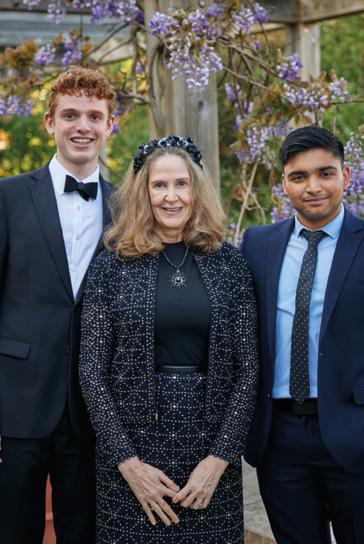
Congratulations to Lucas Rollinson (2022, Economics and Management; 1st prize) and Tinu Reji (2022, Economics and Management; 2nd prize) who have recently been awarded substantial
prizes in a Saïd Business School essay competition, sponsored by Banca Intesa Sanpaolo. The competition centred on the best opinion editorial arguing for or against increased regulatory intervention to enforce responsible business practices. A formal black-tie dinner was held at the Saïd on Tuesday 7 May to celebrate their achievement.
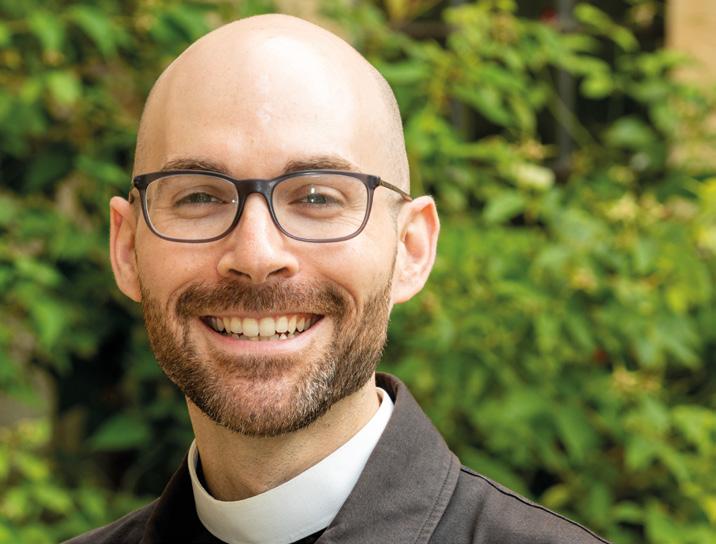
St Edmund Hall wishes a fond farewell to the Revd Dr Zachary Guiliano who joined the Hall in October 2020 as a Career Development Research Fellow in Early Medieval History, and the College Chaplain. Since Zack joined the College during the pandemic, there have been some unusual circumstances for a College Chaplain to operate under as well as some amazing highlights. We recently interviewed Zack to find out about his experience of contributing to Hall life.
What have you enjoyed most about being the College Chaplain at Teddy Hall?
The people.
Among the greatest privileges of being a minister is the involvement you can have in other people’s lives: from the biggest celebrations to the darkest days and everything in between. I am constantly involved in planning big community events or things like weddings and christenings, as well as the weekly services. I am also constantly checking with members of College who are experiencing major challenges. And I have tried for most of my time here simply to be around and available for people to talk to, investing a lot of time with the Choir in particular.
I think one of the things that people value about chaplaincy, even when they are not religious, is that they know the Chaplain is someone who cares about them and who can talk with them about their deepest questions or challenges. The Chaplain can pray for them or with them; the Chaplain can be a spiritual guide. But, frankly, we can also just drink a cup of coffee and talk about the day. One of my favourite early memories is when I went around to all the staff departments with doughnuts or cake, one after another.
What have you enjoyed most about being a Career Development Research Fellow in Early Medieval History at Teddy Hall?
The research time, and the incredible resources we have here in Oxford! Most priests find it difficult to continue formal studies after ordination, and I was no different. For a few years after my PhD, I was very busy with work as a journalist and then also as a priest. Finding time to get in the library was a huge challenge, and I had a largely completed book draft that sat mostly unchanged for far too long. Coming to Teddy Hall allowed me to finish that book, The Homiliary of Paul the Deacon, for which I won an award this past year. And I also published several articles and wrote most of another book on early medieval exegesis. So, it was a concentrated time of research and writing that I couldn’t have had otherwise.
Could you tell us about your experience of running Choral Evensong and Chapel services during the pandemic?
It was very unusual – something I never expected to do. I would normally want to encourage people to come to Chapel,
but instead we had to ask everyone to stay away from the building for Choral Evensong on Sundays. We had a broadcast model, utilising spaces across the College for the Choir to sing in, particularly the Chapel, Old Dining Hall, and the Crypt. But by Hilary term 2021, we only had three musicians and the Chaplain here in College to run services, and between us we performed a series of special arrangements made by our Director of Music, James Whitbourn. A ‘pandemic Chaplain’ selfie from that time sums things up pretty well: I am behind a computer, running the audio for the service, and so I have a mask, headphones, and full Anglican ‘choir dress’ (cassock, surplice, scarf, and hood). It was right before I had to head out to sing, pray, and preach as well.
At the same time, the pandemic saw the beginning of significant engagement with Chapel services, which has continued ever since. More people have been attending Chapel in the last three years than in the last 30. I thank God for that.
The pandemic was also a time where we opened up the Chapel as a public building again every day, so that anyone who was on site could have a space to use for prayer or silence. I led Evening Prayer in there nearly every day of term from Trinity 2021 until Trinity 2023 – so it really shaped my time here.
What have you most enjoyed about Teddy Hall?
The collegiality and friendliness. It’s a cliché about Teddy Hall, but I think it’s true. I have been part of Oxford and Cambridge colleges that are far more formal and hierarchical, and there’s an element of that here, of course. But my primary experience is of a College that’s really welcoming. I have tried to emphasise that myself as well: to stress the values of hospitality, community spirit, and the virtues St Edmund exemplified, like service and the love of one’s neighbour.
If you have one last message for the Hall community, what would it be?
I would almost prefer to give my blessing, rather than another message. Such a large part of my job has been to preach on Sundays on dozens of different topics. I feel talked out! And a blessing feels like a natural form of closure, as well as a reminder of one of the most important aspects of chaplaincy and priesthood: ‘to bless the people in God’s name’, as the Church of England’s ordination service puts it.
This is how I have concluded Choral Evensong every year on St Edmund Day: God give you grace to follow Edmund and all the saints in faith and hope and love. And the blessing of God almighty: the Father, the Son, and the Holy Spirit, be among you and remain with you always.

The start of the academic year 2023–24 saw us welcome 107 undergraduate starters, along with 109 new graduates. In addition, 53 international students spent between one and three terms at the College as part of our Visiting Student programme.
In keeping with the practice adopted in response to the pandemic in 2020, undergraduate selection again took place using online interviews, an approach that continues to divide opinion. To alleviate concerns that offer-holders no longer have an opportunity to visit the College at interview time, we ran a familiarisation day during Hilary term, with the majority of UK-based students taking up the chance to visit us. Our Outreach team, led by Luke Maw, the Outreach and Admissions Manager (whose report can be found elsewhere in this Magazine), continues to be very busy, organising these events and working hard to raise the profile of the College. In that regard, it has been rewarding to watch the number of direct undergraduate applications that we consider (that is applications from students actively selecting the College rather than making an open application) grow in recent years. It will be interesting to see if the profile of the College is raised yet further by the election of the first Aularian Prime Minister!
As I explained in last year’s report, the Fellowship has been undergoing significant change in recent years as colleagues reach retirement or move to other appointments in Oxford or further afield. After welcoming the new Fellows appointed during the preceding year, further renewal took place in 2023–24 as a number of additional elections took place.
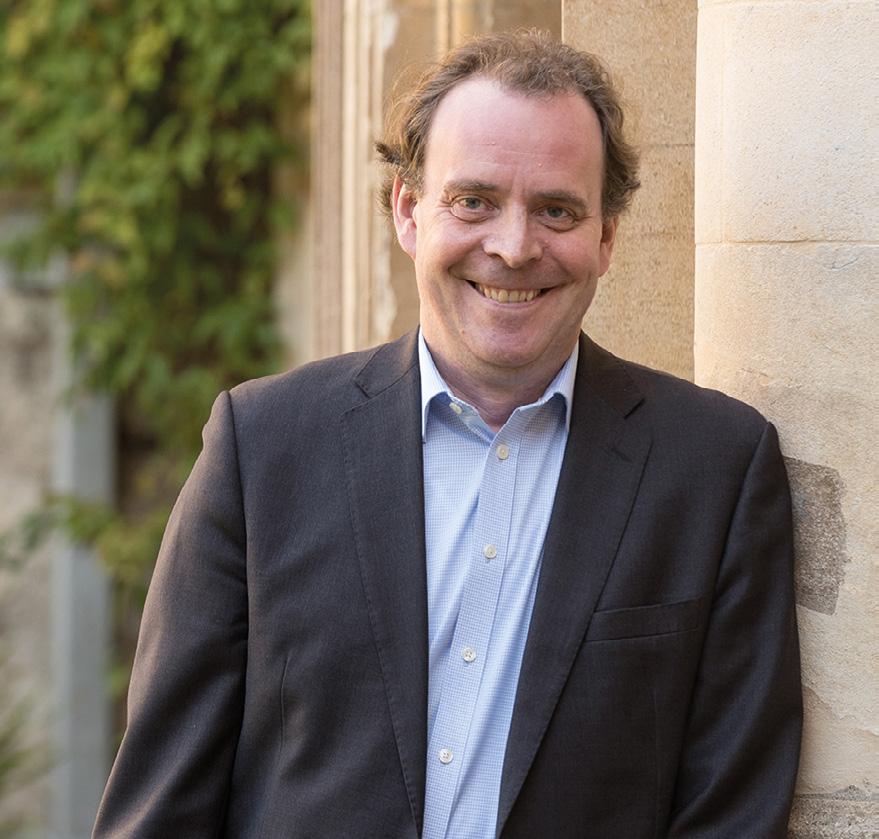
Professor Musab Younis was elected as Tutorial Fellow in Politics, succeeding Karma Nabulsi who had migrated to a Fellowship by Special Election, while Philip Mountford was succeeded on his retirement by Professor Anna Regoutz. In addition, in readiness to restart admissions in Computer Science, Professor Joe Pitt-Francis was appointed as Tutorial Fellow in the subject, while Dr Elena Violaris was elected to a Junior Research Fellowship in English. Sadly, Dr Linda Eggert, who was due to start as Tutorial Fellow in Philosophy in October 2024, took the decision to accept an appointment in the United States for personal reasons. It is hoped that recruitment of a replacement Fellow will take place during the current academic year.
In addition to these elections, recruitment of Research Fellows also took place during the year. Dr Reut Vardi joins as a Junior Research Fellow in Environmental Sustainability while Dr Chloë Pieters has taken up an Early Career Teaching
and Research Fellowship in History
Recruitment of two further Junior Research Fellows in English and European Languages is in progress.
Three academics, nominated by Fellows of the Hall, also spent time at the College during the academic year as Visiting Fellows John Henderson, Emeritus Professor of Italian Renaissance History at Birkbeck, University of London, was nominated by Filippo de Vivo and joined us in Michaelmas term, while Jenny Andersson, Professor of History, Uppsala University, nominated by David Priestland, spent Hilary and Trinity terms with us. In addition, Maya Zellor, Professor of English, Central Washington University, spent part of Trinity term at the Hall, collaborating with Erica McAlpine. We are looking forward to welcoming two more Visiting Fellows to the College during the current academic year.
We bid farewell to Professor Charlotte
Stagg, who resigned her Fellowship by Special Election to take up a Governing Body Fellowship at St Hilda’s College, as well as Dr Severin Bunk and Dr Nicholas Fréry who resigned their Junior Research Fellowships to take up permanent appointments elsewhere. Dr Zachary Guiliano and Dr Tania Shew also left the College as their Early Career appointments drew to a close.
Finally, it is with great sadness that I must record the deaths of three Emeritus Fellows during the last academic year – Christopher Phelps (Fellow in Mathematics until 1999), John Knight (Fellow in Economics until 2006) and Stuart Ferguson (Fellow in Biochemistry until 2019) – as well as the passing of James Whitbourn (Fellow by Special Election and Director of Music). All of them made outstanding contributions to the Hall during their time here.
Professor Robert Wilkins, Senior Tutor

On the College register at the start of Trinity term 2023 were 430 undergraduates, 328 postgraduates and 35 Visiting Students.
In the 2023-24 academic year, 107 students joined the College as undergraduates from the following schools, colleges and universities:
Adair Alexander King's College School
Adeleye Subomi St Olave's and St Saviour's Grammar School
Agiri Danielle Bacon's College
Ahmed Gibran Whitgift School
Ainsworth Simeon Stretford Grammar School
Allen Tomas Mossbourne Community Academy
Altmeyer Aemilia West Island School
Appafram Kwame Chigwell School
Bain Hamish Eton College
Bale Nicholas Cardinal Newman Catholic School
Bartlett Matthew The King Alfred School, Highbridge
Beckett Ellie Aldridge School
Behrens Misha Bryanston School
Bichard George Dulwich College
Bilboul Lila Westminster School
Bolchover Henrietta Haberdashers' Aske's School for Girls
Bromage Thomas Oswestry School
Broome Elliot Calday Grange Grammar School
Cai Qian Shenzhen College of International Education
Cao Tina Guangdong Country Garden School
Chan Justin HKUGA College
Chaudhary Junaid Newham Collegiate Sixth Form
Chennakrishnan Nandita NPS International School
Choudhary Ishaan Wilson's School
Davison George Highgate School
Domaracka Julia Northampton Academy
Donaghey Michael Robert Smyth Academy
Faulkner Molly Ysgol Gyfun Cwm Rhymni
Feldman Alexander Westminster School
Finney Ned Harris Westminster Sixth Form
Fishwick Sebastian Manchester Grammar School
Fraser-Smith Erin Exeter College, Hele Road Centre
Garratt Emily Peter Symonds College
Geering Edward Simon Langton School for Boys
Gorman Harvey Tanglin Trust School
Grace Zoe Ulverston Victoria High School
Gu Yizhou Wycombe Abbey International School
Holland Benjamin Royal Grammar School Worcester
Hrushovski David Abingdon School
Humfress Harriet Rosebery School
Jacobs James The King's School, Chester
Jia Diff Pate's Grammar School
Kagalwalla Nidaa Dhirubhai Ambani International School
Ke Zhihao Chongqing Bashu Secondary School
Lam Joshua Ying Wa College
Lu Tianwei Dulwich College
Maddocks James Cheltenham Bournside School
Marshall Abby Aylesbury High School
Masokin Anna St Helen's School
Mayhew Evie
Coombe Girls' School
Meldrum Tom Westminster School
Messenger Ewan
Mihovic Omer
Peter Symonds College
Gimnazija Novi Pazar
Milligan Jess Barton Peveril College
Mizoshita Nami
Bangkok Patana School
Monblat Ollie Dulwich College
Morgan Matthew Beths Grammar School
Murphy Iris Reigate Grammar School
Nichols Isabella Mander Portman Woodward School
Ninh Kim The Tiffin Girls' School
Oakes Annie Wycombe High School
O'Connor Elena Muckross Park College
O'Hara Rebecca Bassaleg School
Omoluogbe Joseph St Thomas the Apostle College
Osborne-Millar Leila
Stratford Girls' Grammar School
Pardo Emma King's College School
Parvez Nyle Chigwell School
Patel Rohan Haydon School, Pinner
Pedley Lydia Harris Westminster Sixth Form
Radford Dylan Manchester Grammar School
Rambow Czarny Aaron Fortismere School
Rawlinson Thomas Radley College
Record Daniel The Skinners' School
Reed Henrietta Runshaw College
Richardson Luke Cheltenham College
Riolo Sara St Olave's and St Saviour's Grammar School
Robinson Lucy Royal Latin School
Russell David Schiller Gymnasium Berlin
Saleem Mahrosh Woodford County High School
Smith Stan Bristol Grammar School
Song Yiming Downe House School
Sugrue James Burnham Grammar School
Suribhatla Yash
Bishop Veseys Grammar School
Tandon Siddhant Dubai International Academy
Tang Shiyun Shenzhen College of International Education
Thapliyal Sidharth Wilson's School
Tomassi Jake Loughborough Grammar School
Treweeke Samuel Durham Sixth Form Centre
Turinsky Zachary Millburn High School
van Heijnsbergen Laura Kelvinside Academy
Vohra Jade Collyers VI Form College, Horsham
Waldron Charlotte Royal Grammar School, Newcastle-Upon-Tyne
Walford Joe Alleyn's School, Dulwich
Wang Chenrui Victoria World Academy
Wareham Samuel Harris Westminster Sixth Form
Watts Non Ysgol Gymraeg Ystalyfera
White Tilly Wyke Sixth Form College
Williams Monty The Perse School
Withey Joshua Blundell's School
Yi Xingcan Pennon Education Group
Yin Ethan Manchester Grammar School
You Tiffany The Godolphin and Latymer School
Yuan Ruixi (Cecilia) Downe House School
Zhao Yihan Huaer Zizhu Academy
Zhao Henry Southend High School for Boys Academy Trust
Zheng Hongyi Raffles Junior College
Zhuang Zihan Xian Gaoxin No1 High School
In the 2023–24 academic year, 109 students joined the College as postgraduates from the following schools, colleges and universities:
Abdelgadir Khalid University of Khartoum
Allen Samuel University of Cambridge
Arnold Josephine University of Oxford
Bagad Piyush Nitin University of Amsterdam
Bang Ashley Brown University
Basarrate Sophia Columbia University
Bashal Serena The University of Keele
Bater Oliver University of Oxford
Bennison Olivia University of Durham
Black Isabel University of Southampton
Blackman Edward University of Durham
Blythe Laura University of Edinburgh
Brooks Freya Liverpool Hope University College
Burgess Alec University of Oxford
Chen Zhuohan University of Oxford
Chigiya Phillip University of Zimbabwe, Harare
Chopra Rohan Ashoka University
Cook John Massachusetts Institute of Technology
Coose Sarah Brock University
Covin Arianna Universita Cattolica del Sacro Cuore
Cudek Franciszek University of Oxford
Da Sherry University of British Columbia
Davies Christopher University of Oxford
Dillman Catherine McGill University
Dutta Pronita University of Nottingham
Fisher Gemma University of Leicester
Forest-Le Sieur Pierre-Hugues Université de Montréal
Freidank Sophie Eberhard Karls Universitat Tübingen
Gandhi Milan University of Queensland
Gassó Duocastella Anna Universitat Autonoma de Barcelona
Godard Zoe University of Birmingham
Guckenberger Melissa University of Colorado at Boulder
Gudoy June Arvin University of Sydney
Hackler Julia Lawrence University
Hamilton Katherine University of Nottingham
Haroon Ibrahim Nigerian Law School
Hartop Stephanie Goldsmiths, University of London
Henderson Ian University of Warwick
Holmberg Isaac Universitat Erfurt
Honess Isabella Queen's University at Kingston
Jaramillo Araujo Diana University of Oxford
Jin Shuyang King's College London
Johnson Matthew Oxford Brookes University
Kato Marie University College London
Kelly Dylan Queen's University of Belfast
Kralik Miklos Imperial College of Science, Technology & Medicine
Kwong Benjamin United States Naval Academy
Lee Isobel University of Oxford
Leuridan Mathilde University of Oxford
Levinson Michael University of Toronto
Liang Hanwen University of Toronto
Lister Margaret Imperial College of Science, Technology & Medicine
Liu Jeffrey University of Cambridge
Lizotte Mathieu École des Hautes Études Commerciales (HEC), Montréal
Lu Qinfang University College London
Lyster Duncan University of Exeter
Malijan Greco Mark University of Oxford
Mazuguni Nicholaus University of London
Meehan Leah University of Oxford
Mihan Noah Princeton University
Murray Daniel Swansea University
Nel Carla University of Pretoria
Nie Dongxia University College London
Nieto Shawntel Nicole Ateneo de Manila University
Nori Human University of Essex
Nutt Olivia University of Cambridge
O'Leary Ellen University of Massachusetts at Amherst
Omoregie Osakhare University of Chicago
Orenstein Natalia University College London
Pan Xuancheng University of Science and Technology Beijing
Pelletiers William Yale University
Penn Joseph University of Oxford
Platukyte Emilija New York University Abu Dhabi
Puranasamriddhi Akaraseth McGill University
Rajathevan Aaran Cardiff University
Rajendra Lokuwattage Imperial College of Science, Technology & Medicine
Randell William University of St Andrews
Renouf Max University of Southampton
Rigg Samuel University of Oxford
Rossi-Hawkins Angelica Lisa University of Oxford
Rukomeza Gloria University of Global Health Equity
Schnabel Tobias University of Maastricht
Shao Yifan Zhejiang University
Sharpe Charles University of Oxford
Simmons Hugh University of Oxford
Stojanovic Dunja University of Belgrade
Straub Vincent University of Oxford
Sulikova Sabina University College London
Suresh Shivani University of Oxford
Tavasi Leah University of Oxford
Thesing Claas Technical University of Munich
Thomson Max University of Manchester
Timofeeva Elizaveta University of St Andrews
Tindall Tosca University of Oxford
Topal Onat Middle East Technical University
Truong Tiffany Thanh Kim Thi London School of Economics and Political Science
Tuncay Suat University of Oxford
Vallo Lujza University College London
Varasteanu Andreea University College London
Volpatti Luke Swiss Federal Institute of Technology
Weinstein Josef University of Edinburgh
Whalley Rebecca University of Birmingham
Wu Shuyang Imperial College of Science, Technology & Medicine
Yang Bob The Royal College of Surgeons of England
Yin Yue Yun Michelle University College London
Zehra Anushay King's College London
Zhang Sarah Purdue University
Zhu Yimin Imperial College of Science, Technology & Medicine
Araujo Connor Salve Regina University
Atkins Patrick Connecticut College
Bello Morganti Salve Regina University
Ben Jialun (Joyce) Swarthmore College
Cardozo Nayeli Harvard University
Chang Zoe Yu-Shin Wellesley College
Chen Angela Cornell University
Daigle Elizabeth Whitman College
Garchi Selma École de Psychologues Praticiens
Gay Joseph Brandeis University
Gilbert John Vassar College
Girard Audreyane HEC Montréal
Goralsky Julia Columbia University
Gullace Anna Smith College
Guo Xun Tsinghua University
Harding Marissa Rider University
Harte Wyatt Columbia University
Hasegawa Nanami Brown University
Honzay Isabel St Catherine University
Ji Xiaoxuan (Shirley) Wellesley College
Jin Huizi (Anna) University of North Carolina at Chapel Hill
Klisch Thomas Johannes Gutenberg-University
Knotts Whitney University of North Carolina at Chapel Hill
Labys Sophia University of North Carolina at Chapel Hill
Li Athena Brandeis University
Liang Yaotong Nanjing University
Liu Andrew Princeton University
Logsdon Sophie Wellesley College
Lopez Castro Jose Columbia University
Lu Yixin Wellesley College
Lucas Charlie Brown University
Luo Qinwen (Vespera) University of Chicago
Madan Garvit Monash University
Markowski Emma Trinity College, Dublin
Northing Oliver Grinnell College
Oostwoud Winter Leiden University
Osborne Jonathan University of North Carolina at Chapel Hill
Powell Caheil Rider University
Quintero Samara Trinity College, Dublin
Raacke Catherine Providence College
Ryan Ellie Trinity College, Dublin
Sahibousidq Abdurahman Harvard University
Sailors Benjamin University of Pennsylvania
Sell Brando Cornell University
Shkolnik Maya Columbia University
Song Yulin Beijing Institute of Technology
Tingstad Anya Bryn-Mawr College
Viorica Daniel Princeton University
Wan Ruiyan Cornell University
Wu Zhangyi (William) Middlebury College
Yang Ladan (Clara) Smith College
Yu Tongfei (Jasmine) Northwestern University
Zhou Anthony Columbia University

In the Undergraduate Admissions exercise 2022, St Edmund Hall received 662 applications for entry in 2023 and beyond. Nearly 300 of these applicants were invited to interview. All applicants were interviewed online via Teams. Following the conclusion of December’s interview period, the Hall made a total of 121 offers of undergraduate places for entry in 2023 (compared to 125 offers the previous year). Nine of these were open offers. In addition, seven deferred offers of places were made, for entry in Michaelmas term 2024. The Hall also ‘exported’ a small number of applicants, for offers of places at other colleges. 56% of offers of undergraduate places were made to applicants who identified as male and 44% to female. The applicants
receiving offers comprised 75% UK nationals and 25% of students from overseas, including from EU countries. In respect of previous education, of the 80 offers made to UK applicants, 56% were to state-educated applicants and 44% to students attending an independent school (2021: 65% state, 35% independent).
Graduate offer-holders for entry in 202324 represent over 40 nationalities: they will be undertaking a range of taught and research programmes in disciplines from across all four of the University’s academic divisions. The expected eventual intake of new graduate students in Michaelmas term 2024 is approximately 110.
At the time of writing, this year’s Graduate Admissions exercise had so far seen the Hall consider nearly 300 applications.
College Scholars 2023–2024
Alexander Abrahams
Bliss Ashley
Michael Atife
Aryaman Babbar
Lila Blake
Sophie Brown
Sophia Bursey
Alexander Burson
Joss Carr
Thomas Champion
Isaac Chan
Rick Chen
Rachel Chia
Felix Clayton McClure
Ben Colleran
James Craggs
Alexandra Dawson
Thomas Early
Thomas Farnsworth
Weijia Gao
Srija Ghosh
Jack Gillespie
Maisie Goodfellow
Sophie Griffith
Xilin Gu
Thomas Harray
Tobias Heath
Toby Holmes
Alistair Ind
Mehmet Efe Kilic
Chengyu Kuang
Cheuk Yee Charlotte Lai
Hermione Leaver
Zhuoxuan Li
Ben Lloyd
Tobias Lloyd
Devaassenan Mahenthiran
Sama Malik
Lysander Mawby
Annabel McLaren
Henry Mehta
Haojun Miao
Rose Morley
Lucia Mullings
Niamh Murfin
Usmaan Nadeem
College Exhibitioners 2023–2024
Olivia Allen
Maximilian Fawcett
Ellis Hall
Ella Ho
Katherine Kirkpatrick
Progress Prizes 2023–2024
Alexander Adair
Simeon Ainsworth
Aryaman Babbar
Sarah Beard
Ellie Beckett
Isabella Brown
Sophia Bursey
Joss Carr
Rick Chen
Joseph Lacey
Wei Wei Liu
William Metcalf
Tyla Orton
Adam Pattenden
Aaron Rambow Czarny
Elizabeth Hogermeer
Toby Holmes
David Hrushovski
Matthew Jarvis
Tom Kennedy
Chengyu Kuang
Devaassenan Mahenthiran
Niamh Murfin
Zakaria Najjar
Charlotte Newell
Kelvin Zhu Hao Ngu
Luke Nijkamp
Toby Onona
Osaruonamen Osifo
Rathi Ramakrishnan
Shuzhe Ren
Joseph Ritchie
Lucas Rollinson
Kayla Rowden
Holly Sanderson
Ella Soni
Teddy Thomson
Eric Ji Da Wang
Katie Wellstead
Ioan Whomsley
Yu Ming Alexis Wong
Mara Wuelfing
Shaojing Xie
Jincheng You
Fengzhuoyang Zhu
George Prior
Hannah Pullen
Leili Sabourian
Qianyi Sun
Catherine Westhead
Shuzhe Ren
Qianyi Sun
Jessica Taal
Aoife Taylor-Torney
Jake Tommasi
Emily Twinn
Jade Vohra
Charlotte Ward
Xingcan Yi
Choral Scholars
Ethan Bareham
Luke Boulton
Edmund Finney
Thomas Harray
Jasmine Lowe
Isabella Nichols
Daisy Pendergast
Matilda Piovella
Organ Scholars
Alyssa Chan (Senior)
Tiffany You (Junior)
Cochrane Scholarship
Suzanne Antelme
Graham Hamilton Travel Award
Bliss Ashley
Julia Hackler
Angus Williams
Matt Greenwood Travel Scholarship
Sophie Brown
Michael Pike Travel Fund
Tara Sallaba
Jake Tommasi
Richard Fargher Bursary
Michael Atife
Ashmeet Bhaumik
Jena Curtis
Elizabeth Hogermeer
St Edmund Hall
Association Presidents’ Prize
Mya Hesketh-Bream
Bendhem Fine Art Bursary
Zixi Cai
Maisie Goodfellow
Eve Gueterbock
Stephanie Hartop
Hermione Leaver
Charlotte Rich-Jones
Maia Malaga Sansour
Oliver Wiseman
Bernard Bewlay Science and Engineering Prize
Aryaman Babbar
Sophie Griffith
Qianyi Sun
Ioan Whomsley
David J. Cox Prize
Joss Carr
Joe Todd Award
Ioan Whomsley
George Series Prize
John Duale
Isabel Fernandez-Victorio
Graham Midgley Memorial Prize for Poetry
Suzanne Antelme
Proxime accessit
Anandita Abraham
Sophia Bursey
Kim Ninh
Laura Van Heijnsbergen
Ogilvie-Thompson English Prize
Sophia Bursey
Proxime accessit
Laura Van Heijnsbergen
Peel Award
Lucy Cade
Rick Chen
Richard Luddington Prize for Outstanding Academic and Sporting Achievement
Katie Wellstead
Undergraduate English Award
Danielle Agiri
Tom Kennedy
Freya McCauley-Wright
Laura Van Heijnsbergen
Antunes da Silva Politics Award
Nanami Mizoshita
James O’Neill
A total of 34 students received the income-related Oxford Bursary. The College components of these bursaries were supported by: a donor who wishes to remain anonymous; 1971 and 1972 Aularians; Aularians Mr Chris Ashton and Mrs Natasha Ashton; Aularian Chris Armitage in honour of his parents Charles and Edith Armitage; the generous bequest of Aularian Mr William Asbrey; Beaverbrooks the Jewellers; Aularian Mr Tony Best in honour of his parents Mr and Mrs Ron Best; Aularian David Harding and Mrs Gale Harding; Aularian Tony Laughton; Aularian Dan Levy; Aularian Mr Peter Johnson; Dr Francis Rossotti’s benefaction; Mrs Dorothy Pooley, Mrs Lucy Webber and Mrs Frances Georgel in memory of their father, Aularian Mr Philip Saul; Aularians Mr David and Mrs Judith Waring; Aularians in memory of Sir David Yardley and Carol McClure; Thomas Peel and the Charles Peel Charitable Trust; Bernard Bewlay in honour of Sir Peter Hirsch; Tony Doyle; Adrian Briggs Bursary, supported by a number of generous Aularians in honour of Professor Adrian Briggs; Ann Taylor Bursary, set up in memory of Dr Taylor; Lotus Foundation Bursary; The Noel Bater Bursary; Maureen and Neville Haile Bursary; Buttery Bursary.
University Awards and Prizes
Gibbs Prize Proxime Award in Fine Art & Stuart Morgan Prize for Art History
Maisie Goodfellow
Proxime Accessit Prize for the Honour School of Biochemistry Part I
Weijia Gao
Prize for Top Mark in Individual Papers in Part I
Daisy Pendergast
Prize for Academic Year’s Team Design Project Award
Qianyi Sun
Graduate
Gao & Ning DPhil
Chemistry Conference Award
Jiasi Li
Mrs Brown Bursary
Christina Figlus
Andreea Varasteanu
Postgraduate Writing Up Grant
David Benz
Jan Gutkowski
Raghul Ravichandran
Tony Doyle Graduate Science Prize
Daniele Cotton
Siddhant Dhingra
Merve Kaplan Sakik
Yuqing Long
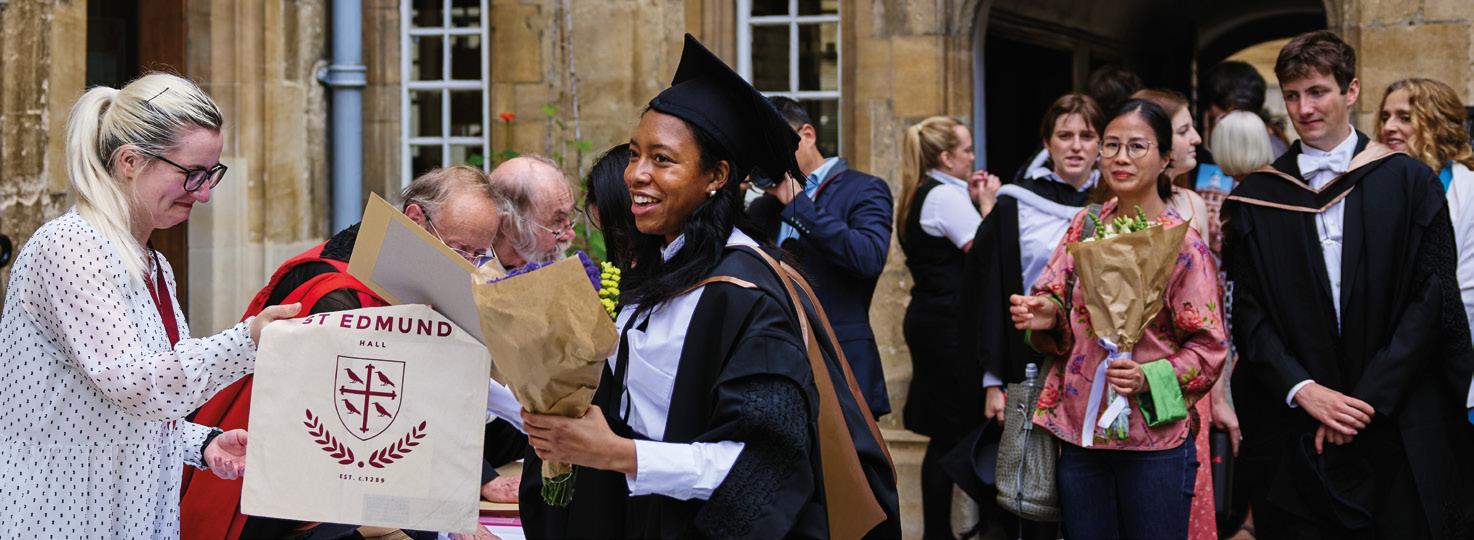
Final Honour Schools 2024
These are the Finalists who agreed to the publication of their exam results.
MBiochem Molecular and Cellular
Biochemistry
Class I Kayla Rowden, Holly Sanderson
Class II i Ella Mark, Hannah Pullen
BA Cell and Systems Biology
Class II i Matthew Jarvis
MChem Chemistry
Class I Srija Ghosh
Class II i Jasmine Lowe, Henry Mehta
Class II ii Jiayi Dai, William Redding
Class III Jinxi Guo
MEarthSci Earth Sciences
Class I Lila Blake, Redmond Coleman, James Frankel
Class II i Emily Falconer, Hector Skipworth
BA Economics and Management
Class I Teddy Thomson
Class II i Emilie Mathieu, Victor Nguyen
MEng Engineering Science
Class I Lucia Mullings, Joseph Ritchie
Class II i Haedam Oh, Adam Pattenden, Alexander Whitmarsh
Class II ii Zhaoqiu Cheng, Brittany Perera
BA English Language and Literature
Class I Weihang Deng
Class II i Ethan Bareham, Hester Gleeson, William Gross, Hugo Harvey, Isobel Paxton, Matilda Piovella
Class II ii Rajvir Bhattal
BA English and Modern Languages (FRE)
Class II i Alexander Abrahams, Emily Twinn
BA Experimental Psychology
Class I Kuo Liu, Sakshi Rajesh
Class II i Samantha Connell
BFA Fine Art
Class I Maisie Goodfellow, Oliver Wiseman
Class II i Zixi Cai, Eve Gueterbock, Hermione Leaver, Charlotte Rich-Jones, Maia Sansour Malaga
BA Geography
Class I Joss Carr, Rose Morley, Brodie Weymouth
Class II i Sophie Brown, Seth Dockery, Lalou Laredo
BA History
Class I James Craggs
Class II i Ben Lloyd, Zakaria Najjar, Tara Sallaba
BA History and Politics
Class II i Suzanne Antelme, Daniel Costello
BA Jurisprudence
Class I Joshua Ng
Class II i Ashley Canwell, Annabel McLaren, Iona Price, Imaan Saeed
MEng Materials Science
Class I Toby Onona, Katie Wellstead
Class II i Tehillah Campbell, William Metcalf, Hang Su, Emily Treacher
Class II ii Jacob Davies
BA Mathematics
Class III Tahmeed Ali
MMath Mathematics
Distinction John Duale, Cormac Farrell, Anubhab Ghosal, Saul Manasse
Merit Qianwei Jia
BA Medical Sciences
Class I
Michael Atife, Jonathan Munro, Catherine Westhead
Class II i Ellis Hall, Maria Nozdrina, Tyla Orton
BA Modern Languages
Class II i Charles Coombes, Emma Giddis, Anna Iaramboykov, Katherine Kirkpatrick, Leah Oates
Class II ii Marcus Bugge
BA Modern Languages and Linguistics
Class II ii Robert Elkington
MMathPhys Mathematical & Theoretical Physics
Distinction Lysander Mawby
BA Neuroscience
Class II ii Yueting Yang
BA Philosophy, Politics and Economics
Class I Anna Herold
Class II i Kunal Barman, Abigail Leaver (2023), Jack Sun, Yasmine Yared
Class II ii Klaudia Losiakowska
MPhys Physics
Class I Thomas Harray, Wei Wei Liu
Class II i Wiktor Jasniak
MPhysPhil Physics and Philosophy
Class I Maximilian Fawcett
Class II i Yiqi Shi
2024 Diploma in Legal Studies
Elliot Audard
Doctor of Philosophy (DPhil)
2023
Anthropology – Kiran Basava
Cardiovascular Science (BHF) – YaseminXiomara Zurke
Clinical Medicine – Sebastian Klindert
Earth Sciences – Annika Voigt
Economics – Pavel Luengas-Sierra
Experimental Psychology – Toby St Clere Smithe
Geography and the Environment – Ahmad
Al Sayed
Inorganic Chemistry – Mahmoud Elgaml
International Development – Rocco Zizzamia
Law – Vaclav Janecek, Aiden Lerch
Materials – Gong Chen, Yanru Ren
Theory and Modelling in Chemical Sciences (EPSRC CDT) – Isabel Creed
2024
Biomedical Sciences: NIH-Oxford – David Cruz Walma
Chromosome and Developmental Biology –
Lucy Cornell
Clinical Medicine – Tian Hu
Earth Sciences – Duhita Vishwas Naware
Economics – Revi Panidha
Education – Arzhia Habibi
Engineering Science – Linde Hesse, Ioannis Spanos, Sihan Wang
Fine Art – Margrethe Troensegaard
History – Dongsun Lee, Philip Smith
Infection, Immunology and Translational
Medicine – Barbora Schonfeldova
BA Psychology, Philosophy, and Linguistics
Class II i Emma Doe
Information, Communication & Social Sciences – Tomas Borsa
Inorganic Chemistry – Felix Fleschhut, Konstantin Lebedev
Interdisciplinary Biosciences (BBSRC DTP) – Physiology, Anatomy & Genetics – Thijs Van Der Plas
Materials – Andrew Gibson, Bingkun Hu, Xuewei Li, Maximilian Schart, Yingrui Zhao
Mathematics – Patrick Nairne
Medieval and Modern Languages – Zita Lanzara
Molecular and Cellular Medicine – India Brough
Oncology – Salwa Lin
Organic Chemistry – Georgios Papadakis
Paediatrics – Elizabeth Jones
Population Health – Guilherme PessoaAmorim
Social Policy – Lukas Lehner
Women’s and Reproductive Health –
Michal Krassowski
Zoology – Elisa Sandoval, Krish Sanghvi
Master of Philosophy (MPhil)
Development Studies – Angus Williams (Distinction)
History – Christina Figlus
Law – John Croker
Russian and East European Studies –Melina Magdelenat
Slavonic Studies – Jan Gutkowski (Distinction)
Master of Fine Art (MFA)
Stephanie Hartop (Distinction)
Master of Science (MSc)
2023
Digital Scholarship – Georgios Regkoukos (Distinction)
Environmental Change and Management – Ammu
Modern South Asian Studies – Manisha Kilmurry
Statistical Science – Radu Dragomirescu (Distinction)
2024
Clinical Embryology – Isabella Honess, Nicholaus Mazuguni
Digital Scholarship – Xuancheng Pan
Economics for Development – Oliver Bater
Education (Comparative and International Education) – Emilija Platukyte
Environmental Change and Management –Serena Bashal
Evidence-Based Social Intervention and Policy Evaluation – Fatima Airan
Global Health Science and Epidemiology –Qinfang Lu, Meehan Leah
International Health & Tropical Medicine –
Phillip Chigiya, Gloria Rukomeza
Mathematical and Computational Finance – Max Thomson
Mathematics and Foundations of Computer Science – Katherine Hamilton (Distinction)
Medical Physics with Radiobiology – Dunja Stojanovic
Modern South Asian Studies – Rohan Chopra (Distinction)
Neuroscience – Sarah Zhang
Pharmacology – Human Nori
Social Science of the Internet – John Cook
Statistical Science – Clemens Schnabel
Sustainability, Enterprise and the Environment – Ashley Bang (Distinction), Benjamin Kwong, Noah Mihan (Distinction), Tosca Tindall (Distinction)
Refugee and Forced Migration Studies –Laura Blythe (Distinction)
Master of Science by Research (MSc Res)
Surgical Sciences – Delaney Czworka
Master of Studies (MSt)
English – Dylan Kelly, Samuel Rigg, Rebecca Whalley
Philosophy of Physics – Yifan Shao
Modern Languages – Sophie Freidank, Elizaveta Timofeeva (Distinction)
Master of Public Policy (MPP)
2023
Annelisse Escobar Valle, Milan Gandhi (Distinction), Emma Wardle
Master of Letters in Philosophy (MLitt)
Romain Dufetre
Bachelor of Civil Law (BCL)
Ibrahim Haroon, Matthew Johnson (Distinction), Anushay Zehra (Distinction)
Bachelor of Medicine (BM BCh)
Medicine, Clinical – Rahul Radia, Xin Yang
Bachelor of Philosophy (BPhil)
2023
Lara Scheibli
2024
Emerson Salovaara
Postgraduate Certificate in Education (PGCE)
Aaran Rajathevan, Max Renouf
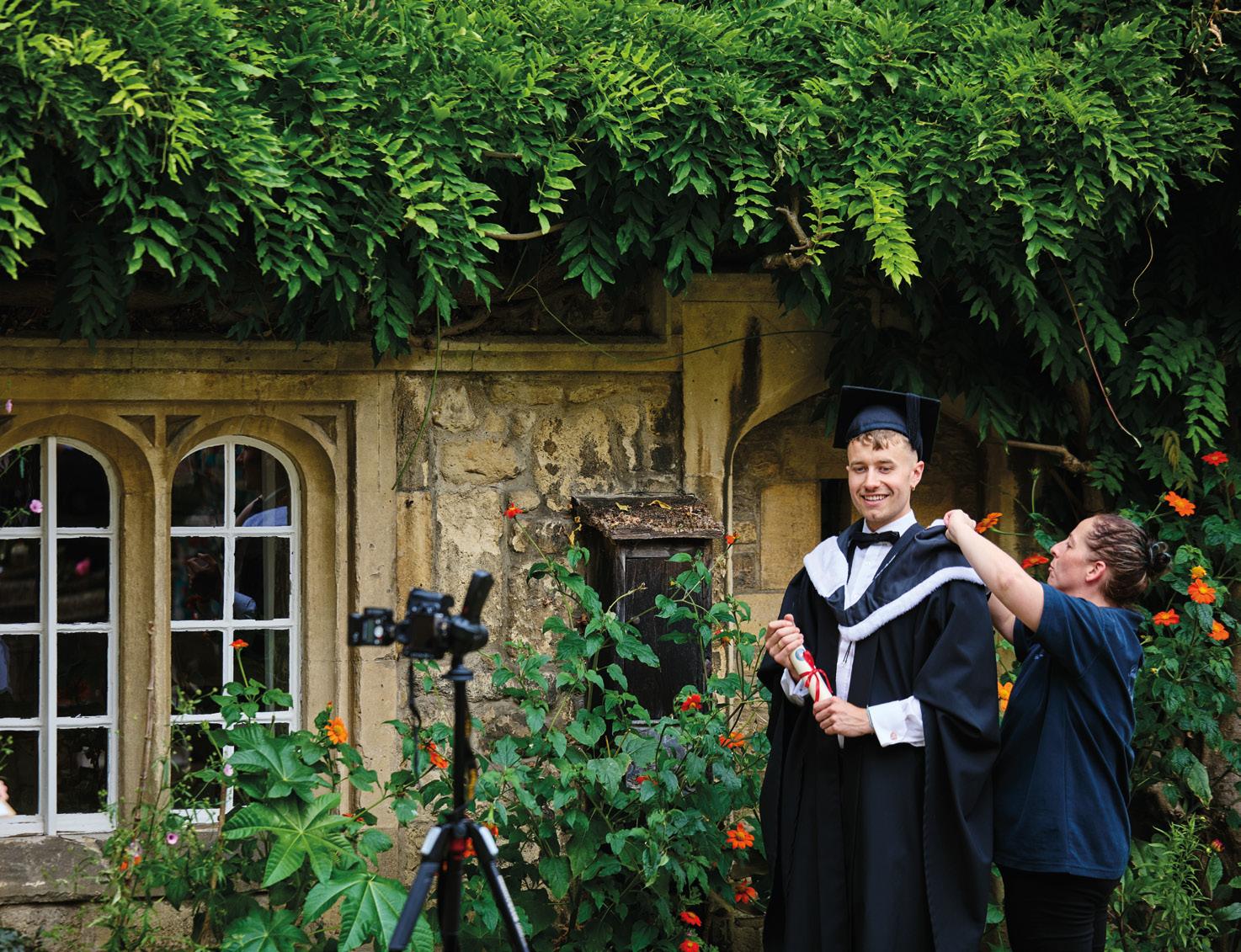
Information about the procedure for signing up to a degree ceremony can be found on the College website. Dates of degree ceremonies in 2024-25 will be published on the College website as and when they are confirmed (usually in Michaelmas term).
Taught course students who are due to finish their degrees in the 2024-25 academic year will be invited by the Degree Conferrals Office in Michaelmas term of their final year to attend the ceremony date relevant to their degree.
Research students will be invited to book a ceremony date once they have been granted Leave to Supplicate.
Historic graduands (pre-October 2024) or those wishing to have their MAs conferred in person at a ceremony will need to request that their name be put on a ‘holding list’ (waiting list) for a ceremony date, and will be contacted should a place become available. Further information detailing the booking process for historic graduands is available on the College website.

The 2023–2024 academic year marks the third year since the launch of our HALLmarks Campaign to support the Hall’s ten-year strategy. I am proud to share that, thanks to the incredible generosity of Aularians and our supporters, we have now raised over £17 million since the strategy was launched in 2019, which represents over 30% of our HALLmarks Campaign target of £50 million by the end of 2030.
One of the key focuses of this Campaign is the redevelopment of the Norham St Edmund student accommodation buildings, and it has been a pleasure to host several alumni on tours of the site whilst construction is taking place. When completed, this new ‘quadrangle’ will enable us to house all undergraduate students. We continue to be incredibly grateful for the donations received towards Norham St Edmund. Your gifts to the HALLmarks Campaign ensure that Teddy Hall students can focus on their studies in a supportive and collegiate environment, without additional financial burdens.
As always, the past year was filled with memorable events that brought together Aularians, students, guests, and visitors. Here are some of the highlights:

On Saturday 16 September, we hosted the 50th anniversary for 1973 matriculands. This was followed four days later by the 60th anniversary lunch for 1963 matriculands – both events, held in the Old Dining Hall, were enjoyed by all in attendance and it was a pleasure to celebrate these significant milestones with Aularians.
Later that month the Hall bid farewell to Professor Robert Whittaker who held a Geography Reunion event in the Wolfson Hall, which was a great success and a lovely opportunity for Professor Whittaker’s former students to see their tutor again and catch up with one another. Emeritus Fellow Dr Ian Scargill was also in attendance and many of his former students were delighted to see him back at the Hall.
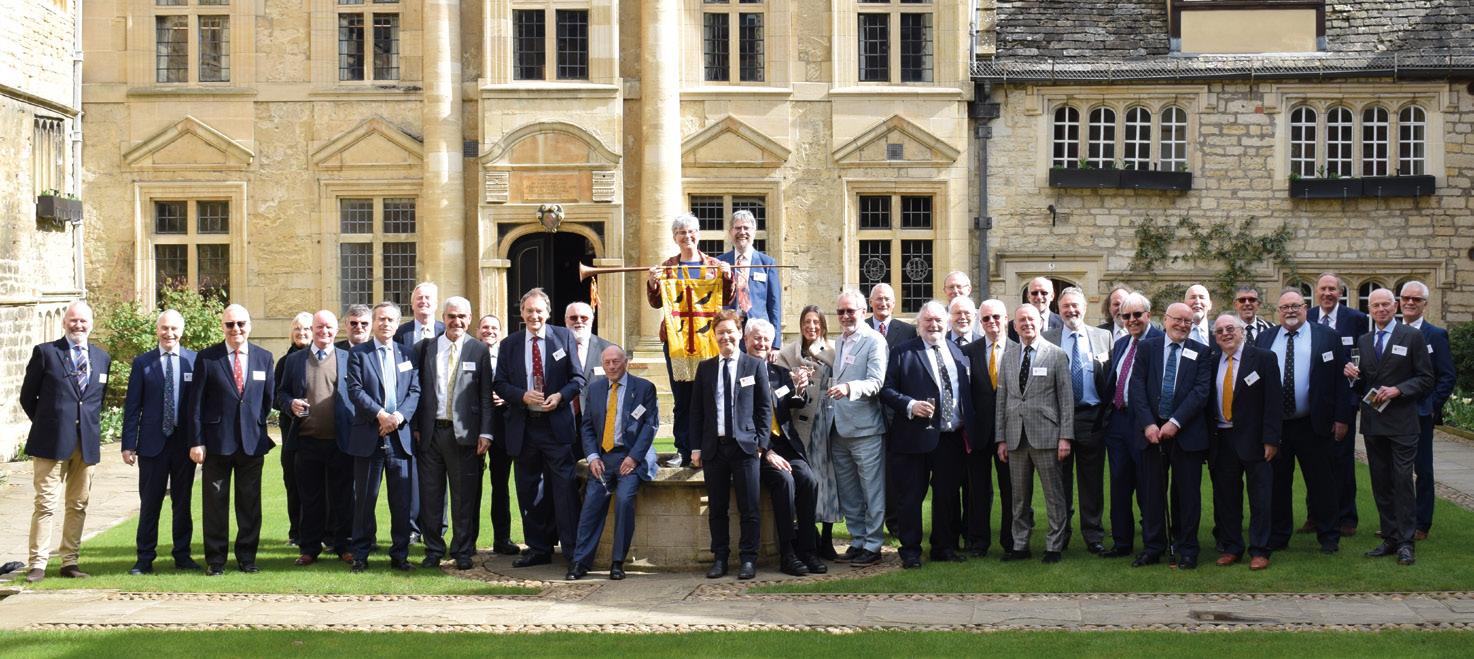

The St Edmund Hall Association (SEHA) held the annual lunch on Friday 17 November. In early December, the Senior Tutor, accompanied by members of the Development and Alumni Relations Office, travelled to New York for the 38th annual drinks reception and dinner. This event, always a highlight of the year, was one of two trips the Hall made to the United States. In February, the Principal returned to New York and visited alumni in Montreal as part of the growing partnership with HEC Montréal where we were warmly hosted by Jean Chagnon (1971, BPhil Management Studies). We are very grateful for the hospitality on both visits to the US and Canada and for the continued generosity and enthusiasm for the Hall from North America.
The annual SEHA London dinner was held on 6 February and it continues to be an enjoyable occasion for Aularians to meet for an informal dinner and get together in Soho. On 6 February, it was also a pleasure to welcome back to the Hall a number of Aularians for the Hilary term ‘Conversations in Environmental Sustainability’ seminar. This third edition of the seminar series focused on environmental challenges and solutions for developing countries, and was followed by a dinner with academics from the Hall, industry and third sector representatives.
A gaudy was held on 15 March for the matriculands of 1976–1977, and a 50th anniversary lunch was held in the Old Dining Hall for 1974 matriculands. Both events were well attended and enjoyed by all. For those at an earlier point of their Hall journey, we were delighted to host the Finalist’s Parents’ Dinner in March, providing students and their families a chance to celebrate their time at the Hall before their final exams and graduation.
Other key events over the spring included an afternoon of jazz in the Old Dining Hall followed by drinks in the Front Quad, with thanks to Aularian Alyn Shipton (1972, English) and his band. This year’s Geddes Lecture took place in the Examinations Schools and was facilitated by Sky News’ Sophy Ridge (2003, English) who interviewed the CEO of the Media Regulator Ofcom, Dame Melanie Dawes.
In April, the Principal and I visited Aularians in Asia for the first time in several years and attended events in Hong Kong, generously hosted by José-Antonio Maurellet (1996, Jurisprudence), and in Singapore, generously hosted by Luke Jones (1989, Experimental Psychology).
We hope to grow and establish our ‘Aularians in Asia’ network with the intention to hold an annual dinner, to replicate the success of the New York dinner which is about to approach its 40th year in 2025.
Bequests to the Hall continue to provide significant support. This year, we received gifts from 1,052 generous Aularians. Members of the Floreat Aula Legacy Society will come together for their biannual dinner in March 2025, and we very much look forward to welcoming members of the Society back to the Hall. We are incredibly grateful for the enduring support of our legacy donors.
Looking ahead, we remain committed to achieving the ambitious goals of the HALLmarks Campaign. The Norham St Edmund construction is on track with an expected completion date of spring 2026 and the first cohort of students moving into the accommodation from the 2026–2027 academic year. Aularian support for the HALLmarks Campaign is enabling the Norham St Edmund development and, importantly, your funding has also
created new scholarships, provided enhanced sporting, musical and cultural opportunities for our students, produced cutting-edge research and ensured the continuation of our unique tutorial teaching system.
Thank you for your continuing generosity and unwavering support for the Hall. Floreat Aula!
Andrew Vivian, Director of Development
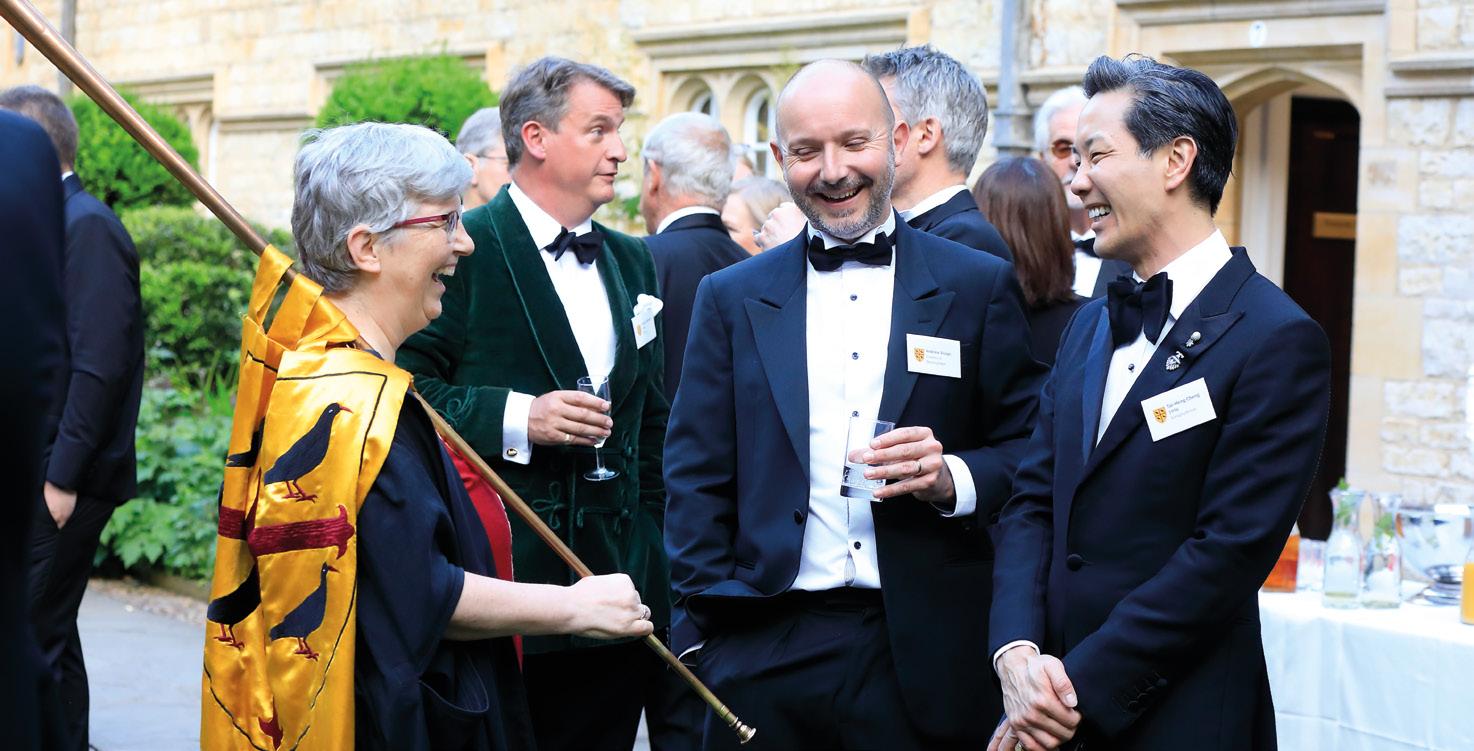
I am delighted to be able to say that again the Association has run a full programme of activities this year. But first I’d like to say a few words about the Association, as some Aularians I have met this year are a little unclear about us. The SEHA was formed in 1925 with the principal objective of being a ‘friend raising’ body that will encourage all Aularians to maintain contact with the Hall, its Fellows and other alumni. All alumni are members of the Association: you may remember a small fee being added to your termly battels when you were a student to pay for your lifetime membership. All alumni

are therefore welcome and encouraged to participate in, and indeed help with, the organisation of our events.
This year, we began our social calendar with our third London Lunch in November 2023, with a record 66 tickets sold. Hall Spirit was very much in evidence amongst those who prefer to gather during daytime in a small venue, and we were updated on the latest developments at the Hall by Senior Tutor Robert Wilkins and Director of Development Andrew Vivian. Such was the success of this that a fourth lunch is planned for 22 November 2024.
The 38th annual New York dinner followed in December 2023 at the Links Club in New York City, attended by a Hall delegation led by the Senior Tutor.
I am very pleased to say that my wife Linda and I were able to attend this and very much enjoyed meeting the North American alumni I had heard and read so much about over the years. Many thanks to Bob Gaffey (1975, Jurisprudence) for continuing to be the organiser of this event, and to Justus O’Brien (1979, PPE), for hosting us at the Links Club.
In February 2024, we held our London dinner once more at 100 Wardour Street in Soho. This lively and convivial event was attended by 149 guests. Numbers were down somewhat on previous years, perhaps due to the cost of attending these events. However, the Wardour Street dinner is excellent value for a central London location and we will be holding another there on 4 February 2025. I’m pleased to say that the price increase over last year’s dinner is only 50p per guest and we will continue to subsidise the cost for those within 10 years of graduation – so I hope to see more of you there next year.
I would particularly encourage all Aularians to attend Association and Hall events, even if your particular friends are not able to be there. You will always find you are in excellent company, no matter
with whom you are seated, and you’ll have plenty to talk about.
Our third online AGM was held on 30 January 2024, this now being our established format for the event. At the AGM, we were pleased to hear from the Principal Kathy Willis about the excellent progress being made in the HALLmarks Campaign and the new accommodation project at Norham Gardens.
Our annual Teddy Talk, this year on the subject of artificial intelligence, took place in February. Our speakers were Mike Bhaskar (2002, English Literature) and Linda Eggert, an Early Career Fellow in Philosophy at Balliol. Mike had recently coauthored a book on artificial intelligence entitled The Coming Wave and Linda is a philosopher with an interest in the ethics of artificial intelligence. My thanks to SEHA committee member Polly Cowan (2022, Jurisprudence) who organised and led the event.
Aularian Connect continues to gain in strength with over 1,700 Aularians now registered, representing over 270 different industries and 52 countries. Most have ticked the ‘willing to help’ box and I would encourage current students and recent graduates to take advantage of the networking and mentoring opportunities it provides. And, of course, I would remind those of us who are employers that Aularian Connect can link you to an upand-coming cohort of bright young minds starting their careers.
SEHA again awarded two Aularian Prizes to students who demonstrated an exceptional enterprise or voluntary commitment in an activity which has a clear community benefit, raises the profile of the Hall and falls outside established College or University pursuits. One prize was awarded to a JCR member and one
to an MCR member, both at a value of £600. The calibre of the applications was again high. We awarded prizes to Sophia Suganuma (2022, PPE) for her work with Climate Cardinals, an international youthled non-profit organisation working to make climate education accessible to nonEnglish speakers; and to Zhuohan Chen (2019, DPhil Education) for her work with the Oxford Future Education Development Association, which is committed to fostering collaboration among education researchers, practitioners, entrepreneurs and policy-makers worldwide.
Our Podcast series, Spirit of the Hall, now comprises four complete series. Highlights of series four for me were former United States Senator Larry Pressler (1964, Public and Social Administration) with his insights gained from a life of military and public service in the USA; David Picksley (1953, Modern Languages), the oldest participant in the London Marathon; and Immediate Past SEHA President Olly Belcher (née Donnelly) (1999, Geography), who normally hosts these podcasts but was this time in the interviewee’s chair, with Bob Gaffey asking the questions. I’d like to thank Olly for her sterling efforts in organising and hosting the podcasts, and I’m pleased to say she has agreed to continue with a fifth
series.
I would like to thank my Deputy President, David Jordan (1990, Modern History), and all the Committee for their dedication to the Association, and also the Principal and the Development and Alumni Relations Office for their support and encouragement, particularly Head of Alumni Relations Emily Bruce for her work on our London social events. I would also like to thank our whole Aularian community for your enthusiasm for our various initiatives. This has been the first year that the current students have an option to ‘opt out’ from paying a subscription to the SEHA on leaving and I’m pleased to say that the overwhelming majority of leavers in 2024 decided to contribute. I hope we can provide events and activities over the coming years that will maintain your engagement. As always, your suggestions are welcome and you can reach me via Aularian Connect.
Finally, I would like to record the passing of our Honorary Vice President Bob Breese (1949, Modern History) who died in March 2024. Bob was a past President of the Association and a keen supporter of the Association and the Hall.
Chris Elston (1976, Engineering Science)

The Principal, Fellows and students are all extremely grateful for the support of the 1,078 alumni, parents of students and Friends of the Hall who have donated in the last year and whose names are recorded on the following pages.
Although the donor list only includes gifts received between 1 August 2023 and 31 July 2024, we are equally grateful to all supporters who have given to the Hall outside of this timeframe. If you donated after 31 July 2024, your gift will appear in next year’s Magazine.
We record by matriculation date the names of all who have made a donation during this period, including the participation rate (the percentage of people in each year who have given), and the total amount received per matriculation year. Where there are small numbers of donors in a particular year we have not listed the amount given in order to preserve confidentiality.
*denotes deceased
Donor List 2023–2024
1948 (13%)
John Williams*
1949 (7%)
Bob Breese*
1950 (22%, £8,172)
Jack Preger
Ralph Simmons
Ray Waddington-Jones
Jack Wheeler
1951 (13%, £35,150)
Derek Bloom*
Kenneth Lund
Plus 2 anonymous donors
1952 (17%, £3,802)
Ian Byatt
Tony Coulson
Neil Hall*
Royston Taylor
Neville Teller
David Thompson*
David Wright
1953 (16%, £2,556)
Ian Jackson*
David Picksley
Bob Rednall
Dick Turner
Brian Venner
Brian Wakefield
1954 (17%, £14,250)
Stuart Bilsland*
Jeremy Cleverley
Michael Duffy
Tony Laughton
Brian Shepherd
Keith Suddaby
Raymond Thornton
John West*
1955 (25%, £877,905)
John Billington
Tony Cooper
John Dellar
David Frayne
John Friend
David Hare
Michael Hilt
Del Kolve*
Mike Neal
Tony Pearson
Irving Theaker*
Bill Weston
Richard Williams
Plus 1 anonymous donor
1956 (29%, £4,365)
John Andrewes
Martyn Bird
Maresq Child*
John Ducker
Fred Farrell
John French
Michael Hickey
Basil Kingstone
Chris Machen
Martin Reynolds
David Short
David Williams
1957 (21%, £8,837)
Jonathan Aptaker*
Michael Archer
Robin Blackburn
David Bolton*
David Bolton
Blake Bromley
Geoff Brown
Martin Clifford
Duncan Dormor
Tony Ford
Dennis Jesson*
Tony Ruffhead
Alastair Stewart
1958 (19%, £6,112)
Jim Amos
Jim Dening*
Geoff Fox
David Harrison OBE
John Haydon
Ronnie Irving
Michael Jarman
Pete Kite
Tony Nial
Bill Patterson
Michael Pelham
David Phillips
Philip Rabbetts
1959 (27%, £80,141)
Ian Alexander
Ewan Anderson
Hinton Bird
Keith Bowen
John Chapman
D C Coleman
John Collingwood
Kevin Crossley-Holland
John Curry
Tony Doyle
Patrick Frost
Chris Harvey
Ian Hepburn
Graham Kentfield
Culain Morris
Mike Oakley
Mike Saltmarsh
John Spires
David Stedman
Michael Voisey
Stewart Walduck
Ian Walker
Roy Walmsley
John Walters
Plus 1 anonymous donor
1960 (34%, £21,386)
John Adey
Nick Alldrit
Chris Atkinson
David Baines
Terence Bell
Adam Butcher
Robert Clark
Terence Coghlin
Jeremy Cook
Ian Evans
Brian Fyfield-Shayler
Jeff Goddard
Peter Hayes
Kenneth Heard
Robin Hogg
Chris Long
Yann Lovelock
David Mash
Francis Pocock
George Ritchie
Michael Rose
Patric Sankey-Barker
John Sherman
George Smith
Roger Sparrow
John Thorogood
Andrew Tod
Alan Wilding
1961 (20%, £21,638)
Don Anderson
David Brown
Martin Buckley
Stanley Burnton
Sidney Donald
Michael Hornsby
Malcolm Inglis
Nick Lloyd
John Long
Ian Manners
George Marsh
Jim Marsh
Jonathan Martin
Hugh Redington
Anthony Rentoul
David Scharer
Stephen White
1962 (22%, £15,121)
David Buckingham
James Burnett-Hitchcock
Michael Buttler
Chris Cowles
Jeff Creek
Jim de Rennes
Sean Duncan
Bill Gulland
Michael Hamilton*
Handley Hammond
David Hicks
Arwyn Hughes
Alan McNamee*
Richard Meeres
Tony Moore
Sean Morris
Nigel Pegram
Richard Phillippo
Hugh Thomas
John Williams
Plus 1 anonymous donor
1963 (21%, £20,365)
Darrell Barnes
Steve Benson
Ian Bowers
Bob Brewer
Bob Broughton
Nicholas Bulmer
Bob Clarke
David Cox
John Crawshaw
Geoff Day
John Dodgson
Edward Gould
Michael Harrison
Rod Offer
John Rosefield
Clive Sneddon
John Still
John Taylor
Nigel Thorp
Plus 3 anonymous donors
1964 (17%, £15,430)
Mike Barrow
John Bunney
Bob Clarke
John Coope
Steve Copley
Tony Fawke
Jeremy Fox
Bill Hartley
Derek Hawkins
John Hughes
Tony Lemon
Tim Machin
Derek Morris
Robert Norcliffe
James Pitt
Michael Powis
David Rumbelow
Stephen Sherbourne
Hugh Simpson
David Tearle
1965 (25%, £12,895)
Christopher Allen
Joe Barclay
Robert Beckham
Tommy Bedford
John Clarembaux
John Dennis
Paul Fickling
Simon Gatrell
Derek Harrison
Colin Hewitt
Ken Hobbs
Ron McDonald
Andy Morgan
Thomas Mulvey
Brian North
Billett Potter
David Powell
John Rea
David Reed
Guy Richardson
Ted Roskell
John Sayer
Philip Spray
Chas Stansfield
Bill Walker
Frank Webster
Richard White
Richard Wycherley
Plus 1 anonymous donor
1966 (22%, £21,156)
Nigel Blackwell
Cam Brown
Nigel Clarke
Howard Coates
Bernie Collins
Bob Darby
Guy Fisher
Roger Frankland*
David Garvie
David Hansom
Ian Hewitt
Linn Hobbs
Ted Hodgson
Peter Jenkins
John Kilbee
David Knight
Carl Mawer
Andrew Middleton
Jon Shortridge
David Stewart
Michael Stone
Geoffrey Summers
George Syrpis
1967 (19%, £69,912)
Robert Breckles
Jeremy Cooke
Nigel Derrett
Lawrence Downey
Colin Hawksworth
Roger Kenworthy
Mike Kerrigan
Ethan Lipsig
John Mabbett
Peter Mitchell
Jim Mosley
John Orton
Dave Postles
Bruce Rashkow
Philip Robinson
Mark Spencer Ellis
David Tabraham-Palmer
Keith Walmsley
Rob Weinberg
Peter Wilson
Plus 1 anonymous donor
1968 (16%, £13,277)
Clive Bailey
Andrew Barnes
John Berryman
David Blezard
Phil Emmott
Charles Fisher
James Hunt
Laurence Jackson
Alan Jones
Stuart Kenner
Geoff May
Tony Moore
John Penfield
Mike Pike
Chris Pote
Ian Ridgwell
Michael Spilberg
Ian Stuart
David Theobald
1969 (11%, £11,325)
Brian Battye
Mick Birks
Roger Callan
Bryan Dawson
Steve Dempsey
Dick Ford
Leonard Gibeon
David Jones
Clive Kerridge
Roy Marsh
David Monkcom
Paul Parker
Chris Stafford
1970 (13%, £4,156)
Nigel Coles
Julian Currall
Will David
Kevin Fisher
Chris Hawkesworth
Chris Lewis
David Morgan
Richard Ormerod
Peter Raspin
Colin Richmond-Watson
Richard Robinson
Paul Silk
Mike Skelding
Geoff Smith
Chris Sutton-Mattocks
Plus 2 anonymous donors
1971 (19%, £129,138)
David Audsley
Richard J. Balfour
Peter Balmer
George Bishop III
Mark Booker
David Brenner
Ian Brimecome
Jean Chagnon
Roger Chaplin
Ian Cheffy
Lawrie Coupland
Lawrence Cummings
Rick Henshaw
Steve Jones
Craig Laird
Dave Leggett
Peter Lever
John Parr
Roger Pawson
Douglas Robertson
Stephen Rosefield
Steve Russell
Greg Salter
John Sloan
Justin Stead
Plus 1 anonymous donor
1972 (17%, £25,043)
Jim Boff
George Bull
John Catherall
Steve Chandler
William Clark
Anthony Deakin
Tony Downes
Andrew Green
Andy Hall
Howard Mason
Paul Mounsey
Peter Osborn
Andrew Peacock
John Pedersen
Gareth Price
Floyd Robichaux
David Rosen
Ian Smith
Robin Stephenson
Steve Taylor
John Trotman
Allan Walker
Martin Winter
1973 (16%, £9,937)
Colin Ashby
Chris Bamber
David Beckett
Colin Bullett
Sean Butler
David Copeland
Robert Godden
Roger Golland
David Grice
Richard Harandon
David Holmes
Nick Jones
Anthony Jordan
Dave Knight
Nigel Laing
Colin Lizieri
Ian Midgley
Mark Patterson
Nic Peeling
John Roberts
Tom Schneider
Mike Wood
1974 (19%, £14,333)
Keith Albans
Phil Budden
Graham Clark
Peter Desmond
Steve Edrich
Mark Handsley
Andrew Hargreaves
Charles Hind
Stephen Hutchinson
Doug Imeson
Bob Jeavons
Paul Matthews
David Neuhaus
John Ormiston
Andy Patterson
Clive Penwarden
Phil Phillips
Tim Robinson
Gerard Rocks
Trevor Ryder
Dick Sands
Kim Swain
Stephen Tarran
Graham Wareing
John Wisdom
Plus 1 anonymous donor
1975 (12%, £42,444)
Jeremy Charles
Bob Gaffey
Brian Gasser
Graeme Gibbs
Louis Greig
Gordon Hurst
Martin Jones
Graham Ketley
Robin Osterley
Justin Samuel
Ces Shaw
Nigel Smith
Alan Stansfield
Anthony Stopyra
Peter Watson
David Way
1976 (17%, £69,028)
Bill Baker Jr
James Basker
Hora den Dulk
Brian Denton
Steve Edwards
Chris Elston
Richard Finch
Anson Jack
Trevor Payne
Mike Power
Jonathan Reynolds
Jamie Robertson
Martin Saunders
Paul Sutton
Ian Taylor
Stephen Tetley
Peter Trowles
Matthew Wald
Neil Worthington
Jeremy Young
1977 (15%, £20,590)
Philippe Beaufour
David Blakey
Charles Blount
Andrew Brown
Ian Doherty
Neil Edwards
Peter Foster
Oliver Grundy
Nick Hamilton
David Harding
Adrian Haxby
Chris Horner
Roger Keeley
Naresh Malik
David McKenna
Peter Rogers
Chris Samuel
Jeremy Tullett
Steve Vivian
Paul Walker
Plus 1 anonymous donor
1978 (10%, £4,073)
Doug Ansley
John Armitstead
Hamish Cameron
Ian Coleman
Richard Collins
Simon Heilbron
Ian Hutchinson
Lloyd Illingworth
Stephen Leonard
Brian Livesey
Gideon Nissen
Peter Richardson
Nicholas Rowe
1979 (14%, £9,704)
Stephen Coulson
David Cox
Gail Davies
Davina Dwyer
Mark Earls
John Hodgson
Alan Holbrook
Paul Littlechild
Ian Lupson
Phil Martin
Caroline Morgan
Robert Quain
Michael Robinson
Roxy Roxborough
Tim Sands
Ingrid Sharp
Paul Skokowski, in memory of Justin Gosling and Joe Todd
Duncan Talbert
Robert Vollum
David West
1980 (19%, £28,894)
John Ayton
Bernard Bewlay
Philip Broadley
Nick Caddick
William Carver
Paul Cubbon
Jonathan Davies
Timothy Edmonds
Anthony Farrand
Jon French
Alistair Graham
Jonathan Hofstetter
Simon Kelly
Gary Lawrence
John Madgwick
Zahid Nawaz
James Newman
David Preston
Simon Ramage
Jonathan Scott
Paula Skokowski, in memory of Justin Gosling and Joe Todd
Nick Senechal
Neil Stevenson
Frank Strang
Christina Tracey
Plus 1 anonymous donor
1981 (13%, £8,630)
Andrew Burns
Mark Campbell
Sandy Findlay
Julian Hammond
Claire Ivins
Caroline Jordan
Richard Lambert
Jim McAleer
Paul McCarthy
Tim Miles
Andrew Miller
Sallie Nicholas
Tim Parkinson
Maria Queenan
David Stokes
Paul Stowers
Jenny Turner
Mark Walters
1982 (16%, £18,182)
Sarah Asplin
Maggie Carver
Tom Christopherson
Catherine Dale
Linda Davies
Simon Ffitch
Guy Franks
David Heaps
Dan Johnson
Richard Kent
Peter Murray
Divya Nicholls
Gareth Penny
Marco Rimini
Kevin Sealy
Mark Sykes
Ian Tatchell
Shona Tatchell
Junior Williamson
Stuart Worthington
Plus 1 anonymous donor
1983 (15%, £17,302)
Stephanie Clifford
Chris Coleman
Kate Coleman
William Connolley
Tim Fallowfield
Marion Geddes
Tarquin Grossman
Siân Henderson
Mike Iddon
Max Irwin
Jo Kent
Peter Magyar
Phil Moody
Christine Muskett
Denis Mustafa
Kevan Rees
Helen Saunders
Andrew Till
Michael Young
1984 (7%, £7,507)
Dan Abnett
John Bloomer
Will Coleman
Steve Crummett
Julian Day
Alison Fallowfield
Neil James
Tesula Mohindra
John Risman
Anthony Rossiter
Harvey Wheaton
1985 (10%, £9,705)
Deborah Booth
Andy Brown
Clare Coleman
Neil Crabb
Jon Gulley
Michael Hill
Fiona Houston
Julia Little
Mark Little
Nicholas Peacock
Sue Peacock
Will Shaw
Elaine Teo
Judith Waring
Julia Weiner
Charlotte West
1986 (18%, £17,876)
Mary Betley
Geoffrey Chatas
David Denholm
Tim Dudley
Gavin Flook
Walter Fraser
David Gillett
Andrew Harrison
Simon Hodgson
Claire Horacek
Neil Jacob
Patrick Jennings
Trethewey Kiddey
Stewart Lee
Iain Mackie
Alistair McCleary
Sally McKone
John Myhill
Nana Okada
Phil Richards
Robert Robinson
David Southall
Mike Stanislawski
Jacqui Thornton
Sharon von Simson
Plus 2 anonymous donors
1987 (9%, £9,144)
Dan Bayley
Justin Collins
Richard Evans
Helen Fox
Lucy Gray
Jeremy Harrison
Kevin Johnson
Peter O’connell
Clare Rhodes James
Mark Sedwill
Richard Smalman-Smith
Philip Waldner
David Waring
Tim Wingfield
Plus 1 anonymous donor
1988 (11%, £1,296,818)
James Brace
Marcus Browning
Leon Ferera
James Ferguson
Christopher Garrison
Duncan Holden
Susanna Mann
Peter Matthews
Peter Michaelis
Peter Othen
Iftikhar Riaz
James Rudd
Giles Sanders
Lucy Shaw
Plus 3 anonymous donors
1989 (10%, £14,396)
Tom Argles
James Carr
Jonathan Cotton
Rob de Rennes
Jennifer Doran
Suzie Hobart
Andrew La Trobe
Mark Lauder
Tom Leman
Alex McLean
Richard Rednall
Ruth Roberts
Chris Sawyer
Fiona Sawyer
Natalie Tydeman
Darren Walker
1990 (12%, £8,827)
Marcus Bailey
Emma Barnett
Stephen Barnett
Paul Brady
Paul Brandon
Hew Bruce-Gardyne
Carolyn Drury-Burroughs
David Gauke
Andrew Green
Graham Hinton
Peter Hocknell
Dan Ison
Adrian Jones
Dave Jordan
Kevin Knibbs
John Milloy
Rob Salter
Ed Shelton
Natasha Walker
Andrew Williams
1991 (11%, £76,916)
Balakumar Arumugam
Christopher Ashton
Carol Atherton
Andy Barker
Duncan Barker
Julian Cater
Tessa Evans
Tim Houghton
Anneli Howard
Nicholas Lane
Peter Lee
David Liversidge
Ruari Macdonald
David McGill
Luke Powell
Peter Wallace
1992 (10%, £15,307)
Carla Antunes da Silva
Thomas Dennis
Matt Elliott
Mark Fisher
Lucy Heaven
Daniel Koh
Jane Mann
Sarah Morrison
Sarah O’Neill
Jules Plumstead
Claire Pugh
Matt Purcell
Gareth Scholey
Wayne Smith
Louisa Warfield
Matthew Weaver
1993 (9%, £60,046)
Natasha Ashton
Howard Cazin
Nick Gradel
Tim Jackson
Kieren Johnson
Rob Mansley
Tom McClelland
Clare McKeon
Al Mordaunt
Geoff Mortimer
Lucy Newlove
James Owens
Richard Tufft
Matt Webb
1994 (8%, £14,237)
Andrew Hagan
Choon Wai Hui
Ed Knight
Maryann Kongovi
Gareth McKeever
Kiran Mehta
Caroline Mitchelson
James Mushin
Thomas Peel
Amy Poole
Piers Prichard Jones
Jeremy Robst
David Wilkes
Plus 1 anonymous donor
1995 (7%, £5,445)
Robert Dryburgh
Chet Lad
Richard Martin
Hugh Miller
Koo-Yong Park
Chris Ruse
Martin Thorneycroft
Vladka Thwaites
Justin Waine
Dominic Walley
Alison Waterfall
1996 (10%, £8,490)
Paul Boon
Claire Burton
Tai-Heng Cheng
Julian Cooke
James Cookson
Tommy Doyle
Phil Duffield
Min Fang
John Houghton
Tom Long
Henry Mullin
Richard O’Donoghue
Roland Partridge
Maya Portolan
Zachary Segal
Roman Streitberger
Duncan Wallace
1997 (9%, £7,300)
Marko Bacic
Holly Bristow
Nat Copsey
Saurabh Das
Chris Eden
Natalie Gey van Pittius
Jamie Grimston
Nicholas Hamilton
PJ Howard
Heidi Johansen-Berg
Ali Mack
Dean O’Connell
Lucy Reynolds
Anthony Shackleton
Chris Tinson
Guofang Xiao
Plus 1 anonymous donor
1998 (6%, £2,741)
Michael Bird
Nick Hirst
Marcin Marchewka
James Matthews
Clare Murray
Ann-Marie Myhill
Sarah Saeed
Alina Saranti-Kuzum
Paul Smith
Carl Wells
Ben Wilkinson
1999 (12%, £3,372)
Jo Alexander
Olly Belcher
Bjorn Benckert
Mark Bolton-Maggs
Caroline Court
Jonathan Crawshaw
Oliver Deacon
Andrew Dickson
Kieron Galliard
Zoe Noonan
James Pattinson
Jenny Pescod
Alex Prideaux
Hanna Richardson
Sean Sullivan
Rosalind Wall
David Williams
Plus 2 anonymous donors
2000 (5%, £11,860)
Rohan Brown
Rahul Chopra
Miles Clapham
Emily Coates
Harriet Hungerford
Malcolm Lee
Akira Mitsumasu
Richard Povey
Charlie Ramsay
2001 (5%, £5,030)
Simon Barrett
Catherine Blair
Charles Hotham
Clem Hutton-Mills
Katie Moran
Alevtina Nepomniachtchikh
Patrick Schneider-Sikorsky
Jen Sugden
Aden Turna
Plus 1 anonymous donor
2002 (2%, £875)
Rachel Adams
Otilia Bologan-Vieru
Ruth Evans
Zoltán Marosi
Leon Marshall
2003 (4%, £1,047)
Nicolai Boserup
Jennifer Chung
Joe Hacker
Heather Mack
Carina May
David McCartney
Simone Wilson
Hongjie Zhu
Plus 1 anonymous donor
2004 (5%, £782)
Robin Fellerman
Stephanie Hardy
James Hogan
Caroline Juricic
Cara Krmpotich
Fiona Moss
Denis Nikolaev
Scot Peterson
Plus 1 anonymous donor
2005 (2%, £420)
Will Brownscombe
Long Jiang
Lucinda O’Connor
Aliza Watters
2006 (6%, £1,598)
Jennifer Ayers
Sophie Brice
Henry Carter
Siobhan Chapman
Sam Juthani
Serena Lee
Daniel Lowe
Robert Pearce
Xu Song
Andrej Spielmann
Amrik Thomas
Max Thompson
2007 (4%, £705)
Katherine Davis
Josh Fabian-Miller
Michael Helmers
Nicola Ielpo
Amy McLennan
Edward Mortimore
Iain Parr
Roy Zhou
Plus 1 anonymous donor
2008 (5%, £3,972)
Matthew Clark
Chris Clasper
Jan-Karl Conermann
Katie Hill
Gurnam Johal
Bryony Morgan
Joanne Pearce
Tom Pope
David Robinson
Adam Sealey
Charlie Wilson
2009 (7%, £3,262)
Anthony Beddows
Benjamin Clough
Josh Coulson
Fraser Davies
James Duffell
Lucy Durrans
Chris Freeman
Michael Graham
Charlotte Howell
Adam Jordan
George Lake
Anna Lewy (nee Piotrowski)
Eric Lukas
Frances Reed
Xiao Tan
2010 (5%, £5,946)
Bhaskar Bhushan
Andrew Gray
William Gunson
Theodore Hadlow
Alex King
Duncan Littlejohns
Gabriel May
Mutsa Mutembwa
Michael Nairn
Sam Parkinson
Aran Uppal
Filip Van Innis
2011 (3%, £565)
Thomas Bailey
Michael Cary
Olivier Cédelle
Hannah Dickinson
Ali Farhan
Amy Kenyon
Abi Lovell
Kirsten Pontalti
2012 (6%, £614)
Jack Calvert
Thomas Davis
Antonin de Laever
Sarah Grant
William Hak
Matthew Jordan
Benjamin Kelsey
Nathan King
Angus Maudslay
Fiona Maudslay
Emily Russell
Chun-hang Tang
Ben Valentine
Gemma Wardle
2013 (5%, £2,920)
Edward Benson
Kunz Chow
Josephine Clarke
William Dinning
Jaydip Jani
Takashi Lawson
Dylan Lewis
Alexandra Lindsay-Perez
Steven Pilley
Lara Shahnavaz
Alistair Swallow
2014 (4%, £2,051)
Grace Clements
Thomas Cosnahan
George Fulton
Zhenbo Gao
Kathryn Tierney
Hutchinson
Caitlin Johnson
Josh Mahir
Gianfranco Messina
Rachael Morris
Yekuan Shentu
Joel Straker
2015 (3%, £470)
Amelia Gabaldoni
Jack Gavin
Gary Lau
Hugo O’Grady
Karim Pal
Sam Scott
James Tibbles
Plus 1 anonymous donor
2016 (2%, £605)
Yufan Du
Tegan Gears
Kevin Gibbons
Justyna Todd-Frankowska
Tom Zhou
2017 (1%)
Terence Cudbird
Ioana Grigoras
2018 (2%)
Joseph Kennerley
Rachael Speed
Plus 1 anonymous donor
2019 (1%)
Haffendi Anuar
Emily Webb
2021 (1%)
Dustin Bischoff
Visiting Students (£2,094)
Arabella Benavides
William Ferguson
Justin Furuta
Paisley Kadison
Ed Reynolds
Rich Reynolds
Zach Rotter
Cary Rubinstein
Milind Sharma
Andrea Stephen
Brian Umana
James Yeagle
Plus 1 anonymous donor
Parent Donors (£5,409)
Lisa Blatch
John Davidson
Francis Eames
Shirley Schaeffer
John Umana
Friends of the Hall
(£41,881)
Shanti Anand, in memory of Dr Nitya Anand (1962)
Jenny Andersson
Carina Bittar-Doyle
Rosa Buettner
Ros Charles
Charles Peel Charitable Trust
Cissie Rosefield Charitable Trust
City Chapter of Aularians
Clare McKeon Charitable Trust
Cockayne
Peter Collins
Jack Cox
Lang Csira
Lourdes de Quillien
Juliet and Simon England, in memory of Barrie
England
John Garcia
Susan Gotschall Garcia
Cynthia Graae
Tony Gregson
Janet Heath
HEC Montreal
Peter Hirsch
Teresa Kellogg
Kat Kottonen
Pat Lewis
Milind Sharma Fund
David Moltow
David Pettifor
Pharsalia Charitable Trust
Christopher Phelps*
Adrienne Roche
RBC BlueBay Asset
Management
Martin Slater
Tom Sprent
St Edmund Hall Association
Robert Swannell
Joyce Thorpe*, in memory of William Thorpe
Simon Thwaites
Robert Whittaker
Luxue Yu
Plus 2 anonymous donors
Thank you to all of the generous donors who supported the Hall’s historic Norham St Edmund redevelopment project.
*denotes deceased
John Adey
Steve Allchin
Christopher Allen
John Andrewes
Tom Archer
Colin Ashby
Chris Ashton
Natasha Ashton
Sarah Asplin
Jeremy Badman
Paul Badman
Andrew Baldwin
Darrell Barnes
Mike Barrow
Philippe Beaufour
David Beckett
Tommy Bedford
Bernard Bewlay
John Billington
Martyn Bird
Dustin Bischoff
Roy Bishop*
Hunor-Chris Bocz
Mark Booker
Ian Bowers
Glen Bowman
Paul Brandon
David Braund
Ian Brimecome
Andrew Brown
Colin Bullett
Stanley Burnton
Claire Burton
Roger Callan
Mike Chadwick
Jean Chagnon
Steve Chandler
John Chapman
Jeremy Charles
Ros Charles
Sadiya Choudhury
City Chapter of Aularians
Steve Clark
William Clark
Bob Clarke
Stephanie Clifford
Benjamin Clough
Howard Coates
Nigel Coles
Peter Collins, in memory of
Justin Gosling
Julian Cooke
Sir David Cooksey*
John Coope
John Cooper-Poole
Stephen Corsham
Lawrence Cummings
Charlotte Davies
Julian Day
Antoin de Laever
Nigel Derrett
William Dinning
Sidney Donald, in memory of Justin Gosling
Duncan Dormor
Helen Drury
Carolyn Drury-Burroughs
Tim Dudley
Carol Dukes, in memory of
Justin Gosling
Neil Edwards
Steve Edwards
Gary Evans
Alison Fallowfield
Tim Fallowfield
John Fazackerley
Peter Foster
Mike Foxon
Bob Gaffey
David Garvie
Kevin Gibbons
Justin Gosling*
Susan Gotschall Garcia
Edward Gould
Heather Gray
Michael Griebe
Jamie Grimston
Tarquin Grossman
Benjamin Grout
Maureen Haile*
Andy Hall
Neil Hall*
Mica Halliwell
David Hammond, in memory of Steve Roberts
Samantha Harries
Rex Harrison
Rob Harrold
John Hawkins, in memory of Steve Roberts
Michael Helmers
Ian Hewitt
Michael Hilt
Graham Hinton
Sir Peter Hirsch
Suzie Hobart
Alan Holbrook
Michael Hornsby
Anneli Howard
Choon Wai Hui
Madeleine Humphrey
Max Irwin
Dan Ison
Anson Jack
Peter Jenkins
Patrick Jennings
Long Jiang
Caitlin Johnson
Peter Johnson
Andrew Jones
Dave Jordan
Caroline Jordan
Caroline Juricic
Joseph Kennerley
Daniel Koh
Peter Lever
Byron Light
Ethan Lipsig
Andrew Lowenthal, in memory of Steve Roberts
Toby Lucas
Kenneth Lund
John Mabbett
Iain Mackie
John Madgwick
Akaash Maharaj
Naresh Malik
Chris Manby
Zoltán Marosi
Roy Marsh
Jonathan Martin
Doug McCallum
Alistair McCleary
David McGill
Gareth McKeever
Amy McLennan
Sarah McPake
Kiran Mehta
Peter Michaelis
Tim Miles
John Milloy
Akira Mitsumasu
Geoff Mortimer
Peter Murray
Denis Mustafa
Ann-Marie Myhill
David Neuhaus
Peter Newell
Denis Nikolaev
Roger Nixon
Zoe Noonan
Stephen Noone
Rod Offer
Jack Oldbury
John Orton
Caitlin Page
David Parfitt*
Stephen Parmenter
Bill Patterson
John Pedersen, in memory of Steve Roberts
Nic Peeling
Clive Penwarden
Mike Pike
Francis Pocock
Gary Pollitt
Dave Postles
Chris Pote
David Powell
Paul Powell
Simon Pressinger
Gareth Price, in memory of Steve Roberts
Deborah Ramkhelawan
Georgia Redpath
David Reed
Ed Reynolds
Lucy Reynolds
Rich Reynolds
Ben Rippin
Douglas Robertson
Floyd Robichaux, in memory of Steve Roberts
Philip Robinson
Robin Rogers
Jeanne Ryan
Mike Saltmarsh
Giles Sanders
Alina Saranti-Kuzum
Mohini Sarda Lynch
Martin Saunders
Milind Sharma
Mike Simmie
Paul Skokowski, in memory of Justin Gosling and Joe
Todd
Paula Skokowski, in memory of Justin Gosling and Joe Todd
Nigel Smith
Ian Smith, in memory of Steve Roberts
Luboš Smrčka
Clive Sneddon
Catharine Snow
Chris Stafford
Rachel Stafford
Alastair Stewart
David Stewart
Roman Streitberger
Andrew Sumnall
Chun-hang Tang
Shona Tatchell
John Taylor
Steve Taylor
Martin Tranter
John Trotman, in memory of Steve Roberts
Richard Tufft
Filip Van Innis
Steve Vivian
Robert Vollum
Faith Wainwright
Stewart Walduck
Paul Walker
Peter Wallace
John Walters
Roger Wardle
David Waring
Judith Waring
David Way
Matt Webb
Frank Webster
Charlotte West
Tim Wingfield
Martin Winter, in memory of Steve Roberts
Mike Woodfine
Huijuan Wu
Simon Yau
Michael Young
Catherine Ysrael-Gomez
Hongjie Zhu
Plus 11 anonymous donors
Members of the Floreat Aula Legacy Society (FALS) have pledged to remember the Hall in their wills, and we are extremely grateful to the 272 members for their committed support. Our thanks also go out to the additional 16 Aularians who have pledged a bequest to the College without joining FALS.
Other Aularians who are interested in joining FALS or pledging a bequest to the Hall are invited to contact the Development and Alumni Relations Office for more information.
Members of FALS are invited back to the Hall for a biennial dinner and drinks reception, and the opportunity to revisit the College and meet Aularians of all generations. They also receive an exclusive lapel badge.
The Society’s current membership is listed below (the Aularians who joined in 2023–2024 are highlighted bold).
1942
Ken Palk
1945
Peter Phizackerley
John Snelling
1949
Alan Brimble
Ron Hall
Robert Strapps
1950
John Allchurch
Chris Armitage
Raymond Lee
John Scott
1951
Desmond Day
Kenneth Lund
Denys Moylan
Dudley Wood
1952
Bruce Nixon
1953
David Giles
David Picksley
Bob Rednall
1954
Jeremy Cleverley
Keith Hounslow
Norman Isaacs
Tony Laughton
Archie Warr
John Wilkinson
1955
John Barker
Martin Bates
John Billington
Tony Cooper
John Cox
John Dellar
Derek Ford
Bob Knowles
Peter Mercer
David Nelson
1956
Colin Atkinson
Michael Cansdale
Stewart Douglas-Mann
John Ducker
John French
David Johnson
Andrew Page
Martin Reynolds
Roger Sutton
Gordon Woods
1957
Geoff Brown
Michael Somers
Alastair Stewart
James Webster
1958
John Bean
Bob Bishop
Peter Davies
David Harrison OBE
Derek Jones
Philip Rabbetts
1959
Hinton Bird
Paul Brett
Kevin Crossley-Holland
David Harding
James Kerr-Muir
David Summers OBE
1960
John Adey
Chris Atkinson
Ian Beesley
Robert Clark
Terence Coghlin
Ken Hinkley-Smith
Yann Lovelock
Francis Pocock
Michael Rose
Alan Wilding
Plus 1 anonymous member
1961
Don Anderson
David Aukin
Stanley Burnton
Rex Harrison
Ian Heggie
John Long
George Marsh
Peter Newell
Anthony Rentoul
Martin Smith
Timothy St George Byng
Mike Statham
1962
Bill Best
James Burnett-Hitchcock
Chris Cowles
Arthur Davis
Bertie Harmer
David Hicks
Nigel Pegram
1963
Darrell Barnes
Ian Bowers
Bob Clarke
David Cox
John Crawshaw
Chris Erwin
Jeremy Mew
Rod Offer
Mike Simmie
John Taylor
1964
David Ashworth
Andy Barker
Anthony Bucknall
Campbell Dunford
Alan Graham
Tony Lemon
David Meredith
Keith Wiseman
Plus 1 anonymous member
1965
Paul Badman
Nigel Barak
John Clarembaux
Bill Foy
Peter Johnson
Andy Morgan
Humphrey Nicholls
Ted Roskell
John Sayer
1966
Cam Brown
Tony Fisher
Jon Shortridge
Alan Vasa
Plus 1 anonymous member
1967
David Hexter
Roger Kenworthy
Ethan Lipsig
John Mabbett
Philip Robinson
Graham Salter
Rob Weinberg
1968
Clive Bailey
Peter Brown
Martin Daniels
Charles Fisher
Alan Jones
Plus 1 anonymous member
1969
Peter Jones
Robert Mathews
Tim Statham
1970
John Hawkins
Richard Miller
Geoff Sambrook
Frank Spooner
1971
Richard J. Balfour
Mark Booker
Ian Brimecome
Lawrence Cummings
Yves Desgouttes
John Fazackerley
Malcolm Hawthorne
Roger Pawson
Douglas Robertson
Malcolm Sibson
Lyn Williams
1972
George Bull
Steve Chandler
Paul Mounsey
Plus 1 anonymous member
1973
Christopher Amor
Robert Cawthorne
1974
Brian Austin
Phil Budden
Richard Gillingwater
Charles Hind
Charles Murray
Jeremy Nason
Graham Wareing
Plus 1 anonymous member
1975
Andrew Cordell
Alex Davids
Brian Gasser
Alan Kerr
Ian Rushton
Nigel Smith
1976
Bill Cogar
Chris Elston
Richard Finch
Keith Scott
Simon Staite
Ian Taylor
Stephen Tetley
Plus 2 anonymous members
1977
Peter Foster
Jeremy Tullett
Steve Vivian
1978
John Armitstead
Patrick Brooks
Andrew Curtis
Paul Goulding
Richard Luddington
Robert Pay
Richard Taylor
1979
Tony Best
James Catmur
John Hodgson
Ian Lupson
Janet Nevin
Robert Quain
Paul Skokowski
David West
Russell Withington
1980
Bernard Bewlay
Philip Broadley
Nick Caddick
William Carver
Alistair Graham
Graeme Hall
Steve King
James Lyle
Paula Skokowski
1981
Alasdair Blain
Claire Ivins
David Stokes
1982
Maggie Carver
Tom Christopherson
Linda Davies
Adrian Sandbach
Stuart Worthington
1983
Simon Baker
Max Irwin
Christine Muskett
1984
Julian Day
Pete Mott
1985
Doug McCallum
Will Shaw
Tanya Spilsbury
Betsy Tyler Bell
Judith Waring
1986
Geoffrey Chatas
Simon Costa
David Gillett
1987
Christine Kelleher
Poppy Psillos
David Waring
1988
James Ferguson
1989
Luke Jones
Ian Sandals
1990
Carol Buchanan
Chris Manby
Plus 1 anonymous member
1993
Nick Gradel
Geoff Mortimer
James Parkin
1995
Charlie Robinson
1997
Andrew Hook
Claire Pointing
1999
Olly Belcher
2000
Charlie Ramsay
2006
Henry Carter
2008
Maisie Shaw
2010
Wilson Chen
William Gunson
2011
Charlotte Cooper-Davis
Pete Cooper-Davis
Friends of the Hall
Hilary Baker
Olivia Band
Olive Baxter
Geoffrey Bourne-Taylor
Gloria Clutton-Williams
John Dunbabin
Dianne Gull
Keith Gull
Robert Houston
Elizabeth Marriott
Caroline Millward
Mike Mingos
Laura Radley
Martin Slater
Gwen Titcombe
Plus 2 anonymous members

Archives do not normally make for visually interesting exhibitions or displays. For example, the Magna Carta may hold a special place in English and American constitutional terms and be a touchstone for modern human rights as set out in the UN Charter of 1948, but the surviving engrossments look like knobbly bits of paper roughly the size of a tea towel with tiny illegible writing on them. Whenever I think of exhibiting archives I am struck that the records are fascinating to read, historically important, but mostly dull to look at. That is why I am always very keen to get hold of things which are visually interesting as well as important pieces of College history.
When an old member of Queen’s College donated a small set of Hall Ball posters from the early 1970s to the Hall Archives late last year, it became apparent that we do not have a lot of records for one of the major events in any Hall year: the Summer Ball. We have a few files detailing financial matters, Health and Safety concerns, catering and security, but virtually nothing that really conveys that the Ball is supposed to be about fun.
The first Hall Ball was held in June 1947, but we hold no records for any Ball until 1972. For this we have both the donated posters and also a photograph of part of the preparations – blowing up balloons in the JCR President’s room.
Of the four years of posters that were given to us, three use a familiar cartoon bear: Rupert in 1972, Baloo in 1974 and Winnie the Pooh in 1975. Sadly, a scanned image will not do justice to the
fine series of posters that advertised the Ball in 1972 – released in a sequence of five posters in simple colours (blue, brown, red and red/black; then a final poster with all the colours combined to reveal the full picture), they feature Rupert the Bear looking over the Oxford skyline accompanied by Captain America and other comic book characters.
It is also great to see the acts that played the Hall Ball in the early 1970s; artists include Mungo Jerry, Steeleye Span, Shakin’ Stevens and even Roger McGough – although the surviving records do not mention whether he recited his poetry or did comic songs in the vein of ‘Lily the Pink’.
The slightly odd one out is the poster for the 1973 joint Ball with St Hilda’s, which does not include a bear but features a Romantic/Pre-Raphaelite rendering of Lancelot and Guinevere or Tristan and Isolde. (Hopefully the Ball Committee were not trying to suggest that any Ball romance would have tragic outcomes.)
The old member of Queen’s had a simple technique for collecting posters for college balls – he simply removed them from the noticeboards when they were no longer wanted. But many Aularians may have their own records of Hall Balls and other social activities, so may I finish with a plea? If you have any old Hall material that you think would be of interest, please get in touch – and I am as happy to receive digital surrogates as I am ‘real’ records: archive@seh.ox.ac.uk. Robert Petre, Archivist
Alyn Shipton (1972, English) recalls the 1974 Ball:
“During my time at St Edmund Hall I managed to play a lot of jazz in between studies and the very important task of keeping the Hall properly represented in Croquet Cuppers. In 1974, the year that the Committee including Paul Ashley (1971, Geography) and Rick Henshaw (1971, Chemistry) really put the Hall Ball on the map, I led a New Orleans-style marching band through the streets of Oxford to publicise the event, all of us dressed in Hall Ball t-shirts with a Winnie the Pooh logo.

My traditional jazz sextet played early on at the Ball itself, to an audience of about six, as everyone was sampling drinks in the Front Quad or checking out the disco before the main bands came on and everything moved towards the climax of a ridiculously energetic set from Shakin’ Stevens. He wasn’t yet a big name, but his powerhouse singing and stage antics meant that he would be a firm booking for some years to come.”
From St Edmund Hall: A College Like No Other
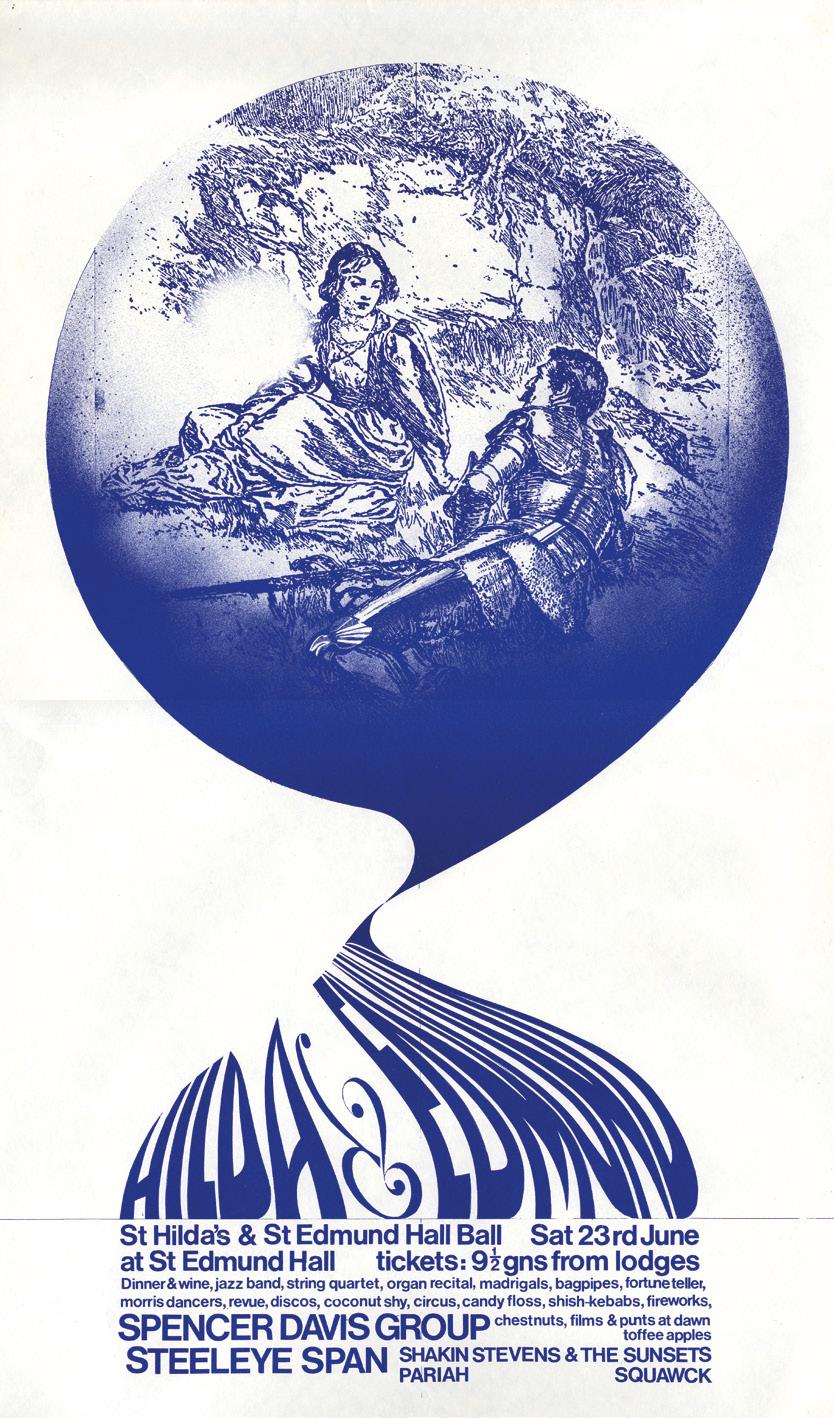
Why write a diary? For Samuel Pepys, the greatest of all diarists, the motive is summed up in the title of Claire Tomalin’s biography: The Unequalled Self – the desire to examine his own life in all its aspects, without constraint. But Pepys also wanted to chronicle the extraordinary events in which he played a significant part.
That too propelled the pugnacious Chief of the Imperial General Staff in World War II, Sir Alan Brooke, to set down secretly, late each night, a record of his battles with Churchill and the American high command as they sought victory.
My father, Vivian Ridler – for whom Teddy Hall was almost a second home after
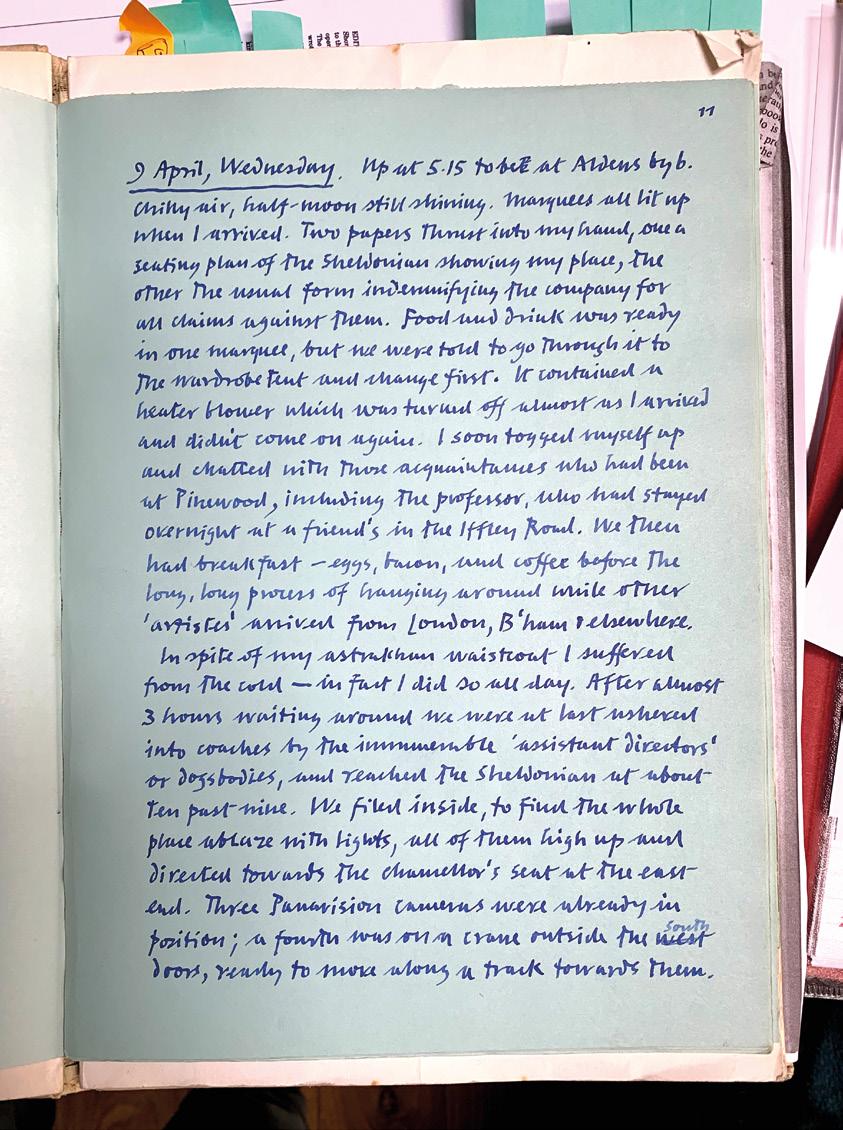
he became a Professorial Fellow in the 1960s – likewise wrote various diaries throughout his life: holiday diaries, a diary of a two-month business trip to the USA in 1951, and the three diaries that my brother Ben Ridler and I have now published in the last three years.
His motives for doing so were perhaps less the desire for self-reflection (he advised against too much ‘navel-gazing’), and more a way of expressing his enthusiasm for life in general, and interest in events as he experienced them. It gives enormous pleasure for us now to read his diaries and wartime letters to his wife, the poet Anne Ridler, where his wit and skill with words shines through. How curious, then, that he should have been so diffident about his

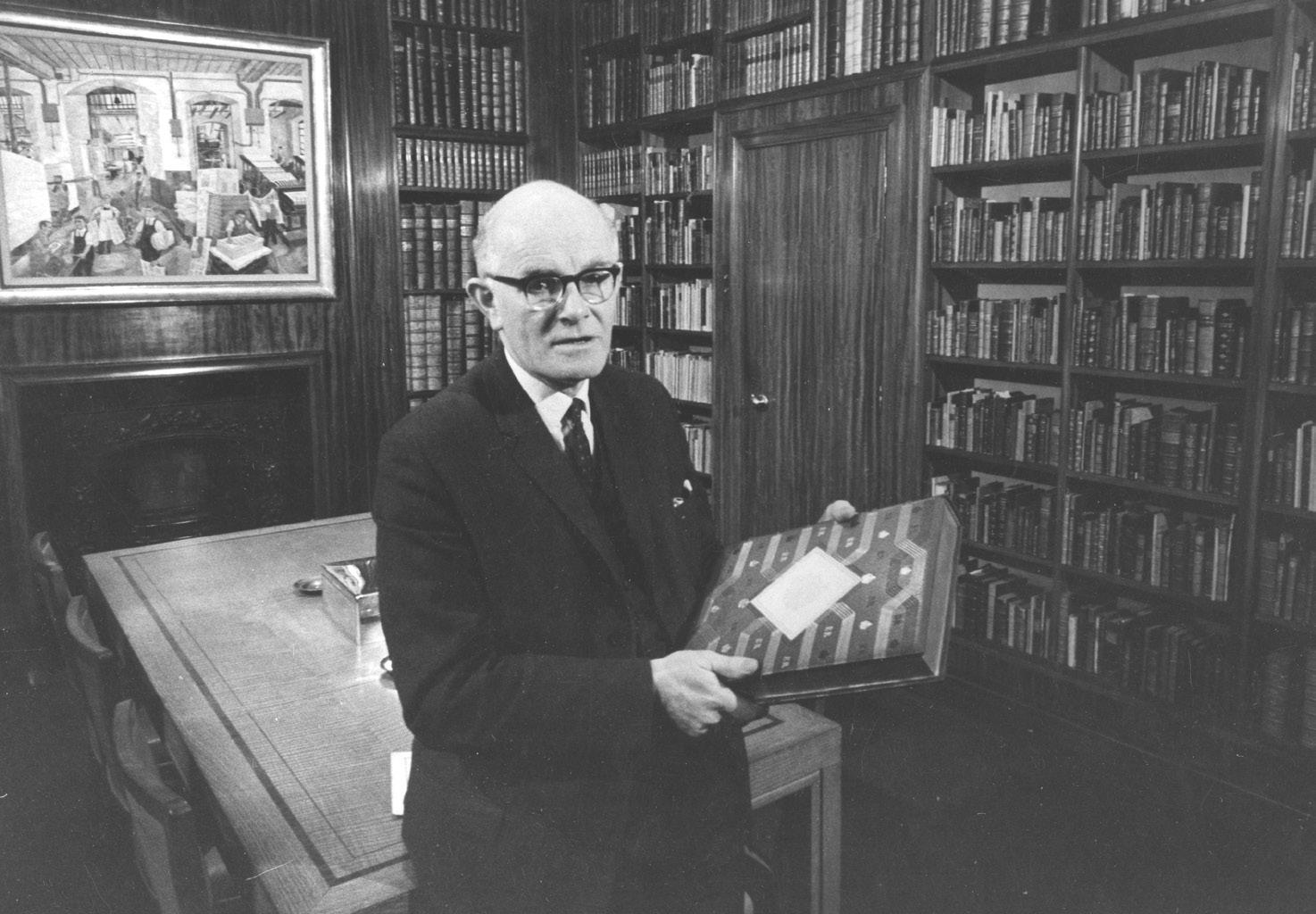
literary abilities, or to find him claiming late in life “for some reason I can’t write books”. Ben and I wanted to show that, on the contrary, he did write books – in the form of the major diaries.
The earliest diary, dating from 1943, records in pencil in a tiny notebook his day-by-day experiences during that year of serving as a wireless operator for the RAF in Nigeria. Set beside the critical decisions being made about grand strategy by Brooke and others, Vivian’s account might seem trivial. Yet, not only does this bottom-up perspective give us a real sense of the fog of war, and the challenges of working in the tropical heat, it also draws attention to the crucial and recently neglected aspect of air supply to the North African front. Without the 5,300 fighters and bombers eventually brought via Ghana and Nigeria up to Cairo by mid-1943, the Allies would have lost the Desert War, and quite possibly World War II itself. That seemed reason enough
for us to publish what we have called War Diary of an Airman (The Perpetua Press, 2024).
It cannot be denied, however, that initially we had misgivings: would Vivian have wanted his frank remarks – written in difficult circumstances (he was sent to hospital twice with bad malaria) and as a young man of 30 – to be disseminated to a wider public? At that time Nigeria was part of Britain’s worldwide empire. Today attitudes to that imperial project divide the generations. I was keen therefore for my 32-year-old daughter to read some of the entries, to give me her perspective.
As a result, and on reflection with my brother, we decided judiciously to alter some of the phrases here and there –terms used ubiquitously in the Services at that time, but which my father would certainly not have wanted linked to his name today. I was reassured, in any case, to find in one of his letters home, which we
print in the book, the following sentence: “I know we are supposed to have all the right answers, but surely colonizing from the Phoenicians onward is fundamentally selfish.”
Here, perhaps, was no arrogant imperialist but a thoughtful and curious observer of the world as he found it. Perhaps also, part of the value of having a historical record like this is to give us an insight into the contemporary mindset.
A diarist’s intended ‘voice’ can also be ‘misheard’, by which I mean misinterpreted. I say this after being brought up short by the complete misreading of my father’s character and management style in a review by an economist of Diary of a Master Printer (The Perpetua Press, 2022), the first of Vivian’s diaries that Ben and I published. An invaluable record of a crucial year at the Oxford University Press (OUP) Printing House, which Vivian ran for 20 years, the book was widely praised as a “classic of printer’s lore” where “Ridler comes across as a warm man of principle with a strong empathy with those around him”. Yet the critical reviewer – clearly with a tin ear for the humour apparent throughout the diary – misreads as contempt Vivian’s dealings with the main union leader, when exasperation and at one point amused astonishment were evidently his true feelings.
This diary of 1970–71 is of a very different kind from the war diary: written each evening after the day’s work in Vivian’s beautiful italic script, it is consciously composed with an eye to posterity –notwithstanding his failure to deposit a copy with the University Press itself. For the Printer, as he was officially known, recognised that these were revolutionary times at the Press and for book publishing and printing generally.
An economic crisis, union unrest and above all sweeping technological changes meant key decisions had to be made by him and his publishing colleagues in order to try to adapt. Pepys-like, he chronicles the deeds, misdeeds and human foibles of all whom he encounters, from the maddeningly indecisive London Publisher and young computer whizzkids to the compositors, machine-minders, designers, proofreaders, bookbinders and many others who make up his 900 employees. Leading figures visit him, from the bibliophile Sir Geoffrey Keynes to the editor of The Waste Land, Valerie Eliot, who insists he is the only printer she trusts to produce the facsimile of her late husband’s poetic masterpiece.
For the Editor of the Master Printer diary, the large roster of dramatis personae required brief biographical notes to be added (not simply regarding Press employees: who now for instance will understand a reference to the oncenotorious union bosses Hugh Scanlon and Jack Jones?); while the Byzantine complexity of OUP’s structure at the time and its history meant a substantial introduction needed to be written.
Martin Maw, OUP’s endlessly helpful Archivist, kindly read through the entire typescript, rightly requesting we remove or adjust certain passages where Vivian’s remarks might cause offence or embarrassment to one or two former employees still living. Hugo Brunner, Vivian’s partner in crime at their little Perpetua Press and an eminent former publisher at OUP and Chatto, likewise spotted some errors.
Then for us as publishers of the diary, Ben and I felt acutely our responsibility to produce as fine an example of bookmaking as we were capable, in recognition of the high standards of craftsmanship achieved
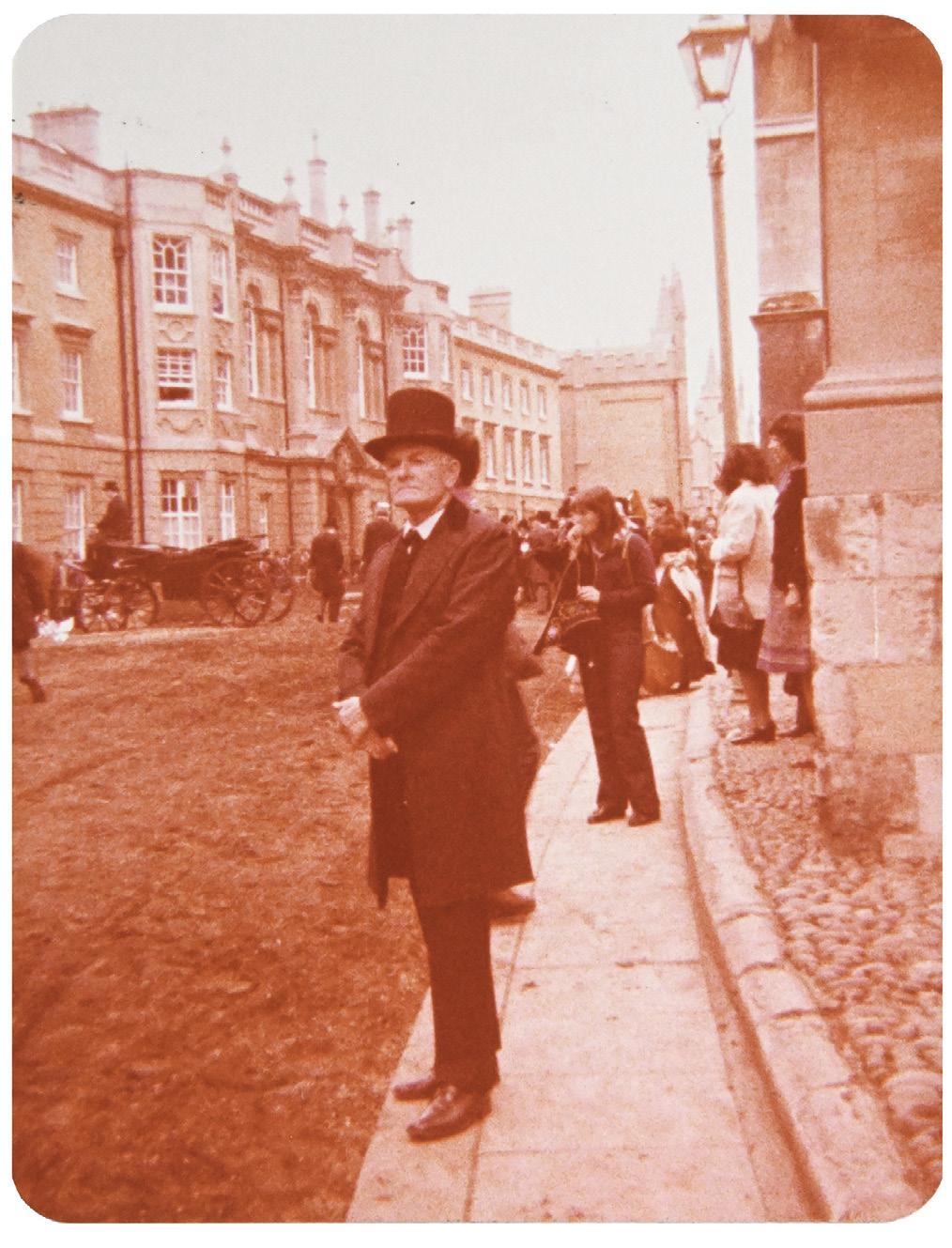
by our father, both at OUP and in his private press work.
Here we were lucky that we could call upon the talents of my former colleagues at Thames & Hudson, Karin Fremer and Susanna Ingram. Part of the joy of independent publishing has been the fun of batting design ideas back and forth with Karin (without the interference of committees!) and learning new production techniques from Susanna (I had never heard of the four-colour process called 4C neutral, which enhanced our monochrome plates to a richer black than usually seen).
John Randle, famed for his superlative limited editions at the Whittington Press, gave his seal of approval to the whole
project by adding a generous foreword about his encounters with Vivian when a young man. Finally, Gomer Press in Wales printed the book superbly, using lithographic printing and a properly sewn binding of 16-page sections (most books today sadly have the highly imperfect ‘perfect’ binding, where individual pages are merely glued into the spine, meaning the book will never lie properly flat when opened and pages easily fall out).
Two years after he retired in 1978, Vivian unexpectedly found he could indulge his main hobby as a film buff. The prologue of a Hollywood blockbuster, Heaven’s Gate, was about to be filmed in Oxford (standing in for Harvard, 1870). Extras were needed; Vivian enthusiastically signed up. Suitably kitted out at Pinewood Studios as a Harvard Elder, he spent a cold but happy week observing and participating in the shoot, as the director Michael Cimino filmed endless takes and retakes in the Sheldonian and elsewhere. A highly accomplished amateur filmmaker himself, Vivian made expert notes and sketches of camera placements and wrote an amusing short diary.
After the movie proved a disastrous and notorious flop, he pasted the diary into a book dummy alongside all manner of
press cuttings, titling the volume Heaven’s Gate: The Diary of an Extra – The Greatest Disaster in Movie History. It was obvious to use the main title for our Perpetua Press printed version (2023). Less obvious was how to broaden the appeal of this slim volume beyond Oxford. I decided to expand the account by recounting the full plot, adding reactions of the main stars and film critics to the movie, and including lavish illustrations in colour that for the first time did justice to the visual drama of Cimino’s epic Western – regarded today by many as a masterpiece. It also gave me the opportunity to list at the back all 140 of Vivian’s own 8mm films – a considerable exercise since it meant piecing together from scattered notebooks and surviving film reels the contents and chronological order of each one.
Again, we were lucky to find just the right person to write a foreword: Nicolas Kent, today the head of Oxford Films, successful maker of documentaries, but back in 1980, like Vivian, an extra on Heaven’s Gate. Although the published book has hardly been a bestseller, Ben and I are chuffed that Tom Stoppard – renowned film scriptwriter as well as playwright –ordered a copy, later telling us “I have started by reading up Vivian’s filmography! My respect to him.” With this, and the very many other warm reactions we have received to all three books and what Vivian achieved, we feel our main purpose in issuing the diaries has been fulfilled.
Colin Ridler
War Diary of an Airman is reviewed on pp. 201–202.

by Sherry Da
Teddy Hall postgraduate Sherry Da (2023, MSc Water Science, Policy and Management) attended the sixth session of the United Nations Environment Assembly (UNEA-6) from 26 February to 1 March 2024 in Nairobi, Kenya, funded by the College’s Keith Gull Fund. This fund is used to support current students who undertake special projects such as charitable work, choral and drama tours, travel for unusual academic opportunities and to assist others.
It was another typical week at Oxford where I juggled classes, prepared my dissertation research, rushed to seminars, donned formal wear for dinners, and squeezed in improv practice. As I checked my morning emails, I was greeted with a surprise – a confirmation to attend the United Nations Environment Programme (UNEP) Environmental Assembly as a youth delegate. My initial reaction was shock and delight at having been selected out of thousands of applicants. However, that quickly gave way to the reality that I needed to secure funding, book flights to Kenya, and coordinate my schedule to allow a week-long absence in the middle of Hilary term – aptly nicknamed ‘Hellary’ term by my fellow Oxonians. Thanks to Teddy Hall’s Keith Gull Prize and the support of my friends, professors, and Kenyan classmates, I flew to Nairobi, where warm tropical weather awaited me and countless diplomats filled the United Nations Compound on the outskirts.
I attended the UNEA-6 from 22 February to 1 March. I was one of many youth delegates selected by the Children and Youth Major Group (CYMG) to convene, organise, and advocate for better international climate policies. The UNON
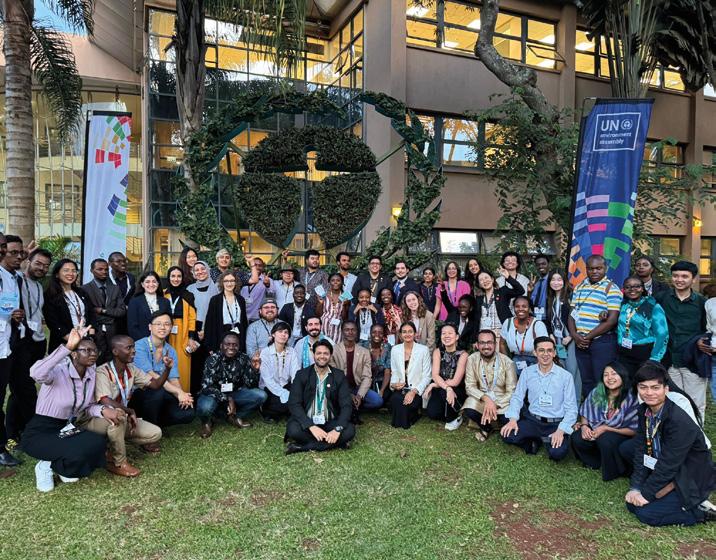
(United Nations Office at Nairobi) complex was a swirl of activity and knowledge exchange. There were keynote talks on decarbonisation, implementation strategies and global funding, lunchtime informal discussions, countless concurrent sessions, and even a music video shoot! I was quickly overwhelmed and overheated in the energised atmosphere, wanting to make the best use of my time.
As a conference attendee, I gained exclusive access to closed-door negotiation rooms, where I watched representatives from member states debate every phrase, word, and comma of each resolution to be finalised by the end of the week. While the public may hear about the highlights of the negotiations or read the final resolutions in one of the six official UN languages, I witnessed delegations diplomatically present their respective national policies during the increasingly intense negotiations. Many of the youth delegates diligently tracked the negotiations and put forth interventions, when possible, to ensure that the youth voice was heard and to keep member states accountable for our future.
I’m reading for the MSc in Water Science,

Policy, and Management at the School of Geography and Environment, so I closely followed the resolution on water. It was incredibly fascinating to see how the case studies I have learned about in class came to life in real-time negotiations. Despite water being the most used resource on the planet, the urgency to protect water resources was not reflected in the final resolutions. The resolution on water was barely able to surpass the UNEA-3 resolution in 2017, as negotiators debated nuances of words and the concerns of their countries while covered in a thin veil of sweat in Nairobi’s 30-degree February weather.
The youth constituency felt the urgency throughout the conference. Hailing from countries all around the world, we have experienced and witnessed the results of climate change through natural disasters, pollution, and scarcity in our respective countries. Participating in international negotiations was one form of formal participation, but we felt like we were being let down by the modest, incremental promises to change.
However, there is nowhere else you can witness small island countries, indigenous
communities, oil-producing countries, academics, and business representatives participate in the same forum. Despite the slow-moving progress of the resolution negotiations, member state representatives continued discussions into the early hours of the morning to find global compromise points on pressing environmental challenges. Although the final resolutions fell short of the hopes of CYMG, it is another reminder that the international community can work together to continually protect the environment.

Somehow, amidst this overpacked week, the youth delegates celebrated a birthday, endured power outages after a rainstorm, and shopped for souvenirs at Maasai markets. I even had the opportunity to go on a safari with a previous Intergovernmental Panel on Climate Change Vice Chair the day after the conference ended!
Returning from Nairobi, I felt renewed in my commitment to advance water and global equity. It was really inspiring to witness the global conversation and see how many people are working towards a similar goal, but also sobering to see how much more we must do to confront the climate crisis. This experience has given me a lot to think about how my current studies align with international goals and what roles I can play in the future.
Water only made it to the formal global COP agenda in December 2023 and UNEA-6 failed to deliver on more promising targets. While we await better policies and international commitments, many parts of the world are facing water stress, and billions lack consistent access to well-managed water. Water is vital to our health and livelihoods, and it is crucial to sustain healthy ecosystems. Globally, around 70% of water is used for agricultural purposes and over 2.2 billion people still lack access to safely managed drinking water. The scarcity of water

resources has been gaining attention globally and it gives me hope that we can live in a future with well-managed water resources.
It was such an honour to participate in UNEA-6 and meet fellow youth delegates who were passionate about climate change and making a difference internationally. I feel inspired and humbled by my time in Nairobi witnessing change in real time, connecting with dedicated and engaged youth from around the world who shared similar experiences and frustrations, and remembering the privilege that my background and education offer me. I hope to use my new degree and past experiences to contribute to the global conversation and implement meaningful change in the near future.
Sherry Da (2023, MSc Water Science, Policy and Management)
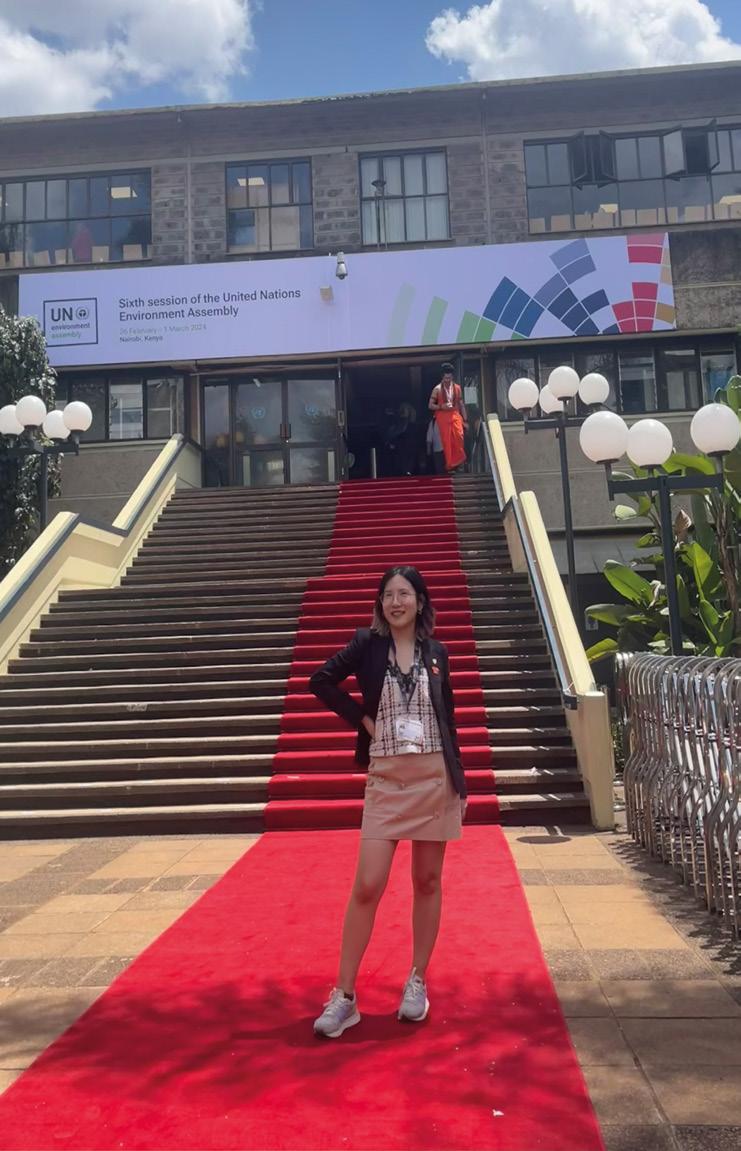
How a love of orienteering accompanied Aularian David Rosen to Oxford and beyond.
I was not particularly talented at sport, and never had the skills required to be good at any ball games. Nevertheless, I found that I enjoyed running and was a regular member of the school crosscountry team, though rarely one of the scoring six. I joined Shaftesbury Harriers, the club of noted long distance runners Dave Bedford and Julian Goater (another SEH alumnus – 1972, PPE).
In 1969, I discovered orienteering. At that stage it had only been going in Britain for about four years, having developed in Scandinavia.
Orienteering is a sport which involves both running and thinking; I quickly realised that this was the sport for me. Orienteering events at that time took place mainly in forests, so reaching the venue without a car required some ingenuity –often a combination of public transport and walking. Once I joined the local Hertfordshire orienteering club Happy Herts, I was sometimes able to get a lift. Quite soon after that, my younger brother and my parents took up the sport, so we were able to travel together.
In 1972, I started a Maths degree at the Hall under the tutorship of Dr Peter Collins. The University club was already well-established. In my second year, I took over as Captain. An important job for the Captain was to organise transport to the events. We had no access to a minibus, so I liaised with the local club, Thames Valley Orienteering Club (TVOC), and their members were kindly willing to come to the gates of Trinity early on a Sunday morning to fill up their cars.
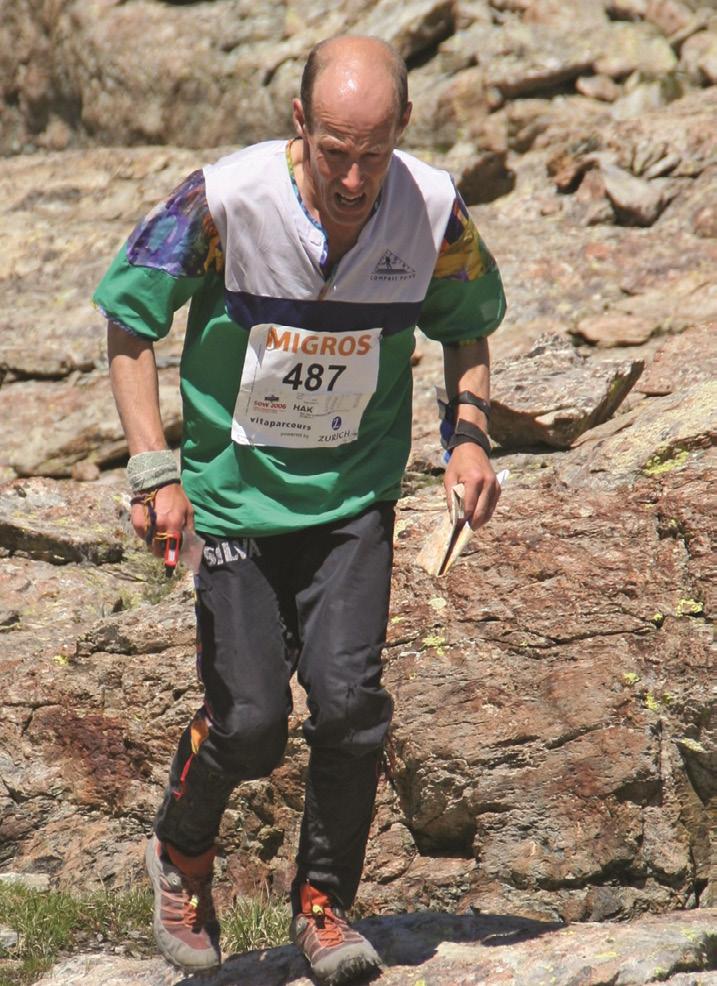
At a mid-week night orienteering event at Brill Common, I approached Miriam, a TVOC member, about a lift for the following Sunday; we’ve now been married for 48 years.
Orienteering was, and remains, a sport that is largely organised by active competitors. It is expected that you’ll help out when your own club is staging an orienteering competition. Because the competitors start at minute intervals over a two-hour time period, it is usually possible to help even when competing yourself.
The Oxford University club was very active. In 1974, we organised the British Universities (BUSF) Championships at Woburn Sands and Burnham Beeches. Our competitive highlights came in 1975 when we won both the British Universities Relay and later that year the (open) British Championship Relay.
In 1975, I went onto Imperial College London to study for an Astronomy PhD. London University had an active orienteering club and I started up a club at Imperial too. I was a member of the British team, competing both at home and abroad. Many of the important events were in Norway or Sweden which, at that time, required an overnight ferry across the North Sea to get there.
In 1998, I organised a round of the Orienteering World Cup in the Lake District and that marked the start of my involvement with the International Orienteering Federation (IOF). Currently I am Chair of the IOF Rules Commission which administers the rules for the four IOF Disciplines: Foot Orienteering, Mountain Bike Orienteering, Ski Orienteering and Trail Orienteering (designed for disabled competitors). In 2012, I was the Senior Event Adviser for the World Orienteering Championships in Lausanne and in 2024, I’m one of the two Referees at the World Orienteering Championships in Edinburgh.
In Britain, I’m a Grade A Controller, meaning that I am often asked to be responsible for quality control at our most important competitions. In February 2024, I was the Controller of the British Night Orienteering Championships in the Lake District. Navigating in the dark is especially challenging, even though competitors wear powerful headlights.
In addition to my involvement with the IOF, I’m currently a board member of British Orienteering. And from 2013 to 2022, I was Chair of London Orienteering Klubb. Miriam and I have a flat in London and a house in Lancaster so we spend time in both places.
As well as orienteering, I continued with my cross-country running and was Secretary of the Oxford University club as
an undergraduate. After leaving university, I became a member of Thames Hare & Hounds. Thames Hare & Hounds is the oldest cross-country running club in the country and organises the cross-country Varsity match. When I joined it was an allmale club, but it became mixed not long after I proposed at the 1979 AGM that women be admitted.
Through my orienteering friends, I also enjoyed other forms of running. Miriam and I regularly took part in Long Distance Walkers Association (LDWA) events and in 1974, I was first finisher in the inaugural LDWA 100-mile event along the South Downs Way from Winchester to Brighton, taking 22 hours 20 minutes. Also on the road, I have run many marathons, with a best time of 2 hours 34 minutes in the 1988 London Marathon, and completed the London to Brighton road race every year from 1975 to 1996, with a best position of eighth in 1988. I’ve also run many fell races, preferring the longer navigational-type ones. I’ve completed 41 Lake District Mountain Trials and very many two-day mountain marathons.
One of the great attractions of orienteering is the variety of terrains that one experiences. Miriam and I take part in competitions all over the world. Nowadays orienteering takes place in urban environments as well as in forests and wilderness areas. Multi-day events are popular over the summer months with five or six races over a week. Each race only takes an hour or so, leaving plenty of time for relaxing in between. One day you might be running through the streets and alleyways of an old town, the next you are clambering over rocks, fording streams and negotiating fallen trees in a tough forest.
In 2023, we went to the Caribbean for a cruise on a tall sailing ship. Nearly all
the passengers were orienteers and at each island we would run an orienteering race as soon as we disembarked, before having time in the rest of the day for more leisurely activities.
From the ages of 10 to 20, orienteering competitors are categorised in two-year age classes. From 35 upwards, there are five-year age categories. At any orienteering event, there will be a range of courses with different course lengths for the various age categories. That means that orienteering remains an attractive sport well into old age; many of those who were orienteering in the 1970s with me are still competing in the 70- and 75-year categories.
Although recognisably the same sport as when I began, new technology has been incorporated to make improvements. Whereas we used to record that we’d found a checkpoint with a pin-punch, now we carry an electronic chip which picks
up and records a ‘punch’ when you are very close to the checkpoint. Then, at the finish, you get an immediate print-out with your overall time and split times. In 1969, we used black and white photocopies of 1:25,000 scale Ordnance Survey maps. Today the maps are specially surveyed based on Lidar information and are generally at 1:10,000 or 1:7,500. Many people carry a GPS watch to record their track and analyse it afterwards, but you are not allowed to use it for location while competing.
I’ve now got metal knee joints which limits my speed over the ground. But I can often finish ahead of faster runners by fast and accurate navigation. I’m glad I discovered orienteering which has given me a huge amount of enjoyment over the last 55 years, and I hope will continue to do so for some years yet.
David Rosen (1972, Mathematics)
The Aularian Prize is awarded annually by the St Edmund Hall Association for an exceptional enterprise or voluntary commitment in an activity which falls outside of established College or University pursuits. Here, 2023 MCR prize winner Alexander Nowak (MSc Major Programme Management) reflects on his experiences volunteering at an orphanage in India.
One of the criteria for The Aularian Prize is that it should support a “voluntary commitment in an activity which... has a clear community benefit.” My aim in fulfilling this was to provide support, particularly with schoolwork and community-building, for 25 orphans at the
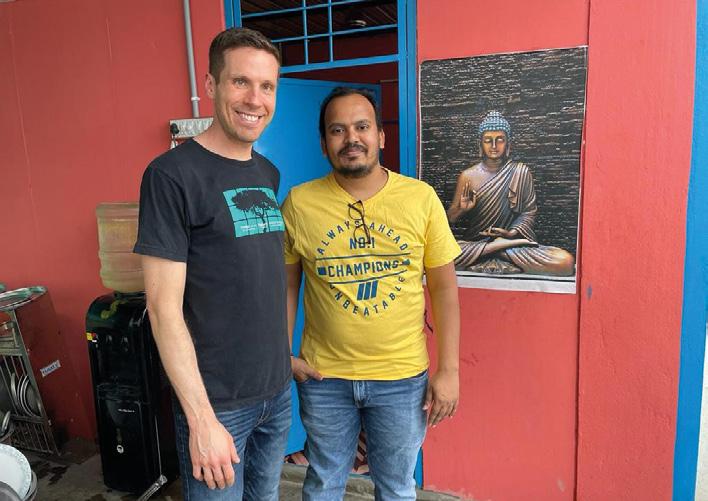
What it ended up being was an emotional rollercoaster. The experience was wrought from moments of joy interspersed with some bitter, sad realities that even a
veteran volunteer wasn’t fully prepared for… It made an impact that will last a lifetime.
I’ve witnessed poor living conditions before, seen malnourished and sick children and adults firsthand, and helped the incredible, selfless volunteers performing literally life-changing work on a daily basis. That said, there was something different about the orphans at the Sri Adharsha Foundation that made this endeavour particularly challenging. Until now, I couldn’t put my finger on it although it seems patently obvious looking back: it was the contrasting expressions of hope and resignation in the faces of the children.
While the younger children were generally most hopeful, likely due to a habituation of the context and being unaware of their long-term plights, it was in the older children, the teenagers, where resignation was most prevalent. At their ages, after many years of jumping from household, to bunk room, to the streets, to community living and over again, their odds of being adopted are virtually nil. Without official residences and guardians, they are also cut off de facto from a number of government-offered support programmes.
Nevertheless, they soldier on…and I do not use that term lightly. They embody what it means to endure and persevere amidst daunting, if not impossible, challenges.
How so, you ask? Up by 6:00am, all 25 children (aged 5 through 15) are washed, dressed, and ready for a very simple breakfast of rice and curd, or sometimes dahl, at 6:30am. By 7:00am, they are meeting with tutors for a half hour or so until they are off to school, which runs from 8:00am to 5:00pm. After that, it’s
rotating turns with tutors again for three hours before a light dinner and relaxing before their 9:00pm ‘lights out’ time. This timetable runs six, not five, days a week.
The area I thought I could best help with was the tutoring, which focused on language development skills. Despite English being the ‘universal’ second language that unites much of India, only those orphans who had finished primary school were able to have easy conversations. If anything, it wasn’t my wholly inadequate teaching that proved welcome, but my mere company for most.
The ties that bind
I went in thinking my tutoring would focus on the children’s schoolwork. Instead, it was essentially me answering a hundred questions about Canada, the UK, and what people thought of India. The questions asked were as varied as you can imagine. What is life in the UK like? What is your favourite Indian food? Do Canadians live in igloos?
One particularly fun conversation was with Amit, a seven-year-old who asked what sports we play in Canada. I explained that hockey is by far the most popular, but we play ice hockey and refer to it as simply ‘hockey.’ I explained how the game was played, with players donning skates on ice and wearing lots of equipment. The follow-up question came quickly: “Do you play cricket in Canada?” I answered, “Not really…” and was then floored by Amit’s ingenuity. He sat there for a few seconds, clearly thinking this through, and asked, “So then you play ice cricket?” I couldn’t help but share a chuckle with him (and got to thinking “you know, that’s not such a bad idea!”).
Unsurprisingly, these were the moments that were most memorable and, I suspect, impactful for the children. Bonding
across cultures over shared interests and phenomena proved just how small our large world truly is.
Having done some volunteering and work with communities in need in many diverse settings, including developing countries, I came into this experience with certain expectations and assumptions. What the organisation’s needs would be, what the systemic issues were, and what would be viable avenues to make positive change.
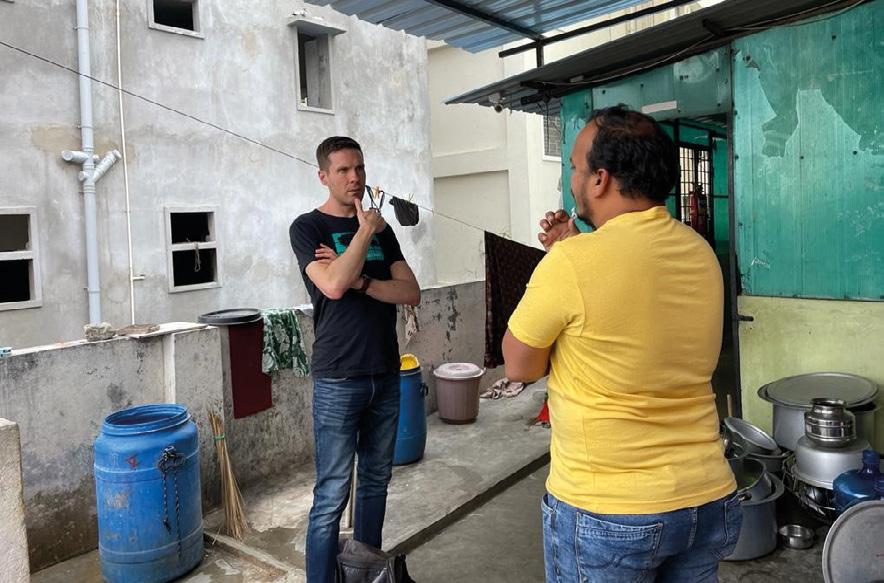
Speaking with Pradeep, one of the volunteers, threw some of my assumptions for a loop. For example, the type of support most needed wasn’t volunteers, clothing, or even food – it was school tuition fees. Of course, support in those other areas is welcomed with open arms and warm hearts, but members of the community have banded together to ensure a basic level of provision is assured.
Administratively, Pradeep spoke of extended delays and wait times in securing official registration for orphanage/charity statuses and, correspondingly, greater access to support and services. He told me it can take a minimum of three years for an orphanage to be registered, which limits its
fundraising and support sourcing, all while still being fully operational. This operating, of course, is purely the result of a dozen rotating volunteers and caretakers. There are thousands of such unofficial, community-led programmes across the world. However, those I’ve become familiar with are typically in more rural settings where sustainable infrastructure is lacking. That the Foundation had to wait three years for official status, despite operating out of a well-maintained twostorey building in central Hyderabad, was as equally dumbfounding as it was disappointing.
There are many challenges facing the underprivileged; I only hope as India’s prosperity continues to grow, supporting community organisations like Sri Adharsha is one challenge that won’t fall by the wayside.
‘Holi’ special, indeed
Shifting gears for a moment, a wonderful side benefit to the timing of this endeavour was its coinciding with Holi, otherwise known as the Festival of Colours, Love, and Spring. It is a celebration of the eternal and divine love of the goddess Radha and god Krishna. It also signifies the triumph of good over evil.
Hyderabad, located in the southern part of India, is not the traditional birthplace of Holi (that would be Uttar Pradesh) but it is among the regions that celebrate it more emphatically. Dressing ideally in white(!), families and communities gather to spray, paint, and immerse themselves in the absolute brightest of colours – and after washing, enjoy some of the most amazing food you can imagine (including puran poli, dahi vada and gujia…oh my, the gujia…).
Of all the festivities I’ve been lucky to

celebrate, this one certainly ranks near the top. While we didn’t make it an all-day affair (which you certainly can as you adventure around town), starting the day off with this energising ‘paint bath’ is one experience I won’t soon forget.
In applying for and receiving The Aularian Prize, I did not have grand visions of world-changing impact, nor was I venturing blind into the realities and challenges volunteering at an orphanage would bring. That said, the degree to
which these manifested was wholly unexpected. I only hope my efforts lived up to the support offered by this prize.
I’m not sure how deeply the impact of my efforts were felt by children and volunteers at the Sri Adharsha Foundation, but I can certainly attest to the impact it had on me. For this, I will be eternally grateful to the incredible Aularian community at St Edmund Hall in their support of this endeavour. Thank you, all, many, many times over.
Alexander Nowak (2021, MSc Major Programme Management)
“Disce quasi semper victurus, vive quasi cras moriturus” – attributed to St Edmund of Abingdon.
“Study as if you were to live forever; live as if you were to die tomorrow.”
There have been three generations of the Coates family at Teddy Hall. Brian Coates matriculated in 1934 reading French and German. Howard Coates matriculated in
1966 reading Chemistry, staying on for his doctorate, completed in 1972. While I (Emily Coates) matriculated in 2000 to read Geography.
Flicking through family albums – which start from the mid-1920s – there are elements of the Hall which seem very familiar, some quite different. Of course, our treasured family records are a mere fraction of the rich history of St Edmund
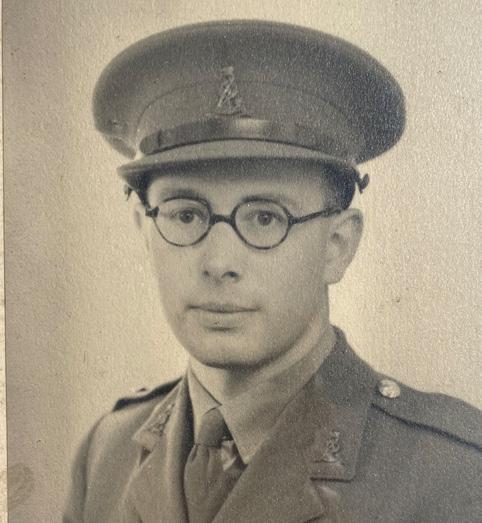
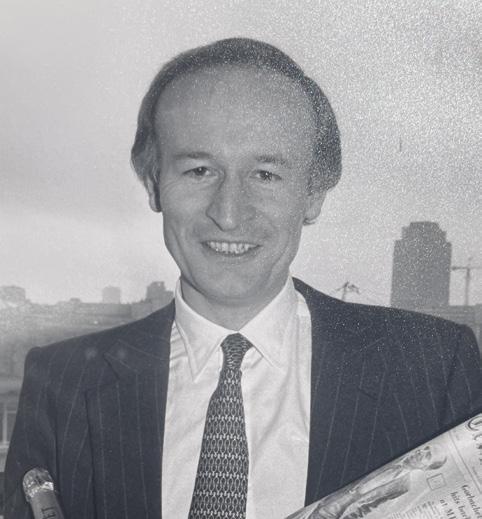
Hall, the earliest recorded reference to which was in 1317.
It may seem that not much changes in an Oxford college, but some significant developments for the better have happened during the time in which my family has been caught up in the life of the Hall and which I would like to celebrate here. The Hall has evolved into a bigger, more sustainable and more diverse College, its influence is broader and its presence greater both in physical scale and in its intellectual reach.
My grandfather attended Bradford Grammar, my father Heversham, also a Grammar School, and I attended a convent school – St Mary’s Ascot. I suspect the intake of students in the last 20 years has been from a broader and more diverse range of schools.
My grandfather, my father and I all made great and lasting friendships – and that is a key thread that runs through many accounts of the Hall as a place to study.
When my grandfather arrived at Teddy Hall in 1934, he was the first of his family to go to university. His father, my great-grandfather, worked in a bank “up north”. During his time in Hall, Brian took a full part in College life. He appears in the Magazine as President of the French Society (whose reports are printed in
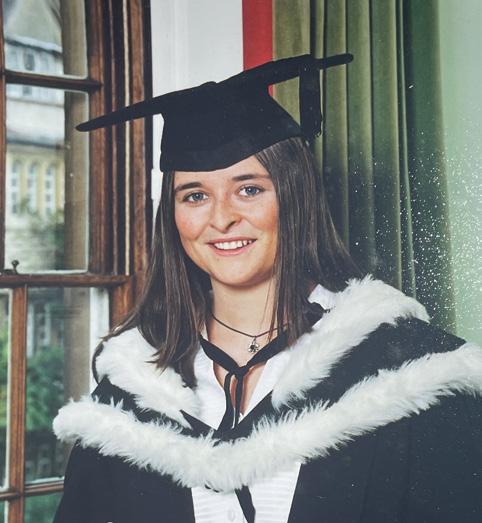
French!), a member of the College chess team and presenting a paper to the Essay Society entitled ‘The Play’s the Thing’ –“an engrossing attempt to interpret Faust in terms of… [Goethe’s] experience and beliefs”, it is reported.
Brian remained a stalwart attendee of Hall Reunions and Gaudies for 70 years, often alongside his son. He last came to the Summer Reunion in 2001, the year before he died.
In the photo below my father is seen in his gown wearing a white carnation, together with his tute partner Andrew Middleton (1966, Chemistry) – perhaps celebrating the end of an exam on the roof of a building near a ‘dreaming spire’. The other chemists in his year were Richard Baker, and Bob Brandwood, both good chaps too.

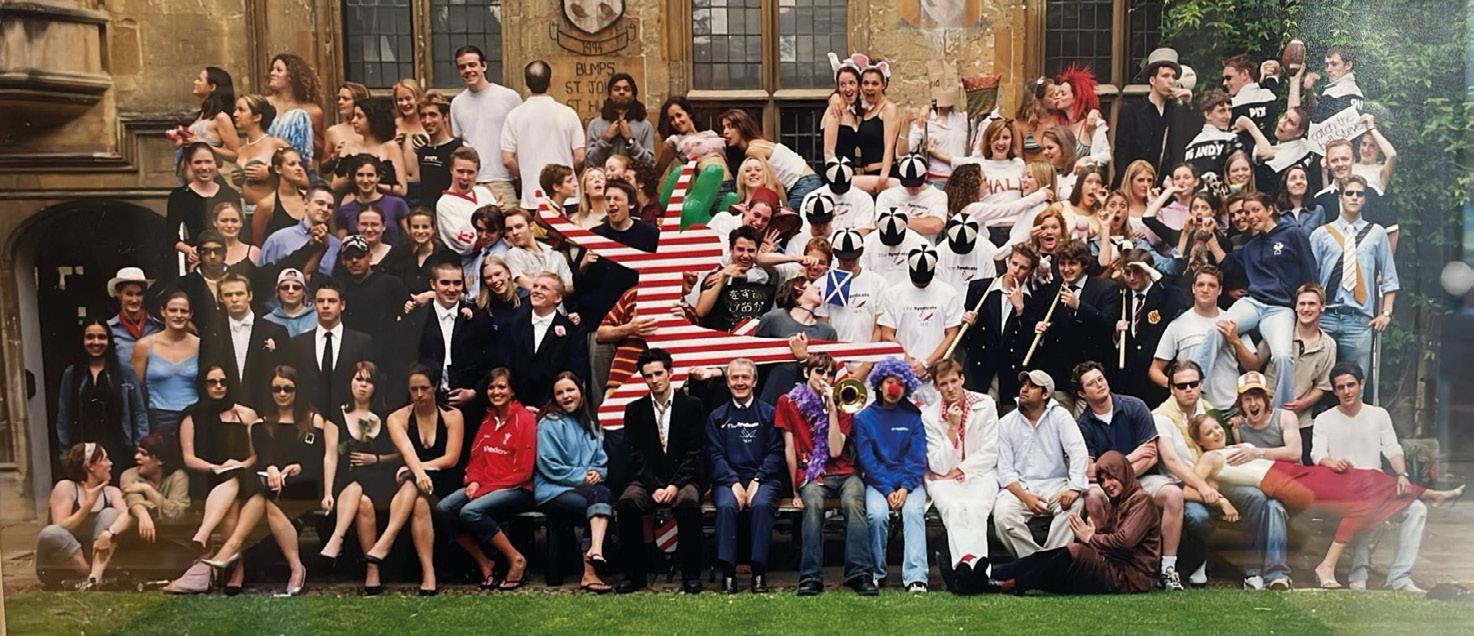
My buddies, many of whom appear in the photo above, include the JCR President of 2001–2 Ali Richardson (2000, History) and Hannah Murray (2000, Experimental Psychology). Hannah very sadly died last year, leaving a hole in our close friendship group. Also pictured are some fellow Geographers from my year, Emma Knox (née Taylor) and Philly Fine (née Browne); others who studied English, for example Harriet Hughes (née Hingerford), Caroline Holdsworth (née Boon) and Lizzie ScottBaumann (to name just a few); the linguist Emily Maclean (née Miller), a fantastic scholar and sportswoman; and finally another dear friend who passed away just a few years after we graduated, Kate Ashbridge (2000, Mathematics).
There were also some fantastic female tutors at Teddy Hall at the start of this millennium; in my subject, Dr Lorraine Wild, an Alumna (1982, Geography) and now Fellow by Special Election, and Dr Maria Kaika who was Tutor in Geography Both had an expert understanding in their respective areas, astute wit, and were an inspiration in their very different ways. I also remember really enjoying listening to Kathy Willis’ lectures in the School of Geography, particularly on the topic of biogeography – little dreaming that she would go on to become the first female

Principal of the Hall! The English Don Lucy Newlyn was also much respected as was my dear friend Hannah Murray’s Psychology tutor, Emeritus Professor Maryanne Martin
The Teddy Hall fame for sport and most particularly rugby seems also to be a recurrent theme in both my family’s and the College’s history. My grandfather and father both played. I, however, stuck to hockey, tennis and rowing, with the odd bit of cricket and footie thrown in for good measure.
The wonderful Teddy Hall colours of maroon and gold in sporting outfits were a great set of colours to don. Though in pictures of Dad and me rowing for the Hall we appear not to be in these. I was in a successful 3rd VIII: we picked up blades in 2001, and were photographed by a chap who put us into the sporting pages

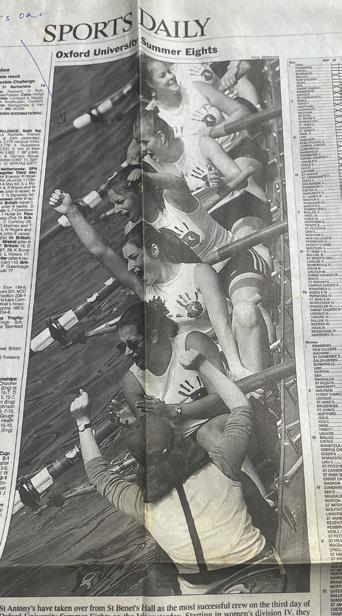
of The Times. Dad is pictured in white kit with dark socks in a boat which bumped in races but did not quite manage a blade. I’m not sure if Grandpa got in a Teddy Hall boat, but I feel sure that in his time he at least stepped foot in a punt!
My parents were in the era of the Rolling Stones playing at a ball in the mid-60s, which sounded ace. The Commemoration Balls were a blast in my time too, though. As, to some extent, was dolling up in various costumes for Oxford life. Through the ages, sub-fusc, gowns, hats and lapel flowers for exams and special occasions have remained a tradition.
It is nice to see hanging on the walls at home memories of Teddy Hall. A blade, an informal JCR picture from 2003, pictures of my father with his rugby team and Grandpa in his military finery all set for World War II, in which his study of languages – in particular German – aided him.


Brian travelled widely during the Second World War and he subsequently told stories of fighting in Egypt, meeting his wife in Jerusalem, and then living in Germany when the war was over. He was posted there to work as Headmaster of King Alfred School, Plön, in Schleswig-Holstein, which my father and uncle briefly attended. Afterwards, he was for many years Headmaster of Kirby Stevens Grammar School, retiring in 1987. There is a photo below of him presenting prizes to school children in which he looks distinguished in his long gown and happy for the success of his students. I, too, love travel, although I tend to like to avoid war zones!

My father progressed after his DPhil in Chemistry to working in the City of London, initially as an analyst working hard on researching pharmaceuticals and related investments at the stockbrokers de Zoete & Bevan, now part of Barclays International. He also developed a fondness for travel, adventure and mountain climbing whilst under the inspiring pupillage of Sir Brian Smith, a Chemistry Don at St Catz, who led him to North Wales in the ‘60s and ‘70s for some mega days out on cliff faces there. Today my father still works to keep his hand in the game in consultancy and finance at Lazard’s in London.
My time at the Hall also allowed my thirst for exploration to flourish, with an overseas field trip to Crete and long vacations in which to explore more widely. With Teddy Hall buddies, and thanks to the cheap flight revolution, I went around Europe, with various ski holidays in the Alps, and then further afield to the Caribbean.
I guess in some ways I have emulated both Brian and Howard. I left Teddy Hall to obtain a teaching qualification at the University of London and was a teacher in central London for six years. I loved the work (despite its seriously taxing moments) – teaching sport, prepping students for Oxbridge interviews, seeing some get in and fly through their time at university. I have been lucky enough to lead awesome far-flung field trips – to the Alps, the Himalayas and then the Arctic, to name a few.
After a run-in with a vicious and very hungry polar bear in Svalbard, I changed tack for a bit, following in my father’s steps in the City of London. I was recruited into PwC while I studied for my MSc at Imperial College London as an economist. I joined the Sustainability and Climate
Change team, which offered me some fascinating projects.
My father had picked up some prizes in his early days in the City and I did too, which was nice. However, after six years working in a high-rise on a modern development near Tower Bridge, I needed to change things up and to get back to some fresh air and wild environments. I set off for North Wales, to follow my father to rugged hills, crags and cliffs.
Here, I established Visit Wild Wales, Profiadwch Cymru Gwyllt (www.visitwildwales.co.uk/), in 2020, during the pandemic. The company provides sustainable access to the wilderness areas of Wales, allowing exploration and forging adventure and enlightenment. Green therapy, you might say, with a focus on sustainability in the broadest sense of the word. I teach geography, guide trips and lead adventurous explorations in all seasons.
If anyone would like a guided tour into the high hills or coastal paths and cliffs of Wales, whether for ornithology (especially chough spotting!) or geeking out over geology, do let me know. The biogeography of the area is very interesting. Please also reach out if you’d like a natter about the great days that we spent under the roofs of the Quad staircases, in the Library, or in Kelly and Emden.
Instagram: @visitwildwales; Facebook: @emilycoates; LinkedIn: @emilycoates.
Emily Coates (2000, Geography)
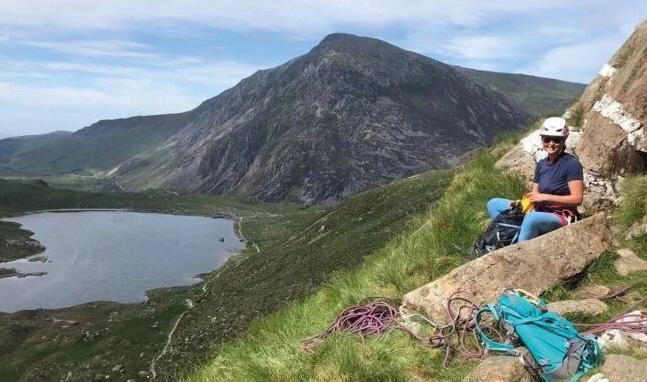
Reggie Alton in the Porter’s Lodge a shrewd and courteous don, on watch beside the pigeonholes –head bowed, his hair all gone,
who welcomed women long before the other Fellows did: a learned palaeographer, his subtle schemes well hid.
Bruce Mitchell in the Buttery, awake since five o’clock, absorbed in Anglo Saxon, reliable as rock –
his Aussie voice and bonhomie much valued for the cheer they added to his candour when quaffing wholesome beer.
Graham Midgley in the Chapel, dog-collared, dignified –his thirty years at Teddy Hall a source of joy and pride,
who didn’t want us women there and fought to keep us out –but learned to like our presence and our ever-growing clout.

These dons were ‘the triumvirate’ who served their College well in teaching and in scholarship –with souls they’d never sell.
Their fame spread far, across the years, a team who worked together to teach a love of literature they hoped would last forever.
They quarrelled about this and that as colleagues often do; but never lost their comradeship, affectionate and true.
Then one by one these College men, all nearly the same age, passed on – to leave us grieving as we turned a blank new page.
We’d scrawl on it, we’d try our best to fill the gaps they left. But no, their like won’t come again. They died. We are bereft.
I look back on my years with them as golden ones, long gone. I learnt from them, I taught with them, I carry their torch on.
Lucy Newlyn, Emeritus Fellow
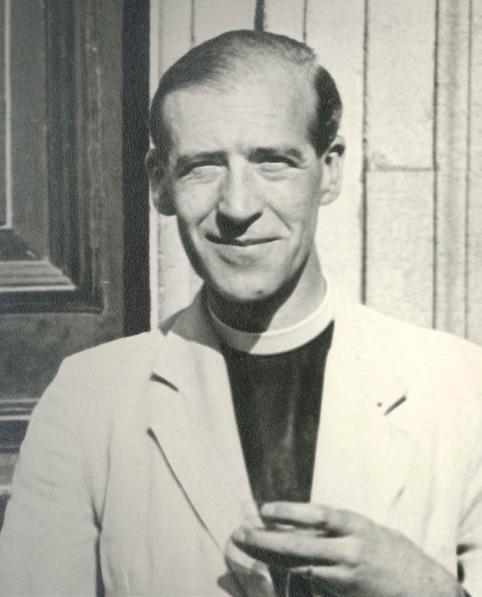

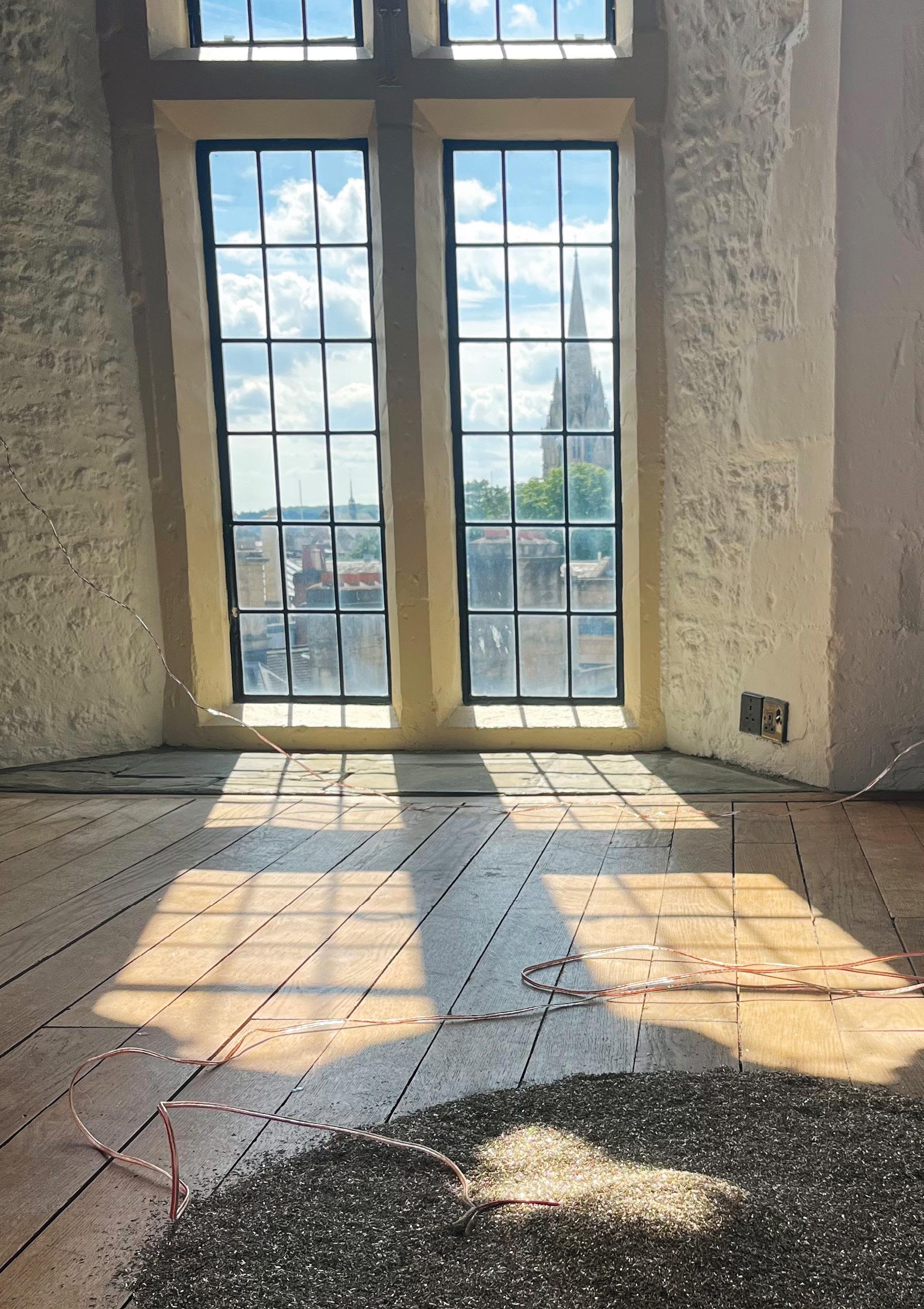
Following her popular recipe for pumpkin pie last year, we asked the Hall’s Pastry Chef Donatella to provide some festive ideas to be made after the Magazine hits our readers’ doormats.
I’m sentimentally very attached to this recipe as I baked it for the first time for a Christmas pop-up shop with one of my best friends at the Covered Market in Oxford a few years ago. It makes about 45 stars.
Ingredients:
• 100g ground hazelnuts
• 150g ground almonds
• 2 egg whites
• 200g icing sugar (sifted)
• 2 tsp ground cinnamon
• 1 tsp ginger
• ½ tsp nutmeg
• Pinch of salt
• Grated zest of 1 lemon and 1 orange
Method:
Separate the egg yolks and whites. Beat the egg whites in a bowl until they hold soft peaks.
Add the icing sugar and beat until nice and glossy.
Spoon out 100g of the mixture to use as a glaze.
Mix all the other ingredients with the leftover egg and sugar mixture to make a stiff, sticky dough.
Roll out 5mm thick – this is easier with the dough placed between two sheets of parchment paper.
Dip a star-shaped cutter in icing sugar and cut the stars. Paint a thin layer of the glaze on each star.
Bake at 130°C for 10 to 15 minutes until the biscuit is firm and the glaze is set but not yet brown.
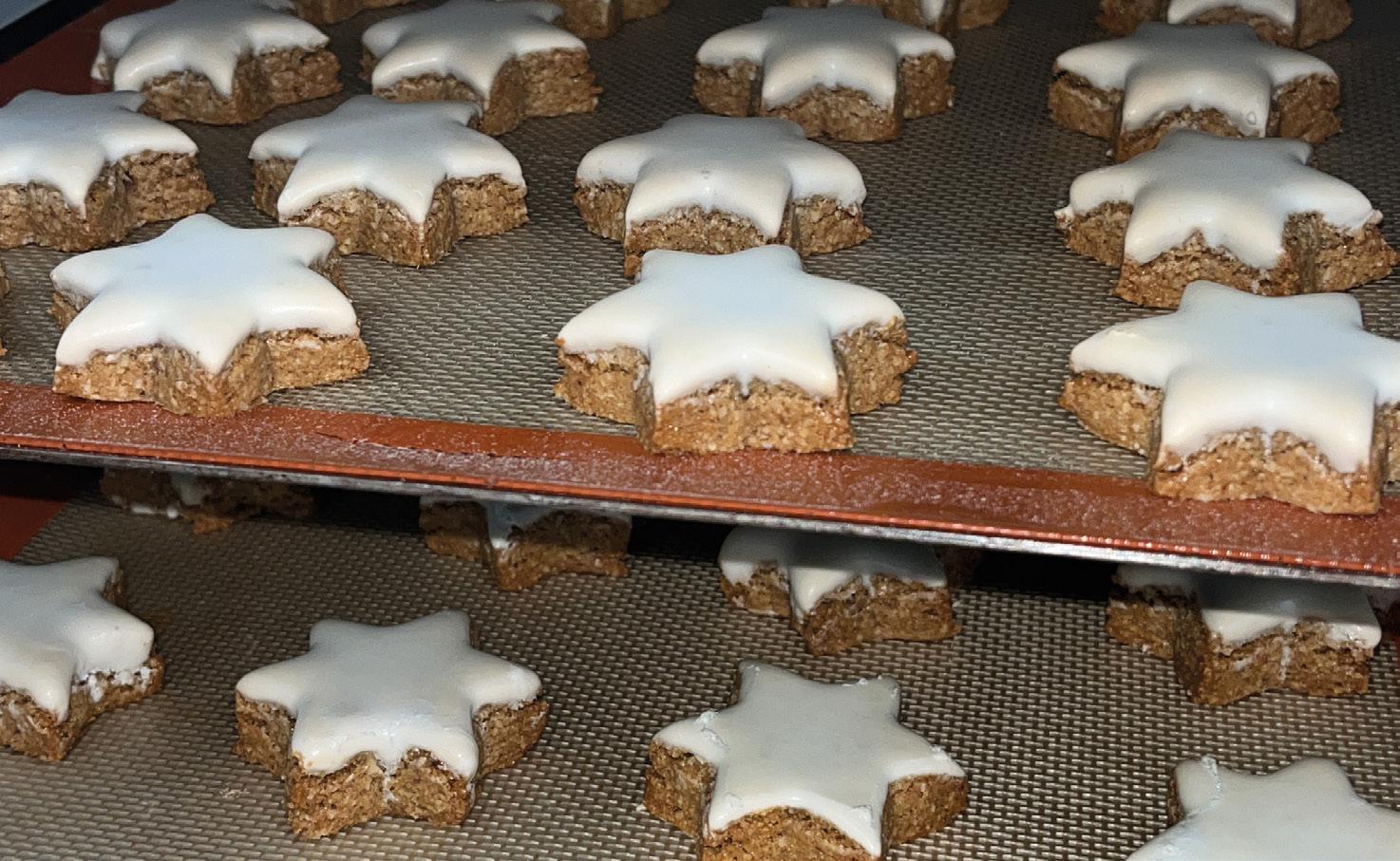
I used to make one of these every year for the children’s Christmas party at New College. This was one of my favourite events to cater for as the children were very happy and used to run around full of sugar!
Ingredients:
For the cocoa sponge
• 100g self-raising flour
• 50g cocoa powder
• 1 tsp cinnamon
• 6 eggs
• 100g sugar
• 100ml milk
For the Chantilly cream filling
• 250ml double cream
• 2 tbsp icing sugar
• 5 tbsp Baileys (I didn’t use alcohol for the children’s party!)
• 6 Ferrero Rocher (roughly chopped)
For the ganache glazing
• 100g dark chocolate
• 150ml double cream
Method:
First make the sponge. Separate the egg yolks from their whites into two separate bowls. Whisk the yolks with half of the sugar until thick and pale, then the whites with the other half of the sugar until stiff and glossy.
Sift the other dry ingredients together and gently fold them into the egg yolk mixture.
Next, continue to fold in the egg white mixture. Add the milk last to loosen the texture slightly.
Pour the mixture in a tin and bake at 160°C for 10–15 minutes until firm to the touch.
Once the sponge has cooked and cooled, whip the cream with the Baileys and icing sugar until it forms soft peaks. Spread it on the cocoa sponge, scatter the roughly chopped Ferrero Rocher on top and roll it tightly.
For the ganache glazing, heat the cream until it simmers gently then pour it on the chocolate, stir well and let it cool. When it’s slightly thicker but still nice and glossy, pour it on the log and create the bark effect with a cheese knife.
Donatella Inchingolo, Pastry Chef
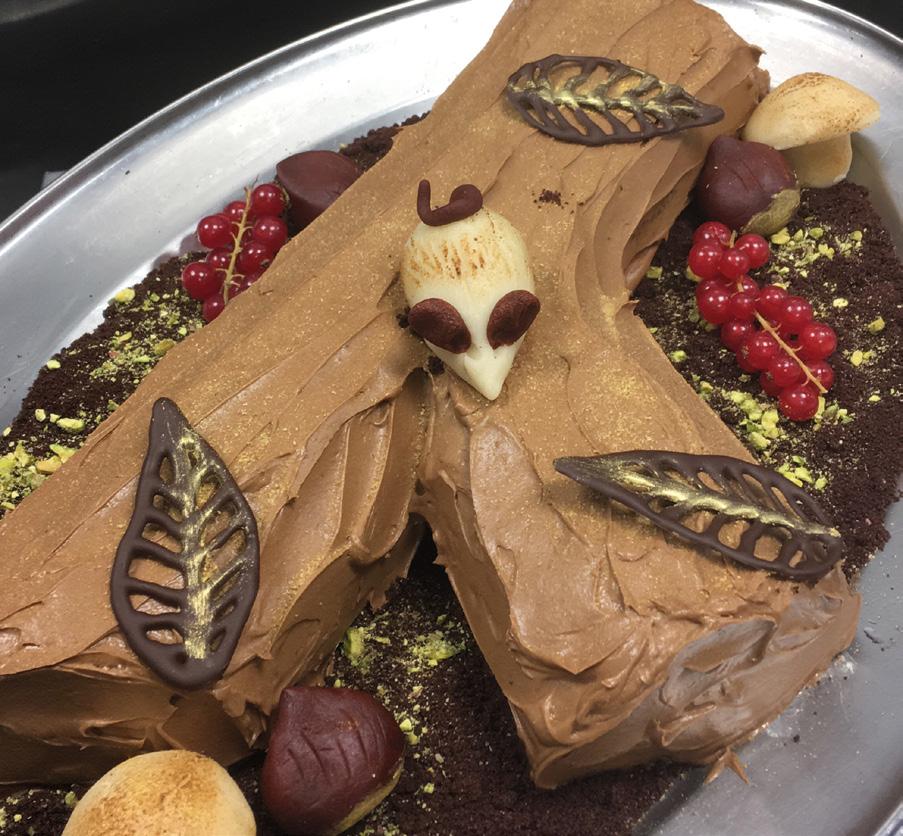
As an undergraduate student at Teddy Hall with an avid interest in theatre, this year has been a really exciting step into directing and writing for me. Although I have been involved with the performance side of things previously, I branched out and explored some behind-the-scenes roles. This year marks the founding of Orchard Productions, a student-run drama company founded by me, Eliza Hogermeer (2022, Modern Languages), and my co-founder Adrienne Knight (2021, Worcester College, Music).
The Hall has been instrumental in supporting my passion for theatre and making this a reality. Members of the Hall have been eager to participate and engage with my projects, as performers, musicians and members of the crew.
Over this academic year, two original musicals were put on by the company in theatres around Oxford. In Hilary term, we debuted The Pact at the Burton Taylor Studio – an original musical written by Adrienne Knight. The show centres around two sixth-form students applying to Oxbridge and follows their struggles, fears and unlikely friendship. As two Oxford students performing to an audience in a university city, we wanted to make the musical a relatable insight into some people’s experiences of the application process, but with an added dark twist. As a company, we wanted representation of queer stories to be the foundation of our original works; this is often featured through the experience of our protagonists. In The Pact, Ava and Maxwell’s eventual close friendship undergoes ambiguous tension, only resolved at the end of the show with an act of revenge.
In the show, the students’ perspectives of Oxford are centred around the idealised academic grandeur of the University, and we wanted to reflect this in the promotional poster. As a first-time producer and second-time marketing manager, it felt as if selling the show rested on my slightly inexperienced shoulders. I felt a duty to reflect the aesthetic choices abundant in the show’s script: Oxford, dark academia, libraries. My mind flashed to the St Edmund Hall Old Library, in which I had only been a handful of times, since it’s such a historic aspect of the College. I meekly emailed our wonderful Librarian James Howarth who enthusiastically let us take our poster photos in one of Teddy Hall’s most historic spots.
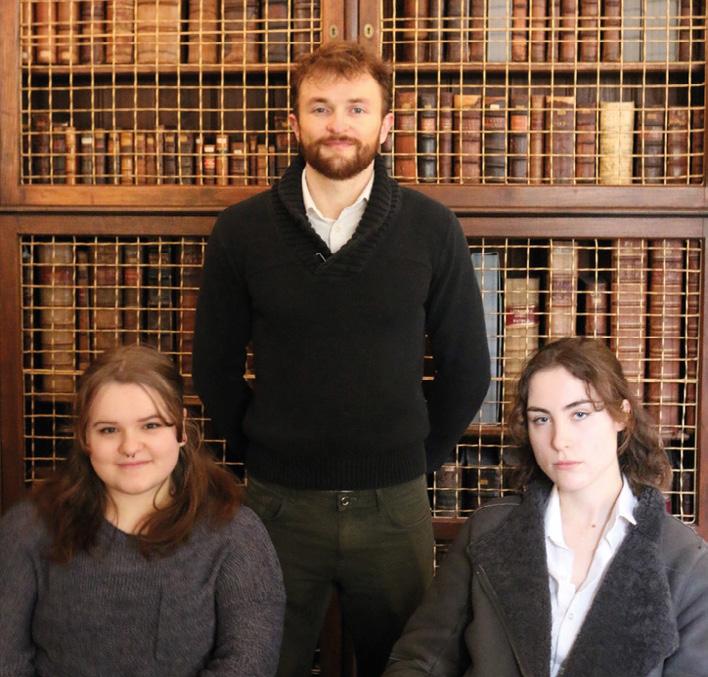
Once we arrived up the wooden stairs, we were offered a look at some of the rare books and were encouraged to move the curtains open or shut to get the perfect lighting. Safe to say, the traditional Oxford aesthetic we were looking for was thoroughly achieved thanks to the support from the Teddy Hall Library staff. Fortunately, the tickets sold decently with audiences growing each night. Many

congratulations and thanks must be given to the whole team. The show was a great success, with notorious Oxford drama reviewer Peter Kessler describing it as “Stephen Sondheim meets Booksmart.”
With the success of our first show boosting us, we geared up for our Trinity endeavour: Needle in a Haystack. I had written most of the book and had debuted the idea during my time at sixth form. Before coming to Oxford, to direct a full-scale show felt nothing more than a distant teenage dream. However, after The Pact’s success, Adrienne’s talent for composing and the help of my co-director Aidan Iaccobucci (Visiting Student, Hertford College), we felt excited to take on a larger-scale production. Orchard Productions was fortunate enough to have our original bid accepted by the North Wall Arts Centre in Summertown, which we were overjoyed with since this slot is only available for Oxford University students once a year.
With Needle in a Haystack, I wanted to try my hand at depicting village life on stage, as well as creating queer representation within traditional musical theatre tropes. After being inspired by films such as Hot Fuzz and musicals like Oklahoma!, the intricacies of village community, and their interactions with one another, fascinated

me. I wanted to frame acceptance and celebration of a queer relationship in a traditional village setting. It was important to me that the show should focus on the strength of community in the face of threat, rather than purely on a story of queer romance. Although the support for main characters Annie and Kitt’s relationship in Needle in a Haystack doesn’t always reflect the reality for queer individuals in small towns, I wanted to rework the stereotypical, clichéd meet-cute and other tropes from musicals and film through a queer lens.
Rehearsals for the show got into full swing at the beginning of Trinity, primarily in Teddy Hall. A special thanks goes to Bursary Administrator Sunny Pagani for responding to all my room bookings and last-minute location changes kindly and

promptly. For seven weeks, we (hopefully) graced the Hall with our rehearsals featuring original folk-style music and comedic group scenes. Members of the Hall, including our JCR President Fizza Zaidi (2022, English), participated in the show as performers and musicians on the stage.
I have been lucky enough to create, direct and stage original works thanks to the enthusiasm, engagement and support from St Edmund Hall in many areas. The JCR’s financial support on both The Pact and Needle in a Haystack gave us the security and confidence to support our ambitious projects in 2024. The Porters and Sunny Pagani have been instrumental in ensuring accommodation for our rehearsals, especially during Trinity term, whilst also prioritising Finalists and their exams.
Although drama does not perhaps fit the usual Teddy Hall sporting reputation, I overwhelmingly felt the Hall Spirit

throughout the whole process, especially when spotting some familiar Hall faces in the audience! I hope in the future that ambitions in drama, music and beyond continue to be supported and proposed by members of the Hall. In my final year, apart from a few small projects of my own, I hope to nurture the growing arts and drama culture within our own College community.
Eliza Hogermeer (2022, Modern Languages)
On Friday 21 June 2024, Hall artist Stephanie Hartop (2023, MFA) and two friends, Caroline Coolidge (Queen’s, 2023, MFA) and Núria Rovira (Blackfriars, 2023, MFA), staged an exhibition across the Crypt and Tower of St Peter-in-the-East. Here they describe the inspiration and imagery of their works.
In the Library of St Edmund Hall there is a crypt. On a night late last October I first descended its stairs, normally guarded behind lock and key, for a service of Compline – Gregorian chants in candlelight. The church, St Peter-in-theEast, predates the University; it was only converted for use as a working library in 1967.
In the far corner of the Crypt, on one of its eight Romanesque pillars of weathered stone, there is the carving of a wyvern. This chimerical dragon has as many wings as feet and gently emerges from the subterranean foundations. Saint Peter was chained for preaching about Jesus in Jerusalem, then released from his chains by an angel. This is referenced in the chain motifs carved in stone on the vaulted ceilings of the floor above the Crypt. We
too reference these chains of Saint Peter through an aluminium chain, usually found guarding a kitchen, which veils the entrance to the space.
The artwork, ‘of adoration’, a carved oak heart-cum-sundial, is placed close by the wyvern. As an ancient measuring device, it is a historic tool of astronomers and astrologers, whose practice would have been deemed heretical at different points in this building’s history. A sundial usually relies on a clear, cloudless day to trace the movements of the sun, but here it is lit from below, by the flames of flickering tea lights in their aluminium cases. In all astrological traditions the placement of the sun in a chart points to the core of one’s personality: the drive, the spirit. I like to imagine the sundial as if it were an emerging technology today; I gaze at my glowing phone as if tracing the shadow of a scattered sun as it passes across the sky. Here my work is concerned with process and an intimacy with materials: the pattern carved into the oak heart base is taken from the floor of the painting ‘Adoration of the Tomb of Saint Peter’ by the 15thcentury Spanish artist Pedro Berruguete. It depicts a sunbeam ‘miraculously’ lighting a candle above his tomb; the fiery trace,
through devotion, magnified.
While chiselled, oil-painted wood is the foundation, the measurement of light from these small, simple candles, used across the world in religious ceremonies, points to an orientation away from a singular source. In astronomy the axial precession, historically called the precession of the equinoxes, describes the slow rotation of the earth around the ecliptic in around a 26,000-year cycle. Astrologers believe it describes our movement through Astrological Ages; that we are shifting from the Piscean Age of the last 2,500 years, roughly, into the Age of Aquarius. This epochal shift from Pisces, defined by the dissolution of the self and a connection to a higher ideal through belief and spirituality, to the dawning Age of Aquarius will see increased technological innovation and questions of how to exist as a collective of individuals. It requires a societal integration of the qualities of its opposite sign, Leo, associated with the egoic leader, in us all, into the ‘brotherhood’ of Aquarius; and challenges us to find the humanitarian ideologies that might facilitate this, that we could all attempt to agree on.
Stephanie Hartop (2023, MFA)




Clockwise from top left: antares, steel chain, tea lights
tennis racket, oil on canvas, vine, sea wood, stones of adoration, oil on oak heart, steel, pewter, tea lights
FATEXDESTINY (detail), aluminium chain curtain
The definition of ‘screen’, as a verb, means to disguise, mislead, filter, mask, shelter, conceal, display, protect, analyse, obscure, sieve, evaluate, or hide. In late medieval church architecture, the word referred to the choir screen or rood screen. It was an architectural element intricately carved in wood or stone and its function was to divide the nave from the chancel, specifically the common worshippers from the ordained. In the three paintings I included in the exhibition in the Crypt of St Peter-in-the-East, I was interested in using the space of the Crypt to explore the modern idea of the screen.
The side of the screen we are facing, and our relationship to the two-sidedness of a screen, has become more complex as the types of screens we encounter today have expanded and transformed, notably digital screens. Screens are all part of a network, in the same way that the bodies flowing in and out of the exhibition became part of a network, following and unfollowing, flowing through the space of the Crypt to the Tower.
The art historian David Joselit adds context to this idea when he discusses, in his article ‘Painting Beside Itself’, the artist Martin Kippenberger’s assertion that a painting is not simply hung on a wall, but is part of a network.1 Kippenberger stated this in 1990: when the internet and the World Wide Web was in its infancy.
Joselit develops the idea of a network from one based on institutional content to one in which paintings “visualize a network” of ideas, of time, as passages.2 Writing in 2009, he references computer
networks, “in their incomprehensible scale, ranging from the impossibly small microchip to the impossibly vast global Internet, [they] truly embody the contemporary sublime.” 3 Yet in the 15 years since Joselit’s article was published, digital screens have infiltrated our lives in even more profound and complex ways, including in the creation of memory and meaning. The screen has literally taken control of our networks, formed new realities, and left us questioning our agency within these systems.
Everything I am yet to understand about the functioning of the internet takes on a mythical quality, like the foundations of a building I can’t see. The various platforms we navigate online tease and track us, flood us with information while extracting ours; the language of following and follower seeps into our orientation, making preachers and, potential, disciples of us all.
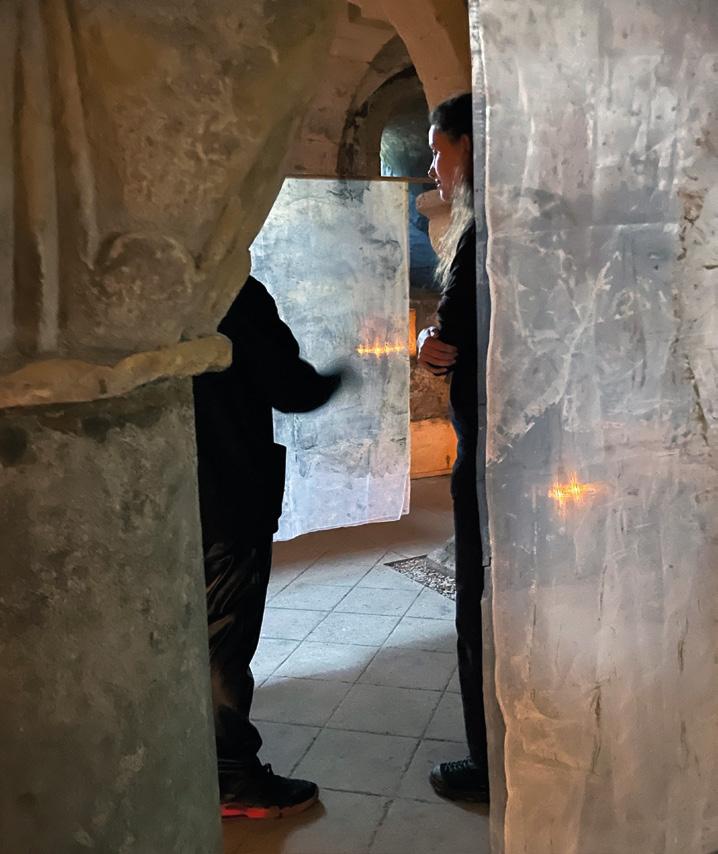
1 David Joselit. “Painting beside Itself.” October, 130 (2009): 125, accessed 23 February 2024, www.jstor.org/ stable/40368572.
2 Ibid, 128.
3 Ibid, 127–128.


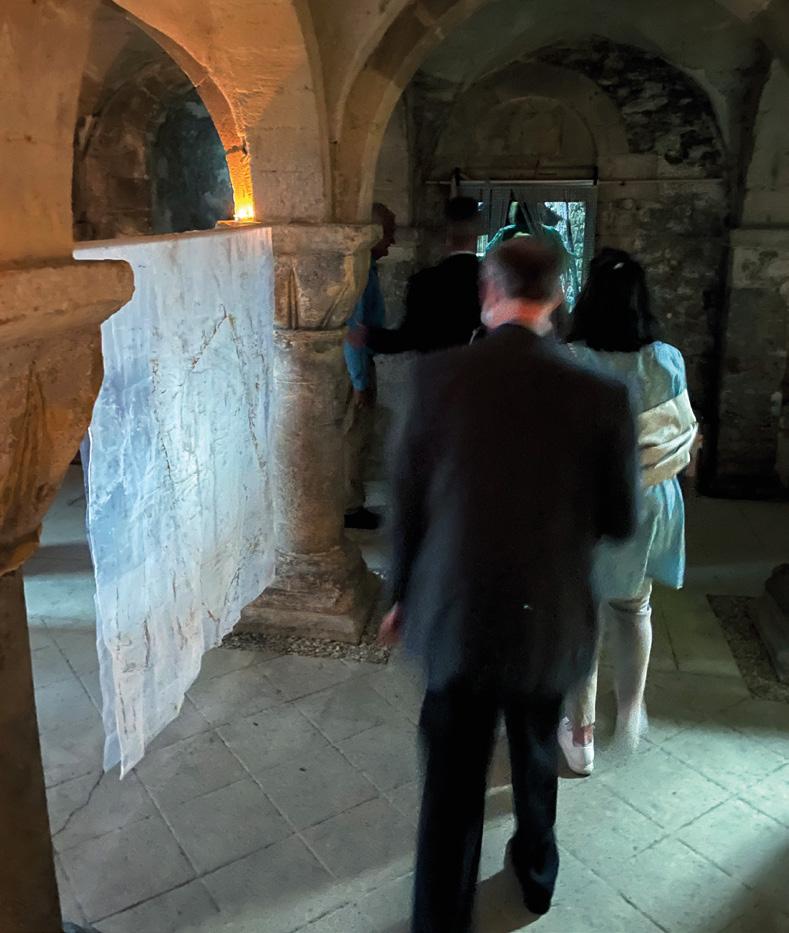
untitled screens, silkscreen printing mesh, pigment, graphite, and dowels
Rovira
You have climbed to the top of St Peterin-the-East’s Tower. A wooden box with a closed lid. Eight bells used to hang in this room. Eight metal wells filled with noise. Spinning in darkness and spilling over the city.
This evening, four tall windows tint the room with copper light. It’s empty. The bells left long ago, in 1970, when the building became a library, a place of silence and frozen time. There was no more ringing left to do, so the Tower was relieved of its metal weight. One by one, the bells proceeded down the building to the clatter of reeling chains, passing through a hidden trap door on the centre of the wooden floor. It’s right there where the sound is coming from; from what looks like a pile of silver sand. Its edges tidied into a perfect circle. There seems to be a sound source below it, a speaker perhaps, given away by snaking cables. You can feel the sound on the soles of your feet. You
can see it too: the silvery fragments lightly shake as different frequencies run through them. Faint metallic notes shimmering to the sunset light.
You are looking at what the bell couldn’t keep, what was carved out to make room for sound. I’m talking of bell tuning. To fix a broken note, the bell is inverted and placed onto a machine which makes it spin (like a potter’s wheel, but bell-sized and far from the softness of clay). In sharp noises, a file-like attachment touches the spinning bronze, slowly trimming the bell’s surface. Shiny silver rings appear on its metal belly. Ring by ring, the file rebalances the bell’s thickness for a new sound to take shape. Bits of bronze fly from the whirling metal and gather below the machine-like discarded noises.
Today these remnants have returned back to the Tower to gather in this room for one evening. The first bronze since the bells left. A question, a belief, a note, that still rings in this room.



ringing room, bell bronze, audio installation

Why we went to Switzerland California was wider than dad’s thumb and glittered like a heaped landscape of pennies, hunched trees protruding in gullies like dark thoughts; mum had two children like dark thoughts, and motherhood was wider than anyone expected. Sometimes her eyes watered like pennies in a well while the air in America was so thick with wishes dad shaved two day stubble with hope to unwrap half his face shifted by tan and mum told us serious things from her knees –I remember it is important to an eight year old when it rains. I imagined mountains as the bristles of a toothbrush and later mum said, I cut the string to see if the kite was committed.
Suzanne Antelme (2021, History & Politics)
Post-War Brutalism
“...If there is paradise, then it is here, it is here, it is here.” – Unknown, inscribed on the Diwan-i-Khas, Delhi some buildings are just honest / bare bones, you say / and clean lines / pool waxing white light / or a star, unclenched / to brace concentric circles we become oarsmen / but I am too nostalgic (Georgian Spa) to reply / when this comes up next and you tell me to be honest - did I like that? / right now I am watching a man watching me / hearing death in the underbelly of bird calls / womanhood is one name for this / suppose, in the afterglow of proxy war/ over high tide ringing from bell tower / that I look different / now imagine this is non-linear / one blinking self does not conceal the next - this is done for shadows / and you will not be here all night to see them unstretched / I crush silver moths with bare heels / I wake up on many corners, aged 11 / in a bowl outside your room find twigs, web, and feed / things that might catch up to us eventually / you are in a field (necropolis) of rapeseed / you are hauling an icepick through my navel (umbilicus) / last hurrah / or good old expediency / dusk turns again / and big cities fission / cleanly / your shoulder blades, unpainted, tilt back / wordless, I remind you about sixties functionalism / in the wake of design / something true
Anandita Abraham (2022, PPE)
Garden song
I will wait for you in the garden of Gethsemane.
The other garden is too dangerous, anyway, for the likes of us (owing to snakes, paternalism);
The trees know too much, the ground is slippery with un-speech and want.
In Gethsemane it’s safe to wait
To sit on a stone for a while and read palms: the love line is longer than the life line
And that’s safer for those afraid of forked tongues, and fathers.
In Gethsemane, one kiss on the cheek leaves five bloodstains, that’s more in style.
Above, there are banana leaves; below, sour cherries bursting.
Left: the silhouette of ignorance. Right: the emperor sits at a picnic table and pushes food into his mouthtoo much, again and again, too much for any mouth to hold.
Dogs at his feet fight over the scraps, but in Gethsemane
To tear out a throat is an act of love,
Or at least of normalcy. The heart is deep inside the neck, here,
And it needs to be seen to be believed.
It’s different in this garden, our garden.
On Monday, Doubting Thomas insisted he put his finger in the wounds,
Reached greedily in and prodded the life
Pulling out proof positive in blood and gore.
The onlookers are shocked and horrified at this spectacle: one hand inside another, The unhealed wound that doesn’t seem to cause pain even as Doubting Thomas widens it. But the two of them, like us,
Understand and allow. One’s wounds are the other’s to feel,
And they hide flinches from each other, to avoid loving-guilt. Here, at the confluence of love and death, forgive me.
Sophia Bursey (2022, English)
My mother
My mother, an artist
The way she weaves her words through the strands of my silken black hair
Hair, she says, I inherited from those who weave straw hats in paddy fields
I know that she is living through me, the same way that the gossamers flutter
Living through the gentle sway of rice crops
Humming softly as her fingers work, my ethnic name on her lips like an incantation
Bringing forth carefully repressed desires
My mother, she was once a working woman
Her desire was not quelled, burning embers have been brought to me
I hold the ribbons in my hand, awaiting her instructions to pass
I feel the shimmering miasma, generations old
A soft heartbeat on warm skin
Her heartbeat, entwined with mine.
Kim Ninh (2023, MSci Experimental Psychology)
What can be wrung from the little space between my fingers touching in the mirror? From the instant before things collide?
Keep close, keep close and
Run full throttle as the little birds and the green shoots and the wild things recede, A new winters growth taking their place – go on, go on,
Climb a little higher for the ground is not sinking beneath you but rising
With the water. Get up with the dawn and ignore the feeling that the sun is a little hotter, A little closer. Smile back
Up at it, don’t give in to the whispers of the little birds in the branches, Of strange destruction and salt earth and arms reaching Up to the whistle and wail of the new world.
Don’t look down at the tracks in the thinning snow where you follow in the footsteps Of men who thought they were mapping out the future forevermore in a place that seemed endless
In a time that seemed limitless where the blue-white sky doesn’t quite touch the whiteblue ground
Where the only border is the stretch of your eyes. Don’t look back at their bleached bones look
Up up up and trust that what’s made for us (what we’ve made for ourselves) won’t miss us, coming at us like a comet,
Like a river carving a path through the rock And tearing the anchor out of time.
Laura Van Heijnsbergen (2023, English)
David Cooksey, Nothing Ventured, Nothing Gained: Turning Good Science into Good Business (White Fox Publishing, 2024)
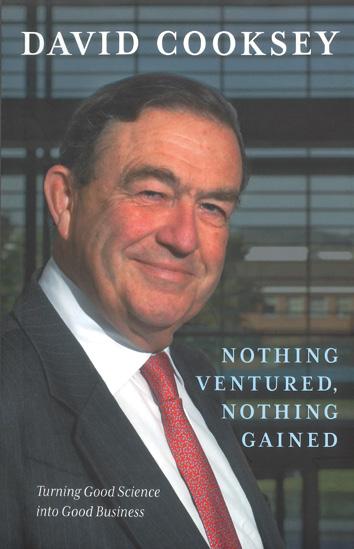
Who better than Sir David Cooksey (1959, Metallurgy, Honorary Fellow) himself to guide us through his storied career and dazzling achievements. Perhaps sadly for readers of this Magazine, his time at the Hall passes by in a flash at the end of a brief account of his youth. Those wishing to know more can turn to the fond memories of fellow Metallurgy student and Honorary Fellow Keith Bowen elsewhere in this issue (pp. 216–217).
In truth, so action-packed was Cooksey’s career there could hardly be room for more of his achievements in Oxford, real though they were: he was part of the first cohort of metallurgists (now Materials Science) in Hall – both of whom became Fellows of the Royal Society, first President of the Middle Common Room and for many years a generous benefactor the Hall.
The book is arranged broadly chronologically with each chapter focused on one of his many roles. For example, his involvement as one of the UK’s first venture capitalists; his time as Chairman of the Audit Commission, as a Director of the Bank of England and Governor of the Wellcome Trust; his involvement in several large-scale infrastructure projects including the HS1 rail link to the Channel Tunnel; and his crowning achievement, the establishment of the Francis Crick Institute for biomedical research.
This procession of activity becomes almost bewildering once it dawns on the reader that, in fact, he held many of these roles concurrently. Late in the book Cooksey lists his schedule for 22 September 2006 which features six consecutive two-hour meetings, each dealing with a different project.
Across the book we are introduced to scores of characters – financiers, civil servants and politicians – all deftly evoked. Cooksey has strong opinions and little time for those he considers vain, self-serving or petty minded. In separate incidents both President Sarkozy of France and the former Labour Cabinet Minister Stephen Byers storm out of meetings having had their plans stymied by Cooksey’s cool reasoning.
Yet he also has strong friendships with and admiration for those whose abilities he rates. These range across the political spectrum. He was close to and involved in the development of policy for both the Thatcher and Major Conservative governments, but he also shows a strong regard and even affection for Tony Blair and particularly Gordon Brown (granted they might disagree with his assessment of them as “…not really Labour – more like left wing Tories”). He is notably sceptical about the Coalition government of 2010–2015 and in particular George Osbourne. Two strands dominate the book. The first is his passionate belief in funding scientific, especially medical, research by harnessing its potential commercial outputs and by collaboration from government, universities and venture capital. Secondly, his concern about the damage that has been done by the rise
of private equity investment that, rather than enabling businesses, seems more concerned with extracting value from them, even at the price of running up crippling debts.
Along the way some of Cooksey’s other passions make appearances: his love of sailing, his legendary wine collection, his joy of entertaining at his various country homes.
The autobiography was complete but unrevised when the author passed away at the start of the year and the volume fittingly closes with tributes from his wife, his eldest son and his stepson-in-law.
An obituary for Sir David Cooksey appears on pp. 213–217.

In this third instalment from the diaries of Vivian Ridler (Professorial Fellow 1965-1978, Emeritus Fellow 1978-2009) we find him both further away from Oxford and further back in time than ever before.
The book covers Ridler’s war service in West Africa from January to September 1943. He was deployed as an RAF radio operator helping guide aeroplanes flying along the so-called ‘Takoradi route’. This was a network of airbases which stretched from Takoradi in modern day Ghana to the Middle East and South Asia, and enabled Allied aircrafts to be safely delivered to the frontlines. Ridler was stationed first in Ikeja in southwestern Nigeria, near the coast, and later in Kano far to the North.
The experience of the Second World War captured in the Diary reminds me at times of Evelyn Waugh’s Sword of Honour trilogy (1952–1961). There is often a general atmosphere of inept military bureaucracy – the Diary opens with Ridler in Scotland,
waiting to be deployed and in hopes of being commissioned as a specialist officer in a military intelligence photographic unit. His posting to Africa arrives at the same time as his acceptance for specialist training. A despairing appeal to the air ministry sees the posting order initially cancelled but this proves (as his wife Anne writes in a letter to a friend) “too unorthodox for Inverness [HQ] who told V he had broken King’s Regulations, stuck an injection into him and packed him off to Blackpool” for onward transmission to Africa. Officers and NCOs are described as ineffectual, callous and at times apparently unstable: one dinnertime finds all of the lower ranks sent out of the mess as they failed to wear their pith helmets. And during Ridler’s time in Ikeja there was almost a dream-like quality to the tedium of everyday camp life in the stifling heat. His unit is disbanded before the airbase they are working on is finished, and vague and contradictory rumours swirl about where they might be sent next.
Throughout the Diary there are sudden brutal reminders of war: en route to Africa the troop ships before and after Ridler’s are sunk, planes take towards Cairo and never arrive. His closest friend, David Bland, is shot down over Berlin and Ridler
believes him dead for some time before learning he has survived, albeit as a prisoner of war. The distance from home is also keenly felt. Ridler’s second daughter Alison, is born while he is in Africa.
Perhaps understandably in the circumstances, the diary entries are brief and often terse in description. But there are flashes of colour, particularly when Ridler visits the old city of Kano to watch the Grand Emir in procession celebrating the end of Ramadan. His knack for a telling detail or a vivid phrase remains even in the shortest entries.
The younger Ridler is perhaps quicker to judgement than the wiser, more experienced Master Printer we met in the first volume of diaries – “I have the greatest difficulty tolerating the conversation of Dobson & Mitichison…”. However, he is recognisably the same man. His cultural hinterland is already impressively large. He spends time teaching himself French by reading, amongst others, Balzac and Flaubert. He also consumes a vast range of books from various airfield libraries and makes careful reflections on the films shown to troops. His interests in typography, photography and printing remain strong throughout. A particularly enjoyable series of entries record his growing skill in painting signs for the air base, an activity curtailed inevitably by an officious sergeant.
We hear more voices in this volume than in the earlier publications. In particular, Ridler’s wife, the poet Anne Ridler, comes more to the fore. Several letters she wrote to her friend John Hayward are included in the book, full of deeply affecting and poetic description of both life on the
home front and concerns for her husband in Africa where “…even the flowers are full of enmity.” These letters, as well as two poems ‘Bring Back’ and ‘Remember Him’ also included in the book, made me keen to seek out more of Anne’s work. In Ridler’s letters to her from Africa, we have a deeper impression of their relationship than previously, full of love and longing. It is fascinating to contrast the description of the Kano trip in the diary with a slightly fuller and more performative one in a letter to Anne.
Ridler’s son Colin, who has edited all three volumes, is also a more present voice in the text this time. His copious notes are presented in parentheses in the body of the text; while the effect is slightly jarring at first, they are useful, erudite and sometimes amusing. For example, when he glosses a dismissal of Fred Astaire as “ugly” with a fond memory of his Father’s love of watching Astaire dance in later years.
Ridler’s diary comes to an end in January 1944, shortly before he was posted back to Britain. An extract from the diaries of his Mother-in-Law takes the family’s story past the end of the war to 1946. An appendix also includes entries from the diary of David Bland including his capture and then escape from Stalag Luft III in 1945.
As ever, and befitting Ridler’s legacy, the book is beautifully printed and illustrated with photographs and wartime posters.
Colin Ridler reflects on the experience of editing his father’s diaries in’ Pleasures and Pitfalls in Publishing the Vivian Ridler Diaries’ pp. 164–168.
James Howarth, Librarian
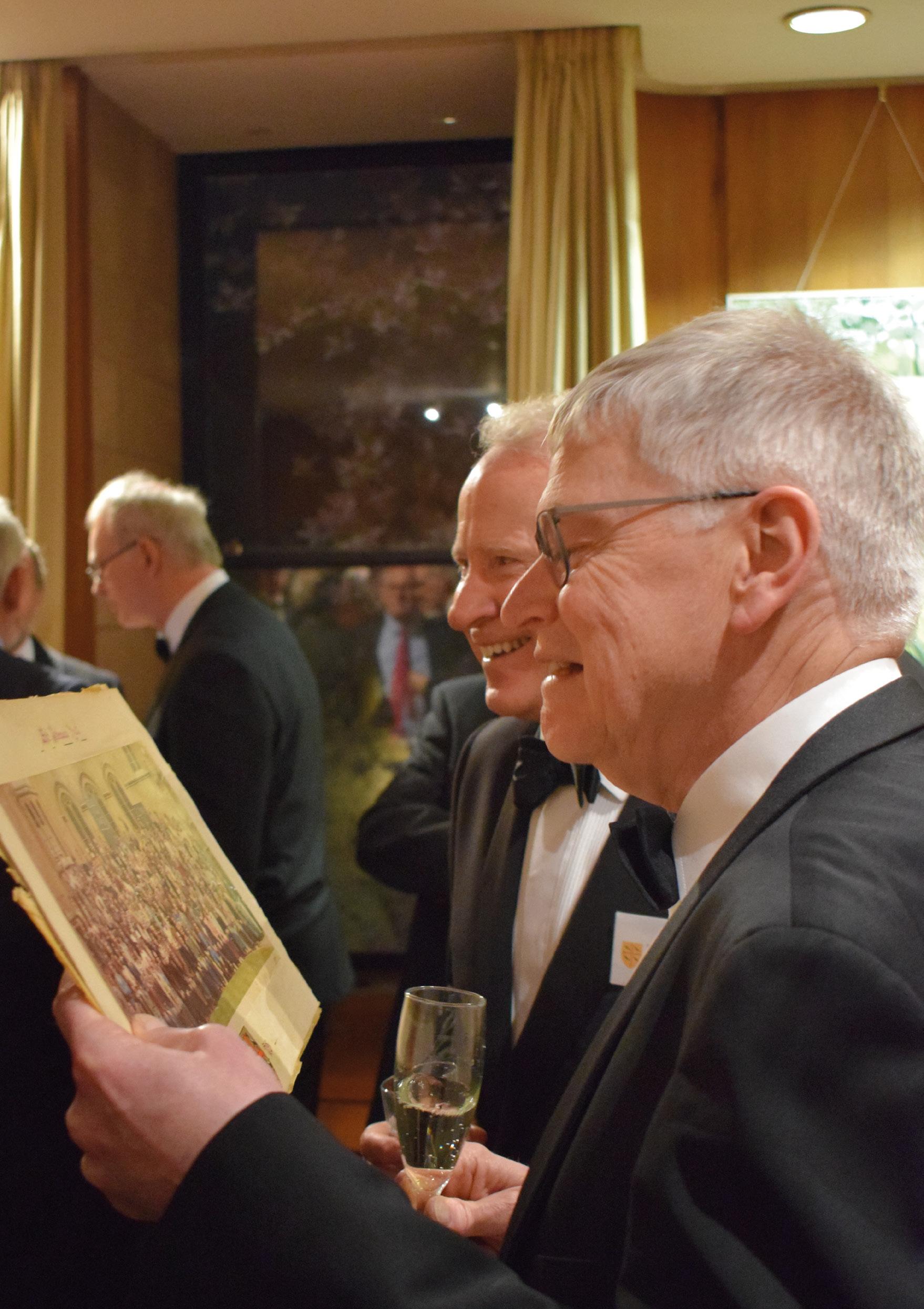
1953 Two weeks after completing the London Marathon for the fourth consecutive year, David Picksley walked in the 70th anniversary Bannister Mile from St Aldate’s to Iffley Road, where he had watched that historic event in 1954.
1956 Malcolm MacCormack lives in Uruguay and is a widower with three children, eight grandchildren and two great grandchildren.
1957 John Orton has won a gold medal award in the Crime and Mystery History Category in the Historical Novel Society 2024 First Chapters Competition for his entry ‘Blood Feud: the Forester of Gravelinges’ set in the 11th century. John’s previous historical novels Tales of Old South Shields are a series all set in his hometown.
1959 Ian Walker is now living in Sydney, Australia, enjoying a quiet retirement after his previous four decades of international consulting which took him to a wide variety of countries including the USA, Mexico, Austria, Kuwait, Singapore, PRC and Taiwan.
1960 Ted Rose continues to hold an Honorary Research Fellowship in Earth Sciences at Royal Holloway, University of London. In 2024, the Geologists’ Association helped to mark D-Day’s 80th anniversary by publishing a second edition of his field guide to the Geology of the D-Day Landings in Normandy, 1944 (first published in 2003).
1962 Former Junior Research Fellow Oswyn Murrary has published two books since retirement: The Symposion: Drinking Greek Style, Essays on Greek Pleasure 1983–2017 (OUP, 2018) and The Muse of History: the Ancient Greeks from the Enlightenment to the Present (Allen Lane, 2024). His first pupil to get a First, George Smith (1960, Literae Humaniores), came with his wife, Teresa Collingwood, to the book launch of the latter at Holywell Manor in June 2024.
1962 Nigel Pegram is currently involved in co-producing and appearing in several projects: Soho, on the rise of rock ‘n’ roll in Soho in the 1950s with Brian Bennett, drummer and musical director for Cliff Richard and The Shadows; Sky Commanders, a mixed live action/animation feature film with RVK Studios in Iceland in which he will be doing four of the voices; and a possible third project involving Hollywood star, Ryan Reynolds.
1962 Thanks to the continuing generosity of Simon Simonian, 19 annual Simonian Prizes were awarded: six at SEH in Excellence in Leadership, six at Harvard in Research Excellence in Pathology and four at Harvard in Research Excellence in Nutrition, two at Tufts in Research Excellence in Nutrition and one at Georgetown in Excellence in Clinical Surgery. Simon was an invited speaker at Citizens for Global Solutions, at The Southern California: Interreligious Council, The Christian Forum and Quaker Meetings.
1963 Nicholas Rogers has a new book out: Maritime Bristol in the Slave-Trade Era (The Boydell Press, 2024).
1965 Nigel Barak sums up 50 years in 81 words: “Did an MBA at London Business School, which opened doors I didn’t know existed. One of these led to Brazil, where I spent four wonderful, decadent years. Three careers: first in the corporate sector, until I couldn’t stomach the politics; then in management consulting; then in business mentoring, which was also wonderful! Retired to NZ 20 years ago and discovered a fourth career – having a family. Latest project is two 13-year-olds and one 18-year-old. Wonderful! – it’s never too late to start.”
1966 Donald Easton was elected a Fellow of the Society of Antiquaries.
1967 In retirement Hugh Anderson still keeps himself busy painting (having had another small exhibition of his work), supporting St Mark’s College in South Africa, as chair of the UK Board of Trustees, and, as a founder member of Glasgow 2030, attempting to stimulate the regeneration of his adopted city..
1967 The first issue of Continuity and Change for 2024 will contain an article by Dave Postles on ‘Fidei laesio and debt revisited: the Lichfield consistory court, 1464–78’. Dave met Suella Fogg in 1969 on an Upper Palaeolithic excavation from Oxford at Cresswell Crags, and they have been together ever since.
1969 Nicholas McGuinn continues his role as Honorary Fellow in the Department of Education at the University of York. In this capacity, he has co-edited a book titled Engaging with Environmental Education through the Language Arts. The book will be published by Routledge and has a provisional publication date of December 2024.
1969 From Peter Lush: On 20 July nine Aularians resident in Scotland and four guests enjoyed a convivial lunch in Mackintosh at the Willow on Sauchiehall Street, Glasgow. The geographical spread was notable, with attendees from Aberdeen, Dundee, Edinburgh, Glasgow, Ayrshire and Fife. Three of the alumni had read PPE, two Engineering, two English, one Geology and one Mathematics. Years of matriculation ranged from 1957 to 2008. Of the three alumnae there was one each from the second and third female intakes in the 1980s, plus the most recent graduate. As well as eating and chatting we were provided with fun improv entertainment. The event was kindly organised by Hugh Anderson (1967, English) for the second successive year. If you are not on the mailing list for event invitations, please email the Development and Alumni Relations Office to be added, at aularianconnect@seh.ox.ac.uk.
1970 Christopher Merrett lives in Pietermaritzburg, South Africa, and continues his post-retirement career as a freelance editor and indexer for several book publishers. He is a trustee of the Natal Society Foundation and is responsible for its publishing programme. Since January 2024 he has been editor of its annual journal, Natalia, which is now in its 54th year. On his website, From the Thornveld (www.fromthethornveld.co.za), he publishes regular opinion pieces and book reviews.
1972 Paul Croke was awarded Non-Executive Director of the Year (Wales, 2021) by the Institute of Directors. This was for his work as Chair of Bridgend College Governing Body. The College was awarded a Beacon Award as top Governing Body in the UK, and also top college in the UK by the Times Educational Supplement
1972 Rick Mooney is retired from the Connecticut Department of Education and living happily with his wife, Helen, in sunny Vero Beach, Florida.
1972 Edwin Rankin has published an ebook, A Church Like Jesus: Heaven on Earth on Amazon.
1972 After a long legal career, Floyd Robichaux has turned to music. He still can’t play an instrument to save his life but he’s a damn good DJ with his own radio show Jazz Less Ordinary, curating the very best Nu Jazz, Acid Jazz, Contemporary Jazz, Brazilian Grooves and Neo Soul. For the last 15 years he has been President of the Oxford University Society of New South Wales, and Aularian Ambassador for New South Wales.
1974 Jerry Gray shared a fun reunion with other 50-year matriculands at the Hall in March. In retirement, he and Inge are enjoying travel and their grandson Oscar. Despite a failing body, Jerry will attempt to play 70 sports in his 70th year in 2025! His novel, The Headhunter, is available on Amazon for those nostalgic for shock and irony.
1975 After 30 years of writing non-fiction, Hugh McManner’s first novel was published earlier this year – The Sunday Service – set in 1980s Northern Ireland. He’s also just moved to South Gloucestershire.
1978 Amitav Ghosh is the 2024 laureate of the Erasmus Prize. Read more at the Erasmus Prize website: www.erasmusprijs.org/en/laureates/amitav-ghosh.
1978 After a career in international trade fairs, and more recently in events for luxury consumer goods, ten years ago Richard Hodgson founded an art gallery in Petworth, West Sussex – Kevis House Gallery – together with accommodation above in an historic Victorian photographer’s daylight studio. All Aularians are very welcome to visit him in Sussex!
1980 After over 35 years of dedicated service, Dr Bernard Bewlay, who was a member of both the JCR and the MCR, has retired as Chief Scientist at General Electric (GE). Bernard sits among the very elite of GE innovators, including Charles Steinmetz and Thomas Edison: he has achieved the momentous milestone of 200 patents. During his time at GE, Bernard’s innovations spanned a broad range of technologies for aircraft engines, power-generation gas turbines, and medical imaging devices. In 2018, he received the Coolidge Award, the highest honour awarded to a scientist within GE.
1981 Stuart Shaw has co-authored with Isabel Nisbet Educational Assessment in a Changing World: Lessons Learned and the Path Ahead. This timely book takes stock of the wide range of developments in society, education and assessment,
and offers conclusions and strategies that are necessary for the current dynamic educational landscape to thrive. It will be published by Routledge in the autumn of 2024.
1982 Kevin Sealy has retired from full-time work after some 39 years in the IT industry, including roles at Mobil, PwC and IBM. Most recently he spent 18 years at the executive search and HR consulting firm Korn Ferry leading the EMEA Technology Practice.
1983 Thomas (de Mallet) Burgess was appointed Artistic Director (Opera) at Finnish National Opera and Ballet from 1 August 2023. From 2018 to 2023, he was General Director at New Zealand Opera. During his tenure there he introduced major strategic and artistic reforms that transformed New Zealand’s national opera company as he effectively engaged diverse and broader audiences.
1983 Mark Wilkinson has been appointed to Personal Chair of GeoEnergy at the University of Edinburgh.
1984 Dr Ruth McQuillan has been awarded an MBE for services to science during the Covid pandemic . Ruth rapidly mobilised and led a team of researchers and students who worked to gather and review existing scientific evidence to inform policy-makers throughout the pandemic.
1986 After his BA from the Hall, Aamir Khan went on to study an MSc in Sociology at Nuffield. He then worked as a Pakistani diplomat in China. He completed his MBA from CEIBS, MSc from INSEAD and PhD from Cranfield. He now teaches on the MBA programme at the Lahore School of Economics, Pakistan. His latest case studies are Coke Studio and EFU Humrahi digital marketing campaign. He remembers fondly Dr Tony Heath and Oxford.
1987 An update from Stuart and Helen Hopper: Helen’s book The Art and Psychology of Board Relationships came out at the end of last year and is still in the Amazon charts. Stuart has been appointed as Visiting Lecturer to the Law Faculty at Oxford. He is especially grateful to Professors Rebecca Williams and Tom Melham and the amazing work they continue to do on the Law & Computer Science Programme (www.cs.ox.ac.uk/tom.melham/LawAndCS), and ultimately to both of his undergraduate Law tutors, Professors Adrian Briggs and Derrick Wyatt who –with much patience and good humour – put in some seriously hard yards to set his teenage self on a constructive legal path.
1987 From Al Murray: “This year I have been touring again up and down the UK with a new stand-up show as the Pub Landlord, facing the tricky business of writing and performing a topical show during a General Election year. This tour even took me to the UAE during the recent flooding incident.
I have also been working on several history projects in the wake of the success of my Second World War podcast We Have Ways of Making You Talk with historian James Holland. We hosted a festival in July at Blackpit Brewery near Silverstone, which takes the form of a gigantic symposium, with speakers from all over the field of conflict studies, living historians, authors, as well as a considerable museum presence. We had about three thousand people in attendance this year. Some of
our listeners have been inspired to return to their studies, and we have a handful who are now in print as a result. This is a fantastic piece of academic outreach to be involved in.
I also have my second WW2 history book published in September, Arnhem: Black Tuesday, a new study of the Battle of Arnhem using only one day of the battle to find fresh perspective on the subject. This follows the success of my first book, Command from 2022.”
1988 In March 2024, shortly after the death of Alexei Navalny, SEH alumni Mark Booker (1974) and Richard Kilgarriff planted an oak tree to honour the memory of the anti-Putin activist.
The planting of “The Navalny Oak” in the grounds of Richard’s new home is their way of expressing hope for future generations, who will see the tree grow for centuries to come.
1990 In his capacity as Ambassador-at-Large for the Global Organization of Parliamentarians Against Corruption, Akaash Maharaj negotiated a common position from Canada’s largest Bahai, Christian, Jewish, Muslim, and other faith communities, on providing humanitarian aid to child casualties of international conflicts. He is currently drawing together Canadian paediatric physicians to deploy to the Middle East, to provide care for children injured in the Hamas–Israel war.
1990 In January 2024, Chris Munby published her 43rd novel, The Excitements, under the penname C J Wray. The Excitements follows the comic adventures of nonagenarian sisters Penny and Josephine Williamson as they travel to Paris to receive the Legion D’Honneur, with flashbacks to their experiences in the women’s services during WW2. It has been described by The New York Times as “a wild adventure that belongs on the shelf with Travels with My Aunt.”
1992 Xen Gladstone has returned from 25 years in Hong Kong and is now running the Triple fff Brewery in Hampshire – next step to supply the Buttery?!
1993 2023 was an eventful year for Ian Hunter. On 15 February his son Samuel Adam Michael Hunter was born, while 27 August saw his marriage to Francesca Louise Guest.
1995 David Chin was sworn in on 1 July 2024 as a judge of the Industrial Court of New South Wales and commenced in the role of Vice President of the Industrial Relations Commission of New South Wales.
1996 Daniel ‘Spud’ Murphy was recently appointed Head of History at Loughborough Grammar School and is shamelessly touting Professor Priestland’s book The Red Flag to his students. Daniel is enjoying being a father to two children under the age of four.
1996 Roland Partridge is a Consultant Neonatal and Paediatric Surgeon at Alder Hey Children’s Hospital. In parallel to his surgical career, he developed a simulator to facilitate training in laparoscopic (keyhole) surgery. He established a start-up
company, eoSurgical, which sold these innovative training devices to over 90 countries globally. eoSurgical was this year acquired by Limbs and Things Ltd of Bristol, and he retains an advisory role to help further the mission to make surgery safer globally.
1997 Sadiya Choudhury was appointed King’s Counsel in March 2024. Of the 95 barristers appointed this year, she was the only Asian/Asian British woman practising in civil law to be appointed. Sadiya continues to practise in all areas of direct and indirect tax law from Pump Court Tax Chambers, where she has been ever since completing pupillage, and is kept busy with a mixture of advice and litigation.
1997 Kirsten Norrie has been elected Judith E. Wilson Fellow in Poetry at the University of Cambridge. Her forthcoming publications include An American Book of the Dead and Scottish Lost Boys from Broken Sleep Books, and Eagle Song: A Spirit Road Trip from Unbound.
2000s
2001 Joanna McGouran was elected a Fellow of Trinity College Dublin. Scholarship or research achievement of a high order is the primary qualification for a Fellowship, coupled with evidence of the candidate’s contribution to the academic life of the College and an effective record in teaching. Joanna is the Schuler Assistant Professor in Translational Organic Chemistry in the School of Chemistry.
2002 The Games Academy at Falmouth University which Doug Brown co-founded has celebrated 10 years of advancement and innovation in games education. Ranked highly in the international Princeton Review league tables, Games Academy has become the University’s flagship department, significantly influencing game education and shaping industry thinking.
2006 To Christopher Watkin and Sarah (New College, 2006) a daughter, Sophie Louise Rei Watkin, was born 7 September 2023. Sister to Ollie.
2008 Maire Gorman has been appointed as a Lecturer (Education & Scholarship) within the Department of Physics at the University of Sussex.
2012 Samuel Lovell and Abigail Lovell, née Thomas (2011) welcomed their daughter, Miriam, to the world in June.
2013 Molly Harris Brennan and her husband, Thomas, welcomed the birth of their second baby girl, Olive, on 4 June. They are delighted and Blue is being the best big sister.
2014 Maham Abbas and Bilal Hussein (St Catherine’s, 2013) had a baby boy, Nael Hussain, on 5 November 2023.
2015 Layal Liverpool’s debut book Systemic: How Racism Is Making Us Ill was published in the UK by Bloomsbury on 6 June 2024. The book is an investigation of the shocking and insidious ways in which racism harms health – and an exploration of how we can tackle the problem to create a fairer and healthier
world. Chris van Tulleken, bestselling author of Ultra-Processed People, described it as “A work of towering importance that will undoubtedly change science and save lives.”
2018 Together with their families, Morgan Severn and Sophie Smith (2018, University College) were married at The Most Holy Name of Jesus Church, Oundle, Northamptonshire on 17 August 2024.
2019 Moses Seitler is scaling up the only solution to refugee digital exclusion currently operating in the UK. Screen Share UK collects laptops and phones, repairs and refurbishes them through trained volunteers and redistributes them to refugees and asylum seekers across the country. If you want to support it, please contact Screen Share UK!
We record with sadness the passing of fellow Aularians, and salute them. Sincere condolences are offered to their families and friends.
1940s
Mr Nicholas Arthur Dromgoole MA, Dip, 16 October 2023, aged 95, London. 1948, History
Professor Christopher Rowland Hill BA, PhD, 15 April 2024, aged 94, South Yorkshire. 1948, Physics
Dr John Holman Bentley Williams MA, BM BCh, 27 November 2023, aged 95, Berkshire. 1948, Physiological Sciences
The Revd Roger Thomas Beckwith MA, BC, DD, 21 October 2023, aged 94, Oxfordshire. 1949, English
Mr Robert John Leigh Breese MA, 23 March 2024, aged 96, London. 1949, Modern History
Mr Anthony Shepherd MA, FRGS, 8 April 2023, aged 93, New South Wales, Australia. 1949, Geography
1950s
Mr David Burton Wright BA, 6 August 2010, aged 80, Gothenburg, Sweden. 1950, Modern Languages and Linguistics
Mr Robin Hubert French BA, 12 November 2023, aged 92, Northamptonshire. 1951, Modern Languages
Mr David Nigel Meyrick, 11 March 2023, aged 91, Wiltshire. 1951, Modern Languages and Linguistics
The Revd Nathaniel Belton Hall MA, 22 June 2024, aged 93, Herefordshire. 1952, History
Mr Ernest Percival Fox MA, DipEd, 15 June 2023, aged 89, Devon. 1953, English
Mr Ian Jackson MA, DipEd, 12 September 2023, aged 90, Lancashire. 1953, English
Mr Derek Michael Roff OBE, BA, 31 July 2023, aged 90, Perthshire. 1954, English
Mr John Allerton West BA, 29 January 2024, aged 90, West Yorkshire. 1954, Philosophy, Politics and Economics
Mr Michael David Martin MA, MInstP, CPhys, 16 September 2022, aged 87, Worcestershire. 1955, Physics
Mr Godfrey Adam Blakeley BA, 28 September 2022, aged 86, Oxfordshire. 1956, English
Dr Dumaresq Marner Child, MA, BM BCh, 11 February 2024, aged 85, Ontario, Canada. 1956, Medicine
Mr Jack Rowell OBE, MA, LLD, FCA, 1 July 2024, aged 87, Wiltshire. 1956, Philosophy
Mr Jonathan Nicholas Aptaker MA, 31 July 2023, aged 84, Middlesex. 1957, Philosophy, Politics and Economics
Mr Dennis Jesson MA, 21 May 2023, aged 86, Lincolnshire. 1957, Geology
Mr David Douglas Wotherspoon BA, 4 October 2023, aged 84, Lancashire. 1957, History
Mr Richard Anthony Payn MA, 22 June 2024, aged 86, Kent. 1958, Geography
Sir David Cooksey GBE, MA, FRS, FMedSci, 28 January 2024, 83, London. 1959, Metallurgy
1960s
Mr Charles Edward Sykes MA, 2023, South Africa. 1960, Metallurgy
Mr Malcolm Erskine Inglis MA, FRAeS, CEng, September 2024, aged 81, Hampshire. 1961, Engineering
Mr Peter James Wilson BA, 22 March 2024, aged 81, Oxfordshire. 1961, Geology
Dr Nicholas Alan Boucher MA, DPhil, 9 July 2024, aged 81, Warwickshire. 1962, Metallurgy; 1965, DPhil Metallurgy
Mr John Andrew Cunningham BA, 2 September 2024, aged 80, Somerset. 1962, Chemistry
Mr Michael John Hamilton MA, July 2023, aged 83, Middlesex. 1962, Philosophy, Politics and Economics
Mr Richard Philip Holland MA, 1 March 2024, aged 80, Warwickshire. 1962, Jurisprudence
Lieutenant Colonel William Kent Megill MA, 10 April 2023, aged 82, Ontario, Canada. 1962, Modern Languages
Mr Jeremy Frederick Mew BA, PGDip, February 2024, aged 81, Sussex. 1963, Modern Languages
Mr Peter Roger Hodson MA, Buckinghamshire. 1964, Chemistry.
Mr Derek Michael Huxley BA, 1 July 2023, aged 76, Dorset. 1965, English
Mr Roger John Frankland Dip, 7 January 2024, aged 80, Middlesex. 1966, Geochemistry
The Revd Dr Peter Doble BA, MA, PhD, 12 January 2023, aged 93, North Yorkshire. 1967, Theology
Professor David Malcolm Galloway MA, MSc, CNAA, PhD, May 2024, aged 81, Cumbria. 1967, Philosophy and Physiology
Dr Jonathan Hallett Lovell BA, PhD, 14 April 2020, aged 74, California, USA. 1967, English
Dr Simon Richard Appleton Kelly BA, PhD, 19 May 2023, aged 73, Cambridgeshire. 1968, Geology
Mr Robert Rex Murphy BA, 9 May 2024, aged 77, Ontario, Canada. 1968, Jurisprudence
Mr Andrew Timothy Race BA, 24 September 2023, aged 72, London. 1969, Modern Languages and Linguistics
1970s
Dr John Christopher Tresadern BM BCh, 4 September 2023, aged 76, Lancashire. 1970, Medicine
Mr Jonathan Robert Ormond BA, PGCE, 22 March 2023, aged 69, Shropshire. 1971, Mathematics
Mr Nicholas Keith Staite BA, 15 January 2024, aged 71, Suffolk. 1971, Jurisprudence
Mr Paul Antony Darling OBE, BA, BCL, KC, 2 August 2024, aged 64, London. 1978, Jurisprudence; 1981, BCL.
Mr Michael John Eccles BA, September 2024, aged 63, Wiltshire. 1979, Experimental Psychology
1980s
Mr Nigel James Justin Holcroft MA, April 2023, Cheshire. 1980, Modern History and Modern Languages
2000s
Dr Hannah Murray BA, MSc, PGDip, 2 December 2023, aged 41, London. 2000, Experimental Psychology
Mr Ralph Cannon Dear, Jr., BA, MSt, MPhil, 27 July 2023, aged 69, New Jersey, USA. 2003, Theology
Dr Eric Caines BA, MSt, DPhil, 28 January 2024, aged 87, Oxford. 2005, Modern History; 2007, MSt History; 2008, DPhil History
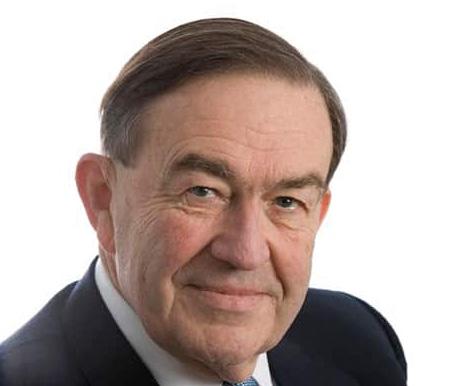
St Edmund Hall was sad to learn of the passing of Aularian and Honorary Fellow
Sir David Cooksey GBE, FRS (1959, Metallurgy) on Sunday 28 January 2024. He started his career as an industrial engineer, was educated at Westminster School and came to the Hall in 1959 to read Metallurgy. During his time here, Sir David played a crucial role in establishing the Middle Common Room (MCR) and was the Hall’s first MCR President. His career spanned business, venture capitalism and policy with highlights including his being a founder of Advent Venture Partners, a Director of the Bank of England, and his work on the Cooksey Review of UK Health Research Funding which strongly influenced the establishment of the first biomedical research centre in the UK, the Francis Crick Institute.
Sir David was a long-standing and very generous supporter of the Hall, particularly of the Fellowship and the new Norham St Edmund development. He was supportive of the College’s Materials teaching, and in 2019 established the Cooksey Early Career Fellowship in Materials. He was also a member of the St Edmund Guild and the Floreat Aula Legacy
Society. He was elected an Honorary Fellow in 1995. Sir David was also deeply involved and engaged with the College, as both an advocate and an advisor, and he regularly returned to Queen’s Lane for College events.
Sir David was knighted in 1993 and appointed a Knight Grand Cross of the Order of the British Empire (GBE) in 2007, both for public service. In 2020, he was elected an Honorary Fellow of the Royal Society for helping cement the UK’s place as a global leader in life sciences research. The translation of scientific discovery into economic and health benefit has been the driving force behind Sir David’s working life. He recognised that this can only be achieved with a high-quality science infrastructure populated by world-class scientists.
David will be very sadly missed by all that knew him at the Hall, past and present.
Sir David Cooksey: Pioneering Venture Capitalist
This obituary originally appeared in the Times on 24 February 2024
When David Cooksey sold a company to Robert Maxwell, the late publisher tried his regular ploy of demanding a lastminute price cut. Without a word, Cooksey gathered his papers and left the room. He was immediately summoned back and they signed on the agreed terms. As many others discovered, he usually bargained from strength and stood no nonsense, in a career that took him from venture capital into policing local authorities and channelling millions of pounds into medical research as a governor of the Wellcome Trust.
Perhaps his greatest achievement was chairing the Francis Crick Institute,
named after the Nobel prizewinning molecular biologist, which sits between the British Library and St Pancras railway station in London. Cooksey persuaded two prime ministers, Gordon Brown and David Cameron, Cancer Research UK, the Wellcome Trust, University College London, King’s College London and Imperial College London to contribute more than £500 million to the project.
Although the Crick, as it is known, was intended to advance understanding of health and disease, Cooksey said: “I was determined that the translation of fundamental research into therapeutically and commercially useful products should be core practice at the Crick.”
So, unusually, the board appointed an entrepreneur in residence to commercialise scientific discoveries.
Cooksey’s experience of melding the financial world and Whitehall began in 1975, when he joined a Centre for Policy Studies working party to propose ideas to Margaret Thatcher to put on the agenda for a future Conservative administration. After becoming involved with the Confederation of British Industry, Cooksey said: “One lasting lesson I learnt was that, before you lobby any minister for change, you first need to get their senior civil servants on side.”
His interest in venture capital began when becalmed off Shetland during the 1970 Round Britain and Ireland yacht race. In the 2am summer daylight his American partner, Phil Weld, argued that venture capital could fuel a British technology boom. It took ten years before the conditions were right, principally through Thatcher’s pro-business Conservative government, for Cooksey to take the leap. With two colleagues he put £10 million into Advent Venture Partners, the first venture capital firm that was UK-based
and UK-focused, built on the US model of taking a share stake rather than making loans. A year later they put a similar sum into Advent Eurofund and in 1983 Cooksey became the first chairman of the British Venture Capital Association.
After the failure of Advent’s first investment, in a North Sea oil industry support firm, they had more success with Filtronic, based on a University of Leeds brainchild that could recognise the radar signal from an incoming missile.
He helped to write the Conservative manifesto for the 1983 general election. That gave him access to Thatcher’s first chancellor, Geoffrey Howe, whom he persuaded to create the Business Startup Scheme, the first of a series of tax incentives for investing in new technology companies. He went on to sell the ideas behind portable pensions, venture capital trusts and individual savings accounts (known as Isas) to Howe’s successors, Nigel Lawson and Kenneth Clarke. Cooksey was chairman of the Audit Commission from 1986 to 1995, earning the enmity of several local authorities as he cracked down on their perceived mismanagement. But the government clearly liked his abrasive approach, extending his remit to cover education, the police and the courts, housing associations and the National Health Service. After Hammersmith & Fulham borough council lost hundreds of millions of pounds in the derivatives market, he obtained a ruling from the House of Lords, in its capacity at the time as Supreme Court, that local authorities could not undertake such transactions.
That same year he declared unlawful the sale by Dame Shirley Porter, leader of Westminster city council, of three London cemeteries for 5p each. Then a Labour Party councillor tipped him off that
Porter had sold council flats in marginal electoral wards to known Conservative voters. “What it boiled down to was gerrymandering,” he said. He surcharged Porter and five others a total of £31.6 million. In 2004 Porter paid £12.3 million and retired.
David James Scott Cooksey was born in 1940 in Sutton, Surrey, the only son of Muriel and Dr Frank Cooksey CBE, consultant physician at King’s College Hospital in Camberwell, south London. At Horton Emergency Hospital, Epsom, Frank treated wounded soldiers returning from France, and revolutionised rehabilitation.
“I am never sure quite how much of my character I owe to my parents,” David said. “But my father passed my way an abiding fascination with science and an urge to make things work better, and to motivate others to do the same.”
He had a happy childhood divided between Dulwich Village in south London and Aldeburgh on the Suffolk coast, where the family had a holiday home. David had two sisters, Rosemary and Mary. Frank kept a 30ft yacht on the River Alde and, when David was seven, he promised him a dinghy if he swam between two beach groynes, 100 yards apart, without touching the bottom. He got his dinghy.
David attended Dulwich preparatory and Westminster School. He went to St Edmund Hall, Oxford, where he gained a degree in Metallurgy. As part of a research project he and other students studied the embryonic Rolls-Royce RB211 jet engine. “We investigated the use of silicon fibres in the turbofan’s aluminium blades,” he said, “and predicted that the blades would fail. Rolls-Royce pooh-poohed our results, but the blades did ultimately fail and, in so doing, brought the firm to its knees.”
In 1973, Cooksey married Janet ‘Poppy’ Wardell-Yerburgh, a British champion
fencer whose sister brought them together. Poppy was the widow of the Olympic oarsman Hugh Wardell-Yerburgh, with a daughter from that marriage. She and Cooksey had a daughter and a son: Leanda became a lawyer and Alexander a telecommunications engineer. They divorced in 2003, the year mutual friends introduced Cooksey to Mary Ann Lutyens, a finance and property executive, and they married in 2011.
He had joined the banknote printer De La Rue as an industrial engineer at its Formica laminates offshoot in Newcastle in 1966. By 1970 he was running Formica and a year later led a management buyout of its Scottish branch, renamed Intercobra. Although he grew it in the face of a difficult economic environment, it went into receivership in 1983. “I took my eye off the ball,” he said.
Cooksey’s Whitehall fan club gave him a variety of jobs, chairing the Local Government Commission and the Department of Trade and Industry’s Small Business Investment Taskforce. He joined the Bank of England court (board), where he sold much of the Bank’s wine cellar. In 2003 he chaired the Biosciences Innovation and Growth Taskforce. He published the 2006 Cooksey review of UK health research funding for HM Treasury, which led to new ways of pharmaceutical licensing and medical research funding. And he chaired UK Financial Investments from 2009 to 2012, managing the government rescue of banks enveloped in the 2008 financial crash.
As chairman of London and Continental Railways from 2006 to 2011, he was responsible for HS1, the rail link from St Pancras International to the Channel tunnel entrance at Folkestone, and the overhaul of St Pancras station. The construction giant Bechtel, which did
much of the HS1 work, made him its chairman in 2008.
Cooksey was knighted in 1993 for his work in venture capital and on the Audit Commission. He was appointed a Knight Grand Cross of the Order of the British Empire (GBE) in 2007 for his subsequent government jobs.
He was a significant benefactor of St Edmund Hall, and donated to the Crick the annual Sir David Cooksey prize for an exceptional achievement in translational science.
He amassed a notable wine cellar at Brooklands, his country house on the Hamble, a tributary of Southampton Water, which he called “the river of choice for serious ocean racers looking for somewhere to keep their boats”.
Sir David Cooksey GBE FRS, venture capitalist and banker, was born on May 14, 1940. He died of a heart attack on January 28, 2024, aged 83.
Sir David Cooksey GBE FRS: Personal Memories from his Teddy Hall days by Keith Bowen
In October 1959 I arrived at the Hall as a Fresher to begin the great adventure. David, as the other of the first Hall intake of two ‘Science of Metals’ students was my first acquaintance, my tutorial partner and became a firm friend. Our friendship persisted through our undergraduate and postgraduate years and resumed in our later years through alumni events at the Hall, and our tutor Francis Rosotti’s 90th birthday dinner.
We rapidly became a close-knit group. Kevin Crossley-Holland (1959, English), now the well-known author and Honorary Fellow of the Hall, decided on his first night to make a new friend. So he knocked on a random door on his staircase and introduced himself – to David. He soon
brought in a fellow member of the Principal’s ordination group, Paul Brett (1959, Theology), who turned out to be a former classmate of David’s from Dulwich Prep and is now a Canon of Chelmsford Cathedral. David and I brought in the two physics students, Simon Laurence, who became a patent agent, and Nigel Wallis, who became a physics schoolteacher but sadly died too young in 2003. Nigel was particularly useful as the owner of a huge, converted Alvis hearse, which could easily carry the whole group on an expedition to a riverside pub. In our postgraduate years, David and I shared a Hall graduate flat with (now Professor) Chris Graham (1960, Zoology), a Hall zoologist. Remarkably, the three of us eventually became Fellows of the Royal Society.
In our second year, my room, conveniently located above the Old Dining Hall on Staircase 6, became the lunch room for the group. A new addition was the composer Gordon Crosse (1958, Music, who was remembered in the Hall Magazine 2021–22). At the end of that year (1960–61) he, David and I went to the Aldeburgh Festival together, staying in David’s parents’ bungalow near the coast, sailing in the family’s Dragon yacht in the day and attending the concerts in the evenings. We were sponsored by the new Hesse fund for young people to attend, meet and mix with the artists and to occupy the best seats in the house. Britten and Pears were everywhere, and we were looked after by the redoubtable Imogen Holst. Two enduring images come to mind. Peter Pears declaiming Achilles’ war cry from Tippett’s King Priam, in a crowded recital room from about two metres’ range, and seeing The Turn of the Screw with the original 1954 cast (apart from the children, who had negligently grown up). The love of music and, especially of opera, remained a large part of David’s life.
Aldeburgh was my introduction by David to sailing – a great passion of his life. I later crewed for him a few times on the new catamaran Snow Goose, but not on his famous entry in the Round Britain Race with Phil Weld, in which they came second. I think he felt that life was sailing, the rest was detail. Detail that included prodigious accomplishments in venture capital, business, government service and UK science infrastructure (notably as the first chair of the Diamond synchrotron

Professor Stuart Ferguson, Emeritus Fellow, died on Thursday 25 April 2024.
Stuart John Ferguson hailed from Blackburn. He read Chemistry at Merton College, staying on to complete his DPhil. After holding a Research Fellowship at Exeter College, and then a Lectureship at the University of Birmingham, Stuart was appointed as Fellow and Tutor in Biochemistry at the Hall in 1985, the post (later named for William R Miller) which he held until he retired – except that he didn’t really retire – in 2019. He was then translated to an Emeritus Fellowship. Along the way he was appointed by the University to a Readership, and then to the title of Professor.
radiation laboratory and of the Crick Institute). All of which is well documented in other obituaries and in his own memoir book, Nothing ventured, nothing gained, published by his family in 2024.
On his (first!) knighthood he chose the motto Prodesse Quam Conspici – “it is better to do good than to be noticed”. An apt and modest epitaph – but he was noticed, and fondly remembered.
Keith Bowen (1959, Metallurgy, Honorary Fellow)
By every metric of assessment, Stuart was a scientist of the first rank. Among many other indicia was the award of the Keilin Medal by the Biochemical Society of the United Kingdom, though his prodigious research output was never allowed to impair performance of his university duties as lecturer and supervisor. But it was in College – or so it seemed to us – that Stuart was in his element. He was a deeply committed tutor, year after year taking sole responsibility for a disproportionate number of undergraduate and visiting students. His interest in his students was multi-faceted: he took great satisfaction from their development as scientists, and never seemed to lose heart when dealing with those whose tuition was a bit more of a challenge.
He took just as much pleasure from their successes outside the tutorial room and laboratory: he supported the Hall’s footballers at Iffley Road and further afield, no matter the weather. When the need arose for a competent hand to steady the ship, on and off the field, he took on the responsibilities of Senior Member of the University Football Club. No one ever heard him refuse a task on the ground that he didn’t have time for whatever it was (unless it involved the orderly filing of papers, which was somehow never a priority).
Stuart did far more than his fair share of Governing Body duty: for many years as Senior Tutor, but also as Vice-Principal, and (briefly) Finance Bursar. He was always happy to meet with old members. No one who sat alongside him on the Governing Body will need to be reminded of Stuart’s diligent thoroughness, or of his propensity for warning about the risks and hazards of any proposal that might be put forward; but then, his Eeyorish side was part of what made him so valued as a colleague. He had stoic good humour, even when some malevolent ailment attacked his eyes and then, latterly, turned on the rest of him. His capacity for sotto voce discussion of what one may term informal information was marvellous; his willingness to dine on High Table was as exemplary as it was a source of evident happiness. In this, and in a thousand other ways, he contributed far more than is currently fashionable to the maintenance of the College not only as an institution for the all-round education, care, and development of the young, but also for the fellowship of those appointed to teach in and govern it. It is no exaggeration to say that Stuart loved the College, and that this was reciprocated. He was funny, decent, sardonic, loyal, brilliant, and, when circumstance required it, stubborn. We will miss him deeply.
He will also be missed by the village of Steeple Aston, where he lived a happy and fulfilled home life, far from the concerns and conceits of Oxford, as well as by its parish council, on which he served for years, never relenting in the detection of risks, hazards, and pitfalls: truly, he would have made an excellent lawyer. Most keenly of all will he be missed by Tina, whom he married in the College Chapel soon after he arrived, and their sons, Robin and George. To be sure, it was an untimely death, but it is even surer that it brought to
an end a life well and truly lived.
Adrian Briggs, Emeritus Fellow
Stuart Ferguson as a Scientist by Lars Jensen
Stuart Ferguson’s life in science can be captured in one word: energy. His career was almost entirely dedicated to the question of how living organisms extract energy from their environment in a useful form.
In the 1970s, as a DPhil student at Oxford with the late George Radda, he gleaned key insights into the inner workings of a large molecular machine inside both our mitochondria and bacteria that produces the all-important molecule called adenosine triphosphate (ATP), the major energy currency in living organisms. ATP is to a cell what kWh is to our households.
Upon starting his independent research career in Birmingham in 1978, Stuart made important discoveries on a group of serially coupled proteins in bacteria that are designed to steal electrons from energy-rich molecules like sugars. It is these tiny, negatively charged particles –which make up all chemical bonds – that carry much of the energy needed to drive the chemistry of life.
Following his return to Oxford and appointment at St Edmund Hall in 1985, Stuart’s research shifted to discovering and understanding the proteins involved in making so-called cytochromes, complicated protein assemblies that handle the energy-rich electrons, passing them from one to another like a hot potato, eventually fusing them with oxygen, the molecule central to cellular respiration. Stuart made numerous discoveries about how cytochromes are assembled, particularly in bacteria, which display a great diversity of these proteins. He also branched out into understanding these
processes in anaerobic organisms, which do not have access to oxygen and instead use nitrates to steal electrons – and thus energy – from sugars and other molecules.
Stuart’s long career spanned nearly five decades. During this time, the life sciences transformed beyond recognition, and Stuart skilfully rode the wave of technological advances in structural biology, enzymology, and new tools in genetics to help drive discoveries in bioenergetics. The knowledge and insights generated by Stuart’s science rendered textbooks obsolete. Frustrated with the outdated texts, Stuart took on the task himself and, together with David Nicholls, literally rewrote the textbook on this topic, which is still the authoritative reference for students of Bioenergetics.
Stuart left a lasting legacy through his vast publication record of well over 300 papers, several books, his many teachings and lectures, and perhaps most importantly, through the numerous postdocs, students, and undergraduates who cycled through his lab, whose lives were enriched by his ever-infectious passion for biochemistry and science at large.
Lars Jansen, William R Miller Fellow and Tutor in Biochemistry
Aularian Tributes to Stuart Ferguson
I was very sad to hear of Stuart’s passing –he had a huge impact on me at Teddy Hall, which has followed me through my life. On my last visit to the Hall for a 30 year reunion, Stuart came to the Buttery and greeted me with his wry, good humoured smile, “I thought I’d find you here”. This brought back memories of our Saturday morning tutorials, of which Stuart was very fond, but which were torture for a student who was overly fond of Friday evenings in the Buttery; I suspect he revelled in making me squirm with his
probing questions, as I tried to piece together arguments through the fog of the previous evening. But he persevered, ever patient, pushing me to achieve more, and succeeding in guiding me through my BA.
In my fourth year, I was very honoured when he asked me to tutor some of his first year students – that he had enough faith in me to ask this, when I did not much believe in myself, was instrumental in strengthening my self-confidence and propelling me towards a DPhil. Those years under his tutelage have shaped the rest of my life, and I am truly grateful to him.
James Simon (1986, Biochemistry)
Stuart was my Biochemistry tutor, and of course we had many illuminating conversations about that subject. But more importantly, he was my Moral Tutor and I frequently sought his guidance during my time at Oxford. Our discussions usually took place in the King’s Arms over a pint of Young’s Bitter. Stuart was a quiet and gentle man. Never jumping to judgment, but always thoughtful and deliberate in his thinking. Always accurate and fair. And most of all, always kind. He would listen to my questions, which I think must often have seemed rather trivial, but would never dismiss them with a thoughtless or facile reply.
He was very private, and only very occasionally referred to himself. His quietness may have been mistaken by some for aloofness. But nothing could be further from the truth. He had a warm, generous and sensitive soul; sensitive to the concerns and needs of others, with very little expression of self-interest. He was a good biochemistry tutor, but more importantly, an excellent moral tutor, who taught by example. Thank you, Stuart. Our conversations made me a better person. Adam Bell (1991, DPhil Biochemistry)
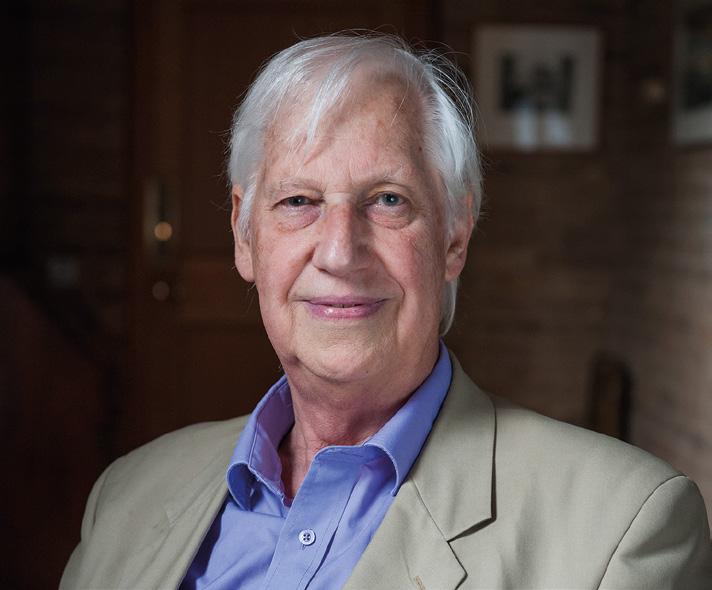
John Knight was born in Pietermaritzburg, in what is now called KwaZulu-Natal. His paternal family had been for many generations Scottish farmers in Aberdeenshire, but his grandfather emigrated to South Africa in 1893. His grandparents farmed and ran a rural agricultural store there, and one of their most unreliable customers was a young Cecil Rhodes. John’s father became a travelling shoe salesman and married the personal assistant of the managing director of a department store which he had visited to sell shoes. But tragically his father died suddenly, when John was only six, from an undiagnosed heart condition just days before being demobilised at the end of WWII. Henceforth his mother brought up two young sons on her own on a small war pension.
John went to Maritzburg College, then to the University of Natal where he gained a first-class degree. A career in the local legal system seemed to beckon, but John had a very pessimistic view of the political prospects for South Africa, so preferred instead to take up the offer of a scholarship to read Economics at Cambridge University. He never returned to live permanently in South Africa.
After Cambridge, in 1962 he took up an Assistant Research Officership at Oxford’s Institute of Economics and Statistics, and subsequently in 1967 a Fellowship at St Edmund Hall. Those two institutions would provide the support framework for his entire career.
John was one of the most distinguished development economists of his generation. Naturally, from his background, he initially specialised in the development problems of African countries and was particularly interested in the effects of education and training on development, on the labour market, and on poverty and income distribution. In 1980 he co-founded, with Paul Collier and others, the Centre for the Study of African Economies, which marked the coming of age of this regional discipline. But in the 1980s, with the opening-up of China, he correctly felt that this would be the most important economic development story of the century and reoriented his focus there. He went on to establish himself as one of the most perceptive western experts on the Chinese economy and fostered the careers of a large group of young China scholars. In his retirement he led the academic side of the OXCEP programme at the Hall, with the generous support of Dr Frank Hwang, now a St Edmund Fellow
John was an applied economist. He was not the most theoretical or the most technically competent of economists, nor did he aspire to be. It was the practical interest of problems that drove him, and those problems had to be both intellectually challenging and relevant to people’s lives. He was a strong believer in interdisciplinarity, one reason why he valued College life so highly. He developed a particular expertise in the running and interpretation of large interview surveys,
again mostly on the effects of education, influencing education policy in many developing countries.
He had immense curiosity (in everything, not just in academic research – on one occasion this curiosity led him inadvertently into a potentially fatal oneman invasion of North Korea) and this produced various interesting sideshoots from the results and techniques of his main research programmes, among them the economics of diamonds, the emerging economic analysis of happiness, and the consequences of HIV/AIDS, Covid and climate change on poorer countries. His published output was prodigious, including five books and over a hundred articles and book chapters, many coauthored with his young protégés.
John had a reputation as an inspiring teacher. Again, it was not a simple technique or model that he propounded, but an enquiring and rigorous approach to problems that perhaps did not present themselves readily in terms of the standard models of the day. He was good at identifying new problems arising from the haphazard course of economic development in the real world, and interesting his pupils in them, rather than sticking with the conventional policy areas apparently defined by the current theoretical paradigms.
He was a long-time Chair of the Editorial Board of the Oxford Bulletin of Economics and Statistics and his advice was sought by many national and transnational organisations. He became a University Professor, and later in his career was a Visiting Professor at both Peking University and Beijing Normal University. He lent his support to various initiatives to expand Chinese Studies in the University, and in retirement he led the academic side of the OXCEP programme which has brought
many Chinese scholars to experience Oxford and its academic methods; he was saddened by the changing political climate in China with its increasing limitations on academic freedom.
Additionally, he became Director of the Institute of Economics and Statistics, and, when in 2000 the University decided to create a fully-fledged Department of Economics, John was a popular choice as its first Head. His success as an administrator was undoubtedly due in great part to a remarkable lack of ego. He rarely wanted things for himself but worked more to foster success in others.
Surprisingly, given the calls on his time from his full research agenda and University administration, he also loved and was very loyal to his College, serving twice as Investment Bursar and as VicePrincipal. He was modest, even shy, and did not relish the limelight. When he knew that he needed to make an important intervention at Governing Body, he tended to write out his words fully in longhand before. But he never shrank from giving the GB firm, even unpopular, advice when he thought it necessary, and his words carried considerable weight and respect. Colleagues will also remember his kindness and gentleness, and his sparkles of good humour, often mischievous.
John was also a devoted family man, partly through a fortunate coincidence concerning the Hall. When Francis Rossotti was elected to a Fellowship in Chemistry at the Hall, he brought with him two of his best research students from Edinburgh. One was a friend of John’s from his youth, the other was Janet Maclean. In visiting the former at the Chemistry lab, John met the latter and the relationship blossomed. They were married for 56 years until Janet’s death in 2020, living almost all of that time in the same house
in Witney, and are survived by three daughters, Rachel, Helen and Alison, of whom they were both very proud.
Martin Slater, Emeritus Fellow
John Knight’s First Class by Peter Crystal
The first-year PPE Class of 1966 had several keen 18-year-olds who looked forward to being taught Philosophy by Justin Gosling, Politics by Jon Dunbabin and Economics by a new enthusiastic lecturer, John Knight, who replaced Dick Smethurst. I am not sure who was more nervous in Economics – the students or our new tutor.
58 years later we can look back on one hand with pride at being taught by two tutors who went on to lead the Hall as Principal and Pro-Principal, and John, an Economics teacher of international repute and a devoted servant and senior officer of the College. On the other hand, the 1966 Freshers’ PPE class boasts Aularians who include: a former very senior civil servant and Knight; a senior Hall academic; a politician who was for over 40 years a Labour MP and is now a Lord; a partner in a prominent accounting firm; and the founder of a large London law firm.
We were lucky to spend our Teddy Hall years being taught by such an eminent economist.
John Knight was a modest, very able and committed academic, an acknowledged expert in his chosen field, and a well-liked and respected teacher by all whom he taught in 1966 and subsequently.
Peter Crystal (1966, PPE)
A Tribute to John Knight by Geoffrey Bourne-Taylor
I was very distressed to read of John Knight’s death; he died too soon.
I got to know John intimately during the 18 years that we were colleagues. As is recorded, he served as Vice-Principal
and, closer to home, several stints as an outstanding Investment Bursar and convenor of the Finance Committee.
Whilst I am not qualified to laud his academic achievements, he was a joy to work with. Let me give just one example: during those years, our domestic staff wages were the envy of Oxford, always towards the top of the pile. Each summer we would budget for an ‘interim’ pay adjustment in line with inflation (well within our means), which meant that there was always intense loyalty amongst the staff and always a queue to work at the Hall. His answer to my question, “Can we afford ‘X’?” was always, “It depends on what you mean by afford.”
John, like Justin Gosling, was a model of ‘old school’ integrity, honesty and frankness, who nursed the College through some of its darker days; and me personally: both were assiduous in their support following my heart attack and as I approached my own retirement and beyond. It was an honour to have served with both of them and count them amongst my friends.
Geoffrey Bourne-Taylor, Bursar 1988–2006
John Knight – A Very Personal Reminiscence by Martin Slater
Some years ago I was asked to say a few words at the memorial meeting for Eprime Eshag, the distinguished economist and my old tutor at Wadham. I remember starting “My first meeting with Eprime changed my life…” It was true. It was 1967, the Oxford admissions process, a second-choice interview at a College I had never heard of, and I knew nothing of Economics. But somehow Eprime agreed to take me on despite his considerable personal antagonism to the new degree course I wanted to follow. College decisions do change lives.
But there was in that room (a very beautiful room overlooking Parks Road) also the germ of another life-changing event and a strange coincidence in the future. I did not know – how could I? – that Eprime had a junior colleague, a young researcher who had recently arrived at the Institute of Economics from Cambridge, and for whom Eprime had arranged a College Lectureship at Wadham.
Some time earlier, that same young researcher, whose research focus was African development, had paid a professional visit to the distinguished development economist Professor Walter Newlyn, then on secondment to the Ugandan government in Kampala. Much later, Walter would remember a young man who was unusually clear in what he wanted his research to achieve and in precisely what information he needed from Walter to achieve it. The young man would remember that at one point in the visit Walter was joined by a gaggle of very little daughters.
I never met John then or for many years thereafter. He only stayed at Wadham a short time; that same year, before I arrived to start my undergraduate career, he moved on to his Fellowship at St Edmund Hall. Neither of us knew of the other’s existence, but if I had arrived a year earlier he would probably have given me firstyear tutorials.
At Wadham I learnt to be wary of St Edmund Hall: it was an unruly place, full of hearties, and Wadham was definitely not a hearty College. Teddy Hall was not a place you would want to go to, not on your own and certainly not at night. So I didn’t. In fact, I never set foot in the Hall until my job interview many years later.
By then I was in my first academic job at the University of Bristol. I was happy there but for family reasons I wanted to
return to Oxford, so I applied for several college fellowships, but without success. After the latest of these failures, my Bristol professor took me aside and advised me that this was all just too soon: one needed to establish a longer track record to have a chance of success. So I decided to give up, and when I noticed an advert for a job at St Edmund Hall I ignored it.
But then an envelope arrived in the post. The address was handwritten, in a flowing script I later came to know well. Inside there was no letter, no signature, just a small copy of the advert for the SEH post. I was puzzled, intrigued, and thought about it for a few days. In the end the temptation was too much, so I went against my professor’s advice and put in an application at the last moment.
I think John may have been on the appointment committee for one of my failed applications. Despite the failure he had obviously liked what he had seen and filed it away for future reference. Years later Mary Boak, the Principal’s Secretary, in an uncharacteristically indiscreet moment, told me that as the application deadline approached, John would call on her every day and ask whether a particular application had been received, and was visibly relieved when he finally got the answer he was looking for.
But being John, although he knew what he wanted to achieve, he also wanted to do it properly, so he assembled a formidable appointment committee, including Nobel Laureate Amartya Sen, Dick Smethurst and Sir Derek Morris. It was unusually late in the academic year, and a very hot day. I arrived in Oxford far too early, so unwisely watched the cricket uncomfortably in the Parks for a while until the interview, which was in the Old Library, and was I think almost the last official engagement of Principal John Kelly. I don’t remember much about the interview itself except that
I narrowly managed to avoid tying myself in knots on a particularly devious question about inflation. I was rather surprised to get the phone call from John Kelly the next morning.
John invited me back to Oxford in the next few days to discuss the job, and that was the first time I actually met him. From that time we ran the Economics teaching in the College together for over 30 years. He was serious and principled, rather shy and ill at ease in public situations, but always considerate, harmonious and goodhumoured. I could not have asked for a
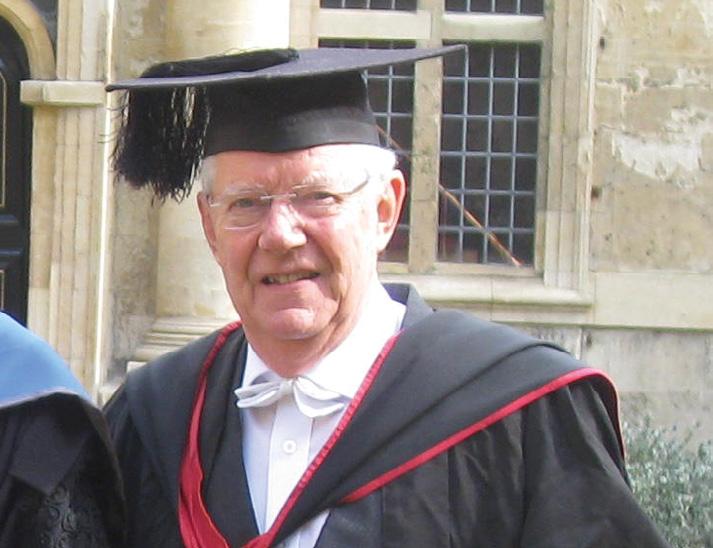
Dr Christopher Phelps passed away on 21 December 2023. Christopher joined Oxford University as Lecturer at St Catherine’s, studying for his DPhil, following his taking a first from Peterhouse, Cambridge, in Mathematics. He went on to take up a Fellowship at St Edmund Hall where he taught Mathematics (mostly to engineers) for 29 years. He was a prominent supporter of the Boat Club (having himself coxed for Peterhouse). He was variously Tutor for Admissions, Dean, and Dean of Degrees for the College. He also helped set up, and latterly ran, the Oxford University Computing Service.
better colleague. John had been carrying the burden on his own for several years, and I like to think my arrival afforded him the space to further his remarkable research career.
That was all still in the future. But by that day John had already gone one better than Eprime: he had changed the course of my life before I had even met him.
Oh, and one of the little daughters from Kampala eventually also became an extremely distinguished Fellow of the Hall – Lucy Newlyn – and we got married.
Martin Slater, Emeritus Fellow
Christopher’s son John asked if the sermon and address from the Memorial Service held in the College Chapel could be published as a tribute to his father.
Love in Action: A Sermon in Memory of Christopher Phelps by Mariama IfodeBlease
The reading at the memorial service was taken from 1 Corinthians Chapter 13, St Paul’s famous account of the nature of love which opens: “If I speak in the tongues of mortals and of angels, but do not have love, I am a noisy gong or a clanging cymbal. And if I have prophetic powers, and understand all mysteries and all knowledge, and if I have all faith, so as to remove mountains, but do not have love, I am nothing.”
May I speak in the name of the Triune God, Father, Son and Holy Spirit. Amen.
St Paul needed to write to the new church community in Corinth to remind them about love because their behaviour indicated that they had forgotten what love was. As one scholar indicates “the context of dissent in Corinth makes Paul’s teachings about love all the more vivid.”1 This was a community that simply did not get on. They argued and they fought,
and this chapter fits into Paul’s wider discussions about spiritual gifts and makes clear that love has primacy of place. This is about love in action. And it is love that perhaps best characterises Christopher Edwin Phelps. As John, his son, said of his late father: “Love welled out of my Dad – the love for Jennifer, for his children and grandchildren, for friends, relations and colleagues, and students.” Christopher made love the engine for the actions in his life in the way that Paul intended, and Jesus laid bare in his own life. As one commentator reminds us “these descriptions might be better translated along the lines of, ‘Love waits patiently; love acts kindly’ and so forth…The love that Paul is describing takes action; it is not a passive feeling toward another.” 2
The roads between Peterhouse, Cambridge, and Oxford already depict some of Christopher’s loves. His love of family, of mathematics and computing. His love of the river. The alumni office at Peterhouse tells me that “while at Peterhouse, Christopher was one of the coxes of the PBC M1 boat, most notably for the 1956 Lent Bumps when the boat was Head of the River. Christopher frequently attended Boat Club dinners and reunions, most recently the Spirit of 1956 dinner in April 2022.” As a graduate of Peterhouse myself, I know how much such victories would have meant to a small college like ours, in which everyone knew everyone, and we rarely had success on the river. Love in action.
Christopher’s love of family is evident here today. We have heard Peter Collins speak so beautifully about how love of subject and colleagues meant that Christopher made friends everywhere he worked. This
is the intentionality of which Paul speaks: deciding what love can do in one’s life and how it should be expressed to our fellow human beings. Christopher’s dedication to his students and colleagues remains vivid, even though he is no longer with us. Activating love, making it an ally, making it central to how you move in the world and through life. From being Tutor in Mathematics here in Teddy Hall in 1972 to Dean of Degrees between 2000 and 2014, and each role in between, professionalism and commitment to the work and life, and students, here may have been at the fore, but love was the engine behind all that. This was love in action. For those who had the gift of this love, you will know how much it has left behind, and the light it still gives.
Today, we recognise the love that Christopher gave and received, and his life, in which love was put into action for the service of others. A love greater than death and a love which never ends.
Chaplain
Christopher Edwin Phelps: An Address by Peter Collins
I first met Christopher in 1963 when I was a second-year undergraduate attending one of his legendary early computer courses. He was looking after a Ferranti Mercury Autocode machine, information being passed around on cardboard cards (the most modern technology). He was already, after a distinguished undergraduate Mathematics career at Cambridge and a DPhil at Oxford, administering the use of the University’s latest computer equipment in an old house at the far end of South Parks Road, now long demolished.
1 Professor Melanie Howard, ‘Commentary on 1 Corinthians 13’: https://www.workingpreacher.org/ commentaries/revised-common-lectionary/fourth-sunday-after-epiphany-3/commentary-on-1corinthians-131-13-7.
2 Ibid.
Christopher progressed, with great distinction, to run the various successors to Ferranti, continuing in this occupation well into the time of the current Computer Services department on the Banbury Road. Along the way, he was the founding Secretary of the Computation Sub-Faculty. We met in the Old Library here at St Edmund Hall.
In 1970, the University made its first serious efforts to find fellowships at existing colleges for senior University postholders without college attachment. St Edmund Hall was indeed fortunate to be able to appoint Christopher.
You may be thinking that he was already so gainfully employed that having lunch with colleagues would be the only space in his diary for College involvement. But Christopher took on the substantial load of teaching Mathematics to physicists and engineers, and threw himself into College life. I calculate that in the 43 years he held College office, up to his retirement as Dean of Degrees in 2014, he held 65 years’ worth of College officerships, and that does not include such additional responsibilities as College Safety Officer.
I have yet to touch upon his human qualities and character, outwardly visible in his role as Dean, a post he held for six years, but also, more intimately, as a tutor and colleague.
In this modern world, when the University’s prestige relies more and more on its research capabilities, and new appointees are thrown on arrival directly into this maelstrom, it has become harder to impose the needs of College community and close association with all we do. Christopher’s work for the College tried to maintain the best of the old world in this modern computer age of which he was a vital link. Christopher was respected – and loved –
by the Junior Members. He could impose authority as Dean without any bluster, and demonstrate an understanding so that his decisions of reason seemed right to all.
I remember one difficult year at the College, when it would have been easy for Senior Members to be at loggerheads with their juniors. At one point, Junior Members had a sit-in on the lawn in the Front Quad. Christopher was superb as Dean in maintaining warm relations with undergraduates, and we saw him spending hours going round the figures seated on the lawn, speaking reason and wisdom. It saved the day, and was crucial in keeping the College together.
More intimately, I remember his understanding when he told me about one of my undergraduates who, for a short while, was under his supervision in a summer job in the Computer Services department. It was invaluable to me in helping this undergraduate. The Junior Members recognised his supportive enthusiasm as Senior Treasurer of Amalgamated Clubs by naming a boat after him, boats having been a lifelong passion for Christopher.
He was known in the Senior Common Room as a kind and considerate colleague, but one who took on College office successfully, and without fuss.
And, if it is so easy for us to recognise Christopher’s qualities, how wonderful, one conjectures, they must have been for his family. His wife Jennifer, whom we greet today, must always to be mentioned alongside. Jennifer, or Jen as he called you, we give our love and continuing condolences to you and to all your family in remembering our fine association with Christopher.
Peter Collins, Emeritus Fellow
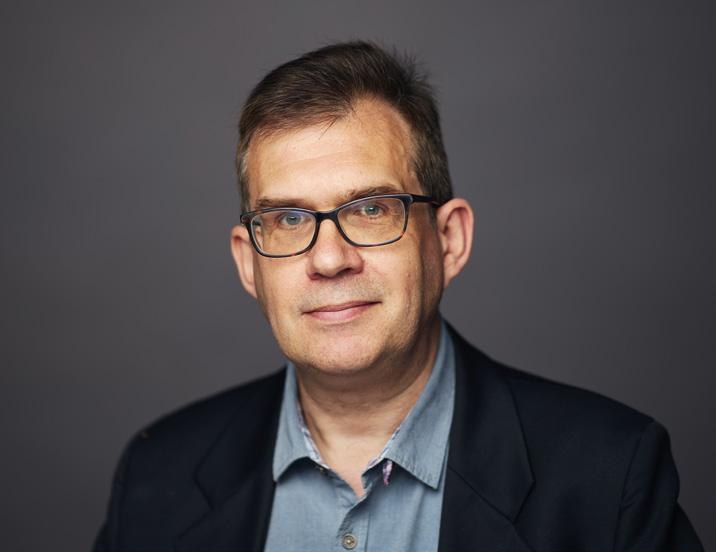
DR JAMES WHITBOURN, DIRECTOR OF MUSIC AND FELLOW BY SPECIAL
This obituary has been provided by the Whitbourn family.
James Whitbourn, Director of Music at St Edmund Hall, passed away peacefully at his home in Kent on 12 March 2024, surrounded by family.
James was born in 1963 in Tunbridge Wells, Kent, where he spent his formative years, before studying Music at Magdalen College, Oxford, as a Choral Scholar. James had a distinguished career as an internationally renowned composer, conductor, producer and presenter, accumulating four GRAMMY nominations among many other international awards and nominations.
James’ career in music began at the BBC, as a trainee producer in Religious Broadcasting. He went on to produce BBC Radio Three’s Choral Evensong from 1990 to 2001; the television broadcasts of Carols from King’s, which he produced for more than thirty years; and the radio broadcasts of notable royal events, including the funerals of Diana, Princess of Wales, and of Her Majesty Queen Elizabeth II.
James, described as “a truly original communicator in modern British choral music,” established a large and varied
compositional repertoire ranging from title music for national events – such as the funeral of the Queen Mother, and the 60th anniversary of the D-Day landings – to large-scale choral works, including Annelies (2005), an oratorio using words from the diary of Anne Frank.
Alongside his work as a producer and composer, James conducted choirs and orchestras throughout his adult life, including the BBC Philharmonic Orchestra, the Academy of St Martin in the Fields, the BBC Singers and the Westminster Williamson Voices, with whom he established a close working relationship.
It was always James’ hope to return to Oxford and immerse himself in musical education. His vision was realised in 2011, when he became an Honorary Research Fellow, then in 2019, Senior Research Fellow of St Stephen’s House, Oxford. There, James, founded the Choral Music Institute in 2013 in partnership with James Jordan and Rider University. He later pioneered the Institute of Sacred Music in partnership with the Royal School of Church Music. This initiative encourages students from all over the world to come to Oxford, bringing their personal experiences of liturgy and music, and sing in one of the most densely populated choral cities in the world.
James was appointed as Director of Music at St Edmund Hall in 2020, fulfilling a long-held ambition to lead a student choir. Having joined in the middle of the Covid pandemic, James found innovative ways to keep the students involved in choral life: his first composition for the College Choir was a setting of the Evening Canticles to be performed over Zoom for a live Evensong. Using the chords provided, students were encouraged to accompany themselves with whatever instruments they had at home. James
was greeted with great enthusiasm from the student body, and an eagerness for musical excellence that persisted until his death. The annual Choir tour to Pontigny is a particularly uplifting tradition for the Choir of St Edmund Hall, with the vibrant and reverberant Pontigny Abbey offering a remarkable acoustic experience.
James was appointed Director of Music at Harris Manchester College, Oxford, in 2022. Juggling these three responsibilities in Oxford gave James great comfort following his cancer diagnosis in 2023: his love for choral music did not falter through periods of deteriorating health, and he looked forward to Choral Evensongs on Sundays as a chance for devotion, immersion, and reflection.
James is survived by his wife, Alison, his children, Hannah, Naomi and Simeon, his parents, Philip and Anne, and his sister, Katherine. He will be dearly missed as the Director of Music and as a highly valued member of the College community. His expansive musical legacy lives on not only in his compositions, but in the countless lives that he has touched with his music.
Harmony Divine: James Whitbourn by Zachary Giuliano
Our departed friend and colleague, James Whitbourn, will be remembered as an extraordinary composer and conductor. I remember the first time we spoke on the phone. It was late in the summer of 2020. I had only been appointed Chaplain shortly before, and he had served very briefly as the new Director of Music, just at the outbreak of the Covid-19 pandemic.
I was nervous and excited. Oxford can be a daunting place to start working. One is always meeting various experts and luminaries. As a singer, I knew James only by his enormous musical reputation, especially that of his larger works: Annelies, the Son of God Mass, and (my
favourite) the Missa Carolae. His voice in my ears set me at ease at once, as did his responses to my questions. It was the beginning of a working relationship that I cherished.
I soon learned that James was a singular musician, in ways that his long CV could not communicate. He had a remarkable sense of pitch and harmony, a lively imagination, and a way of drawing talent out of people. He could be exactingly specific at times, not least when his own music was being performed, but I have never known a conductor who carried the music in his body in the same way. You could see it in the tilt of his head, or the way he held his arms as he listened for the reverberations at the end of a piece. It came out the most in moments of high drama.

On one of our tours to Pontigny, the resting place of St Edmund, I remember him standing in the Abbey Church after we finished singing. He had explained to us many times before that the acoustic was unique, its echo carrying on for 14 seconds after the original sound. (And I should say that this never ceases to be a marvel, no matter how many times it is
heard.) But this time, after we had finished singing a piece by Purcell, perhaps Remember not Lord or Hear my prayer, he stood there and simply listened, barely moving, arms still raised, as the final chord mixed with the unresolved lines that had come before, crashing around in the ceiling and aisles like so many waves on a shore. I will never forget it. He was, in such moments, quintessentially himself: free and exultant.
With various founding, golden lyre, ’tis mine / to fill the world with harmony divine.
James set this line to music in his work
The Seven Heavens. It is drawn from the Orphic Hymn to the Sun, and contains a moment of unusual self-reflection in the midst of those songs devoted to praising the old gods of Greece and Rome. Notably, James’ rendering does not focus on the phrase ’tis mine. His choir moves quickly on: “to fill the world with harmony…to fill the world, with harmony, with harmony, with harmony divine”. In the chamber version, the piano accompaniment ascends and descends around the singing like so many angels, and then the choir begins repeating “Dominus illuminatio, Dominus illuminatio mea” (The Lord is light, the Lord is my light), famously a phrase from Psalm 27 and also the University of Oxford’s motto. The Sun, praised as one of the classical gods, shifts here – and we see the reference has all along been upon the God of the Christian tradition, the Creator and Lord whose light we reflect and in whose gifts we rejoice. It could be hard to get James to talk about himself or directly about his understanding of music. He did not to speak of music in terms of mental health or welfare, though he acknowledged its benefits in those terms as well. He was more frequently driven to reflective silence when we spoke about music together. It was different,
however, if you interrogated a particular piece with him. He once explained to me the numerous inspirations behind the writing of The Seven Heavens; it was like entering into a vast house, with beautiful rooms behind every door.
This line on filling the world with harmony divine opens one of those doors for me, reminding me of James’ imagination and the meaning of his life. He was singularly blessed with gifts that abounded and increased, not just for himself, but to the benefit of others. He was with us at Teddy Hall for only a few short years, but his legacy lives on.
Some words paraphrased from the Chapel’s screen: We pray, Lord, for one taken in the midst of life. May he be welcomed into your heavenly hall.
Zachary Guiliano, Career Development and Research Fellow, Chaplain
A Tribute from the Choir by Sam Cherry When James joined Teddy Hall, four years ago, the Choir was in a rocky place. Many of us had little experience singing. Services were complicated by social distancing – Covid regulations requiring the Choir to be split across three different locations, broadcasting to each other by Zoom. This was an odd job for a musician of James’ incredible status to take on.
Once we found out about his accolades, like his four GRAMMY nominations and his royal appointments – not that he ever brought these up himself – many choristers were left wondering why he’d chosen to work with a College that really had no choral reputation at the time.
But the reason why became apparent to us the more we worked with him. James was a deeply humble man who cared enormously not just about music, but also the communities that made it together. Every member of this Choir will attest to
how transformative working under James was; how he created what felt to many like a second family, a place of constancy and tranquillity through the turbulent years of our degrees. Every one of us has a story of how James reassured us when we doubted our abilities – be they academic or musical – or gave us a chance to take part in making music at a level we thought would always be beyond us. And he continued in this endeavour, selflessly, right to the very end.
When he died, we were all very shocked, and naturally turned to his music: music in which we had found comfort and a glimpse of the beauty of the Divine before. I remember listening to my favourite piece of his, Of One That Is So Fair and Bright, over and over again, on a loop, for nearly two hours. His music for me will forever be tied up with the sound of the long reverberation at Pontigny Abbey, where the echo sustains the beauty of the note far after the singer ceases singing.
We have a tradition in the Choir, after finishing dinner on Sundays, of going back to the Chapel, gathering around the organ and – cheered by dinner and a little wine –singing a few more pieces before we head home. A few weeks ago, we sang Give Us the Wings of Faith. I must admit it wasn’t a stellar performance. At the end, with some of us in tears, someone remarked “I don’t think James would have been happy with that!” And, admittedly, on the musical front, she was probably right. But I hope he would be glad to see his music continuing to move and inspire a group of people who owe so great a debt of gratitude to him.
Sam Cherry (2020, Psychology, Philosophy and Linguistics)
Meeting Us Exactly Where We Were by Oliver Riordan
I’ll just focus on one aspect of how James
interacted with us in the Choir, one which struck me very strongly.
James came to the Choir from a background of operating at an extremely high musical level: as a composer, as a producer at the BBC, and as a conductor and interpreter of music. He was also used to working with professional musicians or the type of Oxbridge choir containing lots of people who have been singing in cathedrals since they were children, can sight read anything, already know a vast repertoire, and so on.
The Teddy Hall Choir, while we weren’t bad, wasn’t (and isn’t) like that.
James was also a person who could have very firm views on how certain things ought to be. You might think this would create a tension, but it absolutely did not. Right from the start, James accepted us as a choir exactly as we were.
Of course, he worked very hard on raising our level, with enormous success, through recruitment, introducing choral awards, arranging singing lessons, general support, and most of all through his teaching in rehearsals and services. But he always started by meeting us exactly where we were, and taking us on from there. There was no sense that he was ever disappointed that we weren’t at his level, or that he was asking us to catch up. In fact, often the reverse – he clearly genuinely loved working with us, and the result.
Of course he was demanding, but in a way designed to stretch us without being stressful: “please come to all rehearsals, and concentrate during them, putting your phones away and treating it as a time away from whatever else is going on in your life and the world; but then we’ll do what can be done in that time from your level.” And I felt that we never had to worry about whether things would work out – he
always made sure that they did.
It’s not just that he adopted this attitude; he was also extremely skilled at understanding what we could do. This showed in his choice of music for services, picking pieces at a level that challenged us and developed us, but always led to a good result, and a lot of really moving singing. He took us well beyond what I would have expected. For example, our live national radio broadcast (at 8:00 in the morning!), and some really beautiful psalm singing, something that I hadn’t appreciated before.
His skill showed at a micro level as well; I remember several times getting nervous on a Sunday afternoon while he was already working on something for the following week, when I knew from the day before that this week’s music was far from ready. But it always turned out that, yes, in the time he left for it (sometimes fully used!), we could get the pieces ready, and not just to an OK standard but to one that was really worthwhile. In short, I was really amazed by how well he understood us as a Choir: what we could do, and how to get the best out of us. For me, it made singing in his Choir something wonderful that I will always remember.
Oliver Riordan, Tutor in Mathematics
Remembering James Whitbourn by Henrike Lähnemann
I only met James during his interview for the position as Director of Music in March 2020, but when he joined the Hall it felt as if we had known each other for much longer. At every dinner conversation I discovered something new: his work on medieval liturgy, interest in Anne Frank, in the history of the Hall, and in historical instruments. There were many occasions for discussing all of these during lockdown when he and I were among the few Fellows still regularly coming in.
As a community, we were hugely fortunate to have his expertise during that time –the only College to keep Evensong going live. James followed the latest guidance on how many centimetres to stand apart, going into the Chapel with a measuring tape, arranging music spread out over different venues, recording remotely.
James and I were very different in terms of temperament and in our attitude to rules. But we respected each other’s approach and recognised the passion for the same fundamental questions. I admired hugely how he would react to some madcap idea of mine by listening attentively, answering cautiously – and then a couple of hours or days later coming back with the perfect solution, turning my rough idea into something beautifully crafted.
We literally went through the highs and lows of College together. The high was that James arranged music for brass playing on May morning from the tower of St Peterin-the-East. The low – but only in terms of building location – was, of course, music making in the Crypt, for which he wrote a bespoke setting of a ‘Murbach Hymn’, one of the oldest German texts in the Bodleian. It was almost certainly a worldfirst that somebody set interlinear glosses to music. James did it, as always with his compositions, in a way sympathetic to the period in which the text was written and also bespoke for the performance location.
I cannot go into the beautiful Norman space below the Library (and most of you know that I go there frequently!) without the scene vividly coming back to me: James half-hidden between the columns, out of shot of the camera but in full command of the Choir. And I can hear the eerie echo of the Old High German words of the hymn for the last service of the night: “Christe, qui lux es et dies / Crist du
der lioht bist inti take...” (“O Christ, who art the light and day, thou drivest darksome night away; We know thee as the light of light illuminating mortal sight.”)
I want to end with the fourth verse from that hymn which we included in the setting; first in the modern English translation and then in the Latin–Old High German antiphonal version which James set. It is a prayer for peace, in life and death:
“And while the eyes soft slumber take, Still be the heart to thee awake, Be thy right hand upheld above Thy servants resting in thy love.”
“Oculi somnum capiant / oucun schlaf intfahen / cor semper ad te uigilet, herza simbulum za dir uuachee / dextera tua protegat/ zesuua diniu scirme / famulos qui te diligunt. scalcha dea dih minnont.”
Amen.
Henrike Lähnemann, Professorial Fellow
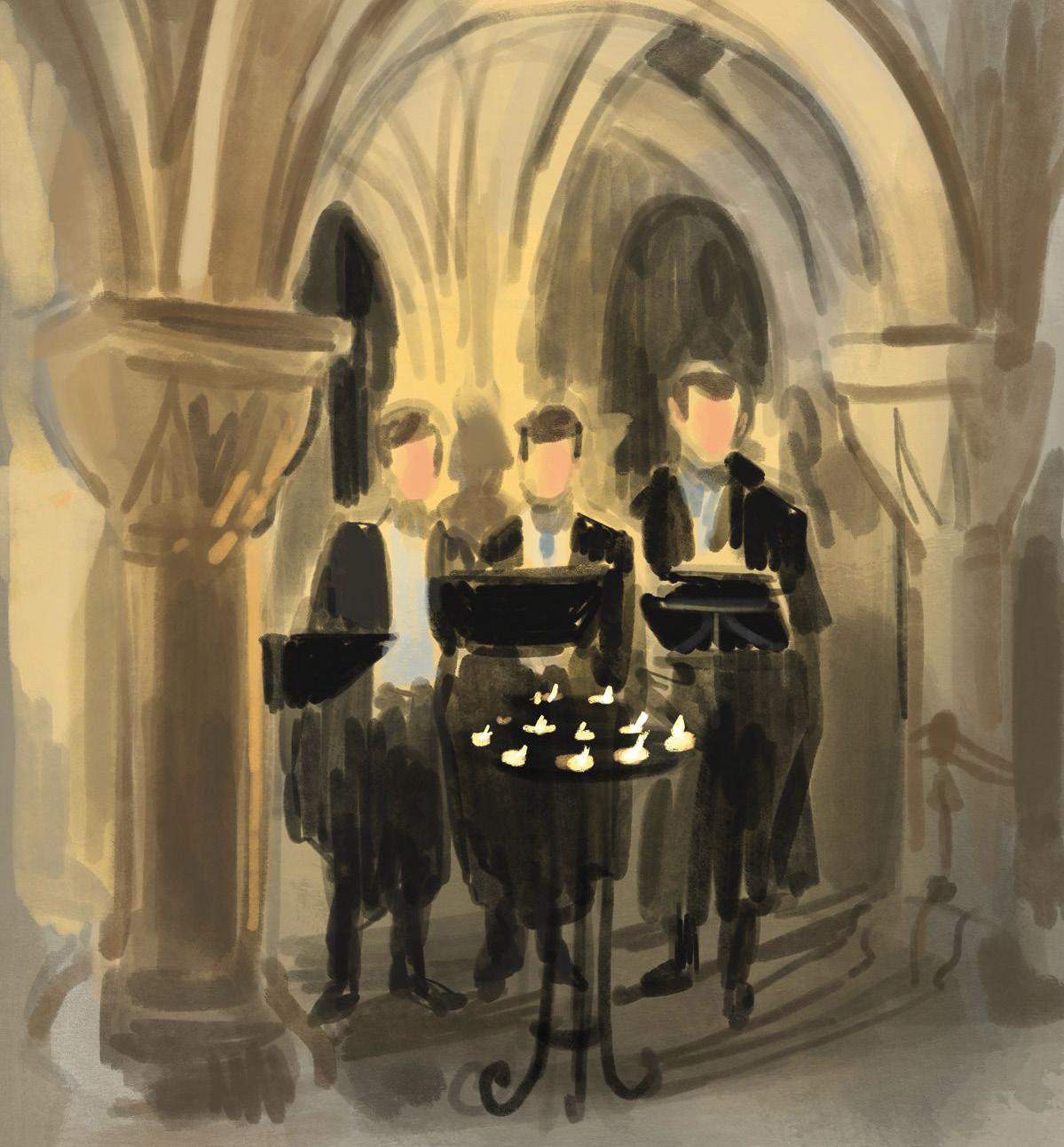
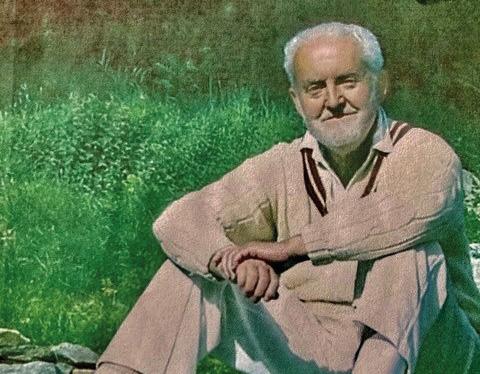
This obituary has been provided by Nick’s friend Ian Robertson.
Nick Boucher was the third President of the Hall MCR and his year of office, 1967–68, is noted on the board of honour in the current MCR. The demands on the President then were much different from today; there was infinitely less organisation, the (all male) postgrads were rather fewer and accommodation and facilities far less sophisticated than now. Nick officiated in that period of student protest in favour of civil rights and against the Vietnam war with his characteristic blend of humour, self-effacement and attention to detail. He himself said that he was not memorable because he was not notorious. He was one of those people who listened intently, so immovably that you thought his attention had lapsed but he then would produce a penetrating observation; he had not only listened but had weighed his response.
Nick was both undergraduate and postgraduate at the Hall in the then unfolding science of Metallurgy, coming up in 1962 and finally undergoing his DPhil viva on 10 October 1970. He thought it “odd and rather pathetic that I remember the date after more than 50 years” but conceded somewhat wonderingly that
it marked the start of an unlikely ninth year at the Hall. He experienced a long succession of student generations. Two extra-curricular activities undoubtedly helped to make the years slip by. His rich natural bass-baritone voice brought him leading roles in operas and oratorios – and, incidentally, was a factor which attracted his future wife – and he had an undying dedication to cricket. He was an artful spin bowler and match strategist, but, counter-culturally for the Hall, he did not aspire to play for College or University. Instead, he loved the atmosphere of village cricket and the camaraderie of informal teams assembled to play midweek matches against established opponents.
Nick played into his sixties for the staff team at the University of Warwick, where his wife had lectured, and was a regular spectator at Edgbaston. His Warwick playing record is set out here for its remarkable longevity and achievement, astounding at any level of cricket. In acknowledgement of the Hall’s fondness for sporting statistics:
Playing career: 1972–2007
Matches: 724
Wickets: 1,332
Best figures: 8-17(8 wickets taken on 5 other occasions)
Club record of 85 wickets in season –2003
Runs: 3,539
Highest Score: 91
Catches: 109
Nick married Jill on 9 January 1971 in the Hall Chapel, in a service conducted by Graham Midgley. Jill went on to head the Department of Human Communications Sciences at Sheffield before becoming Professor of Developmental Psychology at City University. Her award-winning book
Autism Spectrum Disorders went into its third edition in 2022.
Nick started work as a metallurgist in Coventry before moving to Glynwed, the international engineering conglomerate, in technical roles, but his versatility led to appointment as Planning Manager. Time for diversified conglomerates was running out and Glynwed, owner of Rayburn and Aga, was no exception. Nick travelled the world trying to make sense of the constituent businesses and deliver shareholder value but, almost inevitably, the company split into its component parts. In retirement Nick advised the design-led cutlery firm Robert Welch in transforming itself from a family firm to a corporate business with structure and ethos able to hold its own in international markets.
In 1975, Nick and Jill took on two decrepit cottages and a weed-filled field near Stratford-upon-Avon which they transformed into a self-sufficient dwelling, with heat and light generated by straw bales obtained from a neighbouring farmer, their own water supply and a

natural sewage system. Their particular joy was the development of a garden with many unusual botanical features and a grass tennis court played on regularly until latter years. It was a wonderful playground for their two sons, Joe and Tom. In the eulogy for Nick, Joe wrote “Where do I start? Digging the well, making the tennis court, going to Test matches at Edgbaston and, in snowy years, digging caves in the snowdrifts and tying the sledge to the back of the car and being towed up and down the drive.”
Nick fought a long battle with myelofibrosis, a type of bone marrow cancer, terminal but always underplayed by him and warded off beyond predictions. He died on 9 July 2024, peacefully, in the house that he and Jill had lovingly curated. If the Hall archetype down the years is someone academically able, sporting, capable, modest, pragmatic and possessed of both hidden talents and an ability to see the ridiculous in life, then Nicholas Alan Boucher was one of those individuals.
Ian Robertson (1967, English)
Eric Caines was born on 27 February 1936 in the West Yorkshire mining village of Stanley to Ernest Caines, a miner, and his wife Doris, who returned to work in a mill when Eric went to school. A grammarschool boy at Rothwell Grammar School, Wakefield, his first undergraduate degree was an LLB Hons from Leeds University after which, as a conscript, he held an Army Short Service Commission from 1958 to 1961. Both at university and in the army he was a bruising rugby player.
Eric then worked for the National Coal Board on a scholarship and the BBC before finding a natural home in the Civil
Service as a Direct Entry Principal in the then Ministry of Health in 1966. It was a career, leading to his promotion to Deputy Secretary, that played both to his lifelong interest in politics and policy and to his very considerable strengths: an incisive but practical intelligence, critical reasoning, articulacy, and an ability to command the respect and affection of those who worked for him. Among a succession of high-level managerial posts, he was a Director of both the NHS and the UK Prison Service and a member of a Government Inquiry into Policing. In the late 1970s he also worked on secondment from Whitehall as Secretary to the Joint World Bank/International Monetary Fund Committee on Staff Compensation Issues (the Kafka Committee) in Washington DC. On leaving Government service, he became Professor of Health Service Management at Nottingham University. In these posts, he spoke and wrote extensively on public sector management and was an acknowledged expert on industrial relations. In 1993 he was made a Companion of the Order of the Bath.
On retirement Eric pursued more rigorously the spirit of intellectual enquiry which he had demonstrated throughout his life in his prolific reading and the very many courses he undertook, including a four-year University of London Diploma in the History of Art. After deriving immense satisfaction from a course for the Oxford Continuing Education Department’s Foundation Certificate in History, he gained admission to St Edmund Hall in 2005 to complete his Oxford Modern History undergraduate degree. That was immediately followed by a History MSt and inexorably on to a doctorate which examined how Edward Heath and Margaret Thatcher, during their respective
years as Conservative Opposition Leaders (1965–70 and 1975–79), managed their Party’s attempts to ensure a return to government, each after two electoral defeats. He subsequently gained an MResearch at King’s College, London, under the aegis of his doctoral external examiner.
Undeterred by age, Eric built on his degrees with a prodigious publishing record: first his thesis monograph, Heath and Thatcher in Opposition (2017); then How Political Eras End: 1906 and 2017 (2020); and finally, The Conservative Party and the Creation of the Welfare State (2022) when he was 86.
Beyond the worlds of work and academia, he was a sociable man, relishing the cut and thrust of humorous debate with friends. And he saw himself primarily as a family man. In 1958, Eric married Mary Stubbs with whom he had three sons, Simon, David and Matthew. After divorce, in 1984 he married Karen Higgs with whom he had two further sons, Daniel and Adam. He and Karen shared a very lively interest in literature, plays, concerts, opera, art, travel. And books, always too many books for the bookshelves despite wifely remonstrances.
It was typical of the man that he insisted on drafting his own death notice for The Times which read: “Eric Caines died, reluctantly, on [28 January 2024], at home in Oxford. A civil servant to the last, he drafted this notice himself, wanting to thank all those who enriched his life for their warm friendships, immense kindnesses and generosity of spirit — and above all, his beloved family...for their enduring love.”
Karen Caines

This obituary has been provided by Maresq’s son, Matthew Child, and daughter, Emma Child.
Born in 1938 in Kingston, Maresq Child spent most of his early years in Surbiton (and Somerset to which he was evacuated during World War II), then boarded at Sutton Valence School in Kent. In 1956, he went up to the University of Oxford on a scholarship to study Medicine and continued his training at St Mary’s Hospital Medical School until 1963. He started his career as Houseman at Harold Wood Hospital in London (1963–64) and then as a General Practitioner at a surgery in Eastbourne, East Sussex (1965–67).
Maresq and his wife left the UK with their first son in 1967 to take up a two-year posting as a General Practitioner in Essex, Ontario, Canada – that turned into 57 years, during which time Maresq provided care to thousands of patients and up to five generations of families.
Concurrently to general practice, he also worked in the wider Essex County and City of Windsor area, at the local jail, nursing home, various hospitals, and as an Inquest and Investigation Coroner for the Province of Ontario.
Although Maresq prioritised medicine, he put a lot of energy into other areas of his life. He rarely utilised the services of professionals, mechanics or tradespeople – choosing instead to file his own taxes, manage his own investments, service his own cars, design and build the family home (except block, brick and plaster), and the list goes on. Of course, every man has his limits, and he never did learn to boil an egg or empty the dishwasher.
He was a dedicated patron of the arts, with a particular affection for the Detroit Opera in Michigan, USA, the Windsor Light Music Theatre, and especially the Windsor Symphony Orchestra, where he served as a member of the Board of Directors. Maresq also maintained his ties to St Edmund Hall, as a long-standing donor and regular attendee of the Hall’s reunions.
Maresq travelled widely, usually with his wife and often to visit his daughter during her overseas postings; adventures which took him all over the world. He also believed in the physical, mental and social benefits of sport, enjoying rugby as a young man in England, and playing squash three times per week into his early 80s. Weekly squash matches with his son usually ended with a triumph for experience and wisdom, and the resolution of a world problem or two over a cold beer following play.
In his own, quiet way Maresq was dedicated to his family and provided all the support his four children needed to find their ways in the world (two of them came to live in the UK). Lots of quality time on the ski slopes and in the sun were wonderful childhood experiences for them that were only partially offset by wilderness canoeing in cold and wet conditions. Once the grandchildren started to arrive (seven in total), he convened the extended family of 17 numerous times in
Europe and Canada, allowing the forging of relationships between cousins from two continents that will endure.
Dumaresq Marner Child was the beloved husband of Eryl (née Robinson) for 60 years; father to Matthew, Daniel, Emma and Hannah; grandad to Isabel, Sophie, Lucas, Aidan, Annabel, Alexander and Oliver; and brother to Romilly Killick.
This obituary has been provided by Neil’s son James.
Neil Hall died on Saturday 22 June 2024 in Hereford County Hospital after a short illness.
Our father had a rich and fulfilling life. He was born in 1931 (living in Bedford and Hertfordshire) and experienced the war years as a child and young person. After attending Bedford School, he did his two years’ National Service with the Royal Signals before going up to Oxford to read History at St Edmund Hall. Whilst in Oxford, he met our mother (Rosalie Chalk, who read English at St Anne’s College) and felt the call to Christian ministry. He stayed in Oxford to read Theology at Regent’s Park before marrying Rosalie in 1957 and starting his local church ministry in Bletchley (St Andrew’s Baptist Church), Coventry (Quinton Park Baptist) and Reading (Abbey Baptist).
In 1980 he became the Baptist Superintendent (a form of Baptist bishop) for the West Midlands, working with 200 churches and hundreds of church leaders until his retirement in 1994. He and Mum
He was predeceased by his parents Raymond and Valerie (née Gadd), and brother Jonathon. The family were all heartbroken at Maresq’s departure and miss him terribly, but his influence will continue to be felt through the actions and kindness of all who knew him. His was a life exceedingly well lived.
responded to three separate calls to serve the Church in Nepal in 1994. They retired from these roles about four years later but remained active in church and community life in Hereford (their chosen retirement location) for many years after that.
He and my mother were the first of three generations of Halls to study at Oxford. Neil is survived by four children, eight grandchildren and six great-grandchildren (with a seventh on the way!). In later years he enjoyed visiting all of his family many times and also extended his sporting and musical interests considerably. We will miss him a lot.
Dad died peacefully, having said to me that he believed it was his time. He loved God and people. Dad took a very active role in the Watkins Court community in Hereford where he and Mum had a flat. Since Mum’s passing in 2018, this amazing, friendly community has continued to provide fantastic support and he has been even more active within it.
Dad was passionate about justice and peace and would have been disappointed to miss the general election in which he planned to cast his tactical vote!
James Hall (Regent’s Park College, 1979)

This obituary has been provided by Barrie’s wife Bridget.
Barrie Mayes was born in Madras (now Chennai), India, where his father ran a British engineering company. Barrie had a difficult start in life as both his mother and his younger brother had died by the time he was six. He was sent to prep school at Fonthill School, Sussex, and his father returned to India with his second wife with whom he had two other sons. Barrie returned to India only twice but like many with a colonial background, travel played an important element in the rest of his life.
After Fonthill, Barrie attended Cheltenham College and in 1959, he went up to St Edmund Hall to read Engineering and Physics. He was immensely happy at school and at university, and he made friendships there that were life-long. Barrie was an impressive, elegant figure in the Hall, envied for his style and apparent confidence, excelling without effort or fuss. He stood out to his friends as being more sophisticated than those who had come straight from school. An excellent rugby player and oarsman, he rowed for the Hall’s Second Eight at a time — he would stress — when the First Eight provided some of the UK’s Olympic rowing team.
On graduating, Barrie moved to London where he was to live for most of his life. His career began at Ove Arup & Partners as part of the structural engineering team on the Sydney Opera House project, but he was not temperamentally suited to the backroom nature of the work, especially the long hours at a drawing board. He switched to the emerging discipline of management consultancy, firstly at Industrial Market Research Ltd and then at PA Management Consultants, and at Systems International, a Rolls-Royce subsidiary in Belgium.
Barrie enjoyed the variety and pace of life as an independent consultant, which saw him undertake projects in Europe, Africa and the USA, as well as in the UK. Latterly he worked in corporate finance at Barings, Hill Samuel, and West LB Panmure, where his engineering knowledge was particularly appreciated by clients.
Sport remained an interest throughout Barrie’s life. He became an accomplished skier and ski mountaineer, and he climbed Kilimanjaro in Tanzania and, later, Toubkal in Morocco. Sailing was his great passion though; and it was on the water that Barrie could recharge best, through the challenges of competitive racing. For many years, he spent summer weekends at Cowes racing his Etchells day boat and he won the class’ national championships in 1993.
Later, Barrie and his wife, Bridget, whom he met in 1994, fell in love with two places: the Isle of Purbeck peninsula in Dorset, and Crete, both rugged and rocky places with fascinating histories. It was no surprise when they took on the restoration of an old Purbeck stone house, eventually moving to the area permanently in 2000. Retirement meant that Barrie could spend more time sailing, by now on an ocean-going yacht which he took pride
in maintaining himself. He made good friends with the “proper sailors” of Poole Harbour and its several sailing clubs. He was fascinated by their stories and they in turn respected his racing skills and his toughness and warmed to his enthusiastic respect for the spirit of Purbeck.
Off the water, Barrie loved walking
This obituary has been provided by Jeremy’s friends David Cox and Peter Driscoll.
At St Paul’s School, Jeremy started out as an extremely speedy wing three-quarter. However, his second year was cut off by an attack of polio for which the treatment was complete and lengthy immobilisation. This meant staying on at school for an extra year to complete his exams. Once recovered he took up rowing, with success.
At school Jeremy met Peter Driscoll (1963, Social Anthropology) and they came up to the Hall together in 1963. Jeremy read Geography and only later did he admit to not having studied the subject before! He took an honourable third and as such said, with a smile, that he was proud to be in the similar illustrious company of other sporting geographers.
Jeremy had a passion for rowing, at a time when the Hall was at one of its peaks. He rowed for the College and gained five oars, being in the head crew for Torpids in three consecutive years. Keen on the outdoors he also set up, under Dean Midgely’s patronage, the Hall Saddle Club. This was very popular and involved Jeremy in organising lessons and early morning rides for a wide membership including the Dean himself.
After Finals, Jeremy found City banking not to his liking and returned for a Dip Ed.
the spectacular and varied Purbeck landscapes with his beloved salukigreyhound lurcher by his side. He was active in village life as chairman of a Community Land Trust and as treasurer of an arthouse cinema club whose screenings enabled him to oil his rusty French.
Bridget Mayes
Then he went to Dartmouth and joined the Royal Navy on a short service commission. He regretted being denied a transfer from instruction into submarines, leaving the Navy to pursue other education-based avenues, including spells abroad such as in Saudi Arabia. Finally, he settled into a lectureship at York University. This made it possible to enjoy the Lake District on a regular basis. He bought a 17th-century farmhouse near Appleby, where he and friends spent countless hours on a long restoration project.
After retirement he continued this project but eventually moved south to Sussex to be near his widowed mother and family. Already, at the farmhouse, there were early signs of health problems, but we did not know these signs for what they were. Jeremy had inherited, unknown to all, the genetic condition that led to Huntingdon’s chorea, for which there is no cure. This progressively damages the brain’s nerve cells, and it led inexorably to the gradual destruction of his body and speech. He spent a long final period in a splendid residential centre.
However, Jeremy did achieve one of his greatest aims.
Jeremy’s father, Frederick Mew whom we now know also had chorea, was the son of a blacksmith and displayed extraordinary artistic gifts at a very early age. He became Chief Designer for Cartier of London, responsible for many of the great pieces of jewellery for the Royal Family and
many more, from the 1930s onwards.
Jeremy held a great archive of his father’s designs and watercolours, which, after a very lengthy process, were finally and enthusiastically accepted for the nation by the Victoria and Albert Museum. One of Jeremy’s greatest aims was that his father’s talent be recognised.
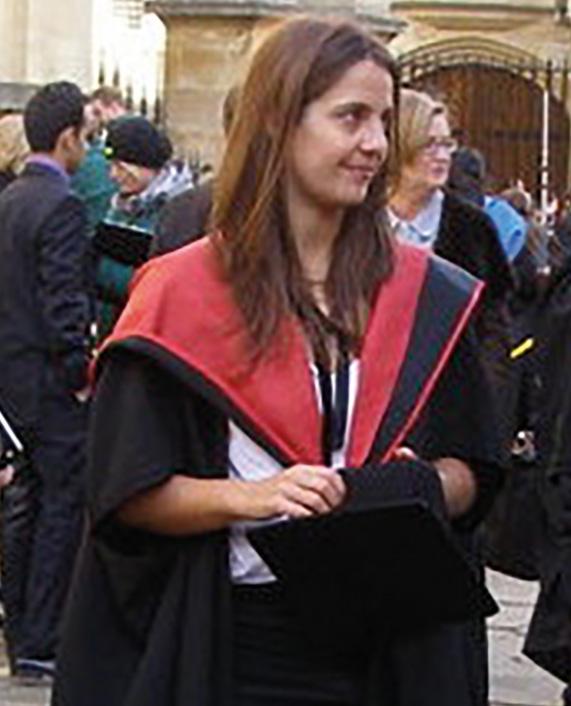
This obituary has been provided by Hannah’s friend Caroline Holdsworth on behalf of Hannah’s friends and family.
Hannah Murray embraced Hall life from day one – and was often found chatting with friends over a cup of tea in her Emden window seat, playing games in the College Bar, reading in the Library and Graveyard, or paying a late-night visit to Mehdi’s kebab van. Hannah loved the city of Oxford, but it was hectic compared to home in rural Devon. She regularly instigated a quiet walk through the University Parks and into the peaceful green of the countryside beyond.
Hannah was a proud Teddy Hall girl, following in the footsteps of her father,
Jeremy bore his affliction with great dignity and fortitude, never losing his lively sense of humour. He was a man of true courage and whenever there was mention of the Hall, his eyes lit up.
David Cox (1963, Geography) and Peter Driscoll (1963, Social Anthropology)
Simon Murray (1967, Modern Languages); grandfather Sir Ralph Murray KCMG CB (1927, Modern Languages); uncle Ingram Murray (1957, Jurisprudence); and cousin Al Murray (1987, Modern History). Throughout Matriculation, Finals and Graduation she carried the family mortar board, always grateful for the chance to read Psychology at such a seat of learning. Hannah rarely faced the pre-tutorial ‘essay crisis’ common for many undergrads, instead working steadily through each week to deliver her papers without fuss. She also found time to embrace much that Oxford had to offer, playing for the SEH Women’s Rugby XV and OUWRFC 2nd team, reeling at the Caledonian Society, rowing for the College Women’s 2nds while wearing ‘bunny ears’, and even taking blades one Summer Eights. Hannah was also a member of the College ‘croquet club’, which, in line with Hall tradition of the time, owned neither hoop nor mallet, but did a strong line in cocktails.
Alongside the sports and socials, Hannah had a creative side, performing Neil LaBute’s four-person play BASH, firstly at the Burton Taylor in Oxford and then at Edinburgh Festival in 2001, with fellow Teddy Hallers Jonathan van Tulleken, (2000, Experimental Psychology), Sam Trounce (1999, Experimental Psychology) and Catriona Ward (1999, English). One critic described the ambitious production as “unsettling, thought-provoking […] universally excellent.”
The friendships forged during these
intense yet dreamy days at Teddy Hall remained with Hannah for the rest of her life. Graduating with first-class honours, she had relished being stretched by some brilliant and nurturing individuals, including Professor Maryanne Martin, her Teddy Hall tutor. Hannah then dedicated herself to what became an extraordinary career in clinical psychology, with a focus on post-traumatic stress disorder (PTSD) and cognitive behavioural therapy (CBT).
After graduation, Hannah moved to London, for several years sharing homes with friends from the Hall, including Kate Ashbridge (2000, Mathematics and Computation) – who passed away on 15 May 2007 and whom we continue to hold in our hearts.
Hannah went on to complete her DClinPsy at University College London in 2008, and spent a decade working in specialist NHS PTSD services, including with victims of torture and UK veterans, travelling internationally with her work. During that time Hannah also achieved an MSc in CBT (Kellogg College, 2016). She became a go-to expert to train other psychologists in CBT techniques, often running workshops at global conferences.
Most recently, Hannah helped develop PTSD treatments as a research clinical psychologist at the Oxford Centre for Anxiety Disorders and Trauma, led by Professors David Clark and Anke Ehlers. She supported the wider team in conducting trials and sharing findings through academic publications, expert presentations and clinical teaching. Hannah leaves a wealth of research (52 publications; 346 citations), alongside clinical guidance and training videos –many translated for non-English speakers. She made these freely available via oxcadatresources.com, the Department’s website, which offers multi-media resources to support professionals
treating PTSD and social anxiety disorder. This second phase of living in Oxford saw no let-up in Hannah’s ‘work hard, play hard’ attitude. Having enjoyed dance in her youth, Hannah started attending classes after work and soon became an accomplished salsa performer, training regularly with other aficionados, including competing and performing in striking Lycra outfits for shows – initially with Oxford University Salsa Team (black leotard and feathers), before joining Con Sabor (blue sequins). Not one for limelight, Hannah kept her dance achievements to herself, until mischievous Teddy Hall friends tracked down photo evidence.
Hannah relished travel and to see new things, and she made it happen – be it a short trip for sunshine or skiing or art galleries, or a longer stint abroad with a backpack. Whether with family, friends or for work, Hannah’s curiosity for cultural and geographical wonders took her to far-flung places both on and off the tourist trail. On a quick survey, friends from the Hall have recalled that between them they have been with Hannah to France, Spain, Portugal, Ibiza, Dublin, Northern Ireland, Greece, Istanbul, Costa Rica, Canada, Italy, Sicily, Croatia, Prague, Scotland, Singapore, Switzerland, Cambodia, Zanzibar, Tanzania, Kenya, Mozambique, Miami and Key West, New York, and South Africa.
Professionally, Hannah drew huge satisfaction from her book, Working with Complexity in PTSD (Routledge, 2023), co-written with long-time colleague Sharif El-Leithy. The book also led to the website www.workingwithcomplexity. com. She committed herself to producing it whilst undergoing significant treatment for cancer. With a startling courage, alongside the no-fuss resilience noted at Teddy Hall, Hannah somehow got it done. She wrote on X what a milestone it was
for her, “while writing the book, I never knew if I’d be around to see it published” [@MurrayPTSD]. Hannah dedicated the book to the oncology team in Oxford who had supported her through all stages of her treatment. She loved her work, ever grateful to her team of colleagues, and she continued to supervise research students and give seminars until very near the end.
At a happy summer soirée in July 2022, the evening of her book launch, it was announced that Dr Hannah Murray was to be made an Honorary Fellow of the British Association for Behavioural & Cognitive Psychotherapies (BABCP). This marked her distinguished impact on the evidence base and extensive clinical work that directly improved so many people’s lives. With elegance and guts, she glowed that night.
JACK ROWELL OBE (1956)
This Obituary originally appeared in The Guardian on 9 July 2024.
When rugby union’s wall of amateurism began to crumble in the late 1980s and early 90s, Jack Rowell’s Bath club were already professional in all but name. Bath dominated English club rugby and it was inevitable that Rowell, who has died at the age of 87, would go on to coach England.
Rowell’s time as national coach was a turbulent one and he was a divisive figure. Complex, acerbic and sensitive, he was successful on the national stage, leading England to a grand slam and 21 victories in 29 games. But he came into conflict with his high-profile captain, Will Carling, treated the media with ill-disguised contempt, and his time with England did not end happily in 1997.
Rowell, a successful businessman outside the world of rugby, presented himself as an anti-establishment figure. A bluff, imposing figure at 6ft 7in, he
An award has been developed in Hannah’s name by the BABCP’s Cognitive Behavioural Therapist journal, in honour of her contributions to the publication and the wider field. The Hannah Murray Practitioner Paper of the Year award is to be given annually for papers that excel in helping clinicians improve delivery of CBT. Aimed at boosting the profile and confidence of early career academics and NHS practitioners, this is an initiative that Hannah would have been especially proud to support. The award was presented for the first time this year at the 2024 BABCP conference.
Hannah is survived by her husband Glenn, step-daughter Mia and her cat Frederica (Fred).
Caroline
Holdsworth (2000, English)
became something of a poacher-turnedgamekeeper when he took the national coaching job after the term of Geoff Cooke.
At Bath he would often tell some of his star players: “That may be good enough for England, young man, but not for Bath.” That cutting, if tongue-in-cheek, approach to management worked in the club environment at Bath, where he was seen as a godfather figure. But it cut little ice with senior England players such as Carling and Rob Andrew.
What cannot be disputed, though, is Rowell’s success with Bath, who became an unstoppable force. The club won 13 trophies between 1978 and 1994, and they did so playing a dazzling style of rugby never before witnessed in the English club game. Rowell was a visionary coach who admired the panache of Pierre Villepreux’s Toulouse club, and he wanted Bath to win by playing entertaining, 15-man rugby. His strength was teambuilding and spotting the right players to allow him to complete his vision.
Born in Hartlepool, he was the son of Monica (née Day) and Edwin, a coalshipping supervisor. He was educated at West Hartlepool grammar school and studied Philosophy, Politics and Economics (PPE) at St Edmund Hall, Oxford.
In his first weeks at university Rowell injured his neck playing rugby and was told his playing career was over. However, stubborn as ever, after a period working as a chartered accountant he returned to playing in his late 20s when he appeared as a lock forward for Hartlepool, Middlesbrough and then Gosforth, who were at the time a force in English club rugby. After four years with Gosforth he became their coach, leading them to John Player Cup wins in Twickenham finals in 1976 and 1977.
Moving to Bristol to take up a job as finance director of Lucas Food Ingredients, he approached Bath with the idea of becoming their coach, but the more traditional elements at the club were wary of his outspoken reputation and he was initially rebuffed. They soon changed their mind, and both Rowell’s business and rugby careers took off. He became chief executive of Golden Wonder Foods, where he saw the potential of a little-known product called Pot Noodle, and then a director of the food company Dalgety, of which Golden Wonder became a part.
After taking the reins at Bath, Rowell began to build his formidable winning machine. He saw the potential in the Bristol fly-half Stuart Barnes. Bristol were a much bigger club than their local rivals in those days but Rowell was happy to replace John Horton, who had helped England win a grand slam, with the young fly-half who was to go on to become an important lieutenant of the coach and play for England himself.
Rowell also harnessed the talents of players such as Jeremy Guscott, Simon Halliday, Jon Hall and Nigel Redman to eclipse Leicester as the major force in England.
It was no surprise when England came calling, and an early grand slam and a triumph over South Africa in Pretoria as well as an epic World Cup quarter-final win over Australia in 1995 gave notice that Rowell’s England were a major power. But Jonah Lomu trampled over England’s World Cup hopes in their semi-final and things began to unravel for Rowell.
His strained relationship with Carling took a new turn in 1996 when he made the Bath centre Phil de Glanville his new captain. This was an eccentric move by the coach. De Glanville had been tearing up trees at his club for a while but now Rowell had to drop either Guscott or Carling, breaking up what was then arguably the most effective centre partnership in world rugby. Guscott lost his place for a while, a baffling outcome for England supporters. Under Cooke, England often played forward-dominated rugby and Rowell did at least try to expand their horizons –under him they dominated what was then an average Five Nations Championship. He was, however, effectively a part-time coach, having combined that job with his role at the Dalgety group. He rejected an offer to extend his contract in 1997 to focus on his business career.
Later he became a non-executive director at Bristol and the club’s managing director before returning to Bath as director of rugby in 2002. He was made OBE in 1998. Rowell’s wife, Sue (née Cooper), a teacher whom he married in 1969, died last year. The couple had two sons, Dominic and Christian, who both survive him.
Ian Malin

This obituary has been provided by Nick’s brother Simon.
Nick Staite passed away on 15 January 2024.
After leaving the Hall, he trained as a solicitor in London before joining the Crown Prosecution Service (CPS). During his 28 years at the CPS, he led the prosecutions of a host of serious and organised crimes, from drug and human trafficking to fraud, conspiracy and money laundering. In many of these cases, he was responsible for securing the restraint and confiscation of criminal assets both domestically and internationally.
As a CPS trainer, Nick used his talent for training and mentoring to build the capacity of police and aspiring Crown Court advocates in investigating and prosecuting serious and organised crimes and in managing complex, multijurisdictional cases. He retired from the CPS at the end of 2014, then immediately joined the Basel Institute on Governance.
At the Basel Institute, Nick worked with the International Centre for Asset Recovery team in Eastern and Southern Africa. He was part of a pioneer team in Malawi, brought in to support authorities in tackling one of the country’s most notorious corruption cases, and was instrumental in anchoring financial
investigation and confiscation techniques in the practices of our Malawian counterparts.
Also in Malawi, and later in Kenya and Tanzania, Nick helped build stronger laws, practices and policies. These are now put to good work to recover illicit assets and fight for societies with less corruption and less poverty. These overarching goals were Nick’s main professional motivation (as he was driven, of course, by his legal curiosity) but more importantly by the conviction that one can, and one should, aim to make a difference.
Nick was also a constant source of knowledge and inspiration to colleagues, always the first to freely help solve complex legal conundrums with his boundless knowledge of law and jurisprudence, and he developed strong professional and personal bonds with the people he worked with. The Institute’s Managing Director, Gretta Fenner, remembered: “Nick had a huge heart of gold and a beautiful sense of humour. He was also an outstanding professional and a brilliant legal mind. He has enriched our work and shared generously his experience and expertise.”
Nick’s love for Africa and its people was not only shown in his dedication to his legal work there. Very early on during Nick’s time in Malawi, along with colleagues and others, he supported a local charity that used art to raise funds for the Streetwise orphanage in Mwambwakanthu, near the capital Lilongwe. His compassion and generosity knew no bounds and from helping to purchase land, he and colleagues helped to build a school and subsequently a second community building to support the local people. His support to sustainable projects for Streetwise continued right until the end.
His eldest daughter, Alice, set up a JustGiving page before Nick’s funeral in February and over £5,000 has been raised to continue the support of the charity (and
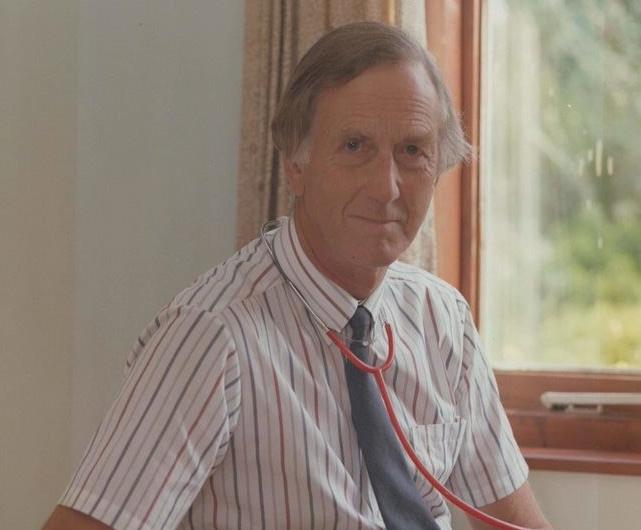
JOHN HOLMAN BENTLEY WILLIAMS (1948)
This obituary has been provided by John’s son David.
John Holman Bentley Williams, formerly Medical Director at Mount Edgcumbe Hospice, Cornwall and prior to that a GP in Reading, died from the effects of frailty, old age and dementia on 27 November 2023.
John was born in Eastbourne where his father was a GP, colleague of the infamous Dr Bodkin-Adams. He first completed National Service, where he was in the RAF athletics team, and went on to study Medicine at his beloved St Edmund Hall in Oxford. He joined the Oxford Athletics team as a hurdler and was at Iffley Road competing the day Roger Bannister ran the first four-minute mile in 1954.
Shortly after qualifying he started working in a two-partner practice in
thanks are given to all those from the Hall who have contributed).
Simon Staite (1976, Geography)
Reading, which grew in patient and partner numbers over the 25 years he worked there. John was much loved by his patients and was proud to offer them holistic care around the clock. He was passionate about community obstetrics and was a dedicated trainer – remaining in contact with several trainees until he died.
In 1970 John volunteered to work with the St John’s Ambulance Brigade in Nigeria just after the Biafran War and would often recount tales of his time there in later life.
In 1984, John relocated from Reading to Cornwall, where he worked as the Medical Director of Mount Edgcumbe Hospice. He loved caring for the hospice patients, as well as walking alongside the friends and relatives of those patients needing palliative care.
In retirement he did locum jobs in Scotland and New Zealand, and was involved with an organisation setting up palliative care in Russia. John travelled widely, and as a member of the Third Order of Franciscans, his Christian faith supported him throughout his life. In 2021, as he got increasingly frail, he moved into a care home. John died peacefully with his son and granddaughter by his side. He was predeceased by his first wife Margaret (in 1996) and his second wife, also Margaret (in 2020). He leaves four children, 11 grandchildren and five great-grandchildren (so far).
David Williams
From a letter sent by Bob Chard (1961, Geography): “There has been much talk about The Hall Spirit, but who invented it and who developed it? The attached record of my experience in 1962 is just one example of how trust, co-operation and friendship was developed between all members of the Hall community… The Hall Spirit.”
One day in my first year in College a group of about five of us students had left an evening event on the other side of town. Leaving early around 9pm we estimated that walking directly at a brisk pace we would reach the vicinity of the Hall just in time to have a ‘swift half’ in a pub before the Hall gate closed at ten o’clock (allegedly to keep out town hooligans). Our route passed the Mitre Hotel, which students rarely frequented, but moving through the crowd we placed our order with the barman: and by chance we were then standing next to Graham Midgely, the Dean of the Hall. As always Graham greeted us as friends and was pleased to engage in entertaining conversations.
As time passed, some of us had finished our beers and were getting agitated about getting back before the Hall gate was closed. Graham noticed and suggested we all have another beer and continue our discussion, and so we did. I assumed he had a key and would let us in after ten. We left after 10:30pm, but the Dean did not have a key. He casually enquired how students got back into Hall after hours. Of course he was not ignorant, so he was given a rather academic account of all the options and their risks. As we all reached the Hall, I assumed we would be climbing in and Graham had other arrangements, but I was wrong again: he was coming with us.
The Dean was briefed on the procedure and was advised to observe how we got in and to follow our example. In those days the bedroom of the Music Scholar in Besse Building had a ground-level window facing on to the High Street pavement below.
The most experienced student opened the sash window from the outside. He then walked to the traffic island in the centre of the High Street, waited until there was no on-coming traffic and then took a running jump to dive up through the open window. With the skill of a practised Hall sportsman, he landed perfectly balanced on his belly, head down and hands on the bedroom floor. With a triumphant wave of his feet, he crawled forward and disappeared.
The Music Scholar was used to such events, which were not an infrequent occurrence. Guests to his room were kindly requested to quietly exit via his front door into the corridor and donate sixpence to charity in the box provided. The last guest to please close the window and the door. Very often he did not even wake up.
We followed the procedure in turn. Graham did get through the window but with some difficulty and it is said he got disorientated in the dark room, making enough noise to wake up the Music Scholar. He, it is said, half in a dream and half awake declared, “Dean! Have you left your sixpence?” Apparently, Graham did not come prepared with the right coin to hand.
The next day I was advised that the Dean had been making enquiries about how the Music Scholar might have been providing an unauthorised entry facility for personal financial gain. All concerned assured the Dean that the sixpences went to charity,
but unfortunately we could not name the charity because at that time the large, accumulated and anonymous donations had not been handed over to the, as then, undecided beneficiary. However, it was a no-brainer: the Dean had his own charity collection. I can’t recall exactly what for, but I believe it included the Hall’s poorest paid servants.
No more was said at that time. I assume the Dean felt reassured that there was a safe route to get into the Hall after hours, and the students were managing it responsibly and advertising it discretely. Unlike some other colleges, no Hall student would be injured by ending up impaled on revolving spikes or falling off a very high wall.
At the end of the year, the Dean held one of his regular meetings for
announcements to students. Attendance was often poor but not at that end of year. He rambled through a long agenda of minor amendments to regulations, deadlines, payments due, etc. Finally, he said “I am pleased to announce that you have set a new record for donations to the Dean’s charity…” At which point there was an outburst of cheering, clapping and even cries of “Hall”, “sixpence” and “well done Dean”.
At first, he looked surprised, then he smiled. He was being admired for his concern for student welfare and sensitive handling of a delicate matter of student discipline. No Hall students were injured climbing into Hall, though I did dislocate my thumb climbing out when I lived in digs and had been at a rowing bump supper.
Bob Chard (1961, Geography)


